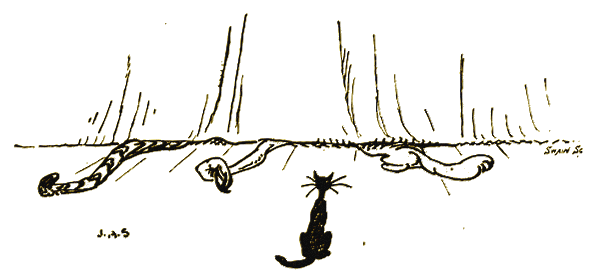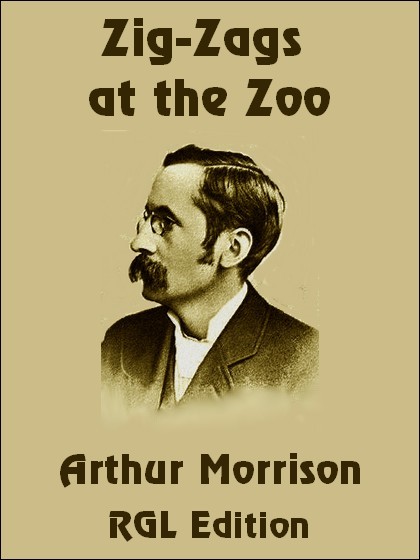
RGL e-Book Cover 2015©

RGL e-Book Cover 2015©
This e-book was built from digital copies of the 26 issues of The Strand Magazine in which the lavishly-illustrated series "Zig-Zags at the Zoo" was published between July 1892 and August 1894. It contains digitally-enhanced versions of the 580-odd delightful animal caricatures that James Affleck Shepherd drew for the series. The limitations of HTML coding made it necessary, in some cases, to reposition these, with the result that the book is not a one-to-one copy of the series as it appeared in The Strand. Furthermore, additional headers have been added to the title graphics to make them more readable and to reduce the amount of white space resulting from the deletion of enapsulated text. The font used in the titles and the captions is Bradley Hand ITC, which is more in keeping with the style and spirit of the illustrations than the serif font used in The Strand Magazine. —RG.
It would be difficult to decide which is the more essential part of Zig Zags at the Zoo,—the pen or the pencil.
They are complementary to each other, and both are observant, humorous, and accurate. Mr. Morrison has a keen sense of humour, and Mr. Shepherd has an equally keen sense of the ludicrous, and between them they make every animal provide some amusement. Some birds—and birds furnish Mr. Shepherd with his happiest efforts—seem born to become comedians on the smallest provocations, and on these he exercises the art of caricature with great success. He has certainly a most decided gift for true caricature, and exaggerates prominent features with much skill. Every word of the letterpress is readable, and there is no small amount of acute observation conveyed in the rambling remarks on various creatures' characteristics. It would be superfluous to praise or single out any particular drawing; but the bears, perhaps, show Mr. Shepherd's skill, and various birds his mastery of the art of suggestive caricature. Zig-Zags at the Zoo is a necessary volume to all people who are fond of animals and gifted with a sense of humour.
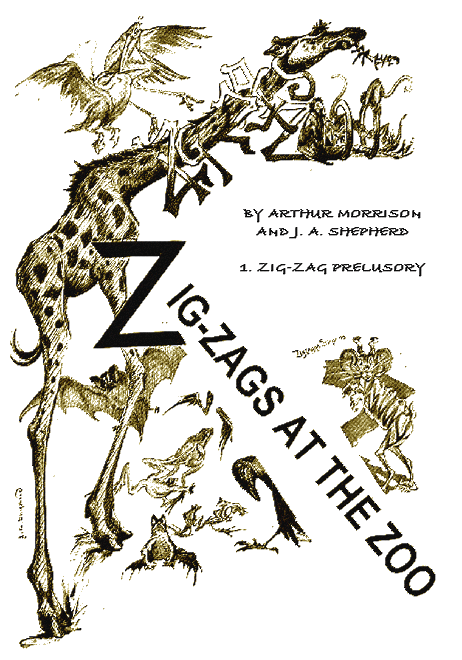
"ZIG-ZAGS AT THE ZOO" is a title which must not be misunderstood. The Zigzag—though possibly suggestive of a beast with stripes—is not a newly-captured wild animal lately added to the great London collection; it is merely the ordinary commonplace, charming, and delightful Zig-zag of everyday existence. For variety is the spice of life, and every man taking ease and joy of his life shall go through it in zig-zags. The direct road is the path of the toiler. Observe a man at a picture exhibition—a man who begins at number one on the catalogue and goes right through with solemn persistence until he arrives at the longest number at the last page, and the uttermost corner of the last gallery. That man is either "doing the show" for a newspaper, or prefers to make the pictures an affliction unto himself. A picture show, like everything else, should be taken on the zig-zag. The man who plans and cogitates the nearest way between two streets—that man is too busy poor fellow, to know the sweets of the zig-zag. To go upon the zig-zag is to see more, and with greater entertainment. Who sees more stars, more lamp-posts, front-doors, and keyholes than other men—yea, even unto tenfold? He who goes home on the zig-zag.
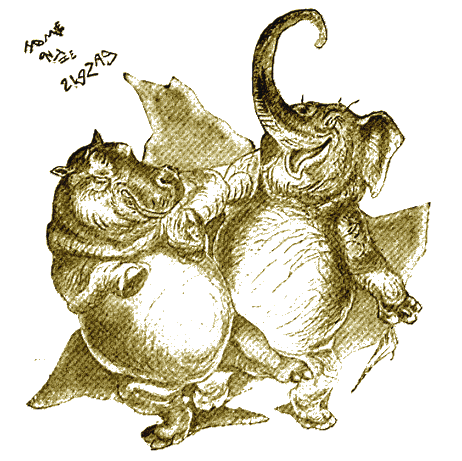
The zig-zag is the token, the mystic sign, of contentful ease and good fellowship the world over; the very word is passed to us, like a loving-cup, by the French, who have taken it in all good amity from the Germans, as Littré himself testifieth, and what greater sign of universal brotherhood shall you want than that? The zig-zag, too, is necessary; for the soberest citizen may not walk home through many streets in a straight line, lest he break his nose. "Zig-zag: something with short sharp turns," says the respectable Webster. Let us, therefore, take here a sharp turn, lest we run our noses against the wall of brown speculation.
Many good friends have I in the gardens of the Zoological Society of London. These good friends devote their entire lives to the furtherance of a popular taste for zoology, and are, or should be at once elected, most distinguished active members of the society. To pay certain gold guineas a year is a good thing; but what human member of the society would live amiably behind bars for the cause, to be stared at and made the subject of personal impudences? Now, all these fine fellows have their individual characters, their little personal habits and crotchets, just as have those distinguished zoologists who walk upright and wear tail-coats.
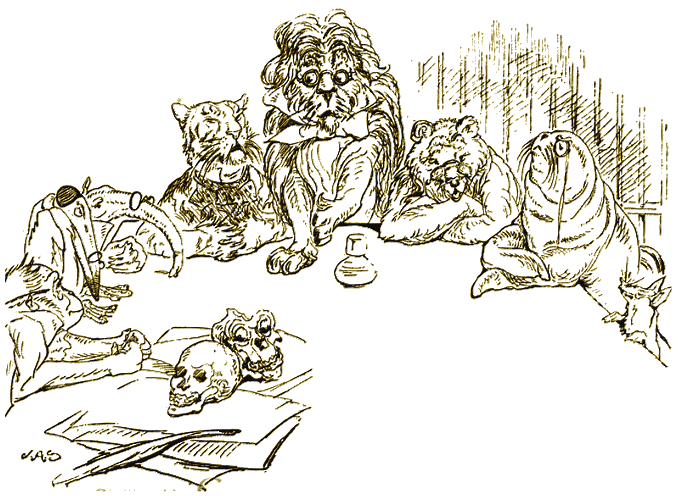
For instance, you may have come upon a row of three lions, or monkeys, or seals, as the case may be, and to you, a casual visitor, they shall be but three very similar seals or monkeys or lions. So also in the official guide-book, for a guide-book which is sober and official can say no other. But scrape close acquaintance with those creatures and talk to their keepers, and you shall find them Bill, Polly, and Sam: Bill, perhaps, being an easy-going lion (or seal or monkey), with a weakness for a lump of sugar, and a disregard of the state of his coat; Polly a coquette, with a vast pride in her tail; and Sam a touchy old fellow who objects to all but one particular keeper; and each with a history. Among these distinguished personages shall we zig-zag, and improve acquaintance. Meantime, let us sit upon this seat on the terrace with a good view of the gardens before us, while the big good-humoured Jung Perchad stalks along below with a howdahful of children and an eye to the casual bun; and let us meditate.
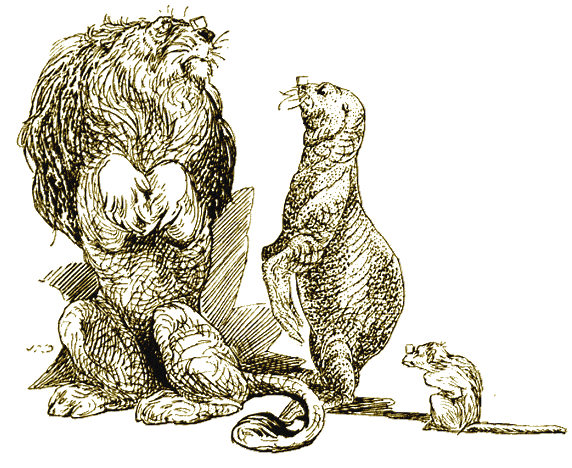
I like to conduct my brown studies in an atmosphere of mingled evolution and metempsychosis. It is a pity that the theory of our evolution from the primordial protoplasm in an inclusive line through every living species should now be considered old-fashioned. I like to imagine that among my remote ancestors every living thing is represented—it gives them a family interest. And if, further, I can persuade myself that I have been everything, at one time or another, from a bluebottle to a giraffe—why, then I can brown-study forever. The imaginative mind can compass all things. Well may I remember the comfort of a mouth six feet by measurement along the lips, in a crocodile. You take in your enemy in one large generous smile, and he is seen no more. And a tail for others—the cow, the dog, the horse, the lion, the tiger—is a convenience, both as a fly-whisk and as a help to working up a tantrum. In evolution from a bluebottle to a giraffe one learns the value of these things.
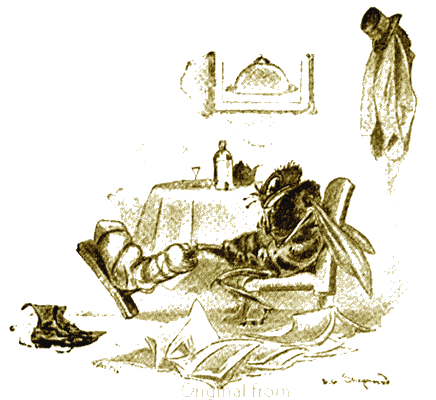
As a bluebottle, I think I should have enjoyed life—as a young one certainly; an elderly bluebottle gets bloated, slow, and gouty, losing his sense of humour. He grows infirm of purpose, too, and forgets to return to the same spot on a bald head after the eighteenth time of chasing off—the eighteenth time being really just when the fun begins. Sometimes he passes over a red nose altogether, probably from a fear of aggravating the gout in his feet. I am a little more doubtful about the giraffe. I should certainly have had a better opportunity of holding my head high in the world than I ever have now; and the giraffe has the advantage of the bluebottle in the matter of gouty feet. But what a neck for mumps!
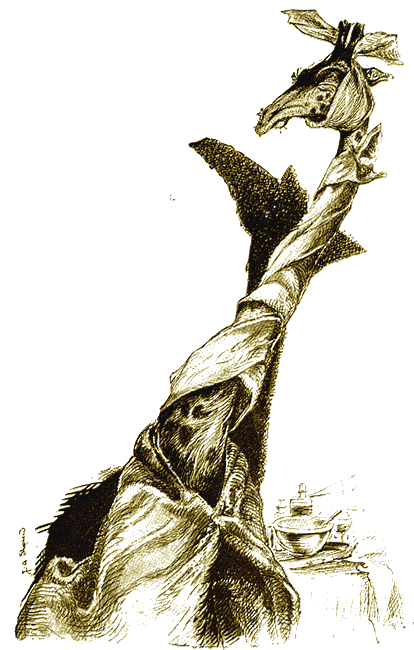
I think I must have been a raven or a jackdaw at some time—reasoning by induction—and I must have had a rare good time. The great object of a raven's life is the collection of valuables, wherein he resembles a large half of the human race. He steals rings, silver thimbles, and money, hoarding them in a safe and quiet place. Now, there is nothing so impartial as good Dame Nature. For everything she gives its compensation; every poison has its antidote, every excess its counteracting scarcity; nothing dies. Everything is a cause, and the effects of all causes work on for eternity. So that I conclude that my life as a raven must have been peculiarly successful from a business point of view, and that for that flood of good fortune I am now suffering the ebb. Obviously I must have been bursting with this world's wealth in some life or another, else why things as they so painfully are? Or perhaps—stunning thought!—I am saving up all this penury against a flood of millions to come. But, come when it will, it shall never overwhelm me, for I shall take a holiday in a Scotch hotel. I quite believe I skipped the crocodiles; at any rate, I find little hereditary affinity between us. When a crocodile objects to its surroundings, it refuses its food; as a boy at school, I objected very much to my surroundings, but without any effect of that sort.
My late friend—God rest him!—Mr. Jamrach, used to have rare tussles with his crocodiles. They were valuable as property, and when, out of spite, they took to attempting suicide by starvation, he had them tied up firmly and fed forcibly with a long pole à la ramrod. I never remember being so obstinate about my dinner as that; and if I had, from what I recollect of him, I don't believe my worthy preceptor would have done as Mr. Jamrach did. I never heard of his using any stick in that way. Beyond all this too, it should be observed that the crocodile has three distinct lids to each eye, whereby he is equipped for the performance of six separate and entirely distinct winks of the single variety, and an incalculable number of the more complicated sort by combination. Now the wink is the infallible sign of a frivolous and larky nature, and in disclaiming all relationship with the crocodile I need say no more than this.
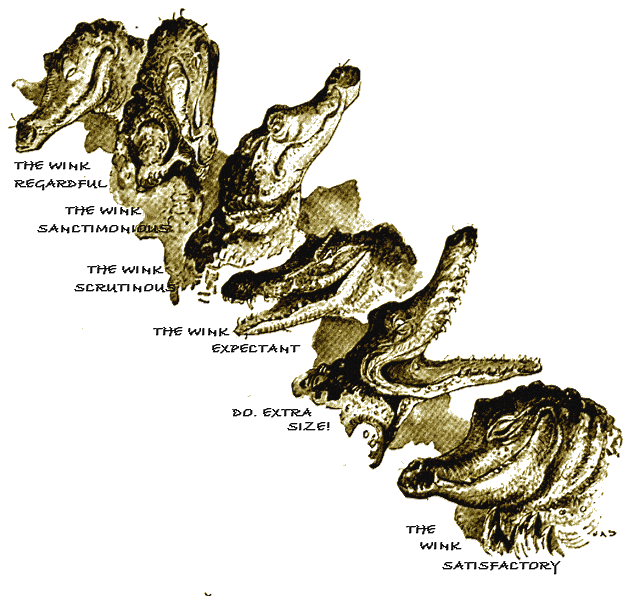
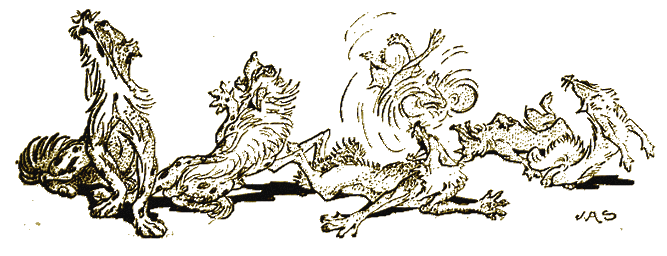
I often wonder what all these animals think of the band which plays here in the summer. The coming of the warm season is a time of joy, at any rate to the more tropical varieties, and it seems a pity to make it sad with a band. Perhaps it is done on the great principle of universal compensation already spoken of. Not that the band isn't a good one, you should understand, but a band of any sort before dinner is an infliction. Music is rather a nuisance to a hungry man, and its proper occasion arrives after a good dinner. Lions and tigers have ten times the capacity for hunger granted to man, and should be considered accordingly. Herein do I speak with feeling; for on several days of the week a German band plays near the corner of my street in the hungriest hour of the twenty-four, and on all the other afternoons the young lady next door, who is learning to sing (and taking a very long time over it) practises her scales.
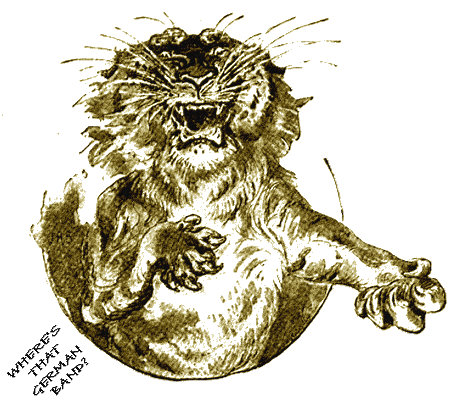
I should like to have met that German band when I was—say a tiger, and very hungry. But the young lady who will never learn to sing is infinitely worse, and deserves no consideration at all. I should like an opportunity of attacking her as a mouse.
Old Sir John Maundevile is a man one would like to have met. I would do a great deal—even unto paying at the gate—to inspect a zoological garden furnished with a good selection of Sir John's discoveries. I should like, for instance, to see his "wylde Gees, that han 2 Hedes." They are not found in many poultry-yards nowadays, and have become swans on inn signs. I should like, too, to see that "fulle felonous Best" with a black head and three long horns, "trenchant in front, scharpe as a Sword," with which he "sleethe the Olifaunt," Again, I think I should like to see those "Ipotaynes, that dwellen sometyme in the Watre and sometyme on the Lond; and thei ben half Man and half Hors," and compare them with the blithesome hippopotamus as we now see him in our own Zoo.
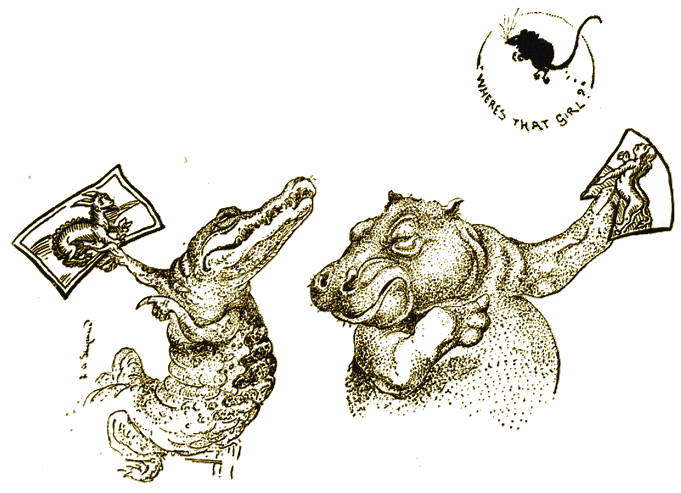
I should like to have the opinion of the man end on his equine hinder half, and to see how he walked; for, unlike the centaur, the "ipotayne" had only two legs. I should like to get a "cokadrille" as Maundevile's book pictures him, with long legs and ears like a donkey's, and show him to the sleepy alligators in the reptile house, by way of reconciling long-sundered relatives. But most I should like to get my mutton from a tree in the way Sir John did in a kingdom "that men clepen Caldilhe"—somewhere, it would seem, between India and China. On the tree, says our good friend, grows a fruit "as though it were Gourdes" and in each of these gourds grows a "lyttylle Lomb, withouten Wolle," which lamb, as well as the fruit, Sir John has eaten. "And that is a gret Marveylle," quoth Sir John; and so it is, when you come to think of it.
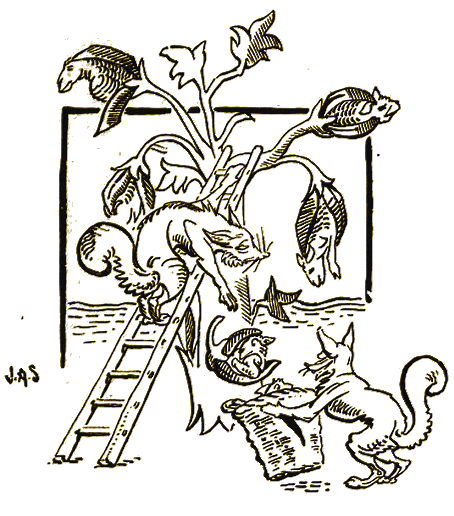
It is a pity that there was no wool on those "Lombs;" it would have given the narrative a certain artistic completeness, a rounding off. But, since there was no wool, it is fortunate that Sir John distinctly said so, otherwise people might have called him a liar.
Before the Zoological Society find specimens of these rarities, perhaps they may come upon another giraffe or two. Sir John Maundevile really plays light with the giraffe. He might have made something much more startling of it than "a Best pomelee or spotted; that is but a litylle more highe than is a Stede; but he hathe the Necke a 20 Cubytes long; and his Croup and his Tayl is as of an Hert; and he may loken over a gret highe Hous." Moreover, the illustrative woodcut in my copy actually under-represents the neck by full two-thirds; but that is for the very best of all reasons—there is no room on the block for any more. Perhaps it was because Sir John vouched for the giraffe that up to the present century most people in this country disbelieved in its existence.
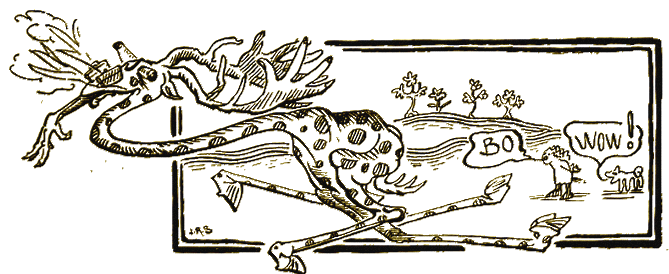
But just consider how he might have put it, and with truth; and how that heavy-handed artist might have put it—without truth. An animal with a deer's head, a leopard's skin, a swan's neck; a tongue that was used as a man's hand to grasp things a foot from its nose. With eyes that saw in every direction without a turn of the head; with nostrils that closed or opened. Withal higher than three tall men, one above another, and capable of slaying a man with one kick of a hinder leg, yet so timid as to fly before a child or a little dog! One feels rather ashamed of Sir John, after all, for neglecting his opportunities. There is difficulty in the capture of a giraffe, and there is expense. These obstacles, however, and greater ones, have been overcome again and again in time past by the Zoological Society of London, and probably giraffes soon will be seen here again. They are becoming rare even in their own habitat, and an African hunt would be a long and trying one. However, a giraffe is still to be had, and the time is distant when we shall become dependent for the supply upon a forlornly possible giraffe shower. Fish, frogs, and insects in showers are not unknown, while cats and dogs are proverbial. Water-spouts cause these fish and frog showers; in a giraffe transaction it would be necessary to charter rather a strong waterspout, and to stay indoors awhile; all a serious possibility considered from a Maundevillian standpoint.
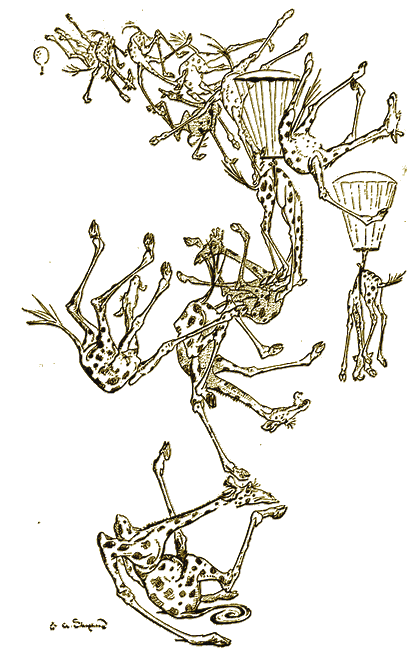
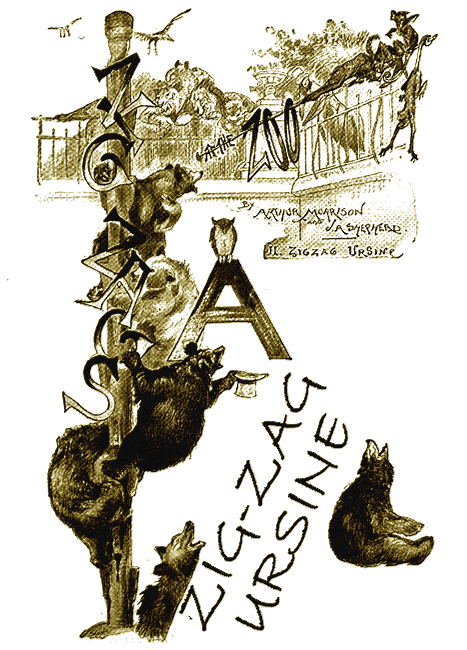
A BEAR is an adaptable creature, a philosopher every inch. He takes everything just as it comes—and doesn't readily part with it. He lives in all sorts of countries, in all manner of weather and climate, merely changing his coat a little to suit the prevailing weather. He will eat honey—when he can get it; when he can't he consoles himself with the reflection that it is bad for the teeth. He is largely a vegetarian, except when meat falls in his way, and although innocently fond of buns, will cheerfully put up with strawberries and cream if they stray in his direction. There is a proverb inculcating the principle of catching the bear before you sell his skin. This, from a business point of view, is obviously absurd. If you can find somebody idiot enough to buy the skin first, and pay cash, why, take it, and let him do the catching. It will save a deal of trouble, and you will probably have a chance of selling the same skin again after the other fellow's funeral.
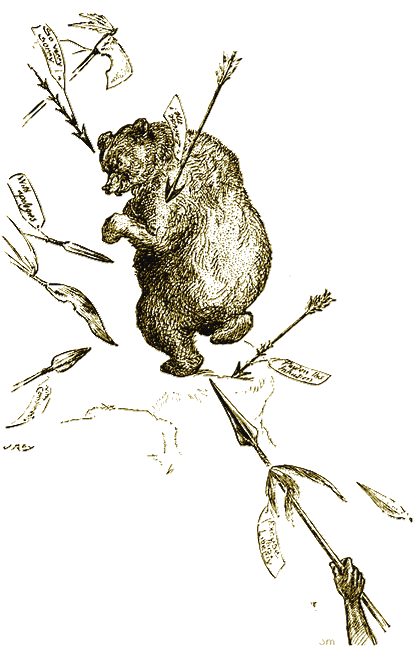
The bear is indeed a very respectable beast, as beasts go. And he certainly is respected in some quarters. Both the North American Indians and the Lapps reverence him too much even to mention his name in conversation; with them he is "the old man in the fur cloak" or "the destroyer." Indeed, it seems reasonable to feel a certain respect for an animal which can knock the top of your head off with a blow of his paw; but both the Indians and the Lapps carry their respect a little too far. To kill a bear and them humbly apologise to the dead body, as they do, is adding insult to injury, especially if you dine off the injured party immediately afterward. Neither is it likely to propitiate Bruin if a dozen men, while prodding him vigorously with a dozen spears, express their regret for the damage they are doing, and hope that he'll pardon the liberty. All this they do in sober earnest, and even go so far as to proffer a polite request that he won't hurt them. If he ever accedes to this, it is probably because he is confused by the contemplation of such colossal "cheek."
All this is galling enough, though otherwise intended, but contumely reaches its climax when dinner comes on. It would be annoying enough to the shade of the departed gentleman in fur to hear that he made a capital joint, or the reverse; still, it is what might be expected. But this sort of thing they studiously refrain from saying. They talk with enthusiasm of the poor bear's high moral qualities—often inventing them for the occasion, it is to be feared—and, presumably talking at his ghost, tell each other that it was most considerate and indulgent of him to let them kill him so easily. Now this is worse than laying on insult with a trowel; it is piling it on with a shovel, and rubbing it in with a brick.
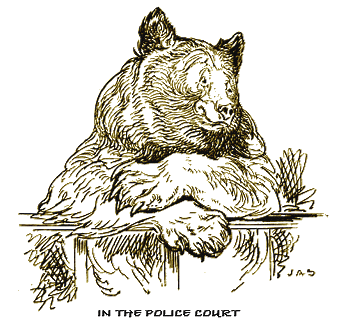
Contact with man ruins the respectability of the bear. He gets dissipated and raffish, and appears in the dock at police-courts. He associates with low companions—unclean-looking foreigners—who bang him sorely about the ribs with sticks to make him dance. They keep him badly, and he grows bony and mangy. He retaliates upon them by getting loose, frightening people, and breaking things. Then, when he is brought before a magistrate, they have to pay his fine. Sometimes they get into prison over him. The end is always the same—a bear who begins by associating with these people always turns up at the police-court before long, and once there, he comes again and again—just in the manner of the old offenders at Marlborough-street. Even in the innocent old times, when Bidpai wrote (or plagiarised) his fables, association with man made a fool of a bear. Witness the fable of the gardener's bear, who, zealous about a fly on his master's face, brought a paw upon it with all his force, and knocked off an indispensable piece of the worthy gardener's head.
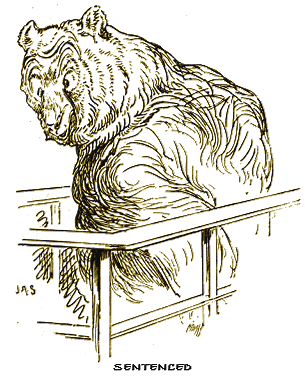
There is nothing whatever recorded against that gardener's character; he probably lived a most exemplary life, and won prizes at all the prehistoric horticultural shows in India—although it might not be strictly correct for a American to say there were no flies on him. But his society made a great ass of that bear.
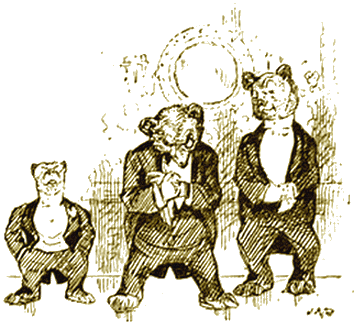
There was once a belief that bears licked their cubs into shape. If there be anything in this, all the bears in my acquaintance came of very negligent mothers—or, perhaps, of mothers who tried the other sort of licking. They have strength, sagacity, stupidity, gloom, cheerfulness, teeth, hair, claws, position, magnitude, and big feet; but nothing at all like shape. This is why they are able to indulge in such a rich variety of attitudes of rest. With so convenient a want of shape, a bear may be put upon the ground as you please, and so he will lie, without rolling. A bear rests or sleeps just as he falls, as you shall see on any warm day here at the Zoo. Usually, however, he makes an attempt to spread his feet against something. What this is it doesn't matter, so long as he nay reach it with the flat of his foot; he is never perfectly safe, he feels, unless there is a firm foundation for that very large area of sole; considerations of natural gravity he doesn't stop to think about. He has a deal of confidence in the supporting capability of those feet; and, if the table of square measure means anything, he is actively justified So he lies on his back, and plants his feet against the side of his den; or on his side, and plants them against the bars. If there be two, they plant their feet against each other, and, in the sweet communion of sole, fall asleep; if there be only one, he curls up, and opposes his palms to his soles, and falls asleep so. Bango, the hairy-eared bear in the end cage, does this.
A man who once said it was his sole attitude was driven to seek refuge from an infuriated populace in the seal pond. Notwithstanding this, and all that has been said about brute instinct in animals, nobody can gaze at, for instance, Michael, the big brown bear, without seeing at once that his sole is quite big enough for his body, big as that is.
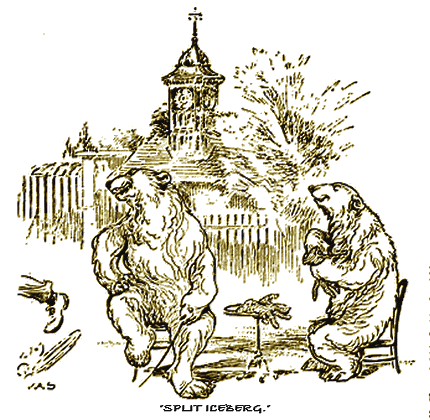
While the family motto of Samson, the big Polar bear, is understood to be, "O my prophetic sole, mine ankle!" This, however, is another story, and relates to Samson's slight lameness in a hind foot. Samson is a fine fellow in the matter of size. The only short thing about him is his tail, unless you count his temper. And there really is some excuse for the short temper. The climate would be a sufficient excuse in itself. It might, perhaps, be reasonable to say that the English climate is sufficient excuse for anybody's shortness of temper, but on the Polar bear it has the effect of that of India on an Englishman.
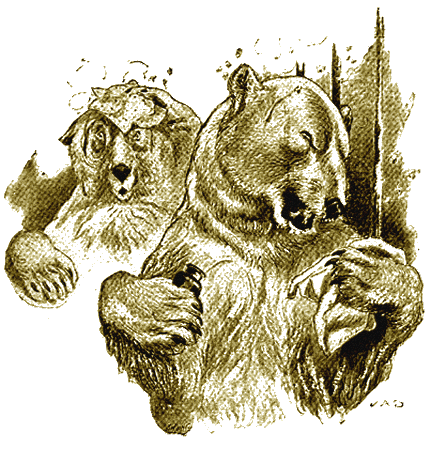
Both Samson and Mrs. Samson—her name is Lil—manage fairly well in the winter, although they would be the more comfortable for an iceberg or two. But in the summer they keep as much as possible to the coolness of their cave, and look dolefully out at the visitors with just the expression of a fat Cockney when he says, "Ain't it 'orrid 'ot?" Still, Samson has had twenty-one of these summers now, and is bigger and stronger than ever, so that it is plain that his health does not suffer. Lil is only a little bigger than was Samson when he first arrived, and is playful—Samson isn't.
Twenty-one years is a good length of healthy captivity for a bear, but Bango, the hairy-eared bear, has been here since 1867—established a quarter of a century, as the shopkeepers say. Bango lives with a single eye to his own comfort and nourishment, being blind in the other. Still, he can see a bun with his one eye just as quickly as any other bear can with two. Bango has a delusion—he is firmly convinced that by the regulations he is entitled to nine or ten meals a day, in addition to promiscuous snacks. By way of agitating for his rights, he makes a dinner gong of the partition between his cage and the next, punching it vigorously and uproariously for five minutes together whenever it strikes him that a meal is due.
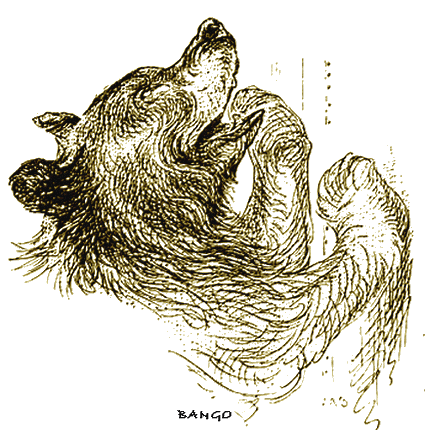
A sad, bad character in bears lives a few doors further down. It is Billy, the sloth-bear. He is the most disreputable, careless, lazy, and unkempt bear on the premises. Perhaps his parents neglected him. Certainly if one bear can have less shape than another, which has none, Billy has. He is more than shapeless; he approaches the nebulous. A sort of vast, indefinite, black mop, with certain very long and ill-kept claws observable in odd places, and now and again a dissolute, confused muzzle, in which a double allowance of lip and a half-allowance of lip mingle indistinguishable.
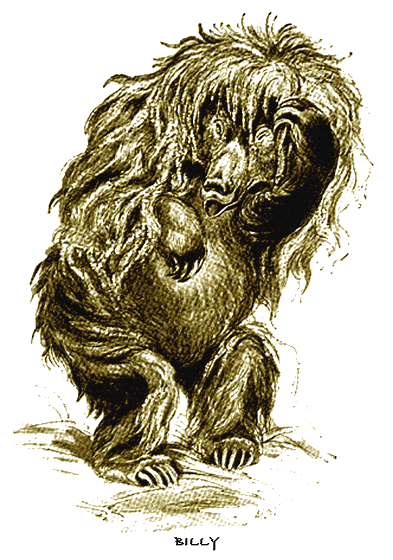
Billy is usually asleep. He is as fond of eating as any other bear, but fonder still of sleeping. Give him a biscuit while he is lying down, and he will come for it with an indignant expression of muzzle, implying that you are rather a nuisance than otherwise.
Ludlam's dog, says the proverb, was so lazy as to lay his head against the wall to bark. Billy must have been Ludlam's bear. Round at the other side, Joey, Fanny, and Dolly, the little Malayan bears, are certainly not lazy. Dolly will turn a somersault for you with his head (yes, I mean his) in the sawdust, bringing himself over by gripping the bars with his feet. Fanny will do the same thing high up against the bars, climbing a somersault, so to speak. Of course, there is no regular charge for this performance, but neither Fanny nor Dolly will feel disappointed if you contribute a biscuit to the prize fund. Fanny will find the biscuit with her paw, even if it be put out of sight on the ledge before the partition.
But Michael—big Michael, the great brown Russian bear, the largest bear in the place except Samson—doesn't need to trouble to hunt for biscuits. He just opens his mouth, and you throw your contribution in. Now, with most of the bears this is something of a feat of skill, since you may easily pitch a little wide, and fail to score a bull's-eye. But when Michael's mouth opens—let us call him the Grand Duke Michael, by the bye—when the Grand Duke's mouth opens you can't very easily miss it. Go and look at the Grand Duke's mouth and see.
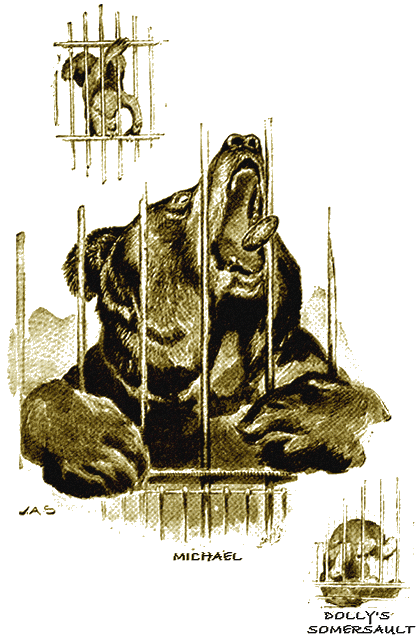
One chiefly respects Kate, the Syrian bear, as a relative of those other Syrian bears that ate the forty-two rude boys who annoyed Elisha. I have sometimes wondered whether these bears, hearing mention of a bald head, had aroused in them any personal feeling in regard to bear's-grease. But, on consideration, I scarcely think this likely, because bear's-grease for the hair is always made from pig. The pretty young Himalayan here can dance if she will, having been taught by the bearward, Godfrey. But she will only dance when she feels "so disposed," and never if asked, which is ungrateful to Godfrey, who has taken pains with her education, and who managed bears long before her grandmother was born.
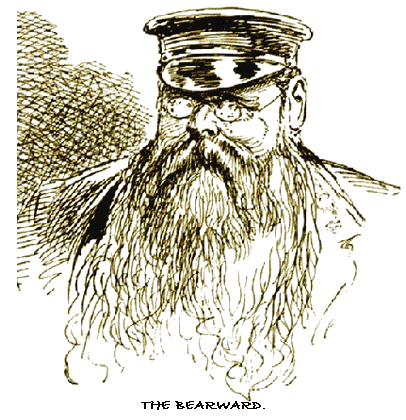
Menush and Nelly belong to a good family—the American blacks—but have been in trade, in the pit, until quite lately. Having acquired a considerable competence in buns, however, they have now retired into semi-privacy.
They grew so excessively fat, indeed, upon the public bounty, that it became a matter of great difficulty to induce either to climb the pole—and almost as difficult a thing for either do it. Now they live in ease—although, looking at them and remembering that they are sporting characters, one might suppose them to be thinking of taking a quiet public house for the rest of their days.
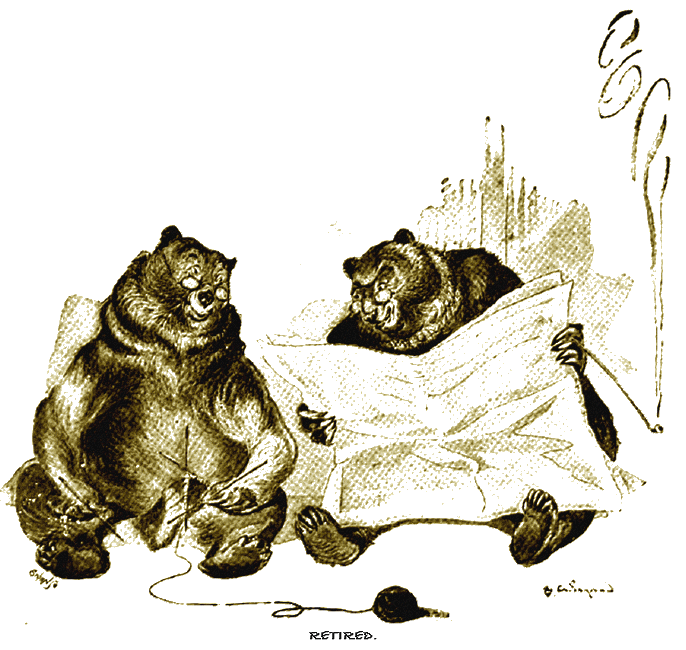
Punch and Judy have succeeded to the pit business. A few days after they first took possession, two other bears were turned in with them, nameless, but these obviously should be called Toby and the Policeman. When Punch and Judy, young bears and new to the place, first found themselves in the unaccustomed area, they looked about them till their eyes fell in succession upon the pole, the bath, and the floor—circular, and plainly meant as a ring. Here was a gymnasium, ready fitted; wherefore they promptly began a grand inaugural assault-at-arms, lasting most of the day.
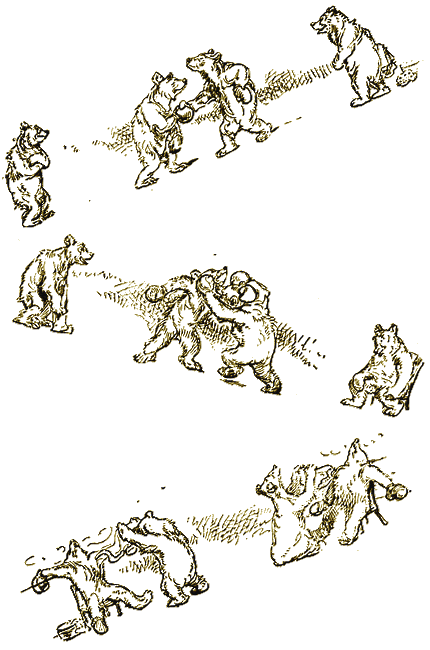
There was no distinct separation of the events; plunging, boxing, climbing, and wrestling were mixed in one long show, frequently approaching in character the drama wherefrom Punch and Judy derive their names, with one variation. For Judy is rather larger and stronger than Punch, who accordingly became chief receiver, and this with the utmost good humour. The pair, in the wild delight of comparative freedom in novel surroundings, having executed a prelusive scramble and rampage and a mutual roll in the bath, stood up and sparred carefully for an opening. Judy soon began proceedings with both mawleys, Punch ducking very cleverly and putting in the right on the listening-machine. Not to be denied, Judy bored in, and using right and left scored a decided lead, when Punch, the trickier of the two, observing his partner's back now to be turned to the bath, ducked in, held and back-heeled, both falling a mighty plunge, Punch uppermost, thus finishing round one. Round two consisted chiefly in a persevering attempt by Punch to drag Judy out of the bath, in order to roll in it himself. Round three began by Judy suddenly rising from the water and driving Punch violently up against the pole, from which awkward position he dropped on to four feet and retreated with celerity, suddenly stopping and turning about to deliver a stinger between the eyes.
This round continued an unrecorded length of time, and consisted chiefly of wrestling, the bottom of the bath in the end being about the driest spot in the pit. Rounds four, five, and six consisted of judicious extracts from rounds one, two, and three, in new combinations, and with varying results, the combatants retiring, secundum artem, to their proper corners between each round. Bangs on the smeller, drives in the breadbasket and dexter optic, straight uns on the knowledge-box, rib-benders and ivory-rattlers were fully represented, and there were frequent visitations in the atmospheric department.


As the seventh round was about to begin, a visitor protruded a bun, impaled upon the stick for the purpose provided, near the pole a little way up. Business was immediately suspended, and Judy made for that bun. With some difficulty—Judy wasn't used to the pole, and it shook the more the higher she ascended—she acquired the little present half way up, and descended to where Punch waited to renew the display. But Judy was thoughtful, and indisposed for the noble art. She had found a new thing in life, something to live for and think about—buns. So she thought about them. The place where they were to be found, she reasoned—for she had never noticed the man at the opposite end of the long stick—was up that pole; the pole being probably a bun-tree. So that, whenever disposed for buns, it only needed to climb the pole and find some. Having arrived at this stage in the argument, it seemed to strike her that another bun was desirable, there and then. Wherefore she began another rather nervous climb, her eyes fixed steadily above to where the buns were expected to appear.
The expedition was a failure, and Judy pondered it, with the apparent decision that the buns must be a little higher up. So she started again, and found one! She has got over that little bun-tree superstition by this time, and can climb better. Also she and the others have already broken up entirely five of the sticks upon which buns arrive, thus from time to time cutting off the supply. And although Toby and the Policeman are very useful as seconds at the later boxing matches, very few buns get past Judy. Punch, the hen-pecked and wily, waits good-humouredly at the foot of the pole, and has been known to catch many a bun that Judy climbed for.
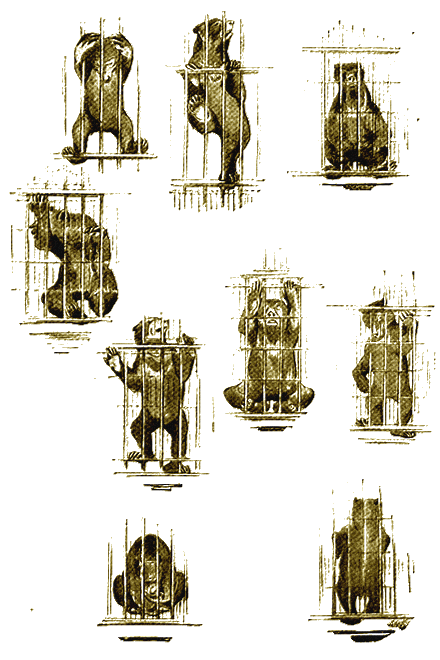
Through all the bear-dens you may see bears in attitudes sufficiently human to be quaint and grotesque. A squat like that of an Indian idol, an oddly human looking out of window, or a lounge at the bars, clumsily suggestive of a lounge at a bar in the Strand; and of all the attitudes those of the gentle little Malay are quaintest. A certain bandy human respectability hangs about these small fellows. Dolly, after turning his somersault, will sit and inspect his reward just as a child will examine an apple, judging where to make the first bite. Dolly's great luxury is a cocoanut. He will thrust holes through the eyes at the end with a claw, and drink the milk before proceeding to the kernel. If the eyes are too tough to be pierced, he will lose his temper, like a spoiled child, and smash the nut against the floor; after which he will rush about distracted making wild efforts to drink the milk. I think some sort of a moral lesson might be deduced from this. If so, the gentle reader is at liberty to deduce it, without extra charge.
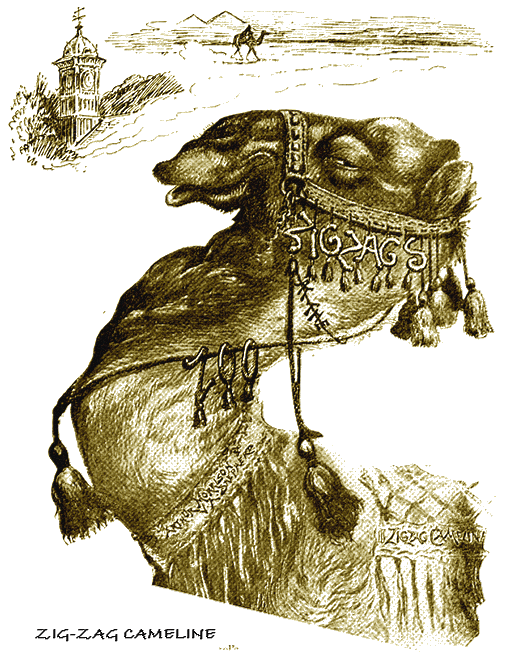
THE CAMEL is very largely a fraud. That is to say, he contributes his half share to a very large fraud, and the goody-goody natural history books of childhood's days contribute the other half—perhaps rather more than half. First he is a fraud in the matter of docility—a vile fraud. We read of the kind, patient, intelligent camel, who voluntarily settles on his knees to receive his load, and afterwards carries it for any number of thousands of miles at twenty or thirty miles an hour with nothing to eat and we approve of the camel and his cheapness.
Then there is a proverb which aids the fraud—most proverbs, by-the-bye, aid a fraud of some sort—a proverb about the last straw breaking the camel's back. What a glamour of oppressed, uncomplaining patience that proverb sets about the camel! You imagine the picturesque but inconsiderate Bedouin, having piled his faithful camel with everything he possesses, looking about for something else to crown the structure. There are all his tents, blankets, trunks, bags, rugs, hatboxes, umbrellas, and walking-sticks, with some grocery for Mrs. B. and a wooden horse from the Bagdad Arcade for the little B's. It seems a pity, having a camel, not to load it up enough, so he looks for something else, but can see nothing. Suddenly it strikes him that he has just used a straw to drink a gin-sling, and without for an instant considering what may be the result, he pops it on the top of the rest of the baggage. The patient, loving creature has barely time to give its master one pathetically reproachful look when its back goes with a bang.
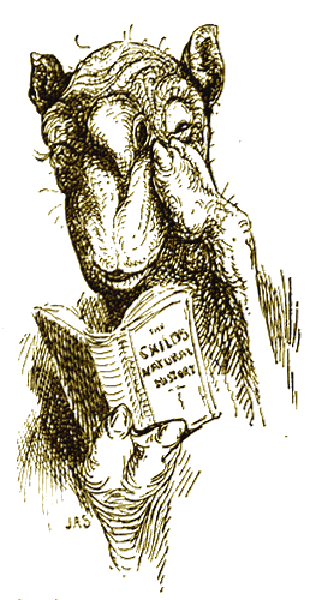
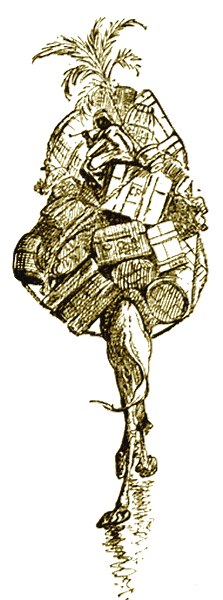
Now, this may be the way of the Bedouin, but it isn't the way of the camel. He doesn't wait for the last straw—he won't have the first if he can help it. There's no living thing in the universe that he wouldn't like to bite or kick; and when he isn't engaged in active warfare with creation in general, he is sulking and planning it.
He equally resents being loaded or fed, or banged with a pole. He wants the world for himself, and finding he can't get it, sulks savagely. He has to be shoved forcibly to his knees and tied down by the neck and fore-legs before he is loaded, and while the operation is in progress he grunts and growls like a whole menagerie, and reaches about—he can reach—to masticate people. When he is loaded he won't get up-but he will grunt and bite.
When at last he is persuaded to stand upon his legs he devotes himself to rushing about and scattering his load far and wide—and biting. The unhappy Bedouin's household furniture, hat-boxes, and wooden horse are scattered all over the Syrian Desert, and the unhappy Bedouin himself is worse off than at the beginning; and still the insatiate creature bites. The Bedouin swears—in his own way—hopes that jackals may sit upon the grave of the camel's grandfather, and so forth—and gathers his belongings together preparatory to beginning afresh.
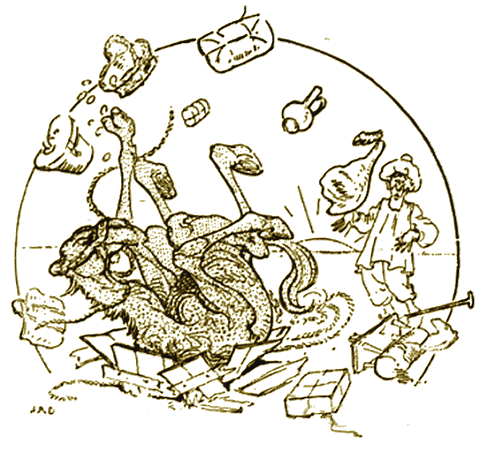
And then, after all this—and supposing that all troubles are overcome and the journey ends without mishap—that delightful camel objects to the baggage being taken off, and growls and bites. It is not mere poetic imagery, it is a wicked joke to call the camel the ship of the desert. To call it even the Carter Paterson of the desert would be to cast reflections upon the business conscientiousness of a very respectable firm. One is disposed to be the harder on the camel because of the goody-book fraud, which is a double-barrelled fraud, telling wonderful stories of the camel's speed. As a matter of fact, the ordinary pack-camel, lightly loaded, is barely up to three miles an hour.
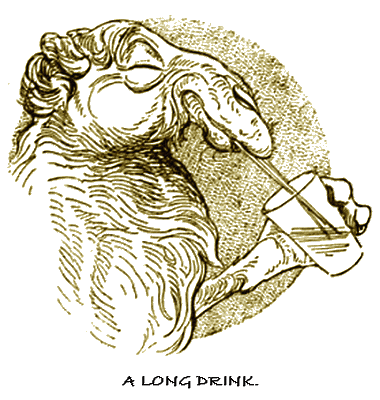
He is a provident beast in the matter of drink. He takes a very long drink when he can get it, and saves it, neatly stowed away, against the drought. As a camel gets older and more experienced, he lays by more and more water in this way arriving in the course of a long and thirsty life at five or six quarts. If he lived a little longer he would probably add whisky.
He is also provident in the matter of food. He feeds on his hump. I see an opportunity of dragging in a joke just here about a perpetually sulky man doing the same, but I refrain. I take the occasion to renounce and disclaim all intention of saying anything about the morose camel always having the hump, or of his contrary disposition giving him a greater hump the more he has to eat. It is vulgar as well as old. The only variation in the facial expression of the camel takes place when he eats. Ordinarily the camel wears an immutable, deceptive, stupid, good-natured grin. This is a wise provision of Nature, leading people to trust and approach him, and giving him opportunities to gnaw their faces off with suddenness and less difficulty; or guilelessly to manoeuvre the victim near a wall, against which he can rub him and smash him flat.
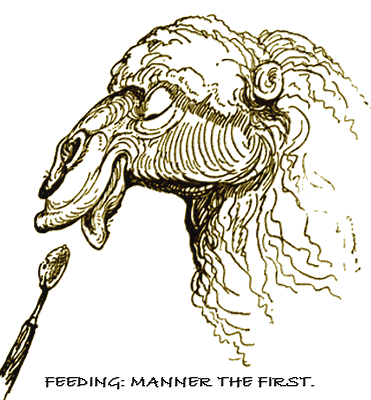
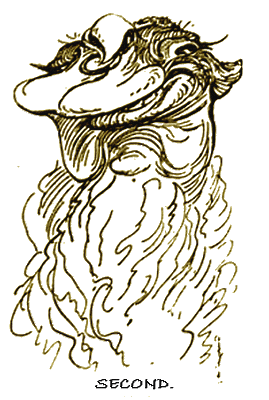
His feeding manners are vulgar, although superior to the tiger's. When he eats he uses his immense lips first as fingers to lift the desired dainty. Then he munches in a zig-zag, using alternately his right upper teeth on his left lower, and vice versa, and swinging his lips riotously. And he chucks up his nose, taking full advantage of his length of neck in swallowing.
Here at the Zoo probably the first of the camels to attract the visitors' attention is Bob the Bactrian, in his semi-detached villa under the clock. Bob the Bactrian is a handsome old ruffian when his coat is in full bloom. He sheds twenty-four pounds of hair every year—and a pound of camel-hair is a good deal. It is frightful to think of the miles of watercolour sketches which might be perpetrated with the brushes made from twenty-four pounds of camel-hair. Self the keeper has sufficient of it by him to weave enough cloth to clothe a regiment—and with good raiment.
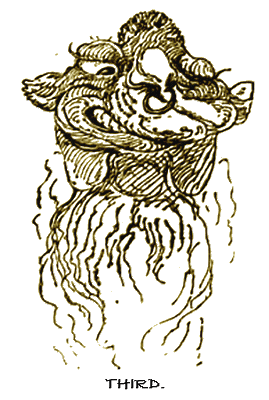
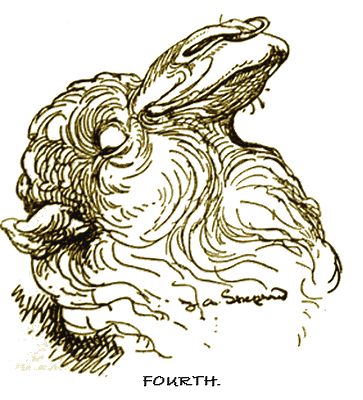
I think Bob is a little vain of his fine beard and long hair. He poses about in picturesque attitudes when it is in good condition, and nothing short of a biscuit will make him disturb the curve of his neck. Bob is a military character—he came from Afghanistan—and carries out the part with great completeness.
Offer Bob a biscuit, and, as he hangs his head over the railings in slobbering expectancy, he will "mark time" regularly with all four feet. Rose, the cross-bred Bactrian, lives next door to Bob, and there is something about the pair, and about their whole environment, that makes one think of them in the characters of an area belle and a fascinating guardsman; particularly as Bob is, I believe, a sort of cousin. The railing between them helps the illusion, just as the clock-tower above them gives a tone to Bob's military bearing—being dimly suggestive of the Horse Guards.
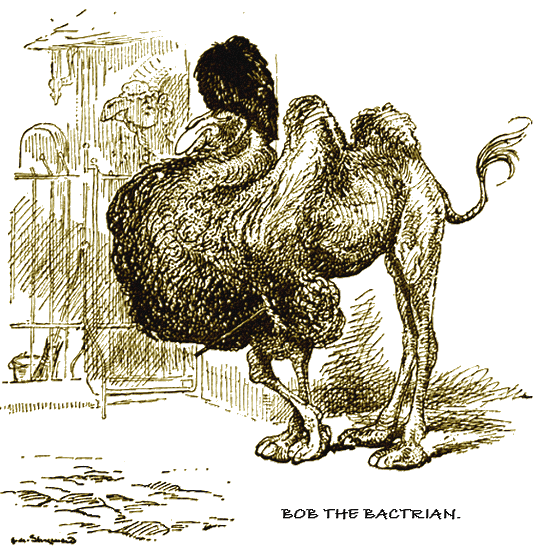
Between Bob in full bloom and Bob in a state of moult, there is a world of difference. A sorry, ill-upholstered, scraggy shagbag is Bob in his periodical moult. All his beard—all his magnificent frills gone; a bare, mangy hide with a small patch here and there of inadhesive hair is all his outward show. Poor Bob feels his out-at-elbows state keenly, and lies low. He hides all day in the innermost recesses of his state apartment under the clock, and only ventures forth when the gates of the Gardens are closed, or when Rose is asleep. Sometimes the presence of a piece of biscuit on the floor of his front garden will tempt him sorely for hours, till he ventures forth after it, first looking cautiously about from his door to make sure that he is unobserved.
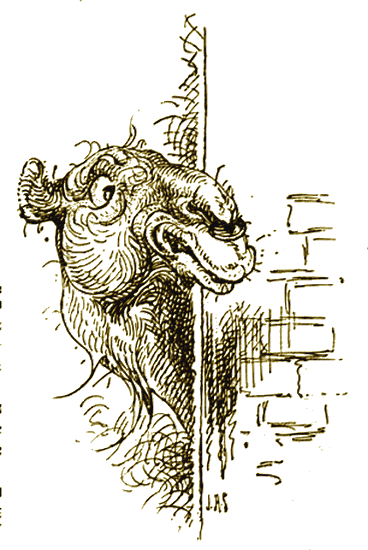
Neither his periodical seediness of appearance, however, nor anything else under the sun will prevent Bob demanding his meals. He keeps Self the keeper up to his work. If at any time it should occur to him that business in biscuits is becoming slack, or that another meal is due—neither a rare contingency—Bob walks to his back door and kicks with his fore-feet, like a rude boy. The keeper must come then, because Bob's foot never improves a door.
Among Bob's accoutrements a feared and detested place is held by a big leather muzzle, a thing its wearer regards with mingled feelings. He isn't altogether sorry when Self proceeds to buckle it on, because it means that a pleasant walk about the grounds is to ensue. But bitter, bitter, poor Bob's lot to walk among human hands teeming with many buns—buns shut out for ever by that thing of leather! He sees the elephants caressed and fed; Jingo and Jung Perchad amble good-humouredly about, swinging their trunks in affable freedom right and left, and collecting many a pleasant morsel; while he, the magnificent, the bearded, the military Bob, in that vile nose-cage—but there! He turns his head the other way, and tries to look as though he hated buns. He tries not to see them, but they glisten, gloriously brown and sticky, from all sides—somehow there are always more buns about when that muzzle is on. And Bob becomes a greater misanthrope than is natural to him; which, speaking of a camel, is saying much. But what living thing in all these Gardens could spend half its waking hours in painfully assuming a contempt for buns without becoming a misanthrope?
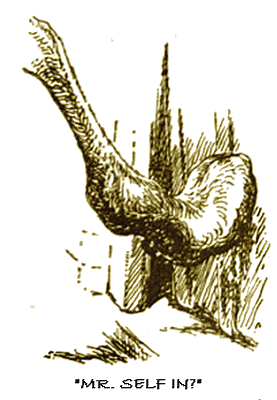
Rose, who is cross-bred, is, in sheer spite of the hint the word carries, rather an amiable creature, and very rarely cross—for a camel. There has even been no necessity to give her a nose-ring. She is not always of an industrious appearance, having a habit of lying about in an Orientally lazy heap—so Oriental a heap that one instinctively looks for the hookah which Rose ought, in the circumstances, to be smoking.
The local flies try a little annoyance now and again, but they have learned a great respect for a camel's length of reach. I remember a country bluebottle—a very raw and self-confident country bluebottle—who made a rash onslaught upon Rose without proper consideration. I knew this fly—I had met him once before, when he madly attempted to burgle a tin picnic box containing nothing. I felt interested to observe how he would get on with Rose, knowing well that, without asking advice of any regular local bluebottle, he would assume her to be a mere scraggy town cow.
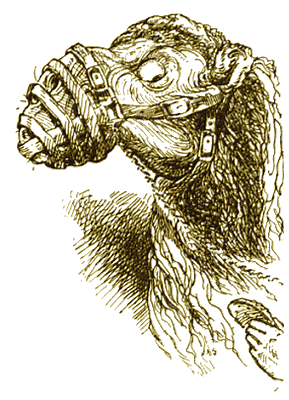
This is just what he did. Rose stood, looking perfectly amiable—all camels look amiable; it is a part of their system—and, to an unaccustomed eye, quite unconscious of the country bluebottle's existence. Still, there was a certain optical twinkle which should have warned that bluebottle. But, heedless all, he rushed forward and made to settle on Rose's shoulder. With a nonchalant swing the near hind leg came up, and that bluebottle was brushed off his legs. He buzzed about for a little while, puzzled. This was quite a new motion in cow-legs—some town improvement, evidently. So he settled—at least he tried—near the top joint of that hind-leg, where the foot couldn't reach him. Rose looked calmly ahead at nothing and moved no limb but the near foreleg, which swung quietly back, and—that bluebottle was projected into space at the instant his feet were landing.
He gathered himself together, and sat on the roof of the stable to think it over. Meanwhile Rose stood at ease, without a further movement. The bluebottle considered the question strategically, and made up his mind that on the chest, just before the joints of the fore-legs, nothing could touch him. He tried it. But he only arrived on the spot simultaneously with a hind-foot, which swung neatly out between the fore-legs and drove that bluebottle into the surrounding atmosphere once more. And still Rose gazed amiably at nothing.
Losing his temper he made straight for her nose; but the nose never moved. The hind leg came up once more, however, and made the rout complete. Baffled and disgusted, the rash bluebottle flew off in a pet over the rails dividing Rose from Bob. Now Bob was just indulging in a yawn of the very largest size, and that rash bluebottle, never looking where he was going—! Well, well, it was a sad end for a bright young bluebottle, just beginning to see life. And still Rose gazed amiably at nothing, standing just as that departed bluebottle first saw her.
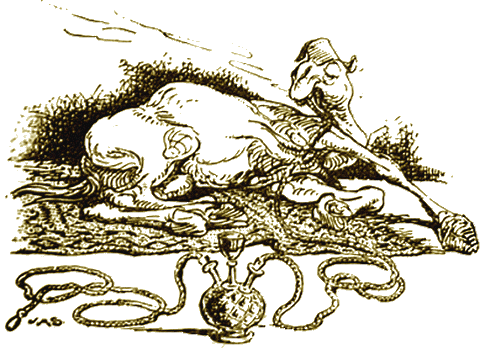
But the aristocrat among the camels here is Tom, who is white, and a rarity. He was captured in an Egyptian fight, and was little more than half-grown when he arrived, but has increased in seven years, and will grow no larger now—nor any more savage. This litter contingency has been provided for by a neat little iron ring which Tom wears in his nose.
At the Zoo the camel's naturally unamiable temper is not aggravated by overloading; nobody looks about for that last straw after the two or three small boys have mounted. Wherefore these camels are as well behaved as camels can be. Tom doesn't playfully try to smash his keeper against the wall—at any rate, not quite so often as he did at first—chiefly because of that piece of jewellery in his nose. That has made a very peaceable dromedary of Tom, for when he takes a walk the keeper snaps one end of a neat little piece of chain upon the ring, and keeps the other in his hand. And Tom will do anything rather than have his nose pulled.
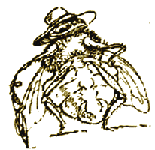


At a time when Tom is in the seclusion of the stable—perhaps invisible—approach the rails with an air of having a biscuit about you. Promptly Tom will emerge from his lair, with a startling stride and a disconcerting reach of neck. Make no further sign of biscuit. Then, if Self be by, you shall find that he has imparted to Tom a certain polish of manner surprising in a camel. Self will tell Tom to beg, and Tom will beg immediately; the supplication consisting in standing on three legs and throwing the right forefoot negligently across the left knee. Thereat you probably give him a biscuit. But if yo remain obdurate, or have come biscuitless, Tom's politeness evaporates at once. He turns his back upon his visitor with a certain studied rudeness of manner—a contumelious nose-in-air tail-turning—and stalks disgustedly back to his boudoir. Any other camel will do this, and it is natural. Why do these human creatures come to the rails unprovided with biscuits? What are they for? So the camel turns up his nose—and a camel can do this; watch him—and flounces away.
Now, I like Bob, and I like Rose, so far as one may like a camel; and I like Tom, so far as Tom will allow it. But that doesn't in the least reconcile me to the juvenile natural history book.
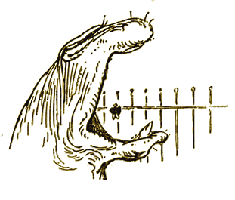
You can't conscientiously look Bob or Tom in the face and call him a ship of the desert, or a ship of any kind. You might possibly manage to work up a small fit of sea-sickness if you rode a Heirie—the swiftest of the dromedaries—at his best pace; because at a pinch the Heirie can make ten miles an hour, shaking his unfortunate rider's joints loose, even though he be swathed in many swadlings. But neither Bob nor Tom is a Heirie. Tom is a fairly quick dromedary, but Bob, if he will pardon my saying so, is only an ordinary slow camel; nothing more than the "hairy scary oont" sung by Mr. Kipling. In Mr. Kipling's ballad Mr. Atkins is made to call the camel many things, but never a ship of the desert. Contrariwise,
—"the commissariat cam-u-el, when all is said and
done,
'E's a devil, an' a ostrich, an a orphan child in one."
There you have the character of the camel in a dozen words.
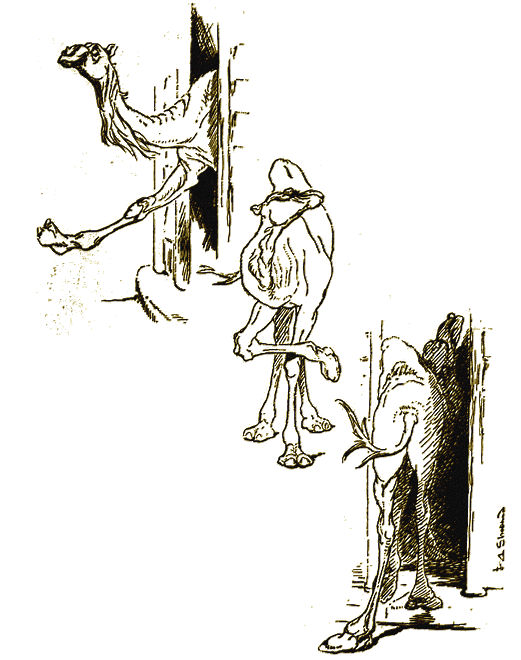
Two attendants have the camels in the Zoo, Mr. Self and Mr. Toots.
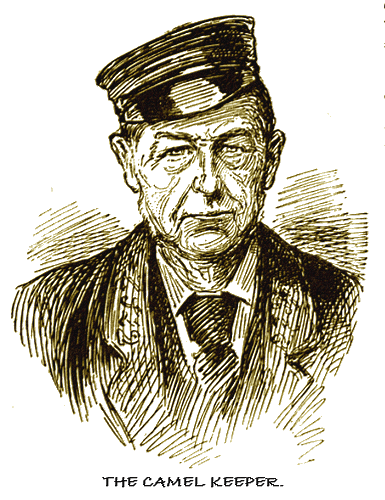
The former is the officially appointed keeper, with the regular badge and uniform. He has been master of the camels for more than forty years, and knows a family (human) infant representatives of which he has led round on camel-rides for three generations. What Self doesn't know about the little fads and fancies of "the hairy scary oont" there is nobody to tell him. He is a wary and observant person, is Self.
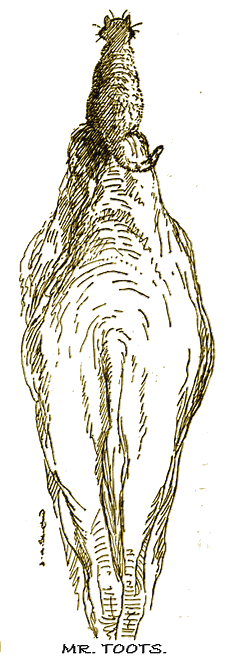
When a man has been forty years watching the affably-smiling camel, and looking out to avoid being suddenly jammed to death against a wall, or having his face bitten off and his feet viciously trodden on, wary observation begins to be natural with him.
Mr. Toots occupies quite a different position in life from Mr. Self, being a cat. Mr. Toots, as fits his name, is a quiet and reserved cat. Bob and Rose are quite friendly with Mr. Toots, and will, if possible, avoid stepping on him, which is an astonishing degree of amiability in a camel; but, of course, so far as Rose is concerned, she is an unusually amiable camel. Mr. Toots is a noticeable, carroty cat, and you can't deceive either Bob or Rose with a substitute. Once Mr. Toots was unwell, and a tabby was installed, as a temporary experiment, in his place. Bob was determined to suppress all spurious imitations, and the last worldly sensation of that unhappy tabby was conveyed through the medium of Bob's fantastic toe. Therefore Mr. Toots still maintains his monopoly, and may sit among Bob's or Rose's feet with confidence. Tom, however, doesn't know him, and won't. So that Mr. Toots, with the wisely accommodating spirit of his namesake, says—"Oh, it's of no consequence, thank you—no consequence at all, I'm sure," and gets away from Tom to bask in the magnificent patronage of Bob the Bactrian and the lady next door.


Cantankerous and uncertain as is the character of the camel, there is a deal of human nature about him. When he has packed into his character all the possible devil, and ostrich, and orphan, there is still room for much human cussedness, and it is there. You shall see it even in his very face. There is a world of expression in a camel's face, misleading often to a stranger, but with a human deceit. The face lends itself particularly to varied and strongly marked expression. The nostrils will open and close with a great flexibility, and the lips and eyebrows are more loose and mobile still. What more machinery may the camel want for the facial expression of his ill qualities? With such a lip and nose he can sneer as never can human thing; this at the humble person who brings him no biscuit. He can guffaw coarsely—and with no sound beyond a rare grunt. Furious malice is native to his face, and a self-sufficient conceit and superciliousness comes with full feeding. Even in his least expressive slumber the camel is smugly complacent, although his inborn genius cannot teach him that a piece of cardboard is not a biscuit.
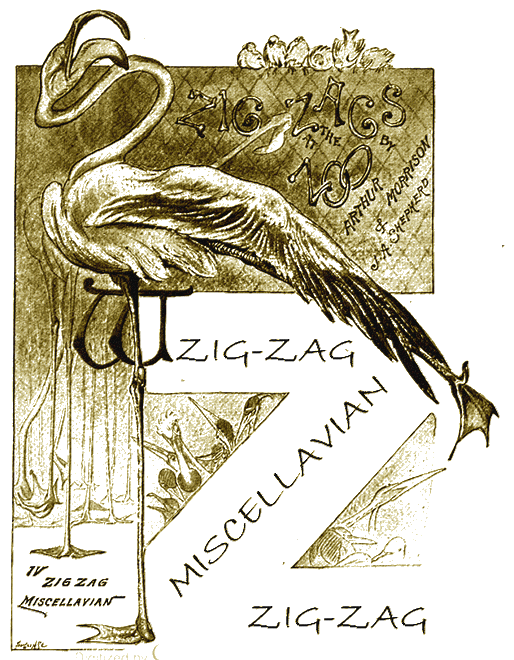
WHEN I have wandered about the Zoo in a proper zigzag of a suitable derangement; when Samson has been nodded to, Bob the Bactrian chatted with, and other acquaintances called upon; and when a naturally lazy disposition suggests a rest, I like to sit opposite the great birdcage, which is officially declared a pond—the Night Herons' Pond—and look upon the small world there living and moving. Everything is busy—ducks, gulls, herons, egrets, umbres, flamingoes, ruffs, spoonbills, screamers—all but the doves, who are lazy and sulky—each in his own particular way. Each, that is to say, in his own particular method and action, for each has the same object—something to eat. It is a wonderful thing to observe—this persistence of birds after something to eat. Capture almost any bird you please, fill him with somewhere about double his own bulk of food, and let him go again. In two minutes you shall find that bird gravely prospecting about and making all sorts of experimental borings—for something to eat. And birds show the most extraordinary conviction of the edibility of the world in general.
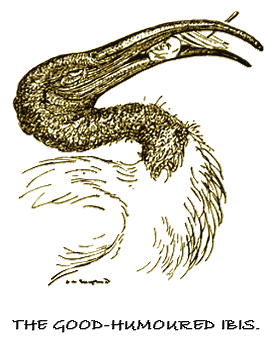
Most birds will extract nourishment somehow from a brick, an old nail, or a broken bottle; those who can't will try. And when a certain tract has been searched through, pebble by pebble, and found to be absolutely barren, then they will begin on it again, on the off-chance of a thrown brick or the passing of some human creature in the meantime having left behind it something to eat.
Here most of the birds are omnivorous—certainly none are vegetarians but the doves. The doves, as vegetarians, represent the brotherhood, or the cause, or the belief, or whatever it is, rather unfavourably.
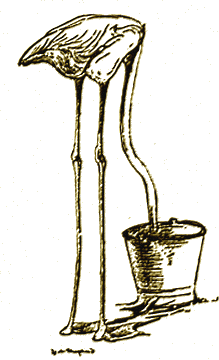
The dove can never do anything much credit, being rather an insignificant humbug itself. Here, in contrast with the rest, you observe it as a miserably inactive and sulky little bird, who won't join anything else in a hopeless food-hunt, but is as greedy as all the rest together when the keeper brings a regular meal. Also it growls and fumes angrily at the friendly approach of any other bird—a bird probably who would make little trouble of eating it at a sitting, beak and all. And sitting in fluffy little groups of two or three, it grunts pharisaically at the good-humoured ibis below, as he tosses his long beak and swallows whatever animal food it may have found him. The dove takes life more easily than any of the other birds in the place, and still goes about (or, more ordinarily, sits still) grumbling, peevish, and spiteful.
The flamingoes forming the upper ten (as well as four can) in this little world, insist on being served from a lordly pail, from which, their heads being inverted, their upper beaks scoop.
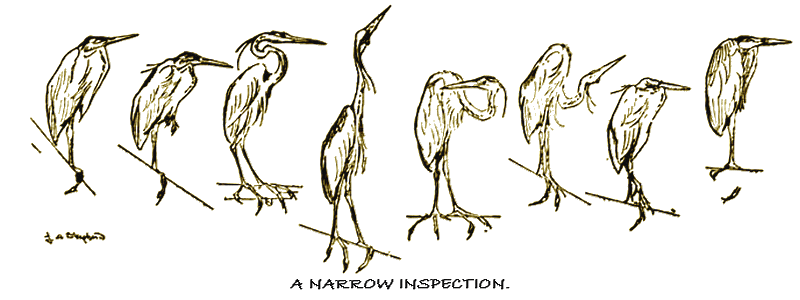
The heron, although no inferior searcher of the ground, will never trouble unnecessarily about provisions already in a safe place. No provisions are in a safe place here among so many birds; but Jerry, the solitary purple heron in the cage just behind us, has a tiny pond to himself. Throw a little fish therein, soon after Jerry's dinner. Jerry, without leaving his perch, will inspect it narrowly—from above, to see if it be alive; from the side, to judge of its plumpness; and from each other direction, for purposes which any other intelligent heron will at once understand. Then Jerry will return to his siesta, his next snack assured, for he knows that the fish can never leave the pond.
A bird will never sacrifice an ounce of dignity if it may be saved. Observe a little crowd of the smaller birds here swoop upon a handful of biscuit-crumbs—ruffs, gulls, and maybe a little oyster-catcher; see then a larger bird approach. All these dignified little birds at once raise their beaks and stalk gravely and deliberately off, with an unconcerned expression of having had quite enough for themselves, so that the big bird may do as he likes with the remainder.
The sudden appearance of a man in the inclosure may cause what seems to be a temporary upset of the general dignity—that of all the birds, big or little. All join in a tempestuous swirl, filling the air with flappings and small shrieks. But, the shock over, the swirl becomes nothing but the collective fly round, by way of exercise, which is a regular part of the day's enjoyment at the Night Herons' Pond.
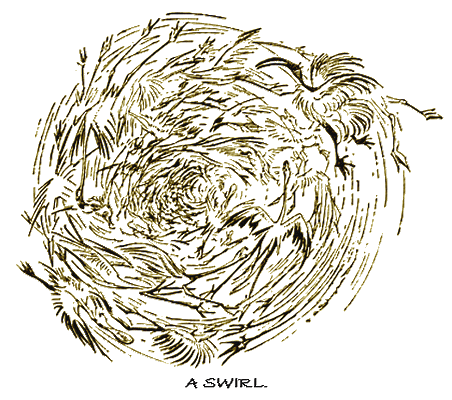
Though the man stay, the swirl will soon settle, and the swirlers join in a stately walk-off—away from the man, however—a sort of quaintly regular parade—a church parade, let us say, for its decorum. The most imposing parader is the horned screamer, who is a sort of pageant by himself. He stands upright, spreads his wings wide, throws his head back, and lifts his extensive feet much before him—a very beadle, a very drum-major among birds.
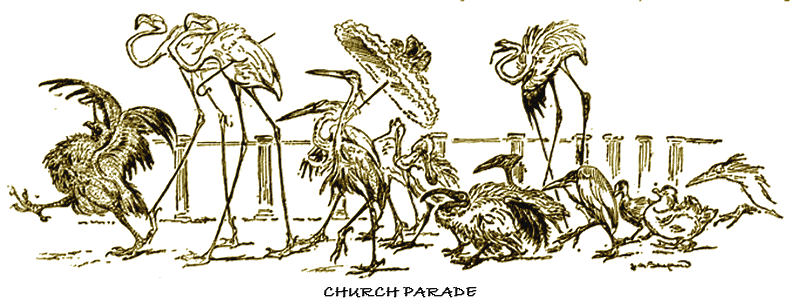
Wherever so many animals as this, of any sort, be gathered together, there will be found some comedy characters. The African hammer-head (or, more politely, the tufted umbre) is a comedy character, when he is on foot. His comic head labels him at once; and he plays up to his comic head. He doesn't join in the swirl when a man comes in—on the contrary, he runs towards him, and, cocking his sharp eye, looks out for—something to eat. Then, as the man moves off, the hammer-head trots zealously after his heels, looking for that something to eat in the boot tracks. A human being, in the belief of the hammer-head, is a moving thing which exudes everywhere something to eat.
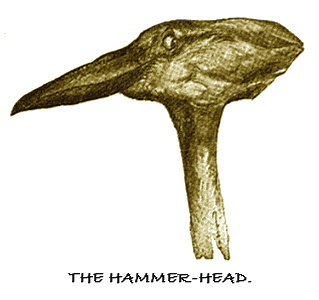
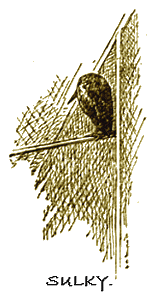
Wherefore, in whatsoever place a human being may have been, and upon or near whatsoever thing he may have touched, the hammer-head expects to find refreshments. He rushes immediately to that place and hunts assiduously. If he find nothing, his first expression is one of unbounded surprise.
The laws of Nature, it would seem, are being defied. So he looks again, to make quite sure. But there is really nothing. He thinks for a second, and then glares with sharp suspicion in the direction of the retreating creature.
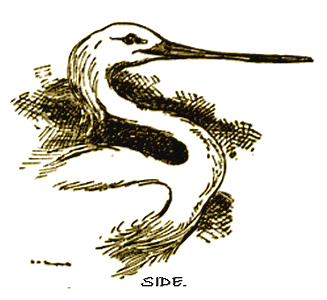
It can't be a human being, after all. It is a mere fraud; some conceited thing trying to look like one. Else, why isn't there something to eat? And he turns off with contempt. But when the hammer-head takes to flying, the low comedy goes, and, with his broad brown wings and swooping flight, he is rather a professional beauty than otherwise. Nothing but the flap of the hammer-head's wings will disturb the sulky heron—the solitary misanthrope whose place is the right-hand upper corner of the great cage, and whom nothing will tempt down.
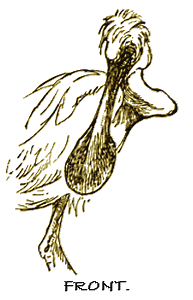
The spoonbill might be a professional beauty himself, if he could always be looked at sideways—a white, graceful, slim-beaked beauty; but he will turn his head about (looking for something to eat), and then that fearful, bibulous nose upsets the picture completely.
Even the snowy egret provides a little fun at times, although he doesn't mean it. He is very much in earnest, is the snowy egret, and objects, with long claws and a very sharp beak, to the earthly existence of all other living things.
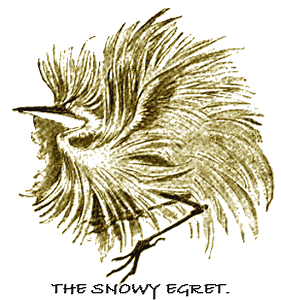
He has given up chasing the other birds about the inclosure, because he couldn't always catch the little ones, and sometimes the big ones caught him. So he sits on a convenient tree and waits for anything assailable to come within two yards. Then every fine feather on his body stands up electrically, and—well, go and see him, if you like a picture of fury. It isn't always easy to express your egret—this last being a sentence wherein one might build a laborious pun were the laws of ordinary decency in abeyance.
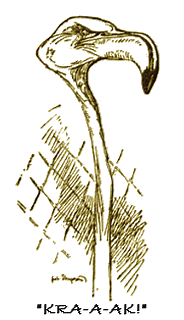
But the great bird here is the flamingo. I like the flamingo. He runs a deal to neck and legs, but his heart is in the right place. It really can't help it. You can't imagine a startled flamingo's heart jumping into his mouth—the way is too long and bendy; while as to its sinking into his boots, even if he had any—just look at his legs! When first I arrive at this inclosure I always whistle for Sam, the big flamingo. Sam immediately lifts his head and takes a long sideways look to assure himself that it is an acquaintance, and not an impertinent stranger; then he says "Kra-a-ak!" and goes on looking for something to eat. I reply cheerily. He lifts his head again, and approaching the wires and standing at his full height, with outstretched wings, says "Kra-a-ak"—not at all the same word, observe, although of the same spelling; the tone and meaning being more confidential. Thereafter he keeps nearer, and we conduct a mutually improving conversation of whistles and kra-a-aks.
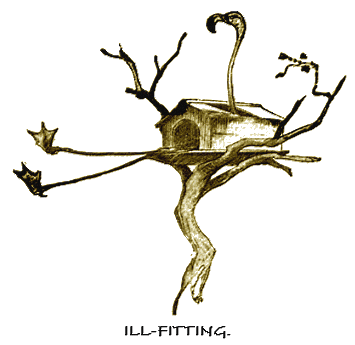
Sam is the acknowledged monarch of this inclosure. He is a gentle and considerate monarch, but won't stand any nonsense. He has been observed to inspect the small dove-cots fixed upon the trees in the inclosure, as considering it ill-fitting that the subject should enjoy a roofed habitation and the king none; but considering the habitation itself equally ill-fitting—except regarded as a waistcoat—appears not yet to have attempted to take possession. Sam, stately bird, presides over his subjects with a proper majesty. He looks from aloft upon their little weaknesses, their small fads, their quarrels and their friendships, and is amused, in a lofty and superior sort of way, just as you and I are, my friend.
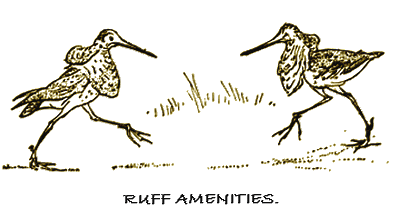
He looks from above with indifferent interest on the ruffs, for instance. The ruffs are small, but there is character about them. See two approach each other from opposite directions—looking, perhaps, for something to eat. They meet, stop, straddle wide their legs, and blow up their neck-feathers. Regarding each other fixedly, they rock solemnly to and fro. Then they let fall their collars and go off, each on his way, as though nothing had happened.
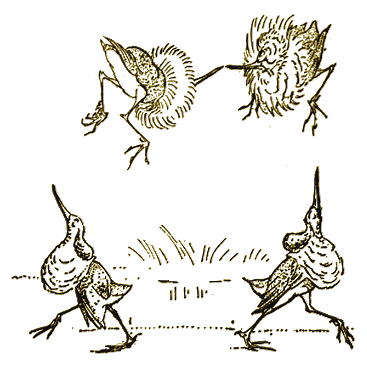
It is a rude courtesy—a sort of ruff etiquette, in fact. Sometimes, however, this putting on of frills—a the same thing will do in other places—leads to fights.
And over all reigns the majestic Sam—over the fluffy-necked little ruff, the perky hammerhead, the dissipated spoonbill, the jolly ibis, the sedate screamer, and the excitable egret. Nothing can disturb Sam's serenity—nothing, at any rate, which can happen in this aviary.
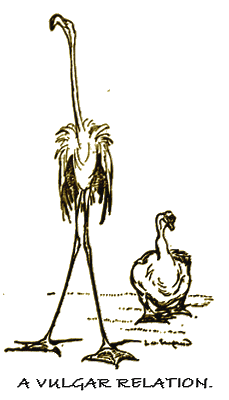
One thing might do it—a thing I hope never to see happen. An ill-natured keeper might bring in a common goose, and introduce him. Now, I believe that this would cut Sam's feelings sorely, because the flamingo, after all (although here it is treason to say so), is really only a kind of goose, in the classification of the spiteful naturalist; and publicly to bring him face to face with his vulgar and ungraceful poor relation would give Sam away cruelly among his subjects. The poor relation is a mere low caricature of Sam in neck and legs; and a thing which, in its own ridiculous way, makes a preposterous showing off and posing of its burlesque neck.
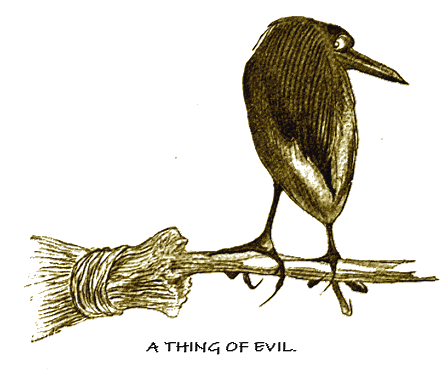
Which reflection leads us to another—that the birds in this inclosure may be classified into two sorts: those who are proud of their necks—as the ruffs and flamingoes; and those who are ashamed of them—as the herons, who bury them between their shoulders, until, from the back, you shall judge one a humpbacked old witch and a thing of evil.
King Sam, with all his majesty, must take exercise sometimes—usually after the royal bath. Whereat all other birds avoid his path, and hide in unconsidered corners. Sam's exercise is a devastating rush, comprehending all this inclosure, without consideration for trees, or shrubs, or birds, or rocks, or water. He merely sweep through all, in strides of many yards, with outstretched neck, and wings a-spread and gorgeous in black and scarlet. This for some five stormy minutes, and with again and again a "Kra-a-ak."
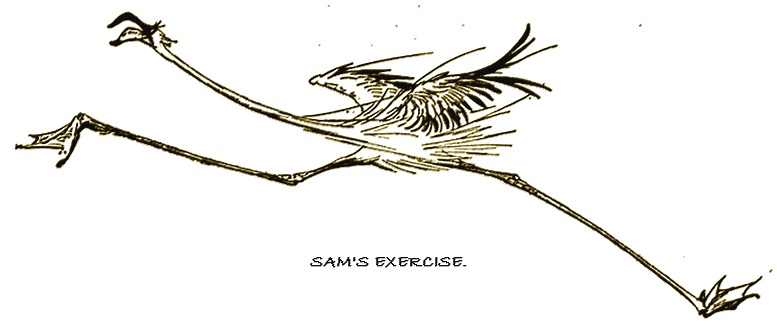
One only among the flamingo nobility retains, in this climate, a pink flush over all his outer feathers; and he, good soul, is subject to rheumatism or some similar affliction; wherefore he limps painfully until Church, the keeper, anoints his legs with oil, and is an object of small consideration among the plebeian gulls and ducks about him; for wherein is the grandeur of rheumatic legs, even when so many times as long as thick? And so, in a quiet corner, he stands, with a special pail of refreshment within beak-reach, and nurses his affliction. And smaller birds, with a certain timorous impudence—for he has still a fearsome beak, which will reach a long way—trot up and pretend to sympathize with him.
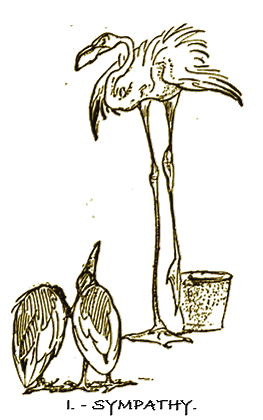
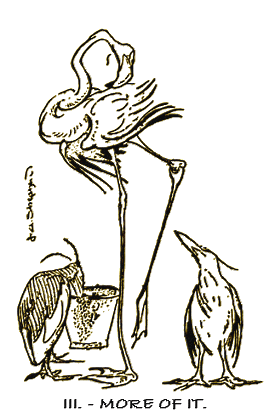
You have only to look at them to read all they are saying. They suggest all sorts of treatment, just as people do to human rheumatics. They begin by suggesting reasonable remedies, and, growing bolder by reason of impunity and the titters of their friends, venture upon impertinence. That little ruff who has just escaped the big beak probably suggested the process of standing on his head and giving his legs a rest, or something equally savouring of errand-boy wit.
There are two wicked old herons who offer advice with ulterior designs.
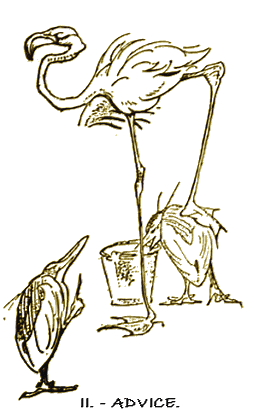
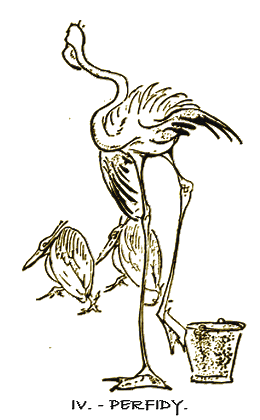
They assume a sympathetic and soothing demeanour and approach together. They inquire anxiously for any improvement. There is none. Then number one engages the invalid's attention while number two sidles round behind in the direction of the refreshment-pail. I know what number one is saying as well as if I could hear it—"Now, there was an aunt of mine," says number one, "who suffered terribly. She had all the best doctors and tried everything. All the specialists gave her up quite incurable.
Well, one day, who should come in but an old neighbour of hers—one of the Kingfishers. 'Haven't you tried French polish?' says he. 'No,' says my aunt, 'and don't intend.' 'Oh, but you should try French polish,' says he. And so, after a lot of persuasion, she tried it; and I assure you—" etc., etc.
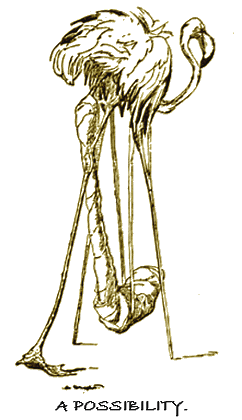
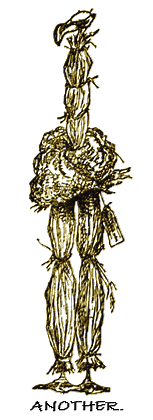
In course of which number two's head is hidden in the refreshment-pail. Presently the head reappears, and number two, springing suddenly into notice, says: "Now, I once had a grandfather who was a sad victim. He had all the best doctors—dear me, but that leg must really be very painful. I can't help noticing it—such a really noble leg too! Really I am sorry. Well, as I was saying, my grandfather was a sad victim. Tried all the doctors, you know—all the famous specialists; cost him a fearful amount. Nothing seemed to do him any good. Indeed I always said he only got worse and worse. Really we quite began to despair of my poor grandfather. Well, one day—just as it might be to day, you know—in drops an old friend—bittern—just as it might be me. 'Dear me,' says the bittern—just as I might say to you—'why don't you try dynamite—'" and so on, and so on; while number one fades off towards the pail. It is a sad world, wherein even herons' friendship is false.
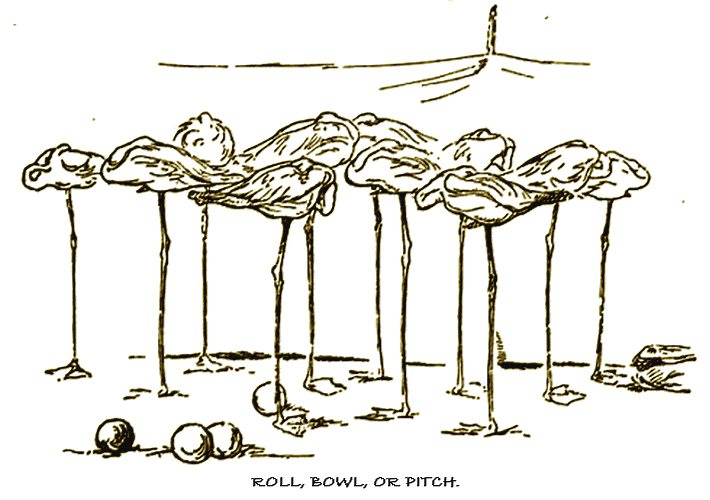
I rather dread the winter for this invalid. Church may pull him round now with much oil, but the winter will assuredly call for crutches and a foot sling.

Or will they swathe his legs in great folds of straw and matting as they do a tropical plant or a barnstormer brigand, leaving him to stand the winter through in a warm corner, and watch his merry cage-mates at their winter sport?
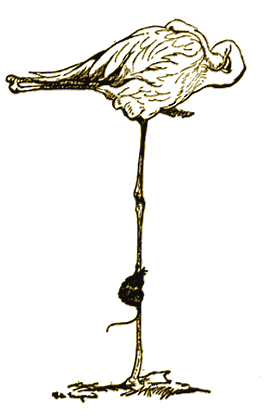
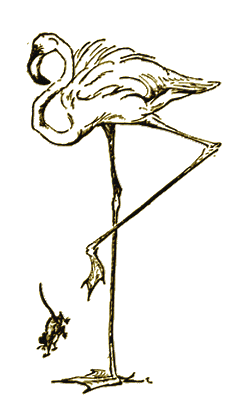
I should like to see—to see their winter sport—their winter sport—see their winter sport. Yes...Snow-balls, no doubt, and sliding on the pond...on the pond...But it's warm now. Yes...The present sport is a sort of cocoanut-shy business, with trussed poultry for prizes. Is it really the flamingoes, standing on one leg apiece? Flamingoes—red wings—flaming goes about the cage.
That's a joke; funny...Roll, bowl, or pitch...See that rat? He' going to climb one of the sticks. Rats always expect to find something to eat—top of a stick. Part of their system. Poultry at top opens out and unfolds another stick—leg.
Why, it's Sam. That's funny! Rat bolts—he'd better. Not quite sure I shouldn't bolt myself if Sam were after me with that beak. And eyes, too; seem bigger than usual; and closer. Sam's a shocking monster. Rat bolts up stage.
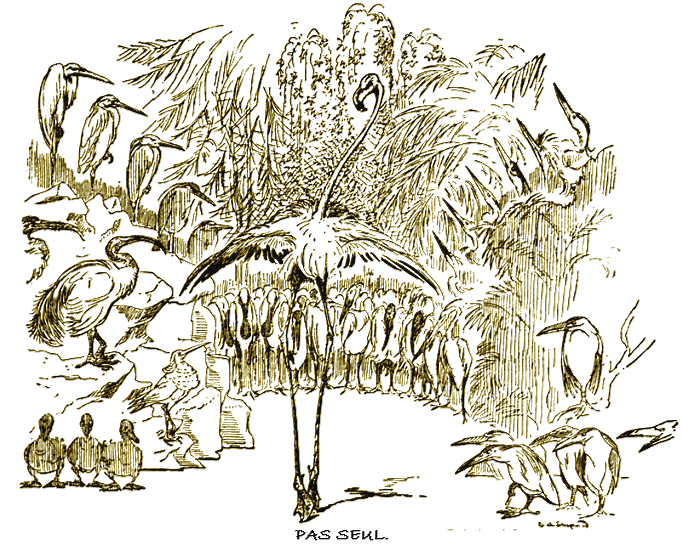
It is a stage of course. Rock scenery R., tropical vegetation L.U.E, and back. Chorus of herons and ibis—ibises—ibiseses. Sam is M. le Brun, and M. le Brun is première danseuse. Wriggles down centre of stage on toes, secundem artem. That's Latin. Don't remember the ballet—or is it pantomime? Herons in front look at me and grin fiendishly. Also ducks; very good masks. Sam pirouettes, kicks twice, and smiles. Wonder what he'll do when he wants to kiss his hand. Must think it over. Why, here come the others, invalid and all. He's all right; he can kick higher than any of them. They all range up behind Sam and begin a furious pas de quatre. It is very fine, and not in the least surprising. The herons seem to be growing a great deal larger, and stare horribly. The pas de quatre goes faster than ever. It is getting extravagant, not to say ridiculous. If the County Council—"Good afternoon, sir! Do you see we've bred another pair of Mandarin ducks?"
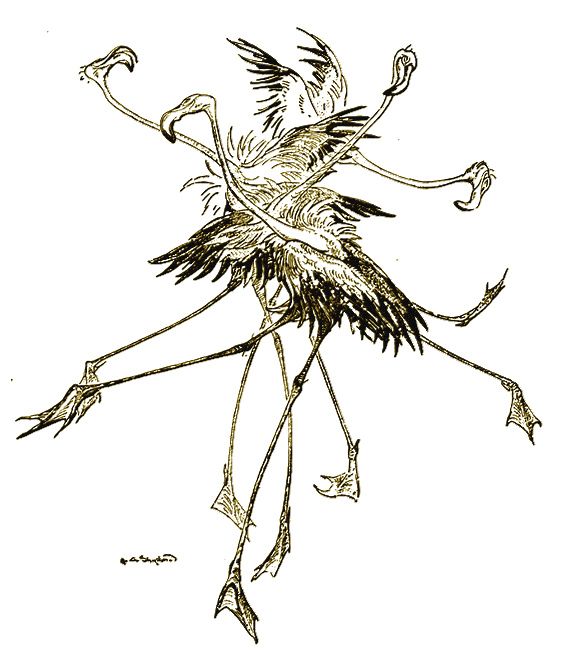
The keeper really has a most startling voice. Now, if I had fallen asleep in the sunshine—
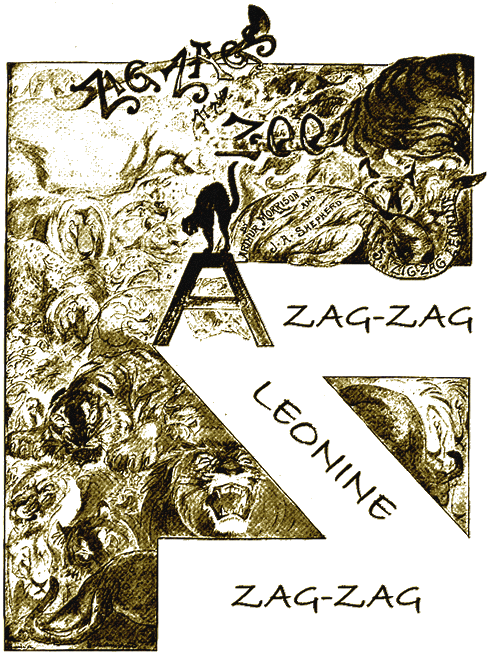
A TIGER is not a lion. This will be understood, though I treat of tigers in a leonine chapter. For neither is a leopard a lion, nor a cheetah, nor a puma, yet all these live in the lion-house. Wherefore must the title be held to refer to the locality, and not to a section of its inhabitants. This is probably called the lion-house in a formal survival of the spirit which gives the lion a kingship among the lower animals. But the lion really is a fraud—as much so, at any rate, as the camel. It is very sad to find so many downright frauds among the innocent lower animals, but there isn't a department in these Gardens where you shall not discover a humbug of some sort. In this house, perhaps, there is less humbug about the tigers than about any or the others, although even the tiger has his little hypocrisies; still he is justly and honestly indignant that the place, by title, should be given to the lions, and is supercilious in his bearing to human creatures in consequence.
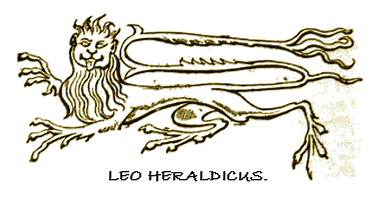
It must be noted that the show of lions here to be seen, large as it is, is by no means fully representative of the various species. There are none of the more familiar of our English lions; the Red Lion, the White Lion, the Blue Lion—to say nothing of the accompanying stomach-warmer—familiar as they are in our town streets, are not to be found here; nor is that noble creature, the lion of heraldry. This is a pity; because here he would be fed, and would get rid of that painfully greyhound-like waist which is among the more noticeable of his characteristics; and I should have an opportunity of inspecting that extraordinary growth, his tail, with its many vigorous sprouts and branches; and many other of his members, an acquaintance of which in the flesh I have long much desired.
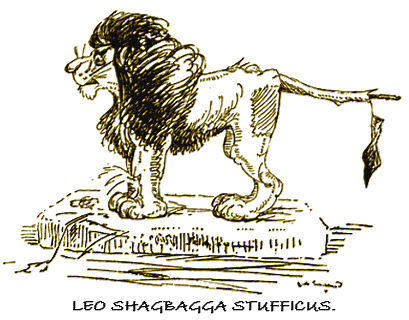
Nor is the King of Beasts represented as he was of old in the British Museum—by the remarkable species Leo shagbagga stuficus; wherefore also I grieve. For in the museum variety were many strange bodily developments and physical functions unknown among others. Leo shagbagga stufficus might be approached with perfect safety, and any naturalist sufficiently intrepid might, in the fabled manner of Richard Coeur de Lion, boldly thrust his hand deep between the beast's open jaws, and from his innermost vitals extract upholstery. It was never very good upholstery, being chiefly flue and dusty straw, but it was quite equal to imparting a distinctive want of shape which at once stamped Leo shagbagga an unique species. The tail, also, has been known to yield walking sticks. External patches of differing tints, attached by large stitches of pack-thread, did not indicate a separate variety of this species, being peculiar to individuals only.
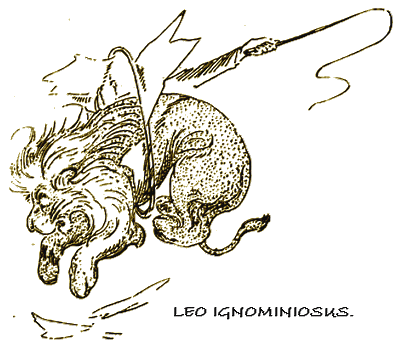
I fear Leo shagbagga is now an extinct species, but the Blue Lion, the White Lion, and the Red Lion we may see every day—although not here—and become intimately acquainted with. Also we may see the British Lion—the cartoon lion—who waves a Union Jack, wears a straw hat, and smokes a pipe. Familiarity with the lion has bred so much contempt for him that really we shall be going very little further in classing him a domestic animal. They keep him in a shed, whack him with a stick, and make him jump through a hoop—and a poor old sheep he seems, he who is treated thus in caravans. The lion, as I have said, is a fraud; a posing, theatrical, Turveydrop and Bobadil of a fraud.
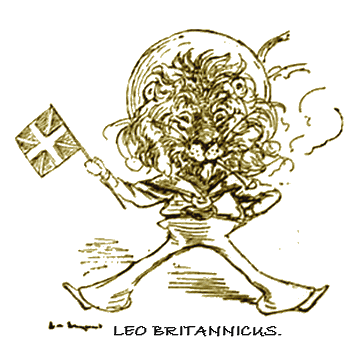
Look at him in this, his house. He turns up his nose at the visitors an affects a magnanimous superiority. If he were a human thing he would wear pince-nez and a velvet jacket, and look pityingly great at picture shows, though in his inner heart a mere beer-drinking vulgarian and a smoker of pipes. So always with the lion; he will pose fine and large if he meet you out for a walk in a jungle, and do his utmost to terrify you; if driven to it he may take the liberty of helping himself to a mouthful of you. But all this is only if he has first failed to sneak away unobserved. In South Africa a team-driver, finding a family of lions in his path, will calmly take his long stock-whip and whip them away; and they go meekly, glad to escape the lash. When no stock-whip is handy, a traveller from England is used—preferably with a title.
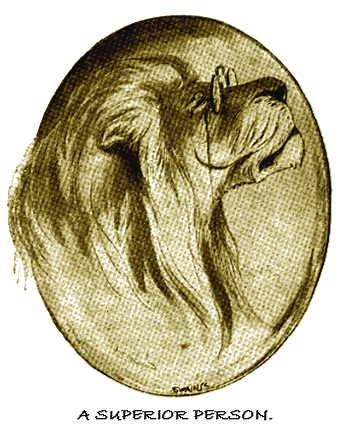
Here in one respect only are the lions treated with absolute cruelty, but in that respect the cruelty is of an aggravated sort. Come into the lion-house at what time, on what day (except Saturday and Sunday) you please, and you shall find various artists, and more various people who are not, nor ever will be artists, sketching and daubing and outraging the features and the feelings of lions and tigers.
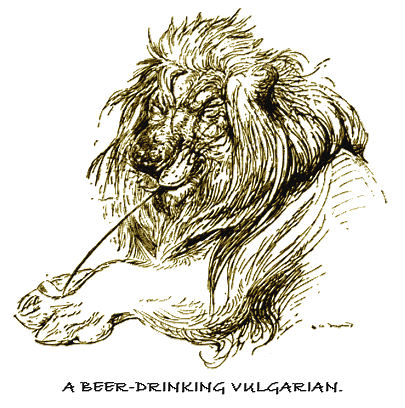
Perhaps, however, it is a moral dispensation, teaching the animals to look forward to Sunday with longing, as a day of blessed relief and rest; guarding their conduct in the matter of Sunday observance, while the bars and the keeper take care of it in other matters.
Little defence is available against all these daubers; but it is possible for a lion or a tiger to lie lifelessly and flat upon its side, offering only the uninspiriting outline of a rug or an empty sack, as though the pelt had been cast, and the animal were somewhere else.
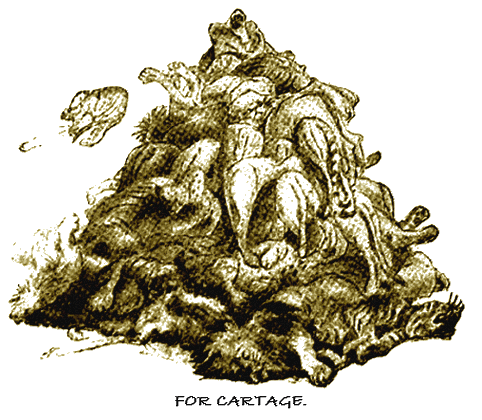
This expedient is largely practised, until it would seem the most natural thing in the world for a keeper to enter with a pitchfork and toss all those empty skins into one heap, to be carried away on wheelbarrows. Of the counter-expedients of the artists—of the pinchings of tails left near bars, of the twitchings of protrusive whiskers, and the pea-shootings in the countenance—let there be silence, lest others be tempted to imitate and fall victims to the casual paw, or to the little less deadly detection of Sutton, the keeper.
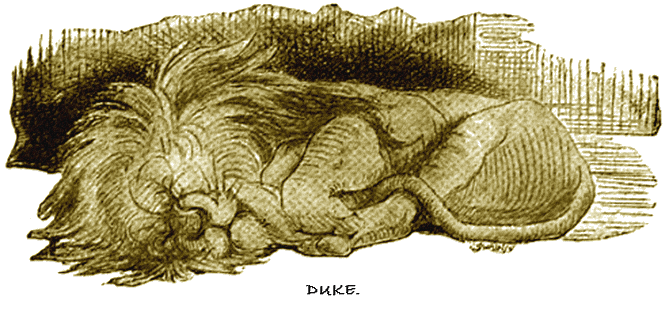
Even a humbug may be a handsome humbug. Look at Duke, the wicked old Nubian in the end cage, as he sits serenely and loftily looking over your head. He knows better than you do that you admire his fine, uplifted head and his great tawny and black mane.
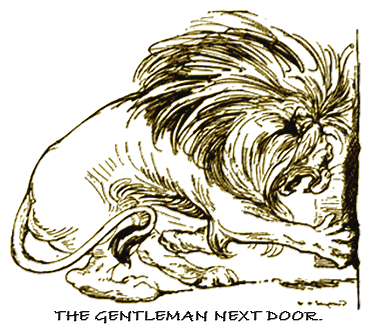
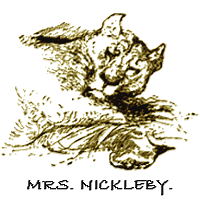
Duke is a great character in his way. Handsome old chap as he is, and proud of it, Duke never was a gallant—never a lioness's lion. All sorts of attempts have been made during his long residence here to mate him, but Duke draws the line at Duchesses. Perhaps he would treat the ladies better if he were allowed to make his own selection. When they are chosen by the keepers he chews them himself. He once gave a lioness a fatal bite, but that is his only claim to the designation of a lady-killer. And so he lies curled up alone, hugging himself with reciprocal affection. I remember a keeper once making a long and elaborate joke about this lion putting up his dukes and putting down the Duchesses, but have forgotten its exact terms.
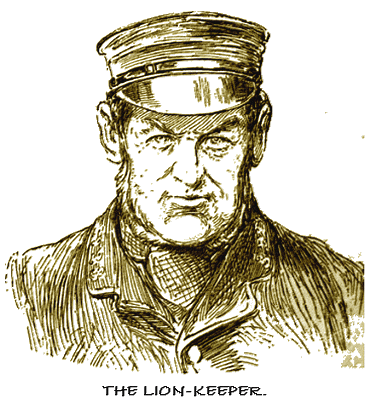
Another lion, a little further along, does all Duke's share of love-making, in addition to more than his own. The keepers have their own name for this lion, but I prefer to call him The Gentleman Next Door, any lioness who happens to be in the adjoining cage being Mrs. Nickleby. He does not throw her cucumbers and vegetable marrows, for several obvious reasons; but he roars and scratches at the iron partition door with a vigour proper to the part, while Mrs. Nickleby lolls indifferently in her own place. Prince and Nancy are a fine old couple of lions—married fifteen years, and a peaceable, comfortable old pair still. Ask Sutton, the head lion-keeper, about Prince and Nancy. Sutton, by-the-bye, will soon have been employed in these gardens for forty years. If I were a statistician I probably could prove, by rule of arithmetic, that Sutton has been killed many times over, in the course of so many years among lions and tigers. Not being a statistician, I am compelled to admit that he hasn't. Sutton enjoys the distinction of being the only thing in the lion-house never sketched by the artists and the sketchers who are not artists.
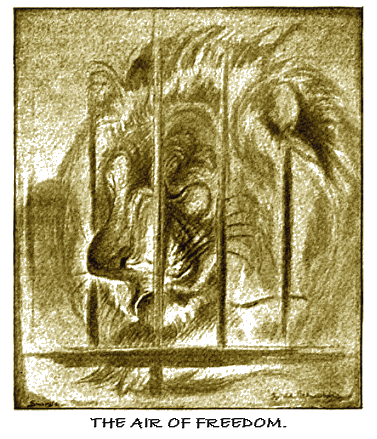
It is noticeable that a lion—any lion, every lion—likes to take his ease with his nose stuffed out between the bars—by way, probably, of sniffing the air of freedom, and feeling as much at liberty as possible in the circumstances, regardless of contact with the iron of the cage. I am not sure that this muzzle-exposure is always good for Felis Leo; I have a suspicion that it may be responsible for some of the toothaches wherewith he now and again is afflicted, and ascribes, probably, to Sutton's partiality for open windows. A lion with a toothache is a pitiable thing; still, a thing to which I should prefer to administer comfort from the opposite side of the bars; and one the extraction of whose tooth I could leave, without envy, in other hands. Any person of ordinary humanity would prefer losing a tooth of his own to inflicting the pain of extraction upon—say Duke here—with his own hand. There is more tenderness for the feelings of dumb animals than one might imagine in the world, in such circumstances as these. Although why Duke should be called a dumb animal is not easy to explain after hearing his shocking language if dinner arrives a little later than suits him.
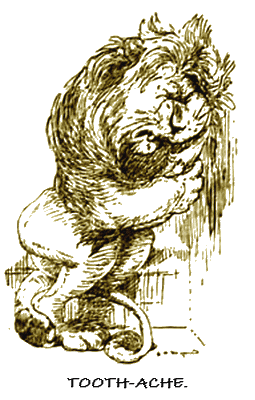
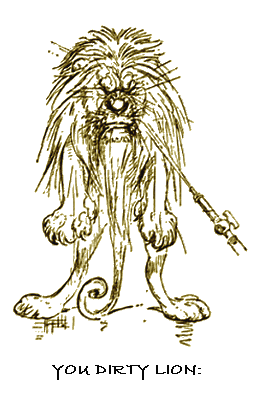
Notwithstanding all his grandeur and all his posing, the lion doesn't sufficiently wash his face; nor, indeed, any other part of himself. A tiger's ablutionary lickings are disproportionately few and small in area compared with those of the humble tom-cat of our native tiles. But compared with those of the lion they are profuse, excessive, superfluous. The lion has not yet learned the lesson of personal cleanliness. Some day, if I think of it when I see him, I shall suggest to Sutton the expedient of turning the garden hose on these lions. I don't believe they would enjoy it at first, but their education must begin somewhere. And Sutton might find this process more convenient than an actual bodily assault with soap and towels, although, considered as a spectacle, this plan would have its merits; and might command its price as an advertisement for the soap.

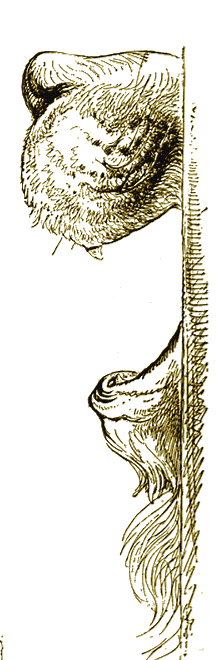
There are other respects in which the lion compares unfavourably with the tiger. Watch them yawning. Yawning, by-the-bye, is the only really fashionable amusement here in the lion-house—after eating. One of the cheetahs has a wooden ball to play with, but a cheetah is naturally low in his tastes, and even he is ashamed of the amusement, pursuing it by stealth, when unobserved, and concealing the ball by lying before it when visitors arrive; and in his inner heart I feel sure he prefers eating—if not yawning.
I have before now felt suspicious of the genuine character of some of the yawns here to be inspected. There are really too many of them. It is largely a mere posing and show-off. "Law, Maria," says the country cousin, "look at him a-gapin'; what awful teeth!" and the lion (or tiger as may be) likes it, seizing the first opportunity of gaping again, and extracting more flattery. So that yawning has become a fashionable pursuit. But there is an inferiority in the lion's yawn. The tiger opens his head frankly and fully, baring his gums and exposing his teeth in all their vicious pointedness. It is a fierce yawn, a downright yawn, such a yawn as could be no yawn but a tiger's. The lion's might almost be a sheep's. His heavy lips overhang his gums like those of a toothless old woman. It is a mere slovenly, ridiculous yawn, with no terror in it. The lips retract a little perhaps as the mouth closes, but all the lustre is already gone from out of that yawn.
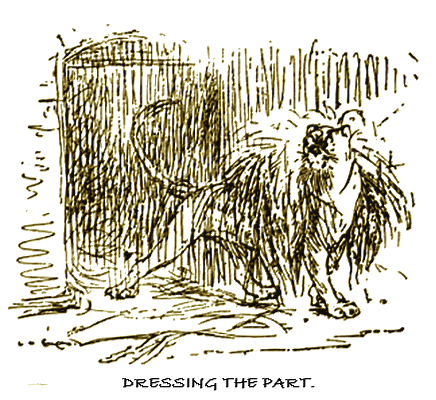
Anybody who looks at the matter with the least care may see that in all things the lion has been accorded an elevation which is not his right. The superstition is long a-dying, even among the lower animals themselves. The puma here, for instance, puffed up with a ridiculous vanity born of having been called the American lion by some naturalist who should have known better, rolls among his bed-straw until enough hangs about his ears to represent a mane, and then stalks forth to be admired. He is encouraged by ignorant visitors who, from his size and colour, assume him to be a young lion, and call him one. I have even heard these sages disputing about his age, and walking off saturated with the animosity born of contentious ignorance, without once looking at the label which published the creature's pumaship to all the world. This sort of thing turns the puma's head, and makes a fool of him.
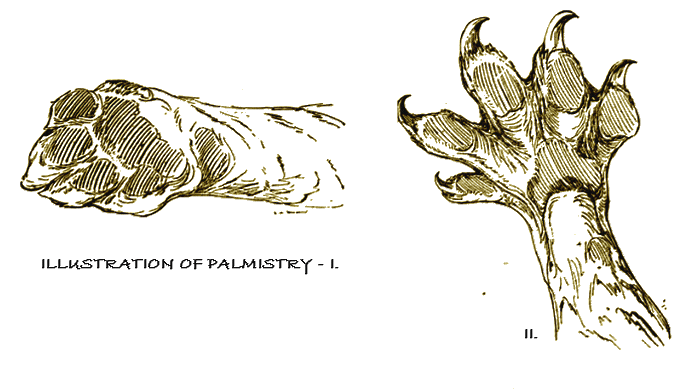
The tiger's superiority to the lion consists chiefly in his candour. He is a wicked, vicious rascal, a thief and a murderer, and he owns it. He doesn't pose. He would always rather run away than be bothered with fighting, unless he happen to be hungry, and so would the lion.
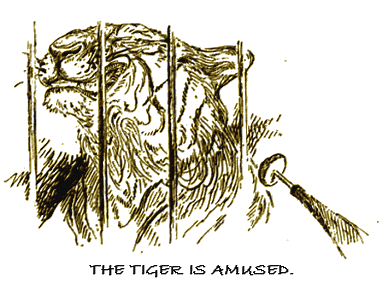
But the lion will attitudinize if he thinks you have observed him, and try to make his running away look like magnanimity. The tiger simply bundles off, without any false pride. These particulars I give on hearsay evidence. They did not seem sufficiently important to warrant the expense of a personal test. Anybody anxious to know more of the lion or tiger has open to him several means of acquiring information at first hand—among others, palmistry. Both the lion and the tiger have paws of great mobility of expression. I have no doubt that if a skilful chiromancist were carefully and painstakingly to examine the paws of either Duke the lion or Tommy the big tiger here, he would before very long be greatly struck by them. Indeed, persons with very little practical knowledge of palmistry have been known, after a very short acquaintance with a tiger's paw, to carry away an extremely vivid impression thereof.
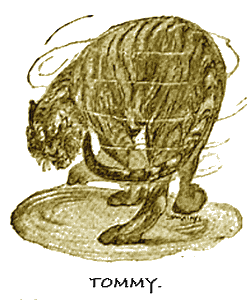
It should be more generally understood that a tiger does not eat buns. There is a popular superstition that he does—a superstition extending also to lunch biscuits, bull's-eyes, and acidulated drops. Worthy old ladies are the chief votaries of the bun superstition, little boys and girls attending school treats taking the bull's-eye and acidulated drop branch. A tiger doesn't resent the offer of a bun as an insult—he is merely amused. Offer a bun to Duke, and he will express a desire to bite off half of you at once.
Tommy and Minnie are a long-wedded tiger couple—at the opposite end to Duke. And in their cage, if feeding-time be near, you shall see a quaint thing. Every animal in this place carries an internal clock of extreme accuracy, which sets him roaring furiously a little before four o'clock—every one but Tommy. Tommy makes a clock of himself entirety, to measure up the tedious minutes. He makes no sound, but walks, persistently following his tail, in a circle. As the minutes pass the circle narrows and the pace quickens, until, as the dinner-waggon rolls in its appointed grooves, he turns completely on an axis, his head making to the left, his tail to the right. And so until his dinner is actually within the bars, when he picks it up in his stride and retreats with it to a corner.
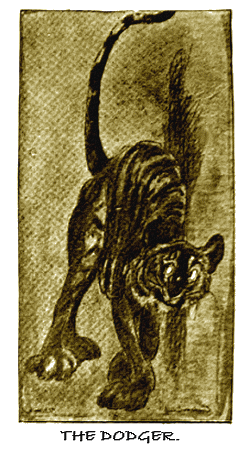
The smallest cat here is not on show. This is Dodger, the baby tiger. He lives in an elegant private bed-sitting-room, built of strong planks, at the back of the house, by the door of Sutton's quarters, and in full view of the iron bathing-machine arrangement whereby the lions and tigers pass out to their back playgrounds in fine weather. The Dodger is not, perhaps, altogether beautiful—in a physical sense. He runs largely to ears and feet, and has the general appearance of having been put together hurriedly, with the wrong neck. But Dodger means well, and will play with your hands as long as you please to risk a nip of the teeth. If you are a stranger he will mew at you at first, which, as his voice is just breaking, is an exhilarating thing to hear, being a varying compound of roar, howl, mew, and whimper, grateful to the tympanum. But he soon grows friendly, especially if you place your hand casually on the dinner-waggon standing near his quarters.
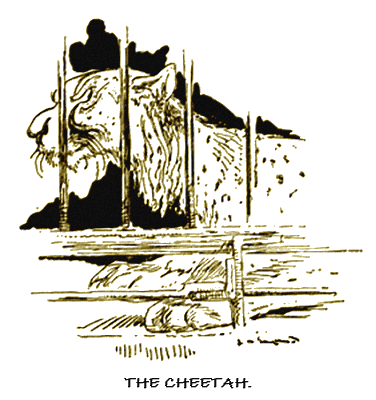
Another affable creature is the cheetah. With his lithe limbs, strong neck, and small bullet head, he has a certain prize-fighting appearance, but, like the Game Chicken, is quite affable. The cheetahs here are subjected to a certain ignominy which I trust and believe the Society is not intentionally responsible for. A board inscribed "Beware of Pickpockets" is hung conspicuously over their heads. It is scarcely credible that the proximity is intended as suggesting a horrible pun upon the name of the poor animals, but it arouses suspicions in the minds of some people, and is apt to place the unfortunate cheetahs in the abject position of accomplices in the outrage. And when the Dodger is promoted to one of these large cages, the suspicion in his case may even be greater, and naturally; with the possibly redeeming feature that only a lame joke, and not an inhuman pun, will be suspected. Before then, however, the reproach may be removed.
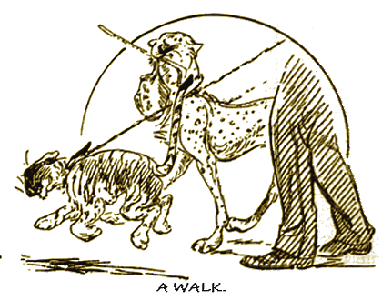
In the early morning, before the gardens are opened, Sutton, Dodger, and the cheetah go out for a walk about the grounds, amid a shower of envy. Michael, the big bear, in particular, looks from behind his window blinds in much displeasure. I should like to take Michael out for a stroll—say along the Strand; there would be a deal to amuse him.
It is a pity that some of the leopards are not as good-humoured as Dodger and the cheetahs.
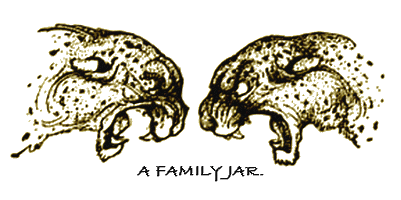
One particular pair live in a perpetual mutual threat to bite off each other's heads. Anything is a sufficient provocation. Whatever the one is doing arouses the jealousy of the other—and there you are!
We human animals have long held a conceited belief that other creatures shrink and cower under the gaze of our eyes; and as example we point to the big cats. A tiger, we say, will not look a man in the face. He won't, but fear is not his motive. It is superciliousness—a lofty affectation of indifference, and nothing else.
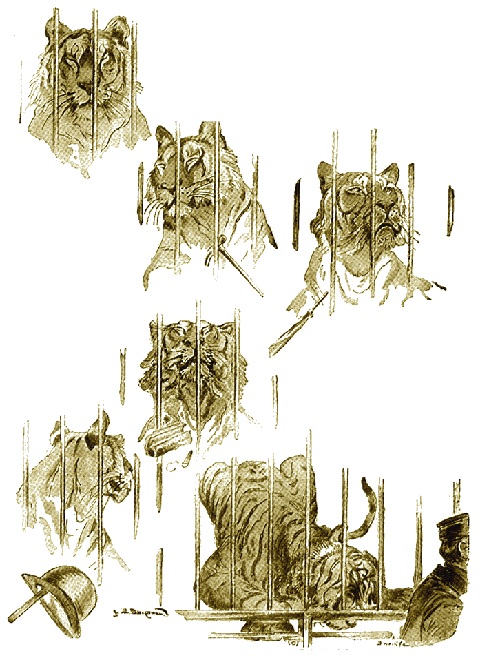
Every cat is the same in this respect—lion, tiger, leopard, panther, Tom or tabby. It is only another expression of the cat's native vanity. Loving to be stared at and admired, he makes a great show of the most contemptuous indifference to everybody. Before you reach the cage you may now and again detect, from the corner of your eye, the cat observing you with some interest; after you have passed you may see the same thing—if you are very sly. But while you are before him, and looking at him, the tiger cuts you dead. You don't exist—you are mere impalpable space.
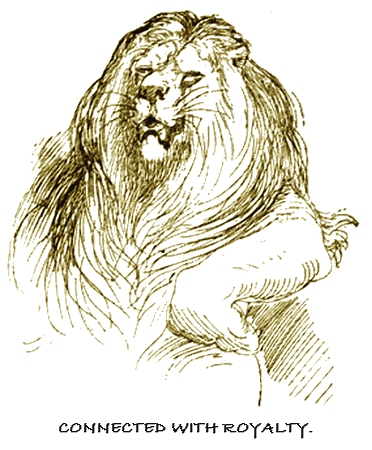
Some people don't like this treatment and wave sticks and umbrellas to attract his attention; but he only gazes dreamily away into some other region of space. They get angrier, and hurl guidebooks and cigar-ends; and he stares placidly at the ceiling. They waggle hats on sticks; as irritatingly as possible, and he glances casually at his bedroom door. Even when it seems proper to transfer his gaze from the space at the left of his interviewer to that at his right, it sweeps round with a most offensive air of passing over mere space; or perhaps it passes over the insulted person's head. With the keeper it is different. No tiger is a hero to his keeper, and the tiger knows it. The keeper has found him out long ago, and it is useless to attitudinize before him, or to attempt to ignore his existence. So the tiger tries to rush at him under the bars. The keeper is associated in his mind, and very naturally, with something to eat. The keeper always appears with the beef, but although the beef comes between the bars, he is always defrauded of the keeper. Wherefore the keeper is a bête-noir, a constant reminder of a good meal put under his nose and taken away again.
Perhaps it may be hinted to those nobly ambitious of attracting the notice of a lion or tiger, that the hat-trick may be expensive if tried upon a young and frolicsome animal. A sudden temptation, such as the offer of a new hat, may cause a young lion or tiger to forget his dignity for some little time—as long as the hat lasts. It was a very few Sundays ago that Victoria—the young lioness here belonging to the Queen—secured a very decent bowler, which had been extended with a view of reaching something from the ledge before the cage. Victor, her mate, although, of course, connected with Royalty by marriage, so far unbent as to participate in that hat, which provided a pleasant twenty minutes' entertainment; at the close of which the late owner borrowed a peaked cap from the keeper, and went home. But Victor does not unbend as a rule. He is an affable lion, however, perfectly friendly with those he knows. He might almost be allowed out, were it not that the artists and the photographers, and the daubers and sketchers who are neither, would probably suffer from his natural indignation. So he sits behind the bars and dreams of the golden time when all things shall be free and equal, and he shall kick those people and all their works into the outer darkness.
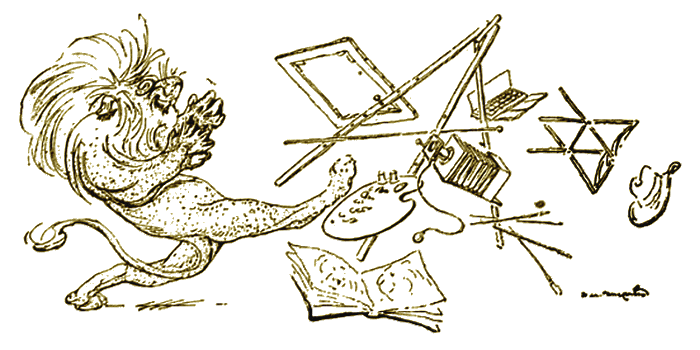
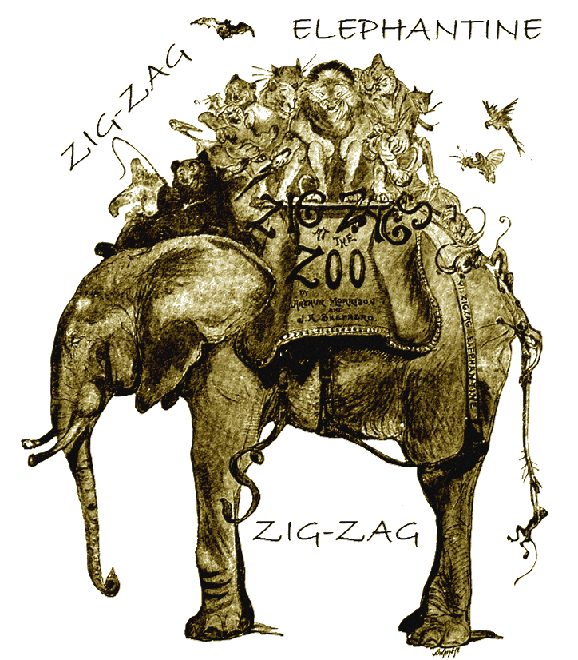
SUFFA CULLI, Jung Perchad, Jingo, and Solomon—where are their enemies? What human thing so base as nurse ili-will for the genial elephant? The jolly elephant—the meek, all-obedient elephant—the elephant, who provides the world with ivory, and Sunday-school anecdotes, and rides for twopence! Though I turn from my fellow-man—having found him out—though every other thing that crawls, runs, or flies revolt me, still may I keep my faith in the elephant; for assuredly he will be worthy thereof. He, almost alone among living creatures, has never betrayed my trust. I believed in the lion—the picture-books of infancy taught me of his valour, his magnanimity, and all the rest; but the lion has turned out an impostor. I believed in the camel—his intelligence, his long-suffering docility; but the camel is a humbug. In the elephant I may still believe. All those charming stories, wherein the elephant never forgets an injury, nor is ungrateful for a benefit—usually expressing the facts by squirting water over somebody—all those charming stories I may still turn to for comfort amid the tribulations of this world, with confidence that even if they are not all strictly true, they are at least reasonable lies.
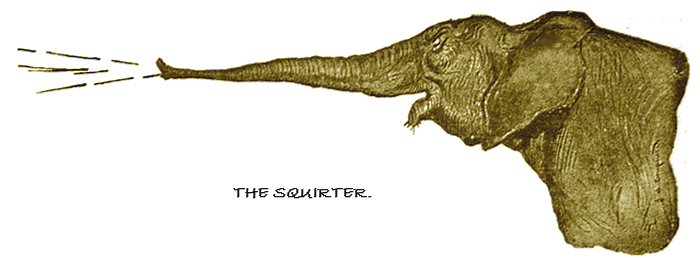
I look back with much affection upon the virtuously-squirting elephant. The squirtee most clearly to be remembered is the bad tailor who pricked the elephant's trunk.
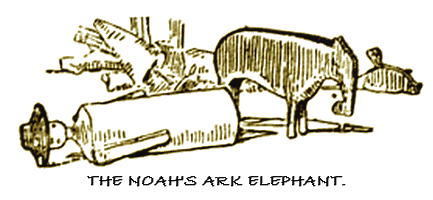
The squirter was, I believe, the first elephant whose acquaintance I made. I certainly knew him long before I knew that other virtuous elephant who broke a man's head with a cocoanut, to compensate the man for breaking a cocoanut with his head. I almost think I knew him before I first met the Noah's Ark elephant. The Noah's Ark elephant was my most confidential playmate, and tasted rather of garden-mould till the paint came off, when he lost his grittiness and became a pig, having broken his trunk. He was not very broad in the back, it is true, having been made of a flat piece of wood, but he was a very interesting animal before he was a pig.
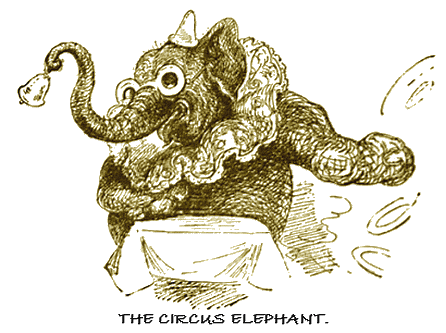
I was much more intimate with him than with Noah, who was a little stiff, not to say stuck-up. As a pig his career ended suddenly in a memorable maritime disaster—when a vessel in my ownership, chartered at the time as a cattle-boat, foundered in the duck pond with most of the farmyard and a good deal of the ark.
It was while the Noah's Ark elephant was a pig that I first saw the circus elephant. He was not altogether a fair specimen. He was rude. He rang an immense railway bell for his dinner, and when he had finished one course, swept everything off the table with his foot. None of the elephants in this place would behave like that. Even Jingo and Solomon, who are young—mere boys—know better than that, and take buns and apples most respectfully. The circus elephant, too, played low practical jokes with the clown, and danced on a tub at a fatal sacrifice of dignity.
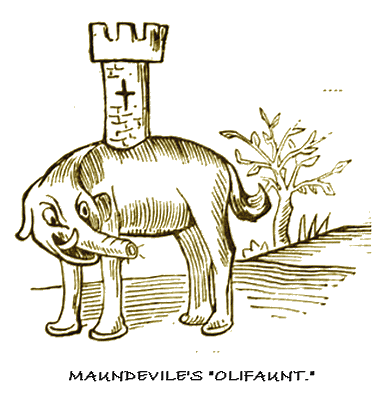
In Sir John Maundevile I still have a dear friend among what that charming old truth-monger called the "olifaunts." He has curly tusks and a bushy tail, and carries a very tall castle on his back, with mighty battlements. He is more startling even than our old friend of the Surrey side, once ignominiously cleped the "Pig and Tinder-box." When first I met the pantomime elephant I cannot remember. But I have often met him since, and more than once I have been permitted to refresh one or both ends of him with half-and-half. He is the only elephant of my acquaintance whose magnificence has turned out to be hollow. Anatomically, he is simple, his viscera consisting almost entirely of two convenient handles, whereby his trunk and tail may be made to swing.
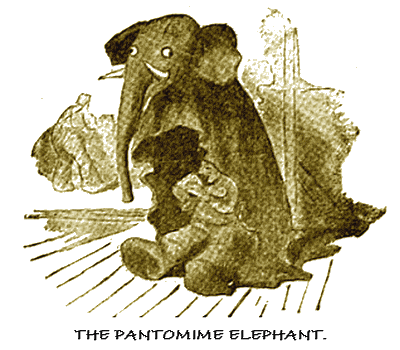
I knew an exceptionally talented forelegs, who drew extra pay for his ability to knock off a stage policeman's helmet with the trunk. But he was subject to the infirmities of genius, and once, under an exceptional burden of half-and-half, fell ruinously down a trap-door with all the front half of the structure and the Great Mogul, who was in the howdah. Also, I knew a hindlegs—but that is another story.
The late Albert Smith once knew a sponge-cake elephant—but that also is another story. There is moreover another story still—any number of other stories—about the burglar-elephant. He is always in the papers. He gets away from a menagerie and shoves in the front of a tuck-shop with his head; after which he eats the tuck-shop, shutters and all, and goes to sleep on the ruins of the house.
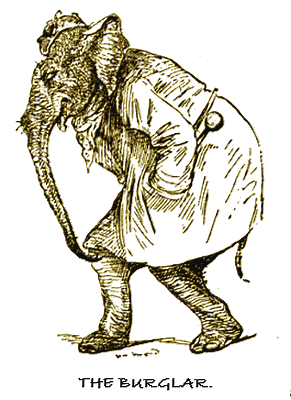
Sometimes he goes the rounds of a market and samples things in general. He is very catholic in his tastes, and will toss off a scuttleful of coals or a suit of ready-made clothes with equal freedom and good humour. He has also been known to break into a pill factory, being afterwards used as an advertisement for the pills. The Society for the Prevention of Cruelty to Animals seems to have had no means of preventing the perpetration of this form of revenge.
Here, at the Zoo, the elephants are much too respectably brought up for this sort of thing. Still they are not muffs, and wilt take their beer and 'bacca in all good-fellowship. Leave no unprotected pocket wherein cigars within the sweep of Jung Perchad's trunk.
For 'bacca he will chew and beer drink, if Iles, his keeper, but leaves him for two minutes to his wicked devices. Here we have the elephant's one little vice. He will hang about a bar. See here, on summer days when all four leave their work of carrying childhood in two-pennyworths; just on the home side of the tunnel under the Outer Circle stands a refreshment bar.
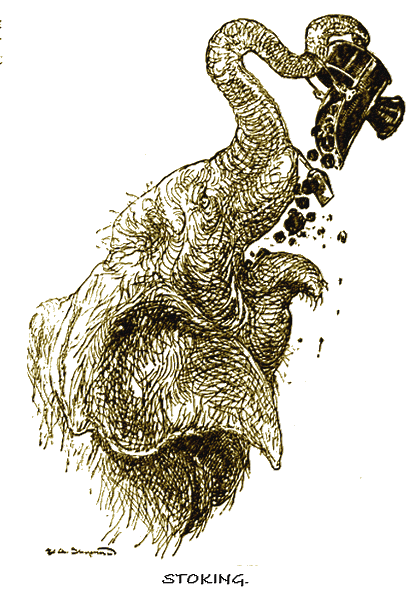
With any excuse whatsoever, but usually with no excuse at all, Jung Perchad, Suffa Culli, Jingo, and Solomon will linger wistfully about this bar. Buns are their ostensible object, but I know they covet beer.
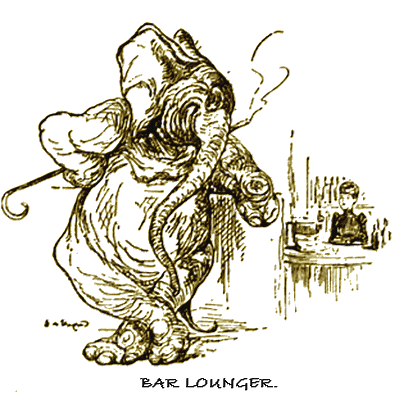
Even a bun, however, will be taken in good part, and it takes a vast number of buns to offend an elephant. Buns, indeed, are the civilized elephant's chief article of commerce, and between the elephants and the bears is much trade rivalry. Solomon is understood to be agitating for a pole, to place the establishment upon an equal footing with the opposition.
Bank Holiday is a terrible day for these elephants. No reasonable elephant can refuse a bun, or an apple, or a lead-pencil, or a boy's hat, when it is offered. It might hurt the donor's feelings; further, some day, in the winter, when nobody comes, he might want just such refreshment.
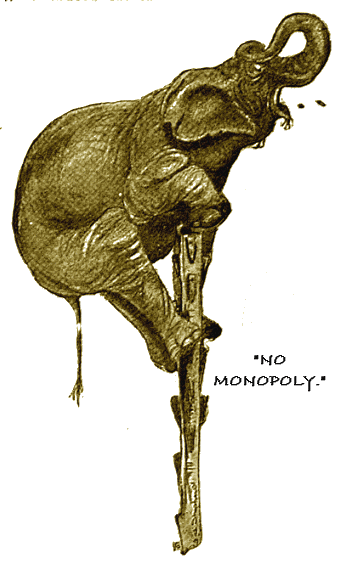
But it is sad to think of the faithful elephant towards the end of the day, weighed down to the very earth with the offerings of an injudicious public, helplessly contemplating the last bun, with no inch of storage left.
And sadder to know that, when the struggle is done, and that last bun deposited, with dolor and affliction, upon the varied accumulation which he envelops, that elephant will proceed indoors to face the officially-provided supper—a barn full of "cow's wittles" (Suffolkese) and a serried company of pails full of mash. What he does with the supper in the circumstances is a matter of speculation, but none is ever left over for breakfast.
More sadness, too, one might look for on the morning after a Bank Holiday, in the bilious and dissipated face, the boiled eye, of Jung Perchad, greatest of all the takers of the cake. But the bilious face, the boiled eye, is not there. No elephant has a liver. Anatomists may profess to have discovered a liver in a dead elephant, but that is only said to astonish the ignorant. Proof plain is there that no living elephant is so afflicted. Nobody with a liver may light-heartedly eat pencils and pocket-combs and purses and plum-cake as does an elephant.
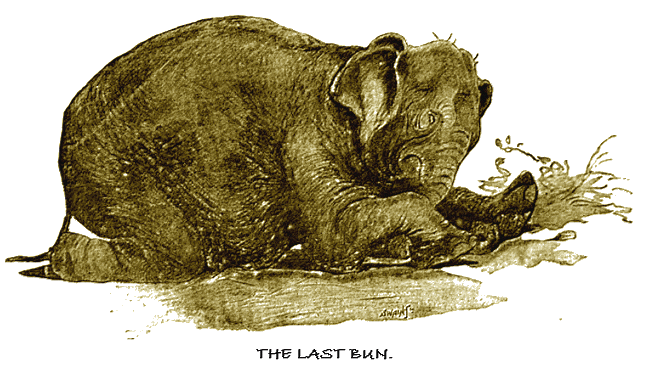
Suffa Culli has swallowed a purse with six guineas in it, gaining less discomfort by the transaction than the owner, who had to walk home.
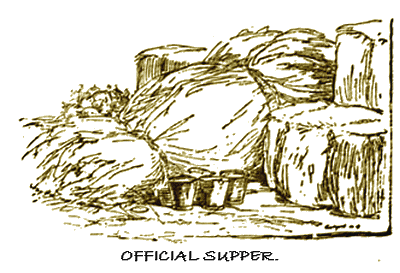
The lamented Jumbo once purloined and swallowed a box of blister ointment from the pocket of a veterinary surgeon with perfect impunity; anybody who has lunched or blister ointment might well spend the few remaining minutes of his life in admiration for Jumbo's digestive works.
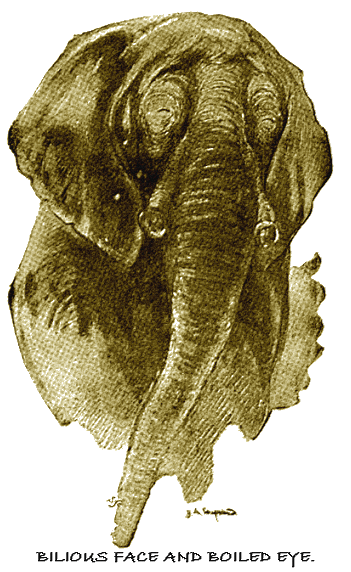
So that the excesses of Bank Holiday never leave any seeds of subsequent discomfort with either Jung Perchad, Suffa Culli, Jingo, or Solomon. Staggering outside a mammoth load of everything, either may lean pantingly against a tree for a few minutes—you may see their favourite tree between the elephant and parrot houses, forced from the perpendicular and bare of bark—but to-morrow he will be equal to beginning again.
In the bad weather, when few visitors come, the elephants are kept indoors. This is as well, upon the whole. If they were all let loose, with very few people about the grounds, awkward things might happen. In the summer, and especially on Bank Holidays, there are quite as many offers of refreshment as can easily be attended to, and the elephantine belief that the entire outside world is intended to be eaten does not get free play. An unfortunate country visitor meeting several elephants at once after a long estrangement from buns, might have disconcerting adventures. His pockets would certainly be rifled and his umbrella eaten, at once; also his hat. I am not quite certain that they wouldn't assume that he had offered them most of his clothes. I had some very good friends among the elephants of Mr. John Cooper, the famous tamer. Notably Blind Billy, who had all the value of his lost sight in his solid common sense.
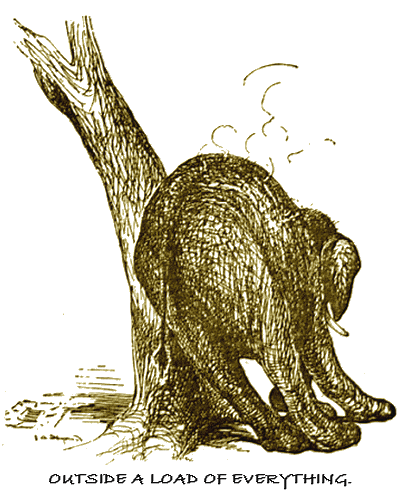
But I was speaking of clothes. Mr. Cooper's Betsy once ate a whole suit exclusive of the boots, but inclusive of certain pockets full of money and tobacco. The reason Betsy refrained from eating the boots was the simple one that they weren't there, which is why I should expect little mercy for the clothes of our friend from the country. The elephants would have them, and when they had gently relieved him of everything loose, they would curl their trunks up overhead and wait for further contributions. That is just like an elephant. He can't understand when you have got to the end of your resources.
Iles is master of the elephants. Scott, whom Jumbo made famous, was his predecessor, and, long ago, Godfrey, the bearward, kept the elephants. Jung Perchad, Suffa Culli, Jingo, and Soloman all respect Iles, and trumpet when he tells them. Also, Suffa Culli will pick him up carefully with her trunk, and plant him on her neck; then—gentle soul!—she will pass him up the whip.
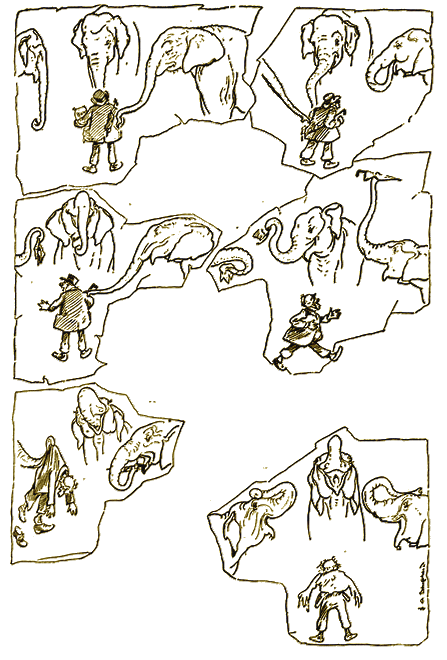
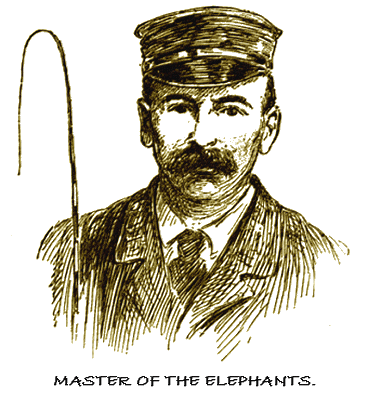
Have I, or have I not, detected on these occasions a certain twinkle of the eye, and a certain playful flourish of that whip? I believe I have. "Here, take it, my friend," Suffa Cull might be saying, "take it, and play with it as much as you like. It seems to please you, and it doesn't hurt me. But if I began on you with it—" and she chuckles quietly But she will obey the crack of that whip, and presently kneel down as gently as you please for Iles to alight. Moreover, on request, she will raise her voice (and her trunk) and trumpet most tremendously. I fear that the repetition of this sort of thing has made Suffa Culli unwarrantably vain of her voice.
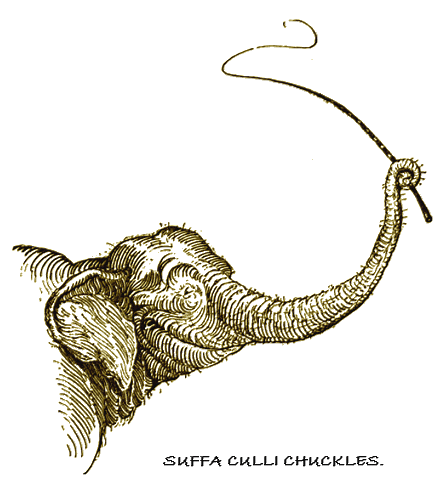
Now, their winter shutting-in may preserve these elephants from colds, and may preserve private property from the elephants; but it deprives them of exercise. I must make a suggestion of some sort on behalf of these elephants when next I see Iles—some means of healthy recreation and "keeping in form;" something, in fact, in the way of a gymnasium. I do not go so far as to recommend the horizontal bar in Jung Perchad's case—it would come expensive in bars. But they all have tastes which would lead them to prefer a bar of some sort, even with nothing to drink on it.
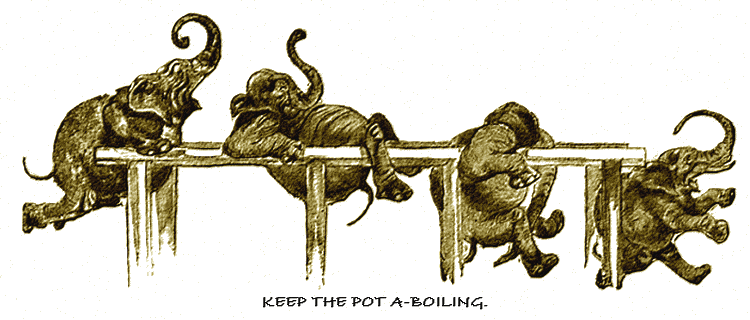
Even the swimming bath at the back, wherein is found much cool refreshment during summer, is largely out of the question in winter. Possible rheumatism and the chance of being frozen in makes that delectable pond useless till spring.
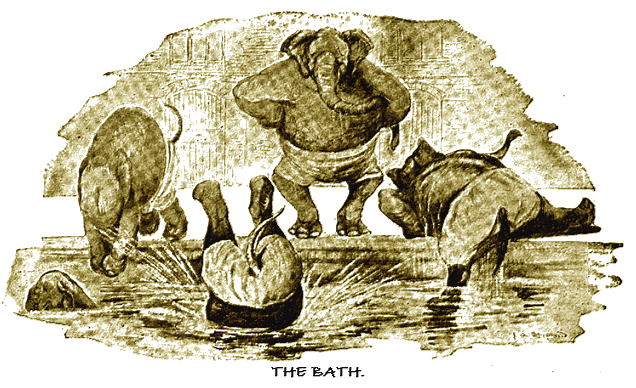
An elephant has a great fondness for wallowing in water, although whether entirely from motives of cleanliness may be disputed, since on occasion he prefers a deposit of soft mud, a very proper and natural preference, I believe, for any creature in a state of imperfect civilization, as may be judged from the tastes of the human boy.
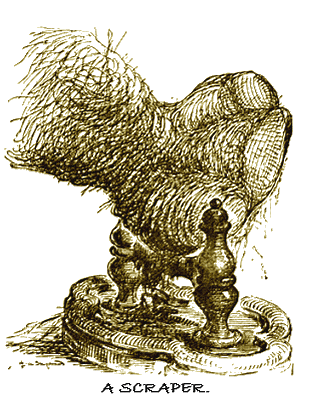
Mud, argues the human boy, is soft, mild, and soothing to the touch; also it is warm and comforting, equally in its liquid or semi-liquid state, and when forming a solid extra-cutaneous deposit. Wherefore the human boy, following his proper instincts, mudlarks. Is it this predilection for mud which leads all these four elephants persistently to ignore the foot-scrapers placed at the doors of the elephant-house for their accommodation? Look at them. They are obviously intended for the use of elephants, and for that of no lesser creature in this world. I have no doubt that at the absolute command of Iles these elephants would scrape their feet; for the elephant is a placable fellow, always anxious to please; but as it is they never do so, and all those many hundredweights of iron stand useless; for it never strikes a man entering the house to use an article of convenience so obviously intended for an elephant.
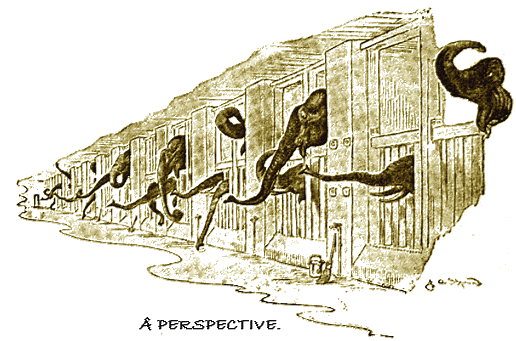
But in the winter, though one may not meet him outside, one may hold quite an improving conversation with the elephant in his house. He is always ready for conversation, He waits all day for it behind a row of great bars and curling trunks. I do not know whether any nervous, short-sighted strangers ever at a first lengthwise glance take this elephant-house for the abode of serpents, all loose and looking for victims, but it might be excusable—especially if the house were made a great deal longer, and less well-lighted, and more elephants provided. But it is unlikely that this expense will be incurred for the purpose. Short-sighted people make enough mistakes about elephants already, in the manner of the American in blue spectacles who lately hailed Suffa Culli and her juvenile load under the impression that she was an omnibus carrying passengers to and from the Gardens; and in the manner of the historical gentleman of bad sight, who offered a biscuit to Jung Perchad's tail. By-the-bye, was this gentleman an historical personage or a mere figment of a funny man's imagination? I have heard of him, often—had heard of him before I knew Jung Perchad—but I cannot get Iles to admit having seen him.
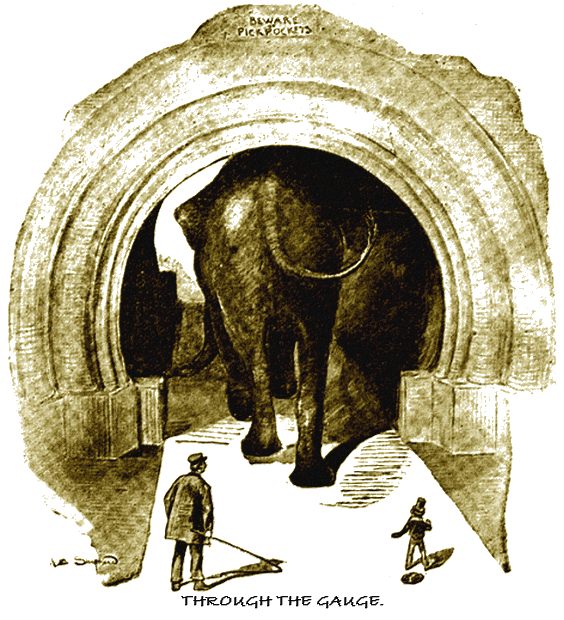
The arch under the Outer Circle stands for ever a memorial of the stature of the late lamented Jumbo. Jumbo could just get through that arch, and then by aid only of a certain shrinking within himself—a sort of gigantic shrugging of the shoulders. If the Society had thoughtlessly repaved under that arch with thicker stone, Jumbo would have been kept out all night. Now, this arch and the constant talk of Jumbo is a lifelong grief and tribulation unto Jung Perchad. Nothing would please Jung Perchad so much as to get a sore back against the top of that arch. But he can't. He is exactly three inches too short. He might get the sore back, of course, by rubbing against the side, but Jung Perchad is an honourable elephant, and a sportsman—never condescending to a mean trick; besides which, nobody would accept any sore as evidence of record height except one at the very top.
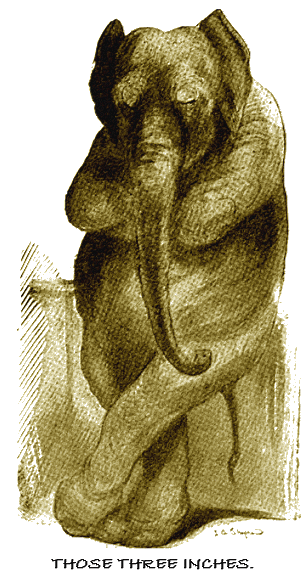
Those three inches make a gloomy creature of Jung Perchad—when there are no buns, and he has leisure to brood. The despicable atom of measurement is being continually hurled at his wrinkled head, and even Iles shows him no mercy, "Oh, dear," says the young lady visitor, "what a great elephant!" And Jung Perchad feels the sinful pride rise within him. Then the young lady says, "Is he as big as Jumbo was?" and Jung Perchad's heart is ready to break, for well he knows Iles's too truthful reply. Three inches less. Oh, that three inches! Where is the glory of being the biggest elephant in the Gardens of the Zoological Society of London only to be for ever reminded of an insignificant inferiority to a perfect stranger, who is dead?—and serve him right, probably. Jung Perchad grinds his teeth—lucky he hasn't tusks—no matta—r—r, a time will come! And he broods, and resolves to eat every earthly thing he meets, till he finds something that makes him grow; and matures mechanical plans for getting his back nearer the crown of that arch, until the last inquirer after those three inches has left, the gates are shut, and night falls; and his legs grow unsteady beneath him, and give way; and poor Jung Perchad and all his sorrows sink into a grey, grunting heap of slumber.
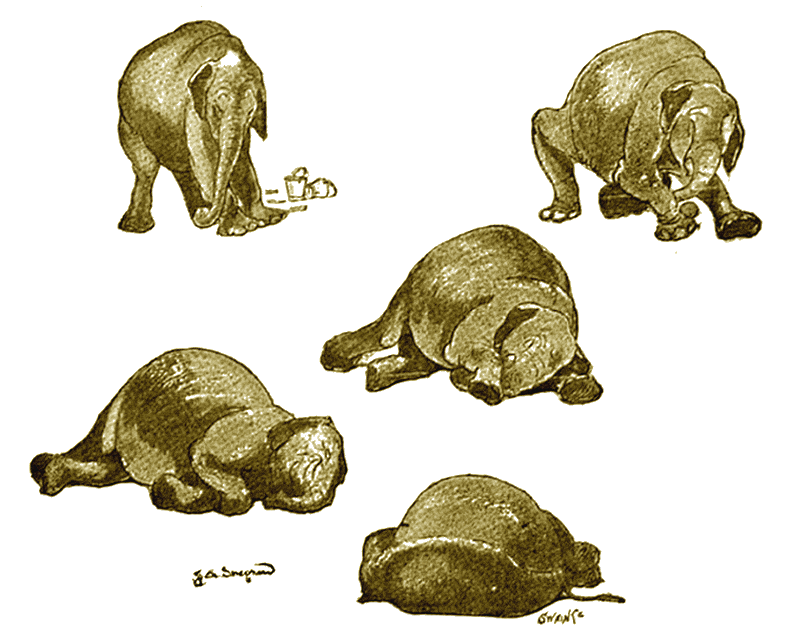
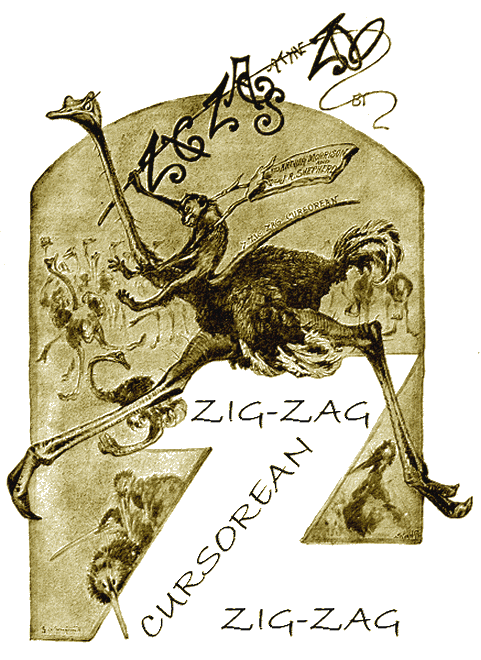
SUCH birds as, having wings, fly not, preferring to walk, to run, or to waddle, as legs and other circumstances may permit or compel—these are the cursores: such birds also as, having no wings, or none to speak of, run by compulsion on such legs as they may muster. These are many—so many that I almost repent me of the heading to this chapter, wherein I may speak only of the struthiones among the cursores—the curious cassowary, the quaint kiwi, the raucous rhea, the errant emeu, and the overtopping ostrich. But the heading is there—let it stand; for in the name of the cursores I see the raw material of many sad jokes—whereunto I pray I may never be tempted, but may leave them for an easy exercise for such as have set out upon the shameless career of the irreclaimable pun-flinger.
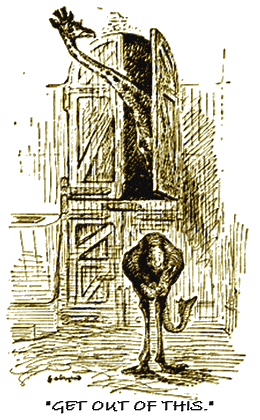
It was some time—years—before I got rid of the impression left upon me by the first ostrich with which I became acquainted. He lived in an old picture-book, and would nowadays be considered quite out of fashion by up-to-date ostriches, having webbed feet and an improper number of toes. I like to believe that feet of this sort were popular among ostriches at that time, being loath to destroy early beliefs. From the same cause, I have other little private superstitions about the ostrich; there was no ostrich, so far as I can remember, in my Noah's ark, whence I derive my conviction that the species cannot have existed at the time of the Deluge, but has been evolved, in the succeeding centuries, by a gradual approach and assimilation of the several characteristics of the camel and the goose.
The two ostriches here, at the Zoo, have no pet names bestowed on them by the keepers. This is inconvenient, not to say unfair. They have been placed, it will be observed, in the stables hitherto occupied by the late lamented giraffes. It is a striking and notable instance of care and the sense of fitness of things on the part of the Society. These stables, they probably reflected, have all along been fitted with tenants twenty feet high—queer tenants, which were often called camelopards. We can't replace these with similar tenants, unfortunately, but we will do our best with animals as high as possible and with all available neck; and they shall be camel-geese. And here they are; a few feet short, unavoidably, but as high as possible; quite the equivalent of the giraffes so far as concerns the camel, and as much superior as one may consider a goose to a leopard. And here you may stand and watch them, or sit. And you may watch, if you please, for the coming of the giraffes which the Society are now anxious to buy, or for the wandering wraiths of those dead, dispossessed, and indignant. Meantime inventing names for the two camel-geese—let us say Atkinson and Pontius Pilate.
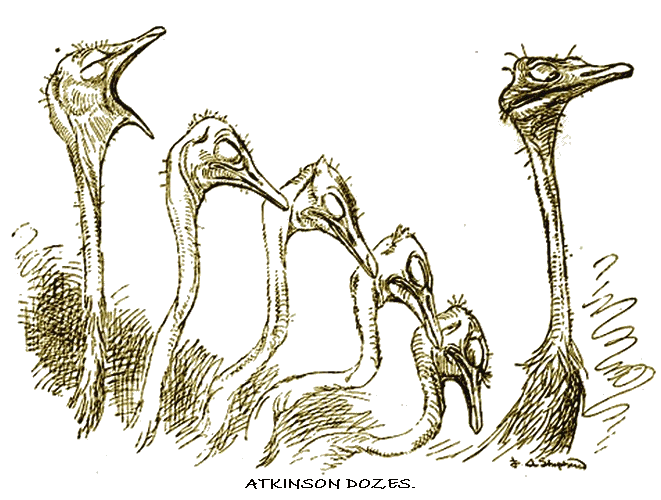
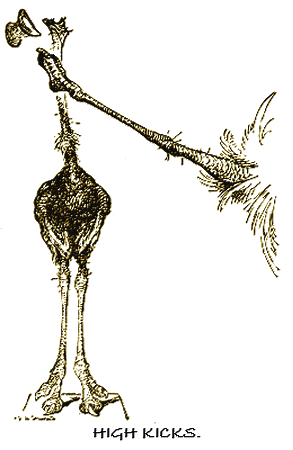
I like to stand by Atkinson till he dozes. Atkinson is a fine, big fellow, and when he squats down his head is in a convenient position for observation. Presently he gapes; then his eyes shut, and his beak droops—just a very little. Then the beak droops a little more, and signs of insecurity appear about the neck. Very soon a distinct departure from the vertical is visible in that neck; it melts down ruinously till almost past recovery, and then suddenly springs erect, carrying an open-eyed head, wherefrom darts a look of indignant repudiation of any disposition to fall asleep; and so keeps until the eyes close again. I have waited long, but have never seen Atkinson fall permanently asleep.
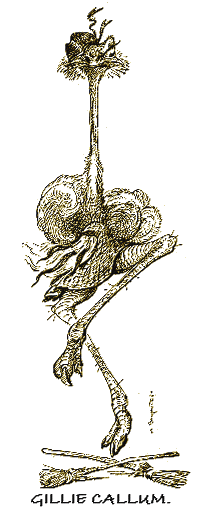
The possibilities of the ostrich are not properly recognised. He is domesticated, and bred with the utmost ignominy in a poultry run, and his tail is pulled out with impunity. I am not quite sure that he habitually figures on South African dinner tables with his legs skewered to his ribs, but he has fallen quite low enough for that; submitting even to the last indignity of being hatched out by a common stove incubator. Now, the elephant has also been domesticated, but he has also been allowed to adopt a profession. He dances on a tub and rides a tricycle at a circus. Nothing of this sort has been attempted with the ostrich, but much might be done. He would make a first-rate bicyclist, and could get through much of the business of the "eccentric comedian." A couple of them would go to make a capital knockabout act. High kicks of the very highest, floor-strides of the very longest—and there would be a world of opportunities in the neck. No end of possibilities lie in the neck—even the "legitimate." You could run in a forty-minute sketch, wherein two long-separated but faithful lovers should fall against each other and wind their necks about together like a caduceus, or barley-sugar—or anything. Also the camel-goose might fling his neck about the villain, and strangle him. But perhaps, after all, variety business would suit best. Pontius Pilate in a kilt and philibeg would bring down the house with a Highland fling or gillie callum. And Atkinson in a long-stride table chair and banjo act would be comforting to the perceptions.
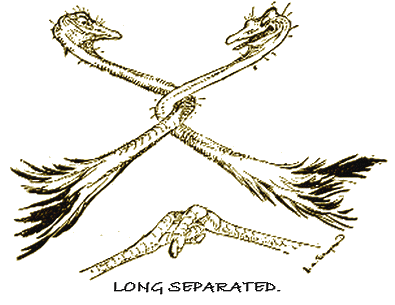
Whether the ostrich is actually such an ass as to hide his head with a notion of concealing himself I don't quite know, but there is certainly a deal of ass in the camel-goose. A Hottentot will put an ostrich skin over his head, and walking with his natural shanks exposed get among an ostrich family and kill them off one after another, to the family's astonishment. Now, a bird who mistakes a nigger with a mask for an intimate relation plainly enjoys in his composition a large flavour of the ass. Not knowing it, however, the camel-goose is just as happy, and neither experiences the bitterness of being sold nor the sweetness of selling. I don't believe that Atkinson was even aware of the triumphant sell which he lately assisted in administering to Mr. Toots, the cat from the camel-house.
The cat in the ostrich-house is a sly fellow, and I believe he knows why there are fewer pigeons in the roof of the hippopotamus-house than there were. He horribly sold Mr. Toots, who was anxious to have a snack of poultry himself, for a change. "In my house," said this bold, bad cat, "there are the biggest pigeons you ever saw. Go in and try one, while I look out for the keeper." And the trustful Mr. Toots went in; and when, full of a resolve to make it hot for everything feathered in that house, Mr. Toots bounced into the presence of Atkinson, who is rather more than seven feet high, he came out anxious for the scalp of that other cat. I never mention this little adventure to Mr. Toots, who is sensitive, but all the other Zoo cats chaff him terribly. Even Jung Perchad and the other elephants snigger quietly as they pass, and Bob the Bactrian, from the camel-house, laughs outright; it is a horrid, coarse, vulgar, exasperating laugh, that of Bob's. Atkinson, however, is all unconscious of the joke, and remains equally affable to cats, pigeons, and human beings.

Pontius Pilate is just the sort of camel-gander that would bury its head to hide itself. Pontius Pilate is, I fear, an ass; also a snob. He has a deal of curiosity with regard to Atkinson, who is a recent arrival, and lately belonged to the Queen. Also, he is often disposed to pay a visit—with his head—to Atkinson's quarters, and take a friendly snack—at Atkinson's expense; this by an insinuation of the neck out between his own bars and in between those of Atkinson, adjoining. But he doesn't understand the laws of space. Having once fetched his neck around the partition into Atkinson's larder by chancing to poke his head through the end bars, he straightway assumes that what is possible between some bars is possible between all; and wheresoever he may now be standing when prompted by companionable peckishness, straight he plunges among the nearest bars, being mightily astonished at his inability to reach next door, if by chance he have dropped among bars far from Atkinson's. He suspects his neck. Is the ungrateful tube playing him false? Maliciously shortening? Or are his eyes concerned in fraud? He loops his head back among his own adjoining bars, with a vague suspicion that they may be Atkinson's after all; and he stretches and struggles desperately. Some day Pontius Pilate will weave himself among those bars, basket fashion, only to be extricated by a civil engineer and a practical smith. Pontius Pilate is the sort of camel-gander that damages the intellectual reputation of the species. Of course he would bury his head to hide himself. Equally of course he would muzzle himself to prevent you from biting him, or tie his legs together to prevent you from running and catching him, or anything else equally clever. Pontius Pilate, I have known you long—even loved you, in a way. But I have observed you closely, and though, like Dogberry, you may have everything fine about you, I am impelled sorrowfully to write you down an ass.
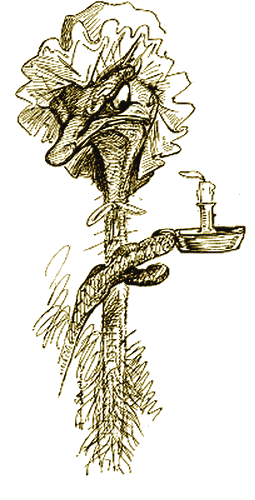
The ostrich is one of those birds whose whole command of facial expression is carried in the neck. He can only express himself through his features by offering you different views of his head. This is a great disadvantage. It limits the range. You may express three sentiments by the back, front, and side of the head, and something by way of combination in a three-quarter face. Then you stop, and have no further resource than standing on your head, one of the few things an ostrich is not clever at. But with such materials as he has, the ostrich does very well. Observe, his mouth is long, and droops at the corners; but the corners are wide apart, for there the head is broad.
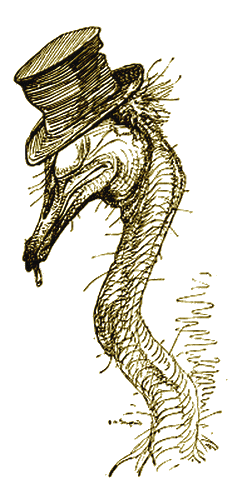
Now you may present simple drama by the aid of this mouth—suitably disposed and ordered by the neck. Take Atkinson, here, whose beak has a certain tip-tinting distrusted of the teetotaler. Bend his head (only in theory, because Atkinson won't stand any practical nonsense)—bend his head to look downward, and let his neck wilt away sleepily. Now, viewed from the side, where is a more lamentable picture of maudlin intoxication? What could improve it, except, perhaps, a battered hat, worn lop-sided, and a cigar-stump? He is a drunken old camel-gander, coming home in the small hours, and having difficulties with his latch-key. Straighten Atkinson's neck, open wide his eyes, and take a three-quarter face view of him. Sober, sour, and indignant, there stands, not the inebriated Atkinson, but the disturbed Mrs. Atkinson on the stairs, with a candle, and a nightcap, and a lecture. That awful mouth actually conjures that candle, that nightcap, and that lecture into existence—you see and hear them more clearly than you do Atkinson, although they are not there. But this is an advanced exercise in struthian expression—a complicated feat, involving various and complex elements. There is the neck-wilt and the bending of the head; also the three-quarter face, not a simple element.
The plain and elementary principles of struthian expression lie in the mere front and side views. The third simple view, the back, is not particularly eloquent, although practice might do something even for that. At the side the ostrich is glum, savage, misanthropical, depressed—what you will of that sort. Let him but turn and face you—he can't help a genial grin. All done by the versatile neck, you observe, which gives the head its position.
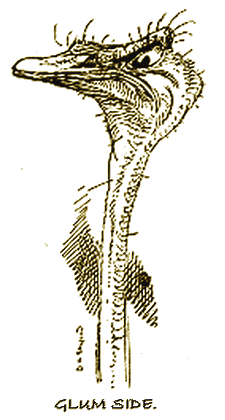
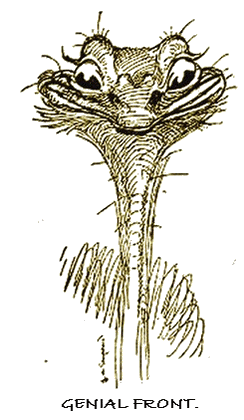
Man, instigated by woman, has a habit of pulling out the camel-gander's tail. This ruins the appearance of the site of that tail, without commensurately improving the head whereunto the tail is transplanted—an unprofitable game of heads and tails, wherein tails lose and heads don't win. Even the not over clever ostrich knows better than to wear those feathers on the wrong end. Perhaps he knows that he is enough of a fool already.
There is a deal of hidden interest about the ostrich's neck. It is the cleverest piece of an ostrich—unless you count his stomach; and even in the triumphs of the stomach the neck takes a great share. When a camel-goose lunches off a box of dominoes, or a sack of nails, or a basketful of broken bottles, there is quite as much credit in the feat due to the neck as to the stomach; with anybody else all the difficulties of that lunch would begin with the neck—even a thicker neck. Parenthetically, one remembers that the ostrich's neck is not always thin. Catch Atkinson here in a roaring soliloquy, and you shall see his red neck distended as a bladder, with a mighty grumbling and grunting. This by the way. The neck makes nothing of the domino difficulty, or the tenpenny nail difficulty, or the door-knob difficulty, or the broken bottle difficulty—which are not difficulties to the camel-goose. On the contrary, the neck revels in them and keeps the dainties as long as possible. Give Pontius Pilate, or Atkinson—I am quite impartial—an apple. When he swallows it you shall see it, in a bulge, pass along and round his neck; down it goes and backward, in a gradual curve, until it disappears among the feathers—corkscrews, in fact. Observe, I recommend an apple for this demonstration. Dominoes and clinkers are all very well, but they rattle about inside, and disturb the visitors; and with an apple you will the more plainly observe that corkscrew.
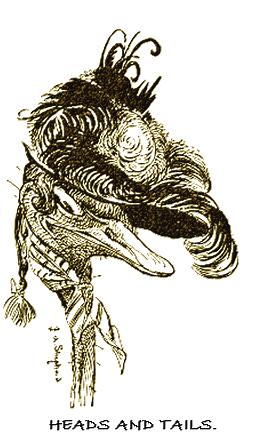
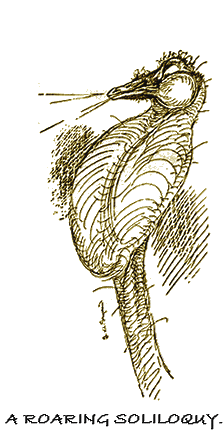
Not satisfied, you perceive, with enjoying his domino or his door-knob all the way along that immense neck, the camel-gander must needs indulge in a spiral gullet. It is mere gluttony. Especially is it wicked of Atkinson, who has already the longest bird-neck in all these gardens. Look at the necks of all the cursores. The poor little wingless kiwi, with a mere nothing of a neck—for a cursore. He does without a spiral gullet. The festive cassowary—which, by-the-bye, doesn't abound—or exist—on the plains of Timbuctoo, as the rhyme says—the festive cassowary, I say, wears his gullet plain. The rusty rhea takes things below with perfect directness. The lordly emeu gets his dinner down as quickly as the length of his neck will permit. It is only when one reaches the top of the cursorean thermometer, all among the boilings, so to speak, that the ostrich, with the longest neck of all, must poach another few inches by going in for a spiral. Pontius Pilate is bad enough, but a spiral for Atkinson!—well, there!

The partiality of the struthians for eccentric refreshments—clinkers, nut-crackers, and the like—leads many to a superstition that these things are as nourishing as they are attractive. They're not. Certain liberal asses have a curious habit of presenting the birds with halfpence. I scarcely understand why, unless modern environments have evolved penny-in-the-slotomaniacs. And I am prepared to bet that on occasions they are less generous with their pence. Nevertheless, they do it, and it kills the birds. One cassowary who died recently was found to contain one and eightpence in copper. I suggest that in future the experimentalizers confine their contributions to bank-notes. I have taken the trouble to ascertain that these will do no harm while their disappearance will afford an additional enjoyment to the contributors commensurate with their higher value.
Perhaps there is something in the habits of the cassowary himself that explains these offerings. The cassowary always comes to meet you at the bars with a look of grave inquiry. If you offer no tribute he turns off, with many cockings of the beak, surprised, indignant, and contemptuous. Very few people can endure this. They hastily produce anything they have—anything to conciliate the contemptuous cassowary. And as he takes it, an expression steals across the cassowary's face which seems to admit that perhaps the fellow isn't such a shocking outsider after all. When a man has nothing more nutritive about him, this form of extortion may produce halfpence.
The rhea is small potatoes beside the ostrich—merely a smaller and dingier camel-gander. But the emeu is a fine upstanding fellow, with his haughty sailing head and his great feather boa.
He is a friendly and inquisitive chap, and will come stalking down to the wires to inspect you. If you like to walk up and down outside his inclosure he will take a turn with you, walking at your side and turning when you do. He is justly proud of his height and his ruff, but there is nothing objectionably haughty about the emeu; I have always found him ready for a quiet chat.
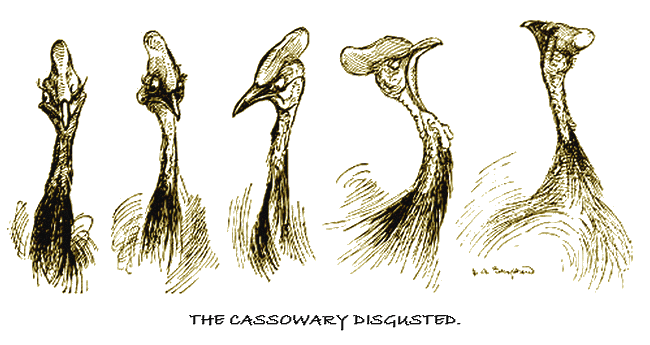
He will eat various things, like the ostrich; so that one regards him with a certain respect, not to say awe, for there is no telling what wonderful things may or may not be inside him. The biggest and handsomest emeu here is my particular friend. When he talks to you or walks by your side he is very fine; but when he walks about a little way off, with his head to the ground, foraging, he looks rather like a tortoise on stilts, which is not imposing. Sometimes, when he thinks nobody is looking, he rushes madly up and down his territory by way of relieving his pent-up feelings, stopping very suddenly and looking cautiously about to assure himself that nobody saw him. I call this emeu Grimaldi; firstly, because Grimaldi is rather a fine name, and secondly, because when once you have had a view of his head from the back you can't call him anything else.
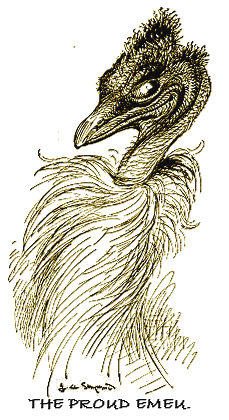
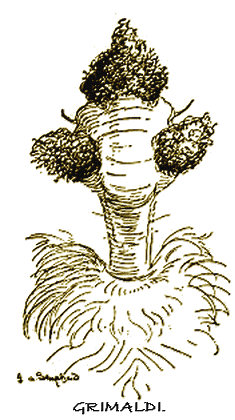
The most extraordinary bird in the world is the kiwi. But it is not the most extraordinary bird seen by visitors to the Zoo, because they never see it. The kiwi buries itself asleep all day, and only comes out in the night to demolish an unpleasant and inconvenient proverb. The kiwi is the latest of all the birds, but catches the most worms. For this let us honour the kiwi, and hurl him in the face of the early risers. He stamps about the ground in the dark night, and the worm, being naturally a fool, as even the proverb demonstrates, comes up to investigate, and is at once cured of early rising for ever. The kiwi, having no wings (unless you count a bit of cartilage an inch or so long, buried under the down), has the appearance of running about with his hands in his pockets because of the cold. And being covered with something more like hair than feathers, is a deal more like a big rat than a bird of any sort.
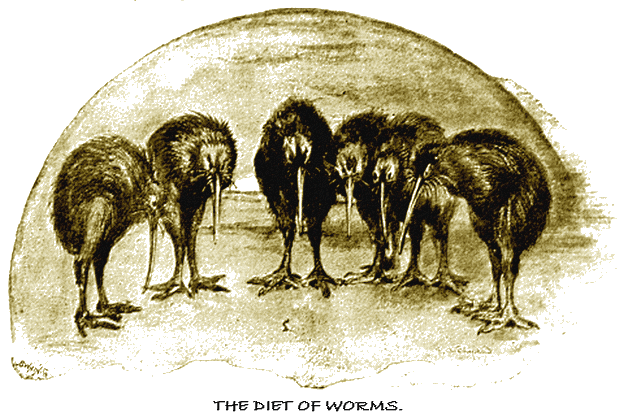
Indeed, I don't believe the kiwi himself has altogether made up his mind which to be. Before he decides he will probably become extinct. Any glimpse his friends have of him here is short. Suddenly brought out into the day, he stands for a moment, and blinks; then he puts his beak up and his legs apart, and there is a black streak and a heap of straw where it vanishes.
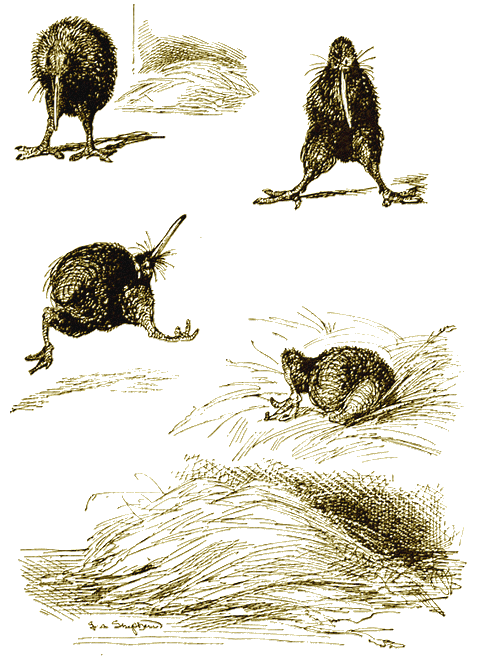
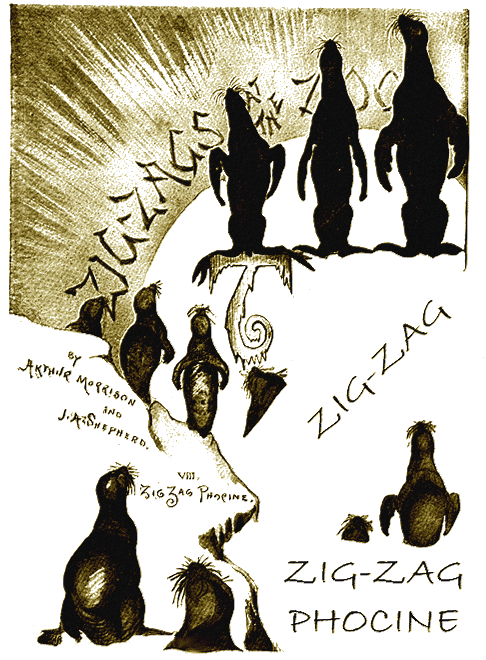
THE SEAL is an affable fellow, though sloppy. He is friendly to man: providing the journalist with copy, the diplomatist with lying practice, and the punster with shocking opportunities. Ungrateful for these benefits, however, or perhaps savage at them, man responds by knocking the seal on the head and taking his skin: an injury which the seal avenges by driving man into the Bankruptcy Court with bills for his wife's jackets. The puns instigated by the seal are of a sort to make one long for the animal's extermination. It is quite possible that this is really what the seal wants, because to become extinct and to occupy a place of honour beside the dodo is a distinction much coveted amongst the lower animals. The dodo was a squabby, ugly, dumpy, not to say fat-headed, bird when it lived; now it is a hero of romance. Possibly this is what the seal is aiming at; but personally I should prefer the extinction of the punster.
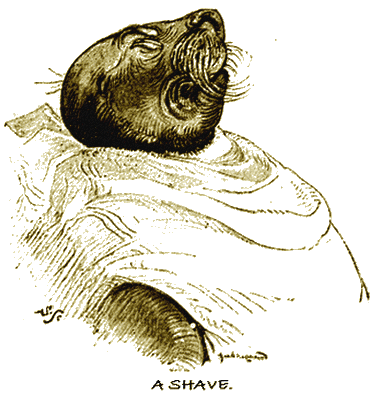
The punster is a low person, who refers to the awkwardness of the seal's gait by speaking of his not having his seal-legs, although a mariner or a sealubber, as he might express it. If you reply that, on the contrary, the seal's legs, such as they are, are very characteristic, he takes refuge in the atrocious admission, delivered with a French accent, that they are certainly very sealy legs. When he speaks of the messages of the English Government, in the matter of seal-catching in the Behring Sea, he calls it whitewashing the sealing, and explains that the "Behrings of this here observation lies in the application on it." I once even heard a punster remark that the Russian and American officials had got rather out of their Behrings, through an excess of seal on behalf of their Governments; but he was a very sad specimen, in a very advanced stage, and he is dead now. I don't say that that remark sealed his fate, but I believe there are people who would say even that, with half a chance.
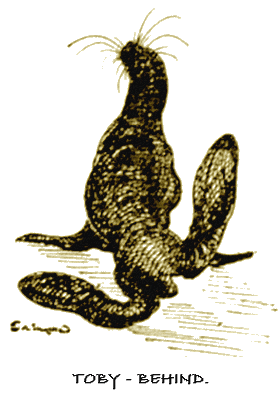
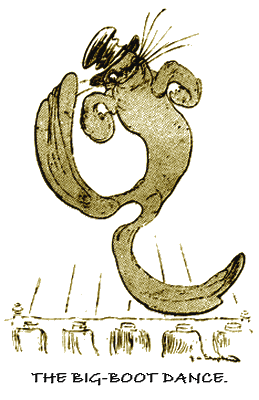
Another class of frivoller gets his opportunity because it is customary to give various species of seals—divers species, one might say—inappropriate names. He tells you that if you look for sea-lions and sea-leopards, you will not see lions, nor even see leopards, but seal-lions and seal-leopards, which are very different. These are called lions and leopards because they look less like lions and leopards than anything else in the world; just as the harp seal is so called because he has a broad mark on his back, which doesn't look like a harp. Look at Toby, the Patagonian sea-lion here, who has a large pond and premises to himself. I have the greatest possible respect and esteem for Toby, but I shouldn't mistake him for a lion, in any circumstances. With every wish to spare his feelings, one can only compare him to a very big slug in an overcoat, who has had the misfortune to fall into the water. Even his moustache isn't lion-like. Indeed, if he would only have a white cloth tucked round his neck, and sit back in that chair that stands over his pond, he would look very respectably human—and he certainly wants a shave.
Toby is a low-comedy sea-lion all over. When I set about organizing the Zoo Nigger Minstrels, Toby shall be corner-man, and do the big-boot dance. He does it now, capitally. You have only to watch him from behind as he proceeds along the edge of the pond, to see the big-boot dance in all its quaint humour. Toby's hind flappers exhale broad farce at every step. Toby is a cheerful and laughter-moving seal, and he would do capitally in a pantomime, if he were a little less damp.
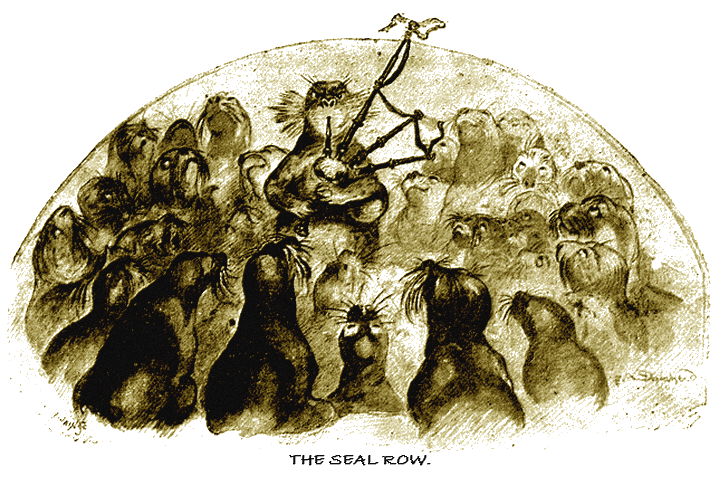
Toby is fond of music; so are most other seals. The complete scale of the seal's preferences among the various musical instruments has not been fixed with anything like finality; but one thing is certain—that far and away above all the rest of the things designed to produce music and other noises, the seal prefers the bagpipes. This taste either proves the seal to be a better judge of music than most human beings, or a worse one than any of the other animals, according as the gentle reader may be a native of Scotland or of somewhere in the remainder of the world. You may charm seals by the bagpipes just as a snake is charmed by pipes with no bag. It has even been suggested that all the sealing vessels leaving this country should carry bagpipes with them, and I can see no sound objection to this course—so long as they take all the bagpipes. I could also reconcile myself to a general extrusion of concertinas for this useful purpose—or for any other; not to mention barrel organs.
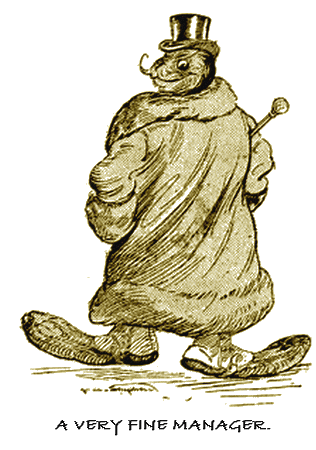
By-the-bye, on looking at Toby again I think we might do something better for him than give him a mere part in a pantomime; his fine moustache and his shiny hair almost point to a qualification for managership. Nothing more is wanted—except, perhaps, a fur-trimmed coat and a well-oiled hat—to make a very fine manager indeed, of a certain sort.
I don't think there is a Noah's ark seal—unless the Lowther Arcade theology has been amended since I had a Noah's ark. As a matter of fact, I don't see what business a seal would have in the ark, where he would find no fish to eat, and would occupy space wanted by a more necessitous animal who couldn't swim. At any rate, there was originally no seal in my Noah's ark, which dissatisfied me, as I remember, at the time; what I wanted not being so much a Biblical illustration as a handy zoological collection. So I appointed the dove a seal, and he did very well indeed when I had pulled off his legs (a little inverted v). I argued, in the first place, that as the dove went out and found nothing to alight on, the legs were of no use to him; in the second place, that since, after all, the dove flew away and never returned, the show would be pretty well complete without him; and, thirdly, that if, on any emergency, a dove were imperatively required, he would do quite well without his legs—looking, indeed, much more like a dove, as well as much more like a seal. So, as the dove was of about the same size as the cow, he made an excellent seal; his bright yellow colour (Noah's was a yellow dove on the authority of all orthodox arks) rather lending an air of distinction than otherwise. And when a rashly funny uncle, who understood wine, observed that I was laying down my crusted old yellow seal because it wouldn't stand up, I didn't altogether understand him.
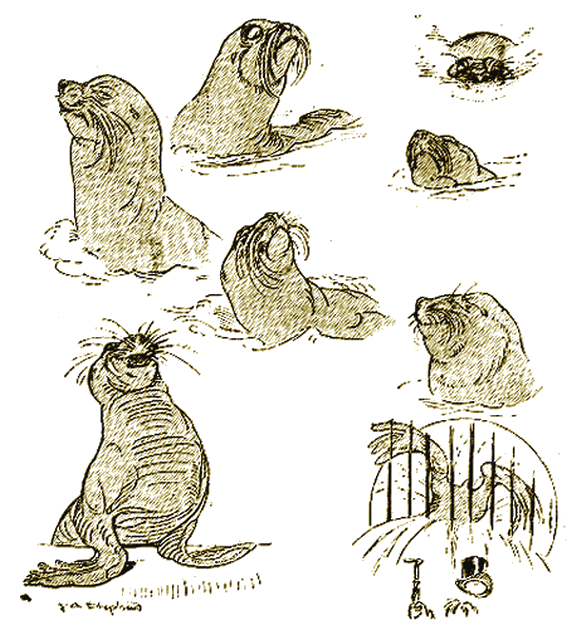
Toby is a good soul, and you soon make his acquaintance. He never makes himself common, however. As he swims round his circular pond, behind the high rails, he won't have anything to say to a stranger—anybody he has not seen before. But if you wait a few minutes he will swim round several times, see you often, and become quite affable. There is nothing more intelligent than a tame seal, and I have heard people regret that seals can't talk, which is nonsense. When a seal can make you understand him without it, talking is a noisy superfluity. Toby can say many things without the necessity of talking. Observe his eyes fixed upon you as he approaches for the first time. He turns and swaps past with his nose in the air. "Pooh, don't know you," he is saying. But wait. He swims round once, and, the next time of passing, gives you a little more notice. He lifts his head and gazes at you, inquisitively, but severely. "Who's that person?" he asks, and goes on his round.
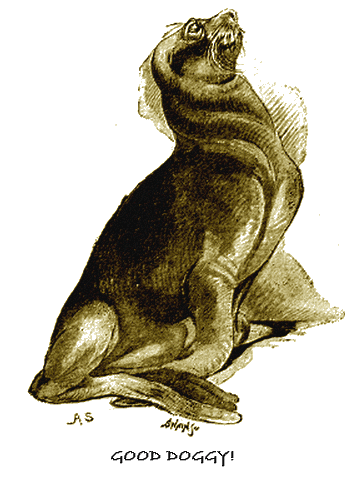
Next time he rises even a little more. He even smiles, slightly, as he recognises you from the corner of his eye. "Ah! Seen you before, I fancy." And as he flings over into the side stroke he beams at you quite tolerantly.
He comes round again; but this time he smiles genially, and nods. "'Morning!" he says, in a manner of a moderately old acquaintance. But see next time; he is an old, intimate friend by this; a chum. He flings his fin-flappers upon the coping, leans toward the bars with an expansive grin and says: "Well, old boy, and how are you?"—as cordially and as loudly as possible without absolutely speaking the words. He will stay thus for a few moments' conversation, not entirely uninfluenced, I fear, by anticipations of fish. Then, in the case of your not being in the habit of carrying raw fish in your pockets, he takes his leave by the short process of falling headlong into his pond and flinging a good deal of it over you. There is no difficulty in becoming acquainted with Toby. If you will only wait a few minutes he will slop his pond over you with all the genial urbanity of an intimate relation. But you must wait for the proper forms of etiquette.
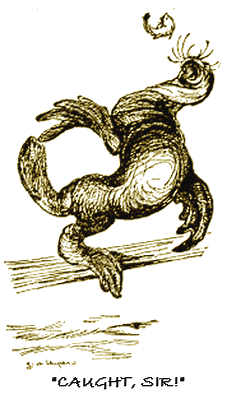
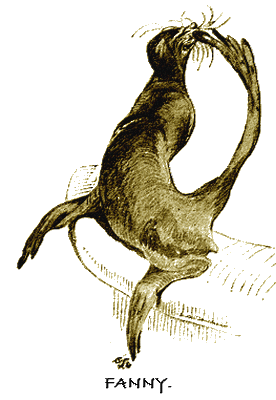
The seal's sloppiness is annoying. I would have a tame seal myself if he could go about without setting things afloat. A wet seal is unpleasant to pat and fondle, and if he climbs on your knees he is positively irritating. I suppose even a seal would get dry if you kept him out of water long enough; but can you keep a seal out of water while there is any within five miles for him to get into? And would the seal respect you for it if you did? A dog shakes himself dry after a swim, and, if he be your own dog, he shakes the water over somebody else, which is sagacious and convenient; but a seal doesn't shake himself, and can't understand that wet will lower the value of any animal's caresses. Otherwise a seal would often be preferable to a dog as a domestic pet. He doesn't howl all night. He never attempts to chase cats—seeing the hopelessness of the thing. You don't need a license for him; and there is little temptation to a loafer to steal him, owing to the restricted market for house-seals. I have frequently heard of a dog being engaged to field in a single-wicket cricket match. I should like to play somebody a single-wicket cricket match, with a dog and a seal to field for me. The seal, having no legs to speak of—merely feet—would have to leave the running to the dog, but it could catch. You may see magnificent catching here when Toby and Fanny—the Cape sea-lion (or lioness), over by the turkeys—have their snacks of fish. Sutton the Second, who is Keeper of the Seals (which is a fine title—rather like a Cabinet Minister), is then the source of a sort of pyrotechnic shower of fish, every one of which is caught and swallowed promptly and neatly, no matter how or where it may fall.
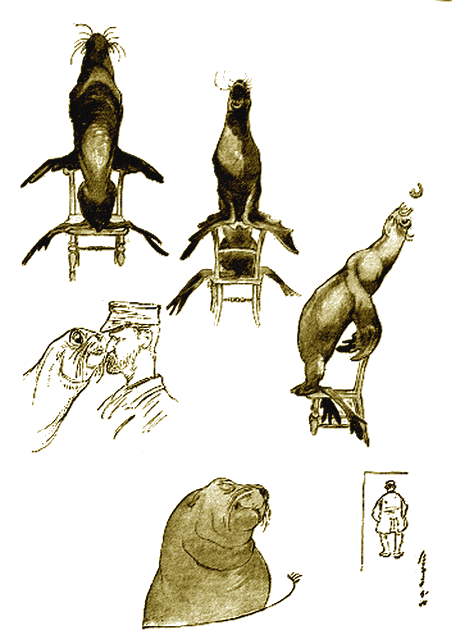
Fanny, by the way, is the most active seal possible; it is only on extremely rare occasions that she indulges in an interval of comparative rest, to scratch her head with her hind foot and devise fresh gymnastics. But, all through the day, Fanny never forgets Sutton, nor his shower of fish, and half her evolutions include a glance at the door whence he is wont to emerge, and a sort of suicidal fling back into the pond in case of his non-appearance, all which proceedings the solemn turkeys regard with increasing amazement.
Toby, however, provides the great seal-feeding show. Toby has a perfect set of properties and appliances for his performance, including a chair, a diving platform, an inclined plane leading thereunto, and a sort of plank isthmus leading to the chair. He climbs up on to the chair, and, leaning over the back, catches as many fish as Sutton will throw for him. He dives off the chair for other fish. He shuffles up the inclined plane for more fish, amid the sniggers of spectators, for Toby's march has no claim to magnificence. He tumbles himself unceremoniously off the platform, he clambers up and kisses Sutton (keeping his eye on the basket), and all for fish. It is curious to contrast the perfunctory affection with which Toby gets over the kiss and takes his reward, with the genuine fondness of his gaze after Sutton when he leaves—with some fish remaining for other seals. Toby is a willing worker; he would gladly have the performance twice as long, while as to an eight hours' day——!
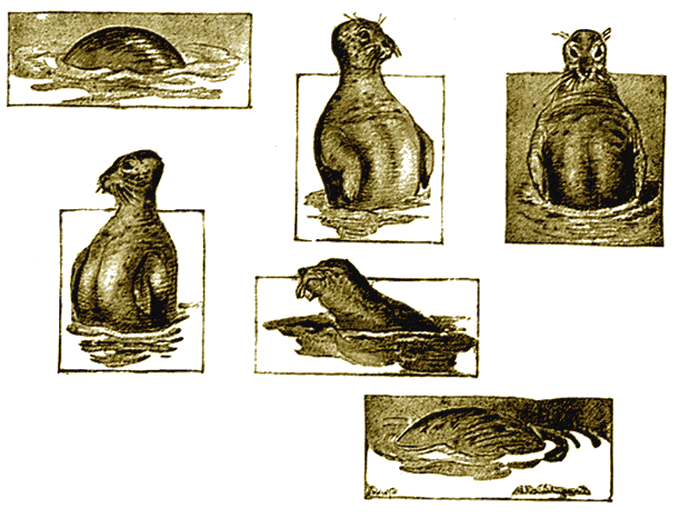
The seals in the next pond, Tommy and Jenny, are insulted with the epithet of "common" seals; but Tommy and Jenny are really very respectable, and if a seal do happen to be born only Phoca vitulina, he can't really help it, and doesn't deserve humiliation so long as he behaves himself. Phoca vitulina has as excellent power of reason as any other kind of seal—brain power, acquired, no doubt, from a continual fish diet. Tommy doesn't feel aggrieved at the slight put upon him, however, and has a proper notion of his own importance. Watch him rise from a mere floating patch—slowly, solemnly, and portentously, to take a look round. He looks to the left—nothing to interest a well-informed seal; to the front—nothing; to the right everything is in order, the weather is only so-so, but the rain keeps off, and there are no signs of that dilatory person with the fish; so Tommy flops in again, and becomes once more a floating patch, having conducted his little airing with proper dignity and self-respect. Really, there is nothing common in the manners of Tommy; there is, at any rate, one piece of rude mischief which he is never guilty of, but which many of the more aristocratic kinds of seal practise habitually. He doesn't throw stones.
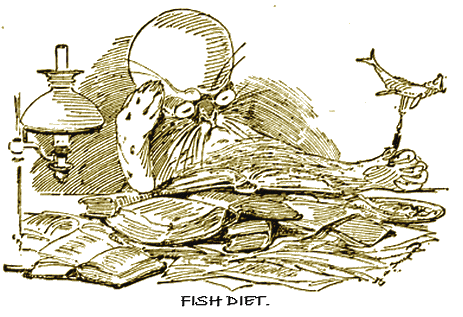
He doesn't look at all like a stone-thrower, as a matter of fact; but he—and other seals—can throw stones nevertheless. If you chase a seal over a shingly beach, he will scuffle away at a surprising pace, flinging up the stones into your face with his hind feet. This assault, directed toward a well-intentioned person who only wants to bang him on the head with a club, is a piece of grievous ill-humour, particularly on the part of the crested seal, who can blow up a sort of bladder on the top of his head which protects him from assault; and which also gives him, by-the-bye, an intellectual and large-brained appearance not his due, for all his fish diet. I had been thinking of making some sort of a joke about an aristocratic seal with a crest on it—beside a fine coat with no arms—but gave up the undertaking on reflecting that no real swell—probably not even a parvenu—would heave half-bricks with his feet.
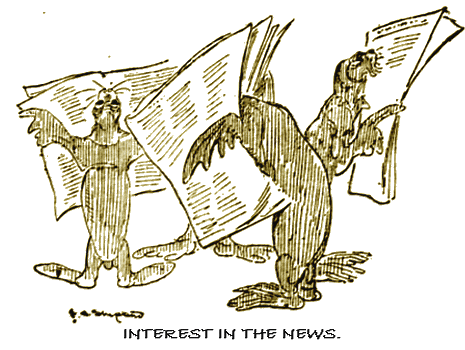
All this running away and hurling of clinkers may seem to agree ill with the longing after extermination lately hinted at; but, in fact, it only proves the presence of a large amount of human nature in the composition of the seal. From motives of racial pride the seal aspires to extinction and a place beside the dodo, but in the spirit of many other patriots, he wants the other seals to be exterminated first; wants the individual honour, in fact, of being himself the very last seal, as well as the corporate honour of extinction for the species. This is why, if he live in some other part, he takes such delighted interest in news of wholesale seal slaughter in the Pacific; and also why he skedaddles from the well-meant bangs of the genial hunter—these blows, by the way, being technically described as sealing-whacks.
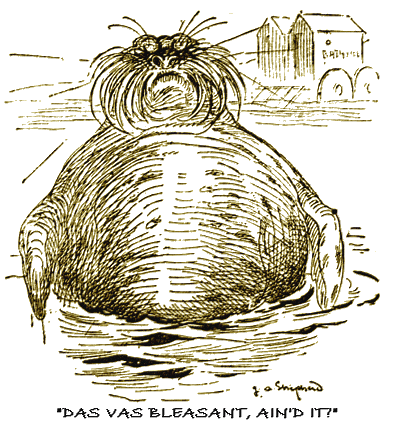
The sea-lion, as I have said, is not like a lion; the sea-leopard is not like a leopard; but the sea-elephant, which is another sort of seal, and a large one, may possibly be considered sufficiently like an elephant to have been evolved, in the centuries, from an elephant who has had the ill-luck to fall into the sea. He hasn't much of a trunk left, but he often finds himself in seas of a coldness enough to nip off any ordinary trunk; but his legs and feet are not elephantine.
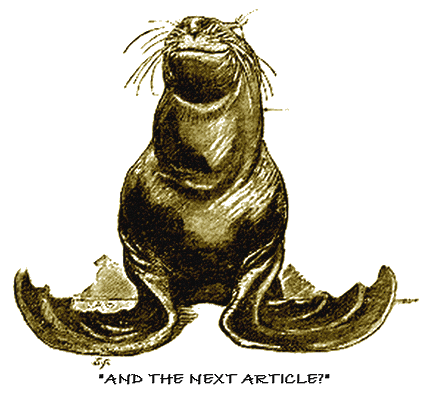
What the previous adventures of the sea-lion may have been in the matter of evolution, I am at a loss to guess, unless there is anything in the slug theory; but if he keep steadily on, and cultivate his moustache and his stomach with proper assiduity, I have no doubt of his one day turning up at a seaside resort and carrying on life in future as a fierce old German out for a bathe. Or the Cape sea-lion, if only he continue his obsequious smile and his habit of planting his fore-flappers on the ledge before him as he rises from the water, may some day, in his posterity, be promoted to a place behind the counter of a respectable drapery warehouse, there to sell the skins his relatives grow.
But after all, any phocine ambition, either for extinction or higher evolution, may be an empty thing; because the seal is very comfortable as he is. Consider a few of his advantages. He has a very fine fur overcoat, with an admirable lining of fat, which, as well as being warm, permits any amount of harmless falling and tumbling about, such as is suitable to and inevitable with the seal's want of shape. He can enjoy the sound of bagpipes, which is a privilege accorded to few. Further, he can shut his ears when he has had enough, which is a faculty man may envy him. His wife, too, always has a first-rate sealskin jacket, made in one piece, and he hasn't to pay for it. He can always run down to the seaside when so disposed, although the run is a waddle and a flounder; and if he has no tail to speak of—well, he can't have it frozen off. All these things are better than the empty honour of extinction; better than evolution into bathers who would be drownable, and translation into unaccustomed situations—with the peril of a week's notice. Wherefore let the seal perpetuate his race—his obstacle race, as one might say, seeing him flounder and flop.
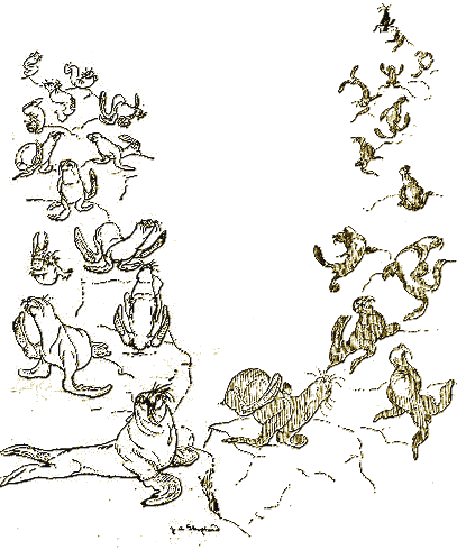
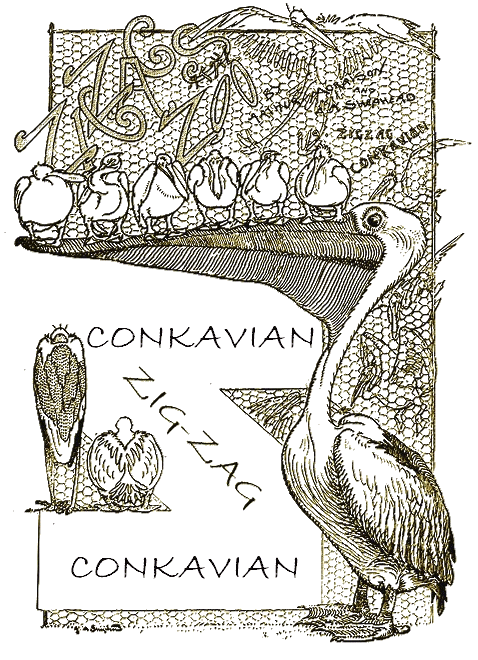
IF the gentle reader, full of a general desire for knowledge and a particular enthusiasm for natural history, will refer to any one of the great standard works on birds, and, turning to the index, seek for the family title of the Conkaves, I have every hope and confidence that he will not find it; because, as a matter of fact, it is a little invention of my own, and, I may modestly urge, rather a neat thing in scientific nomenclature, on the whole. It has the advantage of including in one family the storks and the pelicans, which in all orthodox books on birds are planted far apart and out of sight of each other, with many orders, tribes, and families between. Under my title they are gathered amicably together in the common possession of very long bills, like two tailors on a man's doorstep. The word is derived, in the proper and regular manner, from ancient sources; from conk, a venerable Eastern word, signifying a nose or beak, and the Latin avis, a bird. And I offer the term freely as my humble, but I trust useful, contribution to science; my first contribution.
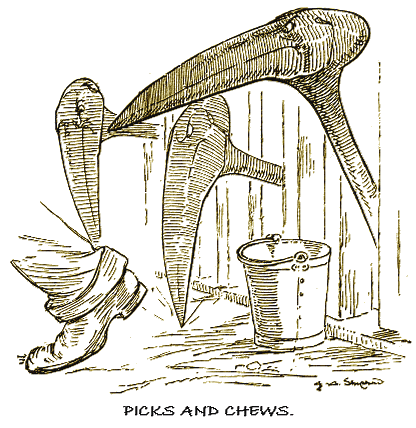
The stork is regarded, in many countries, with a certain semi-superstitious reverence and esteem. After many prolonged and serious attempts to saturate myself with a similar feeling, I regret to confess to a certain smallness of esteem for the stork. You can't esteem a bird that makes ugly digs at your feet and heels with such a very big beak. Out in their summer quarters the storks are kept in by close wire, and close wire will give an air of inoffensiveness to most things. But, away in a by-yard, with a gate marked "private," there stands a shed wherein the storks are kept warm in winter, behind wooden bars; and between these bars stork-heads have a way of dropping at the toes of the favoured passer-by, like to action of a row of roadmen's picks.
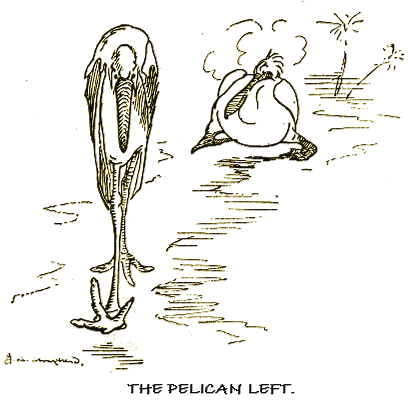
The stork has come off well in the matter of bodily endowment. The pelican has a tremendous beak—achieved, it would seem, by a skimping of material in the legs; but the stork has the tremendous beak and legs of surprising growth as well. His wings, too, are something more than respectable. At flying, at eating, at portentous solemnity of demeanour—in all these and in other things the pelican and the stork score fairly evenly; but at walking the pelican is left behind at once. This makes one suspect the stork's honesty. The pelican has a good beak and wings, and pays for them, like an honest bird, out of its legs, just as the ostrich pays for its neck and legs out of its wings. But the stork is abnormally lucky in beak, neck, legs, and wings together, and even then has material left to lay out in superfluous knobs and wens to hang round its neck, which leads to a suspicion that many of its personal fittings belong properly to some other bird. I've a notion that the unlucky kiwi might identify some of the property.
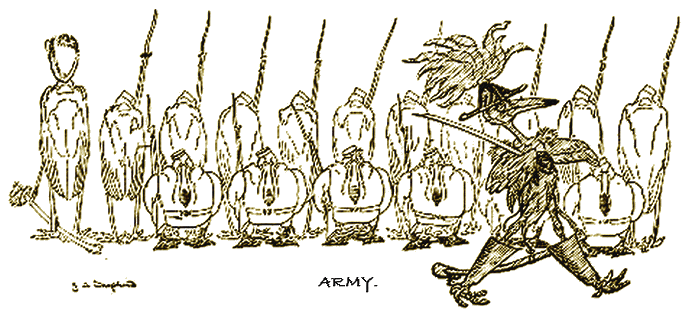
Perhaps the adjutant should be acknowledged king of the conkavians. Billy, the Zoo adjutant, has, I believe, no doubt on the subject at all. Billy is an ornament to the military profession—a very fine fellow, with a thing on the back of his neck like a Tangerine orange, and a wen on the front of it, which he can blow out whenever he wants to amuse himself, and everything else handsome about him. He is an old soldier, too, is Billy, having been Adjutant of the Regent's Park Conkavian Corps for seventeen years; but if you knew nothing of his age, still you would call Billy an old soldier—upon a little acquaintance with his habits.
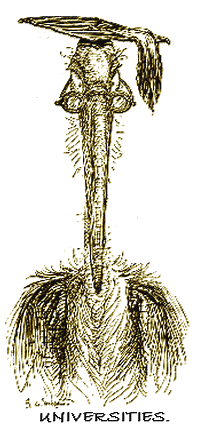
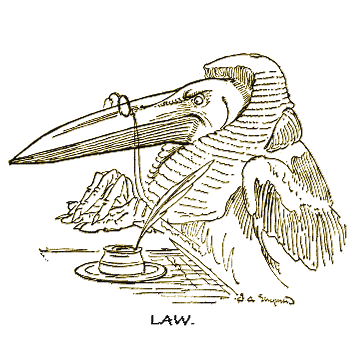
There seems no valid reason why the professional aspirations of the stork should be restricted to the army. If an adjutant, why not a dean? Why not a proctor? There is the making of a most presentable don about a stork; and I have caught a stork in an attitude of judicial meditation that might do honour to any bench. There is no reason why "sober as a judge" should not be made to read "sober as a stork," except that the stork is the more solemn creature of the two; and I think that some species of stork—say the marabou, for instance—might fairly claim brevet rank as judge, after the example of the adjutant. The elevation of a beak to the bench might be considered an irregular piece of legal procedure; but, bless you, it's nothing unusual with a stork. Put any bench with something to eat on it anywhere within reach of a stork's beak in this place, and you shall witness that same elevation, precedent or no precedent.
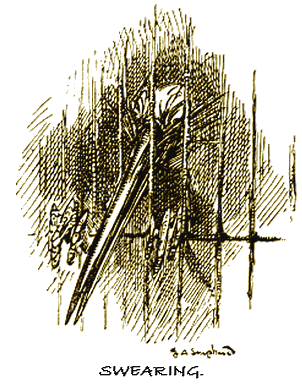
A common white stork hasn't half the solid gravity of an adjutant or a marabou. He has a feline habit of expressing his displeasure by blowing and swearing—a habit bad and immoral in a cat, but worse in a stork accustomed to Church. Church, by-the-bye, is the keeper of all the conkavians, as well as of the herons, the flamingoes, the ibises, the egrets, and a number of other birds with names more difficult to spell. It is impossible to treat disrespectfully a man with such widespread responsibilities as this, or there might be a temptation to mention that he is not an unusually high Church, although his services are not always simple, often involving a matter of doctorin'. But, then, some people will say anything, temptation or none. And after all, it is pleasant to know that, whatever a stork or a pelican wants, he always goes to Church.
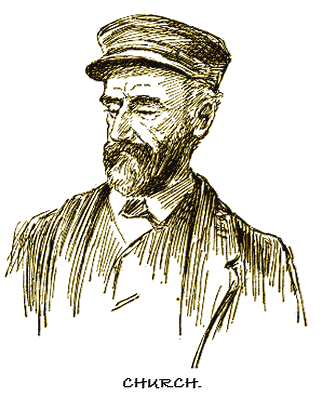
This being the case, there is a proverb about cleanliness that makes one wonder why the marabou stork doesn't wash himself. It isn't as though he never wanted it. I have a horrible suspicion about this philosophic old sloven. I believe his profession of philosophic contemplation is assumed, because it is the easiest excuse for indolence. Now, a pelican is not a bird of graceful outline, but he is careful about his feathers. The pelican is a scrupulous old Dutchman, and the stork is an uncleanly old Hindu. And uncleanly he must be left, for it takes a deal to shame a stork. You can't shame a bird that wraps itself in a convenient philosophy.
"Look here—look at me!" you can imagine a pelican cleanliness-missionary saying to the stork. "See how white and clean I keep all my feathers!" "Um," says the stork, "it only makes 'em a different colour." "But observe! I just comb through my pinions with my beak, so, and they all lie neat and straight!" "Well, and what's the good of that?" grunts the stork. "And then you see," says the pelican, ignoring the question, "with a good long beak you can reach everywhere, over your back and under your wings; see, I'm as clean under my wings as anywhere else, although it's covered up!" "Beastly vanity," growls the old Hindu, getting bored. "Then," continues the Dutchman, "you give yourself a good shake, and there you are!" "And then," says the philosopher sarcastically, "to-morrow, I suppose, you'll have to do it all over again?" "Of course!" "Oh! I hate a fool!" says the stork, and closes the lecture.
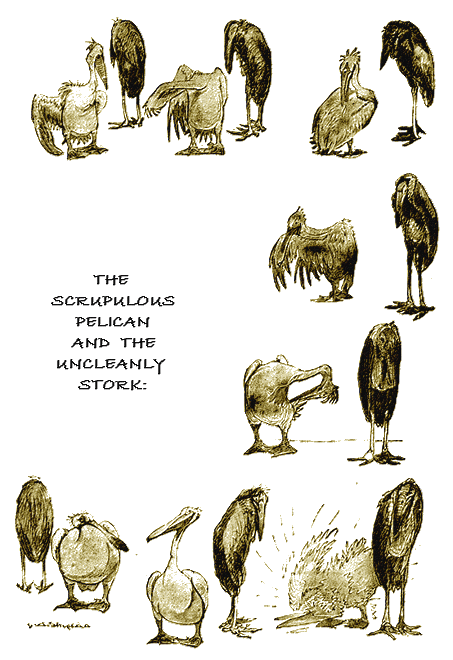
Thus the marabou. The ordinary white stork is comparatively respectable, and so is the adjutant—or comparatively almost respectable, let us say; you can't be too cautious in giving a personal character to a stork.
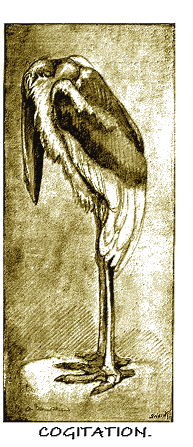
For long, long, the stork has enjoyed a reputation for solemn wisdom, for philosophical dignity. Now for the first time I venture to question this reputation—to impeach the stork as a humbug. It is easy to achieve a reputation for profound and ponderous wisdom, so long as one looks very solemn and says nothing. This is the stork's recipe. Go up to Billy here, or one of the marabous, as he stands with his shoulders humped up about his head, and make a joke. He won't see it. He will lift his eyebrows with a certain look of contempt, and continue to cogitate—about nothing. If the joke is a very bad pun—such a frightful pun that even a stork will see and resent it—perhaps he will chatter his beak savagely, with a noise like the clatter of the lid on an empty cigar-box; but he will continue his sham meditations. "Ah, my friend," he seems to say, "you are empty and frivolous—I cogitate the profounder immensities of esoteric cogibundity." The fact being that he is very seedy after his previous night's dissipation.
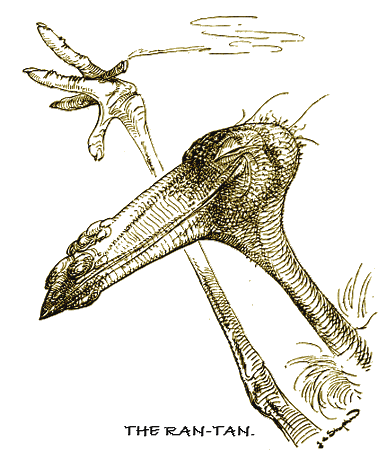
That is the chief secret of the stork's solemnity, I am convinced. He has a certain reputation to maintain before visitors, but after hours, when the gates are shut and the keepers are not there to see, the marabou stork is a sad dog. I haven't quite made up my mind what he drinks, but if he has brandies and sodas he leaves out too much soda. Look at that awful nose! It is long past the crimson and pimply stage—it is taking a decided tinge of blue. It looks worse than brandy and soda—almost like bad gin—but we will be as charitable as possible, and only call it brandy and soda.
I should like to see the marabou stork on his nightly ran-tan, if only to gloat over his lapse of dignity, just as one would give much to see Benjamin Franklin with his face blacked, drunk and disorderly and being locked up. But, as a shocking example, the marabou is quite bad enough with his awful head in the morning; his awful head and his disreputable nose, that looks to want a good scraping. I respect Billy, the adjutant, for his long service and the Tangerine at the back of his neck. The ordinary stork (although he swears and snaps) I also respect, because the goody books used to tell pious lies about him. The whale-headed stork, which is also called the shoe-bird, I respect as a sort of relative of the shoo-fly that didn't bother somebody. But the marabou has forfeited all respect—converted it into nose-tint. I must talk to Church seriously about the marabou.
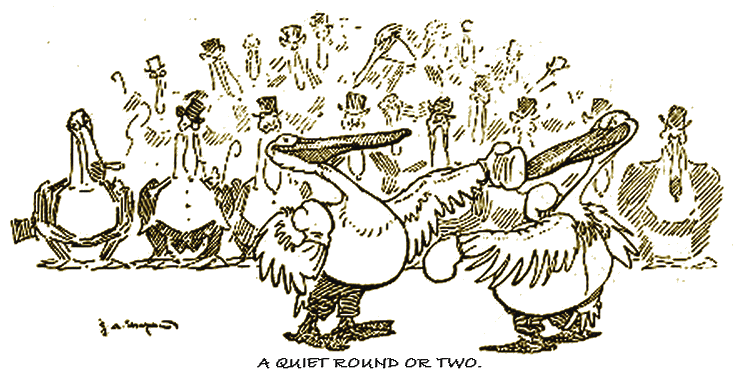
Now, the pelican is no humbug. There is nothing like concealment about his little dissipations; and he is perfectly sober. Any little irregularity at the pelican club just opposite the eastern aviary never goes beyond a quiet round or two for a little fish dinner. It is quite a select and a most proper club. Indeed, the first rule is, that if any loose fish be found on the club premises, he is got rid of at once by the first member who detects him. And the club spirit is such that disputes frequently occur among members for the honour of carrying out this salutary rule. The chairman of the club is an old crested pelican, who, by some oversight, has never been provided with a private name of his own. I think he should be called Peter, because he can take such a miraculous draught of fishes. It is a draught; you know—a pelican doesn't eat fishes—he drinks them down in bulk. For Peter, a dozen or so fresh herrings is a mere swill round of the mouth.
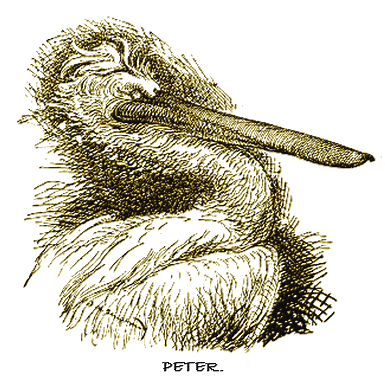
Peter walks about the club premises with much dignity, deferred to on all sides by the other members. His kingship is rarely disputed, having been achieved by the sort of conquest most familiar in the pelican club; and his divine right is as much respected as his tremendous left.
A pelican never bears malice; he hasn't time, especially now, with competition so keen in the fish business, and Church's fish pails only of the ordinary size. There is never any ill-feeling after a little spar, and each proceeds, in the most amicable way, to steal some other pelican's fish. A spar at this club, by-the-bye, is a joyous and hilarious sight. Two big birds with stumpy legs and top-heavy beaks, solemnly prancing and manoeuvring before one another with an accompaniment of valiant gobbles and a punctuation of occasional pecks—a gleesome spectacle.
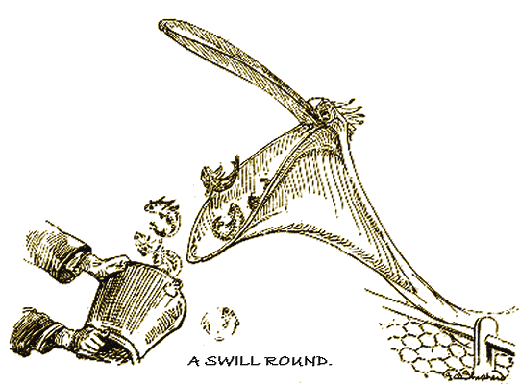
Another sport much exhibited at the pelican club is that of the broadsword. The school of fence is that of Mr. Vincent Crummies—one—two—three—four—over; one—two—three—four—under. You see, when a dozen or two birds with beaks a couple of feet long or so get together in a small area, and now and again rush all in the same direction for fish, fencing is certain to develop, sooner or later. So here you have it, secundum artem—one—two—three—four—over; one—two—three—four—under; and although none have yet attained the Crummleian degree of knocking out sparks, there is a deal of hollow noise, as of thumping on a wooden box.
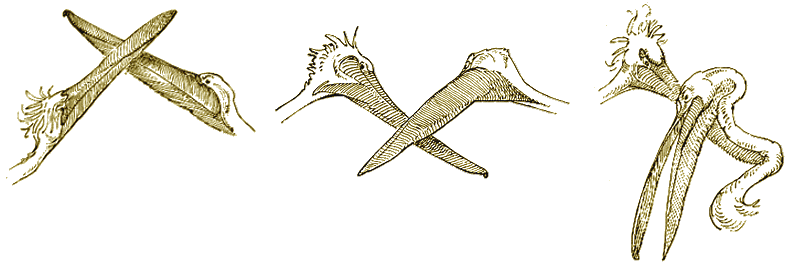
But there is never any after-malice, and in less than five minutes either combatant will swallow a fish rightfully belonging to the other, with perfect affability.
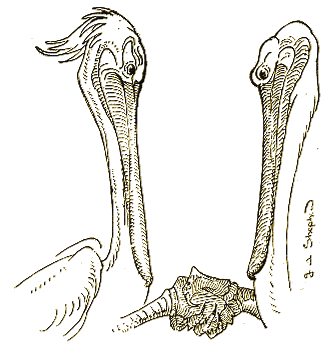
There is a good deal of the philosopher about the pelican, and of a more genuine sort than characterizes the stork. The pelican always makes the best of a bad job, without going into an unnecessary tantrum over it. If another member of the club snatches a fish first, the pelican doesn't bother, but devotes his attention to the next that Church throws; a fish in the pouch is worth a shoal in somebody else's. Now and again Peter loses his temper for a moment if the others catch the first snack, and lays about him with his bill—but then, when a fellow's chairman, and a lot of other fellows come snatching the lunch from under his nose—why, hang it all, you know...But it is only for a moment, and Peter is soon in position for the next pouchful. He is artful about this position. When Church appears at the rails with a pailful of fish most of the members rush to those rails, jostle together and shove their beaks through them and over them—any way to get nearer the pail. But the chairman knows very well that Church doesn't throw the fish outside the rails, but into the inclosure, somewhere near the middle; and near the middle the sagacious Peter waits, to his early profit—unless Church is unusually slow about throwing the fish, in which case Peter is apt to let his excitement steal his sagacity, and to rush into the pell-mell, anxious to investigate the delay.
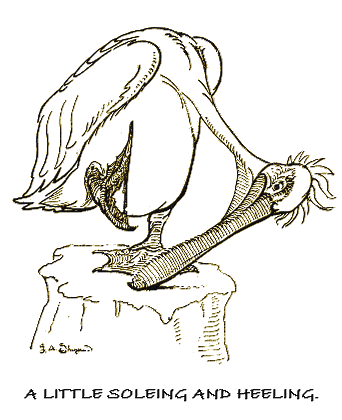
There is a deal of excellent wear in a pelican. One has been here about thirty years, and two more have been established on the same premises for a quarter of a century. All these three are in capital working repair and will probably last, with a patch or two, and a little soleing and heeling, for a century or two more; no respectable pelican is ever bowled out for less than three figures.
In the winter the club takes up its quarters in the shed behind the inclosure; a shed sumptuously furnished with certain benches and forms, whereon the club stands in rows, with a general appearance of a number of very solemn naughty boys in a Board school. In winter, too, Church will often put his bucketful of fish on the ground, so that the club may dine in a clubbier way. But whether you watch this club feeding together from the pail, each member doing his best to put away the whole pailful at a gulp, or whether you observe them playing a sort of greedy game of lacrosse with fish which Church throws them, you will be equally amazed that the pelican was used as a symbol of charity and brotherly love in early and middle Christian art.
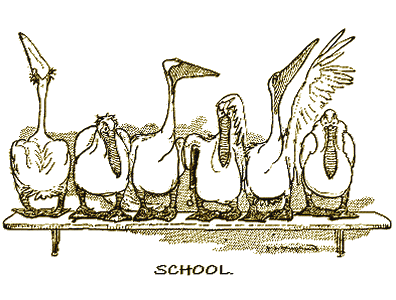
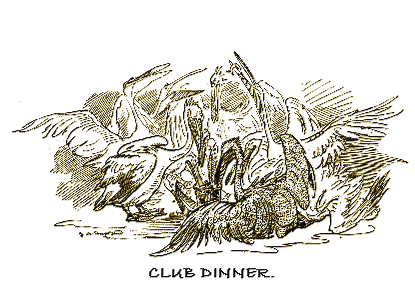
I have seen a pelican enact a most instructive moral lesson at a pail-dinner. Observe the bill and pouch of a pelican. The pouch is an elastic fishing-net, and the lower mandible is a mere flexible frame to carry it. Now, I have observed a pelican to make a bounce at the fish-pail, with outspread wings, and scoop the whole supply. But then his trouble began. The whole catch hung weightily low in the end of the pouch, and jerk and heave as he might, he could never lift the load at the end of that long beak sufficiently high to bolt it.
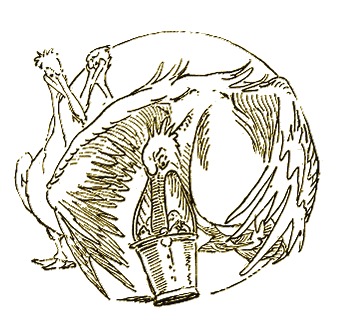
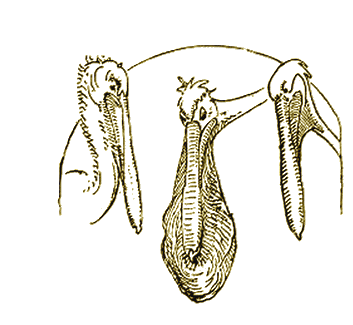
Meanwhile, his friends collected about him and remonstrated, with many flops and gobbles, betting him all his fish to nothing that he would lose it after all; this way they chased that bag, and that way, while the bagger, in much trepidation and with many desperate heaves, wildly sought remote corners away from his persecutors.
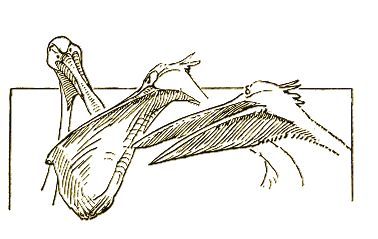
Now, by the corner of the club premises stands an appliance, the emblem of authority, the instrument of justice, and the terror of the evilly-disposed pelican—a birch-broom. This, brandished in the hands of Church, caused a sudden and awful collapse of the drag-nets, an opening, a shower of fish and many snaps; wherefrom walked away many pelicans with fish, and one with none, who had looked to take all. The moral is plain to the verge of ugliness.
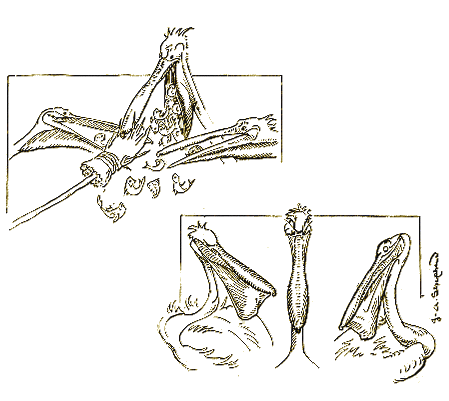
A pelican has no tongue—or none to speak of. It is a mere little knob scarcely the size of a cherry. The long, long meditations of the pelican (lasting between feeding times) are given up to consideration whether or not the disgrace of this deficiency is counter-balanced by the greater capacity for fish which it gives the pouch. After all, it is only another instance of that commercial honesty which makes the pelican pay for his beak out of his legs; he gives his tongue for a pouch. There should be a legend of the pelican applying honestly to Adam to buy a pouch, and the wily stork waiting and waiting on the chance of snatching one without paying for it, until all had been served out; afterwards living all its life on earth in covetous dudgeon, unconsoled by its wealth of beak, legs, wings, and neck, and pining hopelessly for the lost pouch. There are many legends of this sort which ought to exist, but don't, owing to the negligence of Indian solar myth merchants, or whoever it is has charge of that class of misrepresentation.

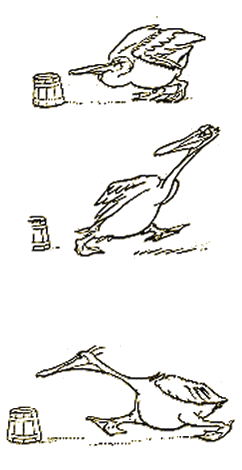
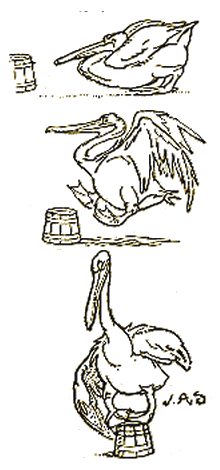
The pelican can fly, although you would never believe it, to look at the club members here. To a Zoo pelican a flight of two feet is an undertaking to be approached with much circumspection and preparation, and a summoning of resolution and screwing of courage proper to the magnitude of the feat. It takes a long time to learn to fly on to a bottom-up bucket. The Zoo pelican begins on a shadow—not a very dark one at first—and works his way up by jumping over, darker shadows to straws and pebbles, before he tries a bucket. The accomplished bucket-jumper makes a long preliminary survey and circumnavigation of his bucket before performing, and when he does begin it is with a number of wild rushes and irresolute stops. When at last he gets the proper length of run, and the right foot in front, and doesn't see anything to baulk him, he rises with a great effort, and all the lookers-on who don't know him stare up over the trees, and are astonished to find him, after all, only on the bucket. His pinions are cut, poor fellow! If they were not, what would become of the fishmongers' shops?
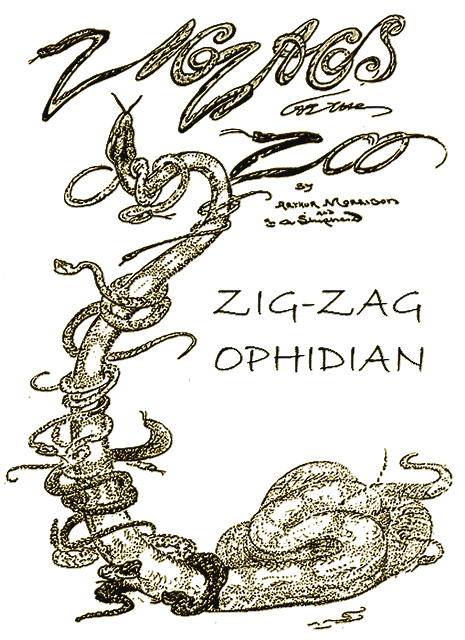
THERE is a certain coolness, almost to be called a positive want of cordiality, between snakes and human beings. More, the snake is never a social favourite among the animals called lower. Nobody makes an intimate friend of a snake. Popular natural history books are filled and running over with anecdotes of varying elegance and mendacity, setting forth extraordinary cases of affection and co-operation between a cat and a mouse, a horse and a hen, a pig and a cockroach, a camel and a lobster, a cow and a wheelbarrow, and so on; but there is never a snake in one of these quaint alliances. Snakes do not do that sort of thing, and the anecdote-designer's imagination has not yet risen to the feat of compelling them, although the stimulus of competition may soon cause it.
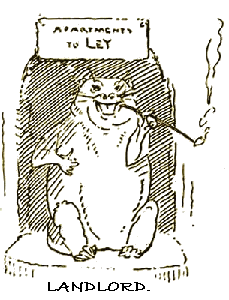
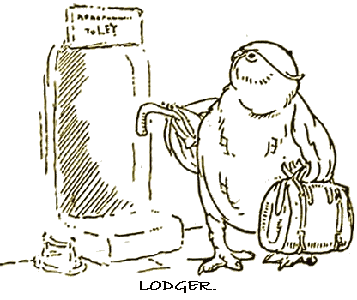
The case most nearly approaching one of friendship between man and snake known to me is the case of Tyrrell, the Zoo snake keeper, and his "laidly worms." But, then, the friendship is mostly on Tyrrell's side, and, moreover, Tyrrell is rather more than human, as anyone will admit who sees him hang boa constrictors round his neck. Of course one often hears of boys making pets of common English snakes, but a boy is not a human creature at all; he is a kind of harpy.
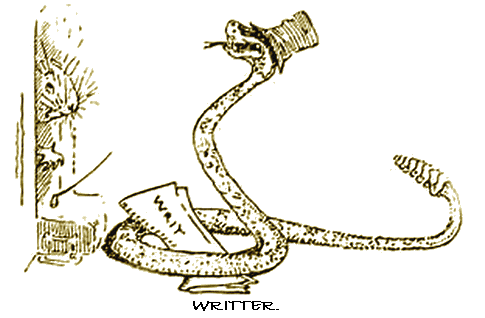
The prairie marmot and the burrowing owl come into neighbourly contact with the rattlesnake, but the acquaintance does not quite amount to friendship. The prairie marmot takes a lot of trouble and builds a nice burrow, and then the owl, who is only a slovenly sort of architect himself, comes along and takes apartments. It has never been quite settled whether or not the lodger and the landlord agree pleasantly together, but in the absence of any positive evidence they may be given credit for perfect amiability; because nobody has found traces of owl in a dead marmot's interior, nor of marmot in an owl's. But the rattlesnake is another thing. He waits till the residence has been made perfectly comfortable, and then comes in himself; not in the friendly capacity of a lodger, but as a sort of unholy writter—a scaly man-in-possession. He eats the marmot's family and perhaps the marmot himself: curling himself up comfortably in the best part of the drawing-room. The owl and his belongings he leaves severely alone; but whether from a doubt as to the legality of distraining upon the goods of a lodger, or from a certainty as to the lodger's goods including claws and a beak, naturalists do not say.
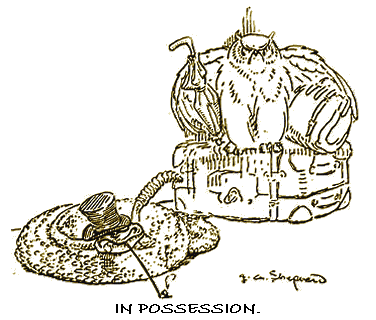
Personally, I incline very much to the claw-and-beak theory, having seen an owl kill a snake in a very neat and workmanlike manner; and, indeed, the rattlesnake sometimes catches a Tartar even in the marmot. It isn't terror of the snake that makes him unpopular; the most harmless snake never acquires the confidence of other creatures; and one hesitates to carry it in his hat. This general repugnance is something like backing a bill or paying a tailor—entirely a matter of form. Nothing else has sympathy with the serpent's shape.
When any other animal barters away his legs he buys either fins or wings with them; this is a generally-understood law, invariably respected. But the snake goes in for extravagance in ribs and vertebræ; an eccentric, rakish, and improper proceeding; part of an irregular and raffish life. Nothing can carry within it affection, or even respect, for an animal whose tail begins nowhere in particular, unless it is at the neck; even if any creature may esteem it an animal at all that is but a tail with a mouth and eyes at one end. Dignify the mouth and eyes into a head, and still you have nothing wherewith to refute those who shall call the snake tribe naught but heads and tails; a vulgar and raffish condition of life, of pot-house and Tommy-Dod suggestion.
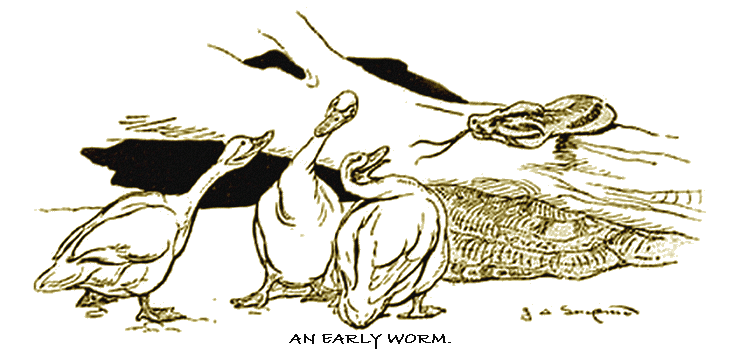
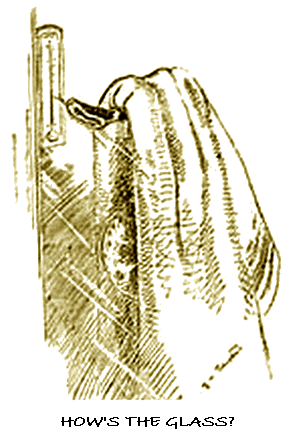
And this is why nothing loves a snake. It is not because the snake is feared, but because it is incomprehensible. The talk of its upas-like influence, its deadly fascination, is chiefly picturesque humbug. Ducks will approach a snake curiously, inwardly debating the possibility of digesting so big a worm at one meal; the moving tail-tip they will peck at cheerfully. This was the sort of thing that one might have observed for himself years ago, here at the Zoo; at the time when the snakes lived in the old house in blankets, because of the unsteadiness of the thermometer, and were fed in public. Now the snakes are fed in strict privacy lest the sight overset the morals of visitors; the killing of a bird, a rabbit, or a rat by a snake being almost a quarter as unpleasant to look upon as the killing of the same animal by a man in a farmyard or elsewhere. The abject terror inspired by the presence of a snake is such that an innocent rat will set to gnawing the snake's tail in default of more usual provender; while a rabbit placed with a snake near skin-shedding time will placidly nibble the loose rags of epidermis about the snake's sides.

The pig treats the snake with disrespect, not to say insolence; nothing, ophidian or otherwise, can fascinate a pig. If your back garden is infested with rattlesnakes you should keep pigs.
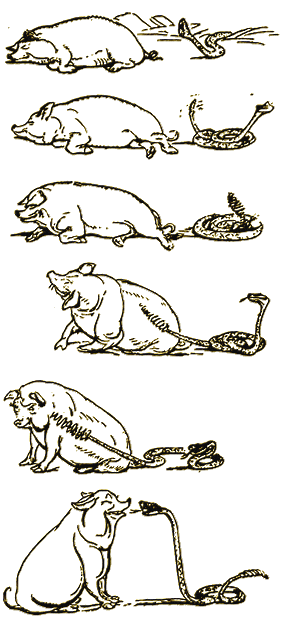
The pig dances contemptuously on the rattlesnake, and eats him with much relish, rattles and all. The last emotion of the rattlesnake is intense astonishment; and astonishment is natural, in the circumstances. A respectable and experienced rattlesnake, many years established in business, has been accustomed to spread panic everywhere within ear and eye shot; everything capable of motion has started off at the faintest rustle of his rattles, and his view of animal life from those expressionless eyes has invariably been a back view, and a rapidly diminishing one. After a life-long experience of this sort, to be unceremoniously rushed upon by a common pig, to be jumped upon, to be flouted and snouted, to be treated as so much swill, and finally to be made a snack of—this causes a feeling of very natural and painful surprise in the rattlesnake. But a rattlesnake is only surprised in this way once, and he is said to improve the pork.
As a tour de force in the gentle art of lying, the snake-story is justly esteemed. All the records in this particular branch of sport are held in the United States of America, where proficiency at snakes is the first qualification of a descriptive reporter. The old story of the two snakes swallowing each other from the tail till both disappeared; the story of the snake that took its own tail in its mouth and trundled after its victim like a hoop; the story of the man who chopped a snake in half just as it was bolting a rat, so that the rat merely toddled through the foremost half and escaped—all these have been beaten out of sight in America.
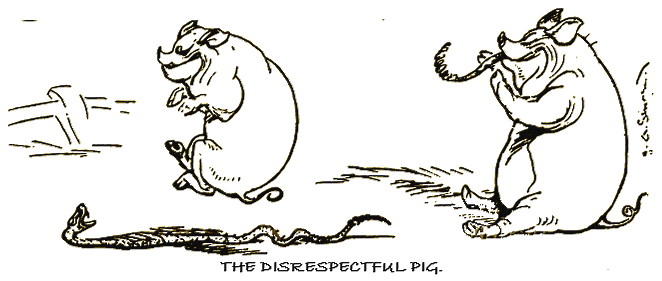
At present Brazil claims the record for absolute length of the snakes themselves; but the Yankee snake-story man will soon claim that record too. He will explain that each State pays a reward for every snake killed within its own limits; but that there are always disputes between the different States as to payment; because most of the snakes killed are rather large, crawling across several States at once.
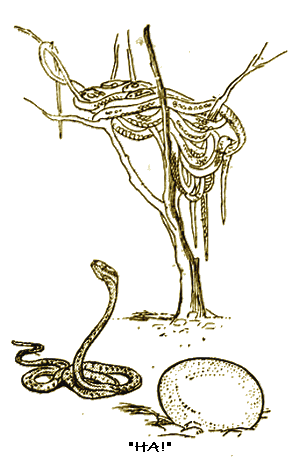
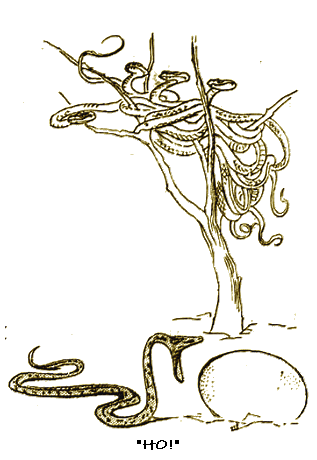
Here, among a number of viperine snakes of about the same size, is a snake that lives on eggs. He is about as thick as a lead pencil, but that doesn't prevent his swallowing a large pigeon's egg whole, nor even a hen's egg at a pinch. It dislocates his jaw, but that is a part of his professional system, and when the business is over he calmly joints up his jaw again and goes to sleep. He is eccentric, even for a snake, and wears his teeth on his backbone, where they may break the egg-shell so that he may spit it away. When he first stretched his head round an egg, the viperine snakes in the same case hastily assumed him to be a very large tadpole; and since tadpoles are regarded with gastronomical affection by viperine snakes, they began an instant chase, each prepared to swallow the entire phenomenon, because a snake never hesitates to swallow anything merely on account of its size.
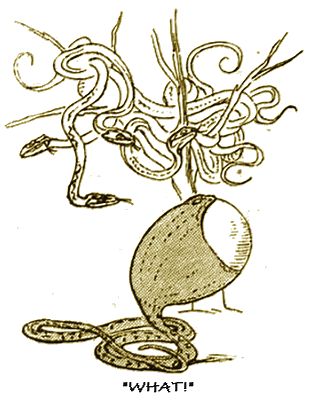
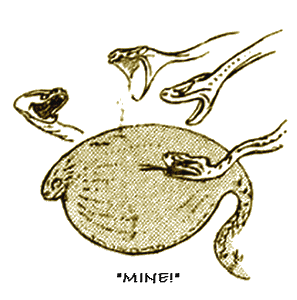
When finally the egg-swallower broke the egg, and presented to their gaze the crumpled shell, the perplexed viperines subsided, and retired to remote corners of the case to think the matter over and forget it—like the crowd dispersed by the circulating hat of the street-conjurer.
Familiarity with the snake breeds toleration. He is a lawless sort of creature, certainly, with too many vertebræ and no eyelids; but he is not always so horrible as he is imagined.
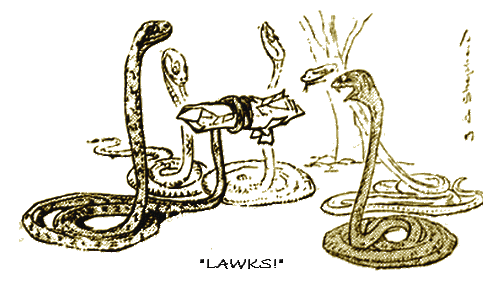
A snake is rather a pleasant thing to handle than otherwise. Warm, firm, dry, hard and smooth on the scales, rather like ivory to the touch. He is also a deal heavier than you expect. When for good behaviour I have been admitted to Tyrrell's inner sanctum here, and to the corridors behind the lairs, where hang cast skins like stockings on a line, I have handled many of his pets. I have never got quite as far as rattlesnakes, because rattlesnakes have a blackguardly, welshing look that I don't approve. But there is a Robben Island snake, about five feet long, with no poison, who is very pleasant company. It is a pity that these snakes have no pet names. I would suggest The Pirate as a suitable name for any snake from Robben Island.
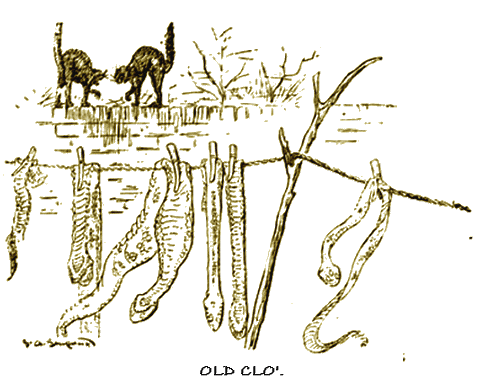
For anybody who has been bitten by a cobra, or a rattlesnake, or a puff-adder, there are many remedies, but few people who can recommend them from personal experience. It is to be feared that most of them unfortunately die before writing their testimonials. Perhaps they were too long deciding which thing to take. The most famous of these remedies, and probably the best, on the whole, is to get excessively drunk. It is expensive to get drunk after a poisonous snake-bite, because something in the veins fortifies the head against the first bottle or two of whisky.
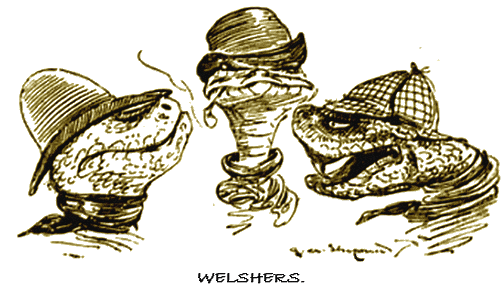
Getting drunk before the bite won't do, although there would appear to be a very widely prevalent impression that it will, and a very common resolve to lay up a good store of cure against possible accidents in the future. This may be misdirected prudence, and nothing else, but there is often a difficulty in persuading a magistrate to think so.
The snake will be eccentric, even in the matter of its eggs. Most snakes secure originality and independence in this matter by laying eggs like an elongated tennis-ball—eggs covered with a sort of white parchment or leather instead of shell. All the rest go further, and refuse to lay eggs at all.
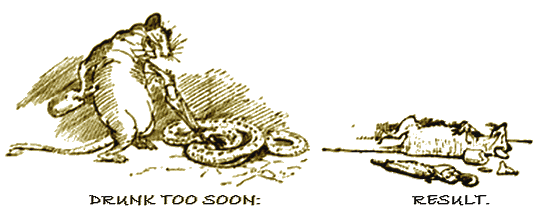
The snake insists on having his food fresh; you must let him do his own killing. Many carry this sort of fastidiousness so far as to prefer taking it in alive, and leaving it to settle matters with the digestive machinery as best it may.
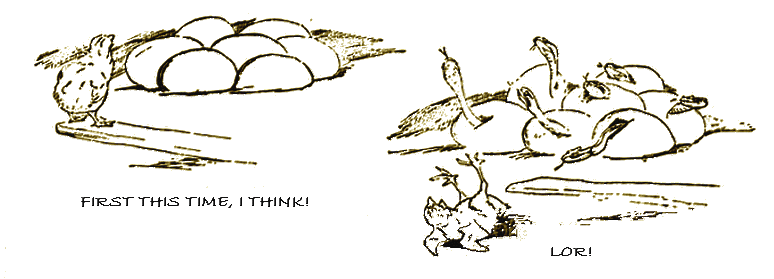
A snake of this sort has lost his dinner before now by gaping too soon; a frog takes a deal of swallowing before he forgets how to jump.
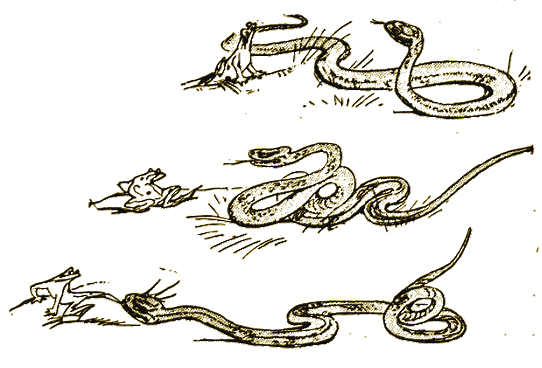
It is well to remember what to do in case of attack by a formidable snake. If a boa constrictor or a python begin to curl himself about you, you should pinch him vigorously, and he will loosen his folds and get away from you. Some may prefer to blow his head off with a pistol, but it is largely a matter of taste, and one doesn't want to damage a good specimen. The anaconda, however, who is the biggest of the constrictors, won't let go for pinching; in this case the best thing is not to let him get hold of you at all.
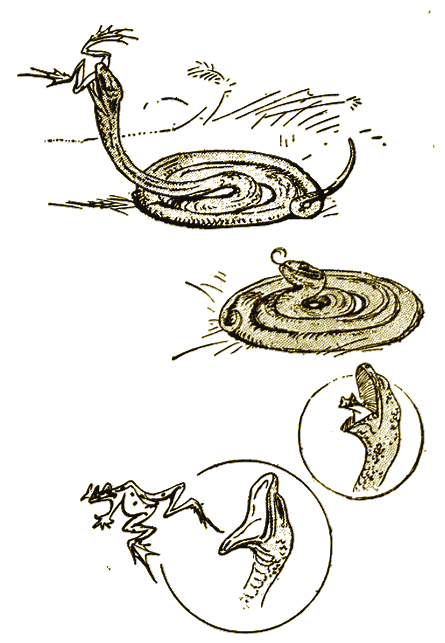
Tobacco-juice will kill a puff-adder. If you come across a puff-adder, you should open his mouth gently, remembering that the scratch of a fang means death in half an hour or so, and give him the tobacco-juice in a suitable dose; or you can run away as fast as possible, which is kinder to the snake and much healthier for yourself.
By far the biggest snake here is the python, in the case opposite the door; he is more than twenty feet long, and is seriously thinking of growing longer still. Tyrrell picks him up unceremoniously by the neck and shoves him head first into a tank of water, when he seems to need a little stir and amusement. I think, perhaps, after all, the most remarkable being exhibited in the reptile house is Tyrrell. I don't think much of the Indian snake-charmers now. See a cobra raise its head and flatten out its neck till it looks like a demoniac flounder set on end; keep in mind that a bite means death in a few minutes; presently you will feel yourself possessed with a certain respect for a snake-charmer who tootles on a flute while the thing crawls about him.

But Tyrrell comes along, without a flute—without as much as a jew's-harp—and carelessly grabs that cobra by the neck and strolls off with it wherever he thinks it ought to go, and you believe in the European after all. He is a most enthusiastic naturalist, is Tyrrell. He thinks nothing of festooning a boa constrictor about his neck and arms, and in his sanctum he keeps young crocodiles in sundry watering-pots, and other crawling things in unexpected places. You never quite know where the next surprise is coming from. I always feel doubtful about his pockets. I shouldn't recommend a pickpocket to try them, unless he really doesn't mind running against a casual rattlesnake.
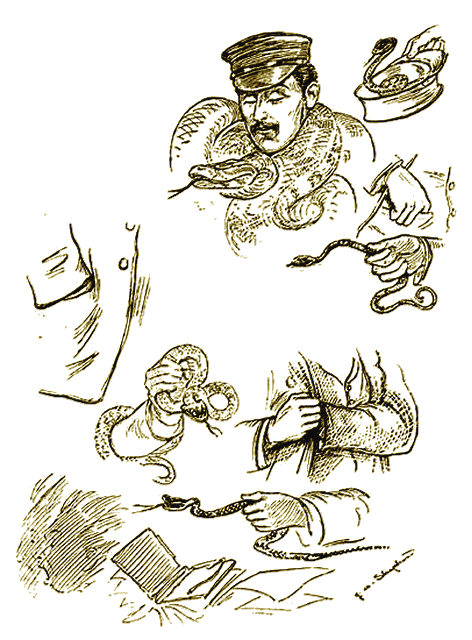
Tyrrell is the sort of man who is quite likely to produce something from his cap and say: "By-the-bye, this is a promising youngster—death adder, you know. And here," taking something else from his coat or vest pocket, "is a very fine specimen of the spotted coffin-filler, rather curious. It isn't very poisonous—kills in an hour or so. Now, this," dragging another from somewhere under his coat, "is rather poisonous. Deadly grave-worm—kills in three seconds. Lively little chap, isn't he? Feel his head." Whereat you would probably move on.
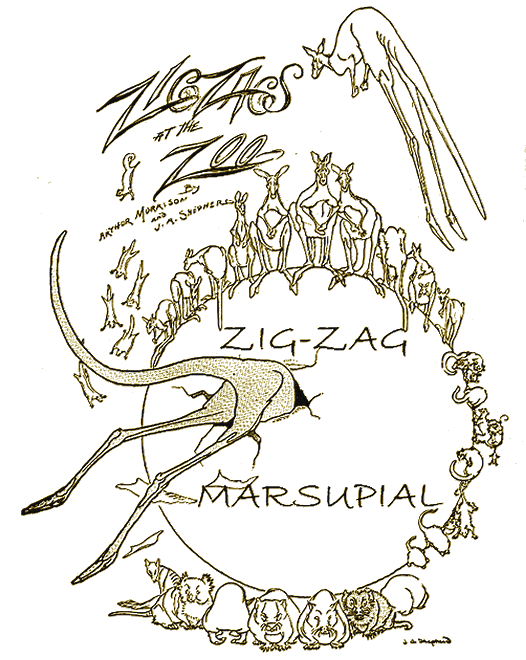
WHEN an animal is more than usually a fool for its size, Nature indulgently permits it to go about with a pouch that it may not lose its family. Nature also sends it to live in Australia, and man, seeing more common sense in the pouch than anywhere else in the creature, calls the entire organism a marsupial, after the pouch. Only one marsupial is allowed to live out of Australia, and that is the opossum; but, then, the opossum is no fool, and can take care of itself in the outer world. Here at the Zoo, besides the opossum, we have kangaroos, wallabies, wallaroos, wombats, and certain other eccentric things, including the Tasmanian devil; but none is a bigger fool than the biggest marsupial, the kangaroo. This is natural, because he has most room to store his imbecility. The kangaroo's general weakness of character is visible all over him. He has never quite made up his mind what to be even now; he is nothing but a flabby compromise.
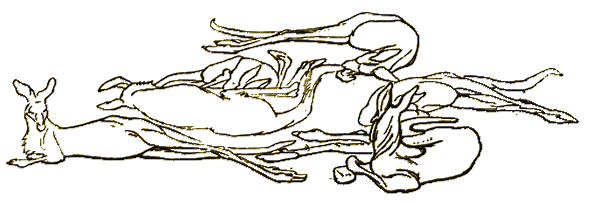
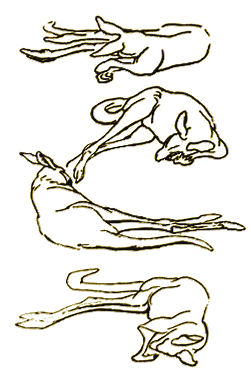
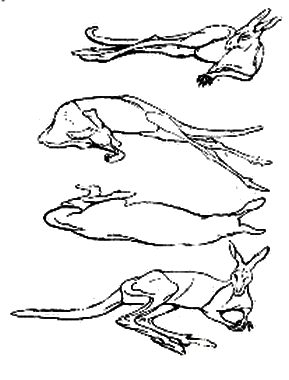
There would appear to be two plausible theories about the construction of the kangaroo; when, in the beginning, the animals chose their parts, the kangaroo may have been first, and weakly and indecisively chose at random, of no set purpose; or he may have been last, and obliged to put up with what was left. I incline to the first theory, partly because the kangaroo is well furnished as regards quality of parts, although they are oddly assorted, and partly because to make an indeci-
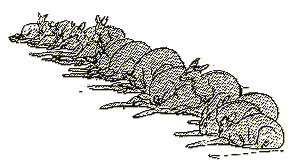
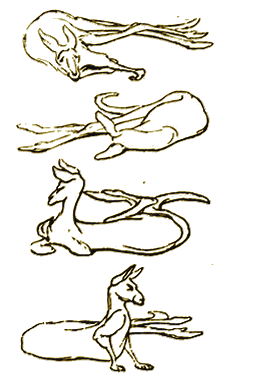
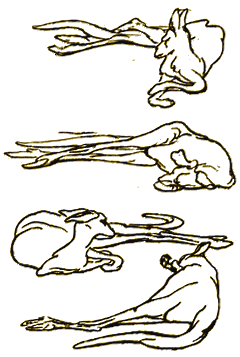
sive selection would be just in accord with his character. He fancied a sheep's head, rather, but hadn't enough decision of character to take a sheep's head as it was and be thankful for it. He preferred a donkey's ears to the sheep's, so had them substituted. Even then, some mistrust of the boldness of the design intimidated him, and he cautiously compromised by having them small. The only part of a kangaroo or wallaby that has the least independence about it is the tail; and the wallabies are so proud of the individuality, that they sit with their tails extended before them all day:

and the colonist acknowledges the merit of the kangaroo's tail by making soup of it. Let us grant the kangaroo his tail, since it is the only thing that is unmistakably his own. Abashed at his own temerity in venturing to take an independent tail, all the kangaroo's other selections became hopelessly demoralized. He took a grasshopper's hind legs, and plagiarized a rat's fore-paws. Obviously, he got the design of his coat partly from the rabbit and partly from the rat, and the idea of his pouch from the bookmaker.

Now, it is a noticeable thing, illustrative of the mental stagnation of the kangaroo, that, having adopted the crude idea of the bookmaker's or 'bus-conductor's pouch, he—or, rather, she—through all the generations, has never developed an improvement on that pouch, either by evolution, selection, or natural adaptation.
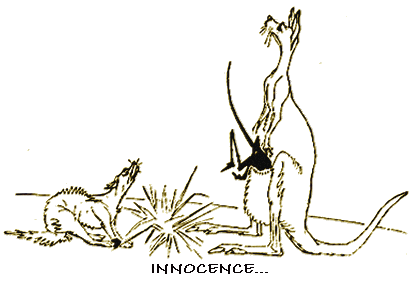
Even in these days of improvement, the kangaroo's pouch has no separate compartment for silver. Of course it is mainly used to carry the family in, but in any really intelligent and enterprising class of animals that pouch would long ago have improved and developed, through the countless ages, into a convenient perambulator, with rubber tires and a leather hood. As it is, the kangaroo has not so much as added a patent clasp. Still, in its merely primitive form, the pouch is found useful by the small kangaroo.
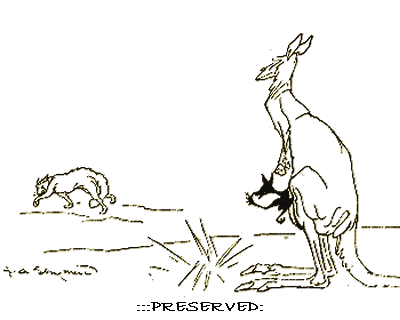
It is an ever-ready refuge from the prowling dingo dog, and any little kangaroo who breaks a window has always a capital hiding-place handy. Indeed, the young kangaroo would fare ill without this retreat, because any other cradle the mother, being a kangaroo, would probably forget all about, and lose. It is only because the pouch hangs under her very nose that she remembers she has a family at all. All the kangaroo's strength seems to have settled down into the hind legs and the tail, leaving the other parts comparatively weak, and the head superlatively useless, except as an attachment for the mouth. One would imagine that in the period which has elapsed since the Creation the feeblest-minded of animals would have had time to arrive at some final choice in the matter of coat-colour; but the kangaroo hasn't. He never makes up his mind about anything; he begins life in a pale-grey colour; in a year or two he changes his mind and turns very dark—darker than either his father or his mother. The originality pleases him for a little while, and then he gets doubtful of his choice, and makes a wretched compromise—the kangaroo is compromise all over—settling down for the rest of his life to a tint midway between the light and the dark. If he lived a little longer he would probably experiment in blue. As it is, he sometimes makes an attempt in pink—with powder. Only the male kangaroo uses this cosmetic, and where he finds it and how he keeps it is a mystery; he doesn't put it on his face—he devotes it entirely to the complexion of his chest and stomach.
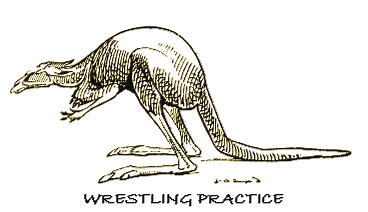
Australians call a full-grown male kangaroo a "boomer": why, I don't know. I could understand the application of the term in this country, where such a thing as a boom in boxing kangaroos has been heard of, and—this some while ago—a "white kangaroo" boom. The boxing kangaroo has made a very loud boom indeed, and has done something to earn the title of "boomer."
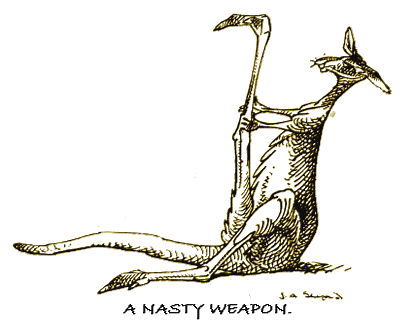
Here, at the Zoo, however, there would seem to be little ambition among the kangaroos to distinguish themselves as boxing boomers; but there is a very frequent attitude suggestive of wrestling practice—perhaps because these would-be boomers have muddled things, and are thinking of the wrestling lion. Personally, I am not anxious either to box or to wrestle with a kangaroo; for the beast has a plaguey unpleasant hind foot, armed with a claw like a marline-spike, and a most respectable ability to kick a hole in a stranger with it. It is a kind of weapon that ordinary boxing and wrestling systems don't allow for, and not at all an amusing sort of thing to have lashing about among one's internal machinery.
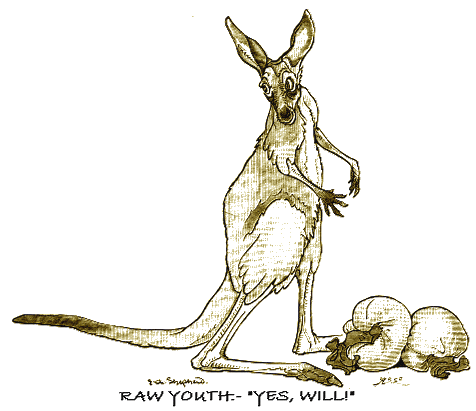
I don't wish to attribute any unsportsmanlike proceedings to the kangaroo now before the public, but to point out that the indiscriminate election of kangaroos into boxing clubs should be discouraged; especially of raw young kangaroos, ready to put on the gloves with anybody and to lose their tempers. Beware of kangaroo upper-cuts. Indeed, the boxing kangaroo should properly wear two pairs of gloves, and the bigger and softer pair should go upon his hind feet. For his is a form of la savate which admits neither of duck, guard, nor counter; and leaves its signature in a form long to be remembered and hard to stitch up.
The white kangaroo was much less of a boomer. He dared to be original as to colour, and has been shivering and cowering and looking miserable ever since in terror of his own independence; he looks only a sort of unhappy white rabbit, overgrown in the hinder half. But there is encouragement to be got from the case of the boxing boomer. The kangaroo will never become clever of himself, but perhaps the showman may teach him. There are many comic opportunities in the kangaroo—particularly in the pouch. Let the showman see to it.
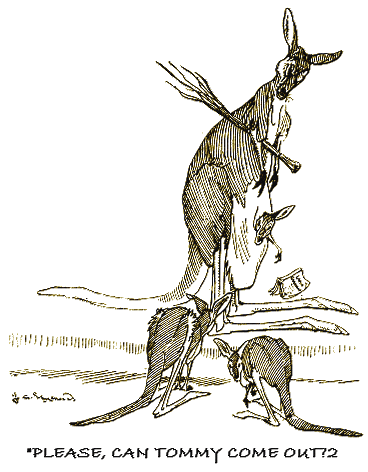
The most entirely objectionable of all the marsupials is the Tasmanian devil. It is only a little devil, a couple of feet or so long, but its savagery is beyond measuring by anything like a two-foot rule. No reasonable devils could wish to be treated with more indulgence than the Zoological Society extends to these. A rolling blind is provided to keep the sun out of their eyes, and they are politely labelled "Ursine Dasyures," for fear of offending them. They ill deserve either attention, and at any rate I should like to see the label changed. The function of the Tasmanian devil in the economy of Nature is to bite, scratch, tear and mangle whatever other work of Nature happens to be within reach. It is touching to observe the preference exhibited by the Tasmanian devil for its keeper, who feeds it; it tries to bite him much oftener and more savagely than anybody else. Thus you observe that kindness has some effect, even with the Tasmanian devil.
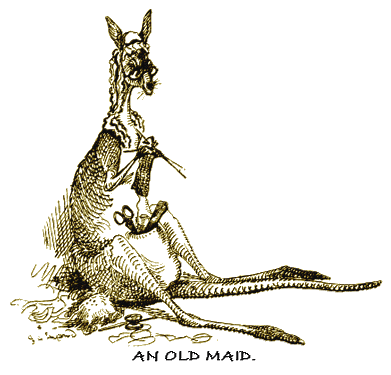
Of course, by its nature, it resents kindness more than anything else, but it will also attack anybody for cruelty, or indifference, or admiration, or curiosity, or for looking at it, or for not looking at it, or any other injury. You can't drive it away with anything; it won't go for a stick and it won't go for a gun; nevertheless it will go for you, like three hundred wild cats.
The Tasmanian method of taming it is to blow it into space with a heavy charge of buckshot; and this seems to be the only way of rendering it quite harmless. In life the Tasmanian devil has one desire, one belief, one idea—general devastation. Herein, perhaps, he is the superior of the kangaroo, who doesn't have ideas.
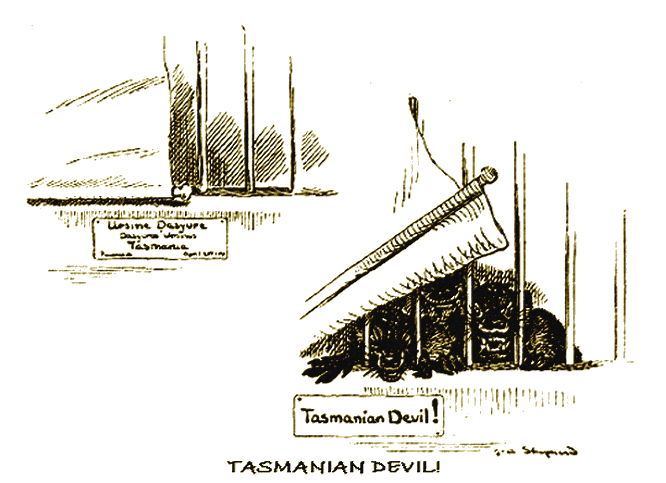
There is a superstition that once, in distant ages, a kangaroo had an idea, and if you closely observe a kangaroo who is left to himself, you may see something in that superstition. Ever since the time of that idea (which, of course, the kangaroo forgot) the whole race of kangaroos has been trying desperately to remember it. Whenever a kangaroo finds himself alone, and unobserved, he addresses himself to recollecting that idea.
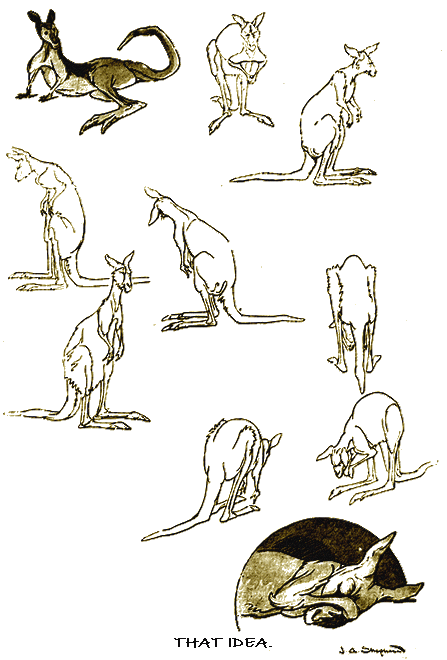
He gazes thoughtfully at his paws, finding no inspiration. Then, he tries the vacant air above him, with equal ill-success. He brown-studies at the fence, at the ground, at his own tail; he will never, never rescue that lost idea (which is probably a most insane one, not worth rescuing), but he is always persuading himself that he is on the very point of catching it; frowning and turning his head aside as though the words were in his mouth but wouldn't come off the tongue. You will also notice that he wrestles desperately with it in his sleep, with his fore paw over his nose. If in his waking efforts he sees you watching him, he instantly assumes an air of alert wisdom, intended to convey the belief that he has known all about the idea for years, and is only thinking about applying it in some practical way or making a book of it. But the attempt is a failure—those ears give it away. For intellectual pursuits the kangaroo is not fitted.
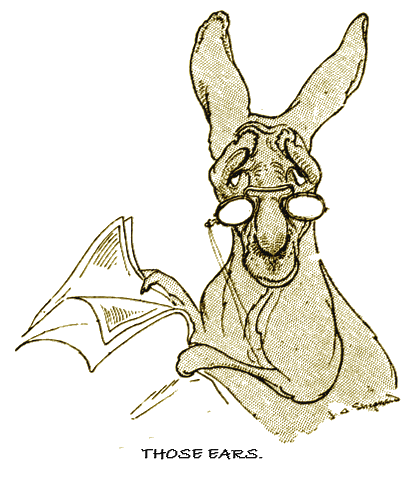
But he can jump; and the disconsolate grasshopper, whose hind-leg copyright the kangaroo has infringed, is far behind the record. It is, in fact, reported of an educated West Indian that, visiting New South Wales and encountering his first kangaroo, he sat down immediately to write an essay on the unusually large grasshoppers of Australasia.
Whether or not a serious naturalist is justified in excluding from a chapter on marsupial animals a careful and detailed consideration of the bookmaker and the 'bus-conductor, I will not stay to argue. I refrain from dealing at length with these interesting creatures in this place, because of the regrettable absence of specimens from the Zoo. The conductor (Bellpunchus familiaris) is readily capturable in this country. The habits of the bookmakers (marsupialis vulgaris) may be studied, and their curious habits learned by anybody willing to incur the expense in the inclosures set apart for their exhibition at the various racecourses, where their sportive gambles are the subject of great interest (and principal) on the part of speculative inquirers.
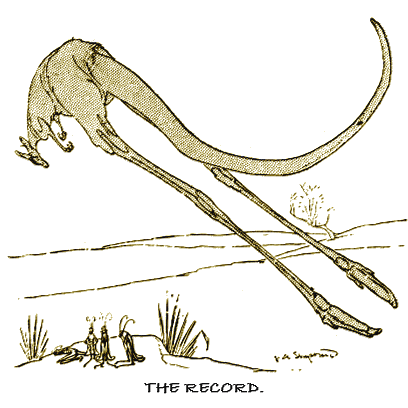
Mansbridge is the guardian of the kangaroos in the Zoo—or the kangaruler, as one may say. Most pouched things in the Gardens are given to the care of Mansbridge, which involves a sort of compliment, for a pouched thing is never clever by itself, and wants a keeper who can think for it. He has the wallabies, the kangaroo hares, the kangaroo rats (mad things these, greater hotch-potches than the others), and the wombats. The wombat cannot jump like the kangaroo or the wallaby, and his sprightliness and activity are the sprightliness and activity of a cast-iron pig. He is slow, but I scarcely think he is quite such an ass as the kangaroo. I have even found him indulging in repartee, as you shall see.
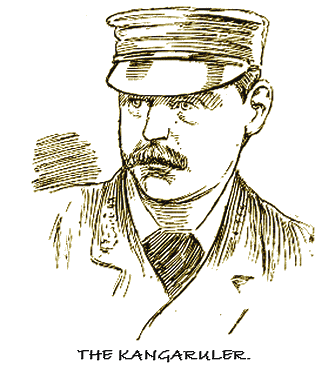
Every single movement of any part of the wombat is deliberate and well considered; it is apparently debated at great length by all the other parts, and determined upon by a formal resolution, duly proposed, seconded, and carried by the complete animal properly assembled. Once the motion is carried, nothing can stop it. If the wombat's travels are crossed by a river, he merely walks into it, across the bottom, and out at the other side. Here, in lairs side by side, live a common wombat and a hairy-nosed wombat. They don't come out much in daylight, and they had been here some time before they found themselves both out for an airing together. "Halloa," reflected the hairy-nosed wombat, "here is my neighbour. I'll chaff him!" and he straightway set to work to invent some facetious observation. In an hour or so an idea struck him, and, advancing to the partition bars, he said to the common wombat, "Here, I say—you're common!" and laughed uproariously.
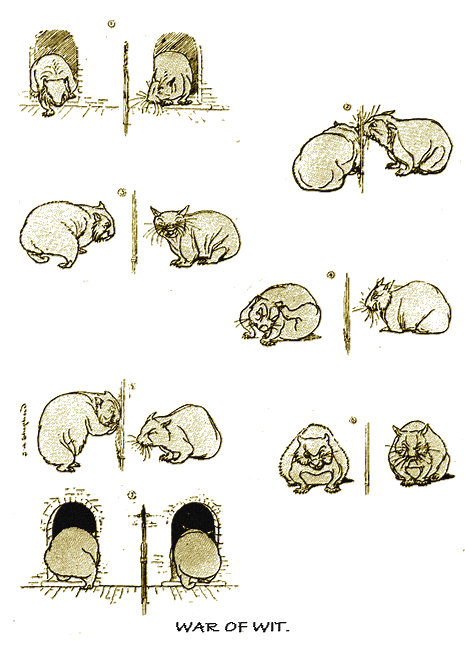
The common wombat felt the sting of the remark and determined upon a crushing repartee. While the other chuckled over his achievement (about an hour and a half) the common wombat laboriously constructed his retort. "Yah! hairy-nose!" he said, when the reply was properly finished and polished. And then he chuckled, while the other thought it over. The hairy-nosed wombat thought it over and the common wombat thought it over (chuckling the while) for some hours without arriving at any more epigrams. After that they went into their dens to take a rest. And to this day it is a matter of dispute as to which has the best of that chaffing match: and the hairy-nosed wombat is as far off a brilliant reply to the common wombat as ever, while, of course, the common wombat need not begin to think of another witticism until the hairy-nosed wombat invents, constructs and delivers his. Which is why they never speak to one another now, as anybody may see for himself in proof of the anecdote, if he feel inclined to doubt it. Both are good—tempered and affable in their way; but while they still have this portentous combat of wits on hand they can't afford much time and attention for visitors. The common wombat still meditates and chuckles inwardly over his victory, and the hairy-nosed wombat is thinking hard, and mustn't be disturbed. It is difficult to imagine what may be the end of the affair, or when the minds of both the wombats may be free to attend to the friendly greetings of visitors; in the meantime, it is well that the reason for their preoccupation may be known. They are not proud. The intelligence of the marsupials is in some sort redeemed by the wombat, who is given a slow and inelastic gait to accord with his mental weight, while the frivolous kangaroo bounces about the world like a thing of india-rubber, and plays a game of leap-frog with all Nature.
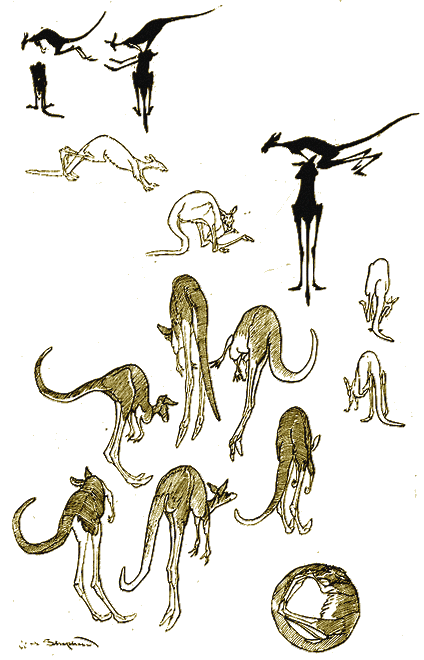
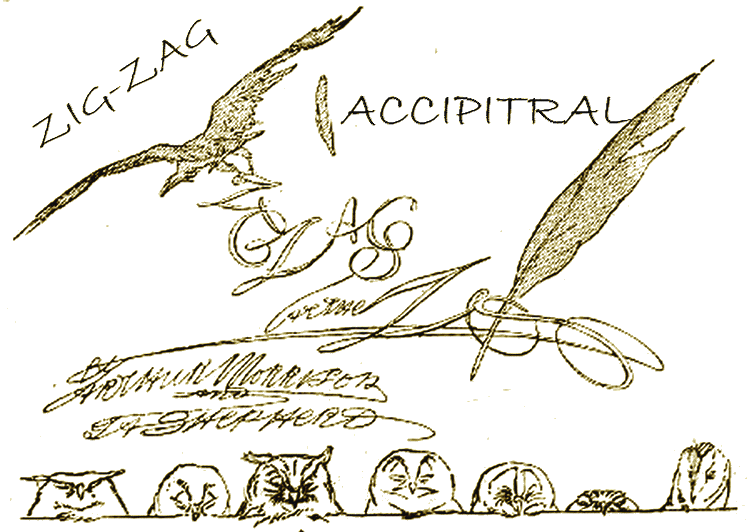
The accipitral birds are the eagles, the vultures, the falcons, the owls—all those birds that bite and tear unhappy mammals as well as birds of more peaceful habits than themselves. They have all, it will be observed, Roman noses, which may be the reason why the Romans adopted the eagle as a standard; as also it may not.

They have striking characteristics of their own, and have been found very useful by poets and other people who have to wander off the main subject to make plain what they mean. The owl is the wiseacre of Nature, the vulture is a vile harpy, and the eagle is the embodiment of everything great and mighty, and glorious and free, and swooping and catoptrical. There is very little to say against the eagle, except that he looks a deal the better a long way off, like an impressionist picture or a volcano.

When the eagle is flying and swooping, or soaring and staring impudently at the sun, or reproaching an old feather of his own in the arrow that sticks in his chest, or mewing his mighty youth (a process I never quite understood)—when he is doing noble and poetical things of this class at an elevation of a great many thousand feet above the sea level he is sublime. When you meet him down below, on his feet, much of the sublimity is rubbed off.
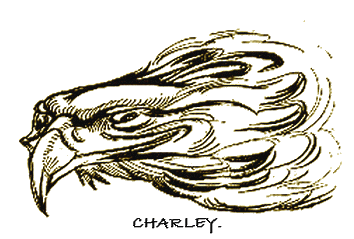
There is only one eagle in the world with whom I can claim anything like a confidential friendship, although I know many. His name is Charley. If, after a chat with Bob the Bactrian, you will turn your back to the camel-house and walk past the band-stand toward the eagles' aviaries, you will observe that the first corner cage is occupied by wedge-tailed eagles—a most disrespectful name, by-the-bye, I think. There are various perches, including a large tree-trunk, for these birds; but one bird, the oldest in the cage, doesn't use them.
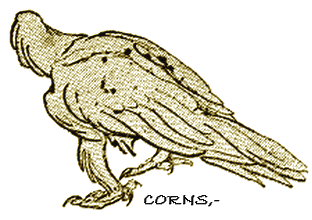
He keeps on the floor by the bars facing the place where Suffa Culli and Jung Perchad stand to take up passengers, and looks out keenly for cats. That is Charley. He is all right when you know him, is Charley, and I have it on the best authority that there are no flies on him. A rat on the straggle has been known to turn up in this aviary and run the gauntlet of all the cages—till he reached Charley; nothing alive and eatable ever got past him. I have all the esteem and friendship for Charley that any eagle has a right to expect; but I can't admit the least impressiveness in his walk.
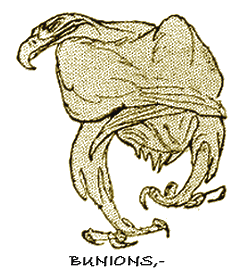
An eagle's feet are not meant to walk with, but to grab things. An eagle's walk betrays a lamentable bandy-leggedness, and his toe-nails click awkwardly against the ground. This makes him plant his feet gingerly and lift them quickly, so that worthy old ladies suppose him to be afflicted with lameness or bunions, an opinion which disgusts the bird, as you may observe for yourself; for you will never find an eagle in these Gardens submitting himself to be fondled by an old lady visitor. It is by way of repudiating any suggestion of bunions that the eagle adopts a raffish, off-hand, chickaleary sort of roll in the gait, so that altogether, especially as viewed from behind, a walking eagle has an appearance of perpetually knocking 'em in the Old Kent Road.
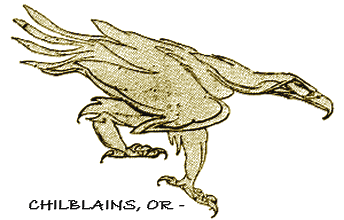
On Charley's next birthday I shall present him, I think, with a proper pearly suit, with kicksies cut saucy over the trotters, and an artful fakement down the side, if the Society will allow me.
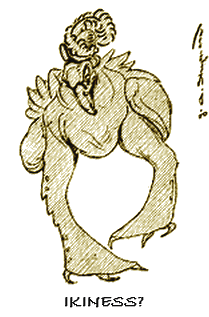
There is nothing in the world that pleases an eagle better at dinner-time than a prime piece of cat. Charley tells me that, upon the whole, he prefers a good, plump, mouse-fed tabby; he adds that he never yet heard of a tame eagle being kept at a sausage shop, though he would like a situation of that sort himself, very much. The stoop of a free eagle as it takes a living victim is, no doubt, a fine thing, except for the victim; but the grabbing of cut-up food here in captivity is merely comic. The eagle, with his Whitechapel lurch, makes for the morsel and takes it in his stride; then he stands on it in a manner somehow suggesting pattens, and pecks away at the hair—if, luckily, he has secured a furry piece.
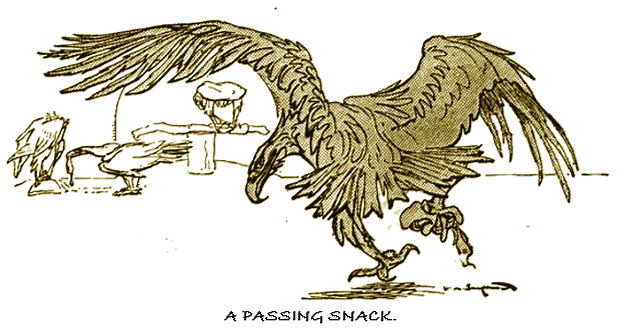
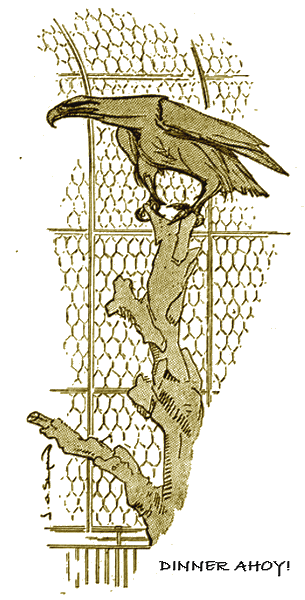
I am not intimate with any eagle but Charley, but I am very friendly with all of them—golden, tawny, white-tailed, and the rest, with their scowls and their odd winks—all but one other of the wedge-tailers, who stays for ever at the top of the tree trunk and looks out westward, trying to distinguish the cats in the gardens of St. John's Wood; he is reserved as well as uppish, and I don't know him to speak to.
I am pretty intimate with many of the owls. The owl I know least is a little Scops owl, kept alone in the insect-house. He has for next-door neighbour a sad old reprobate—Cocky, the big Triton cockatoo—who abuses him horribly. The fact is, they both occupy a recess which once Cocky had all to himself, and now Cocky bullies the intruder up hill and down dale; although little Scops would gladly go somewhere else if he could, and takes no notice of Cocky's uncivil bawlings further than to lift his near wing apprehensively at each outburst. He and I have not been able to improve our acquaintance greatly, partly because he is out of reach, and partly because Cocky's conversation occupies most of his time. The Zoo owls are a lamentably scattered family.
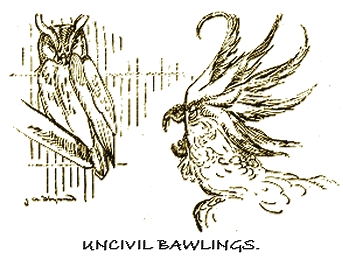
Another Scops owl, with one eye, lives in the eastern aviary, in Church's care. He is a charming, furious little ruffian (I am speaking of the owl, and not of Church), and perfectly ready to peck any living thing, quite irrespective of size.
Where he lost his eye is a story of his own, for he was first met with but one. He sits on his perch with a furious cock of the ears—which are not ears at all, but feathers—with the aspect of being permanently prepared to repel boarders; and the only thing that could possibly add to his fierceness of appearance would be a patch over the sight of the demolished eye; a little present I would gladly make myself, if he would let me.
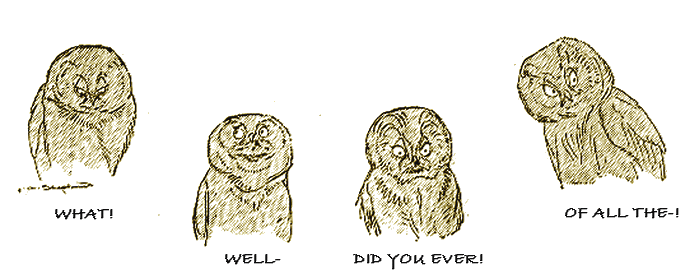
He lives just underneath a much less savage little Naked-foot Owl, who doesn't resent your existence with his beak, but gazes at you with a most extreme air of shocked surprise.
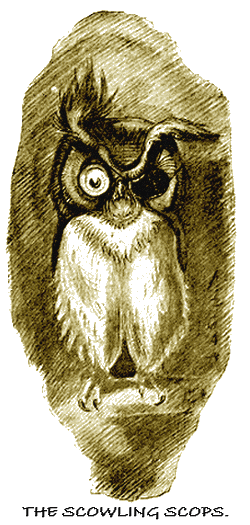
He doesn't attack you bodily for standing on this earth on your own feet—he is too much grieved and scandalized. He looks at you as a teetotal lady of the Anti-Gambling League would look at her nephew if he offered to toss her for whiskies. He follows you with his glare of outraged propriety till you shrink behind Church and sneak away, with an indescribable feeling of personal depravity previously unknown. Why should this pharisaical little bird make one feel a criminal? As a matter of fact, he is nothing but a raffish fly-by-night himself; and his pious horror is assumed, I believe, as much to keep his eyes wide open and him awake as to impose on one.
The owls' cages proper are away behind the llamas' house, and here you may study owl nature in plenty; and you may observe the owls, like people sitting through a long sermon, affecting various concealments and excuses for going to sleep in the daytime. The milky eagle-owl pretends to be waiting for a friend who never keeps his appointment. You come upon him as he is dozing away quietly; he sees you just between his eyelids, and at once stares angrily down the path as if he were sick of waiting, and the other owl already half an hour overdue. Of course there is no owl coming, so he shakes his head testily and half shuts his eyes.
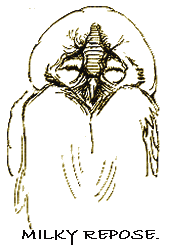
If you go away then, he goes to sleep again. If you stay, he presently makes another pretence of pulling out his watch and wondering if that owl is ever coming. He has practised the transparent deception so long that he does it now mechanically, and sleeps, I believe, or nearly so, through the whole process. The oriental owl does it rather differently. He doesn't open his eyes when you first wake him—this in order to give greater verisimilitude to his pretence of profound meditation; he wishes you to understand that it is not your presence that causes him to open his eyes, but the natural course of his philosophical speculations.
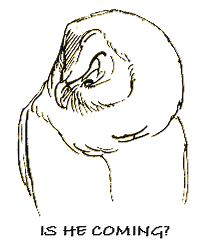
As a pundit, he disdains to appear to observe you; so he gazes solemnly at a vast space with nothing whatever for its centre. He sees you, but he knows you for a creature that never carries raw meat with it, like a keeper; a creature beneath the notice of Bubo orientalis.
As a song-bird, the owl is not a conspicuous success. Perhaps he has learned this in the Zoo, for he cannot be induced to perform during visiting hours. He is a reserved person, and exclusive. If you, as a stranger, attempt to scrape his acquaintance, he meets you with an indignant stare—confound your impudence!
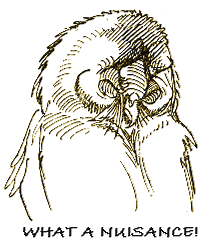
Nothing in this world can present such a picture of offended, astounded dignity as an owl. I often wonder what he said when Noah ordered him peremptorily into the Ark. As for myself, I should as soon think of ordering one of the beadles at the Bank.
Many worthy owls, long since passed away as living things, now exist in their astral forms as pepper-boxes and tobacco-jars. They probably belonged, in life, to the same species as a friend of mine here, who exhibits one of their chief physical features.
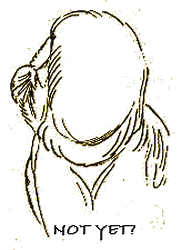
He sits immovably still, so far as his body—his jar or pepper-reservoir—is concerned; indeed, if he is not disturbed, he sits immovably altogether, and sleeps. When he is disturbed he wakes in instalments, opening one eye at a time. He fixes you with his wild, fiery eye, his indignant stare. Start to walk round him; the head turns, and the stare follows you, with no movement whatever of the part containing the pepper. The head slowly turns and turns, without the smallest indication of stopping anywhere. I never tempted it farther than once round, but walked back the other way, for fear of strangling a valuable bird. Besides, I remembered an owl pepper-box once, which became loose in the screw through continual turning, so that the head fell off into your plate, and all the pepper after it.
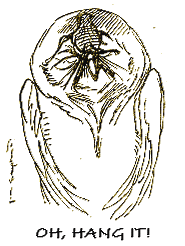
The biggest owls are the eagle-owls. The eagle-owls here occupy a similar sort of situation to that of the hermit in an old tea-garden. In a secluded nook behind the camel-house a brick-built cave is kept in a wire cage, which not only hinders the owls from escaping, but prevents them taking the cave with them if they do. The cave is fitted up with the proper quantity of weird gloom and several convenient perches; the perches, however, are indistinct, because the gloom is obvious. In the midst of it you may see two fiery eyes, like the fire-balls from a Roman candle, and nothing else. This is the most one often has a chance of seeing here in bright day.
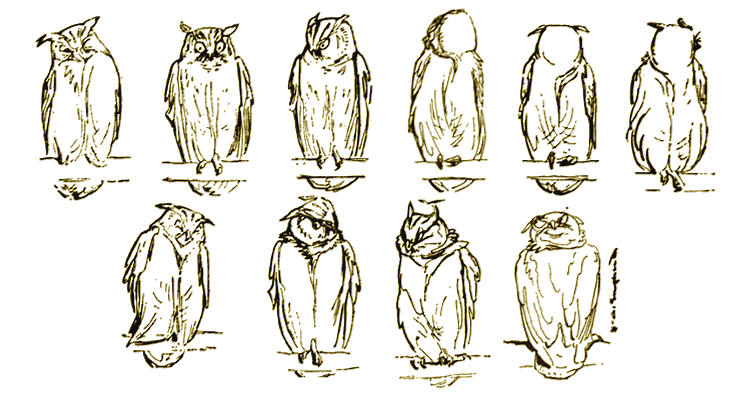
Often the eagle-owls are asleep, and then you do not even see the fireworks. I know the big eagle-owl fairly well; that is to say, I am on snarling terms with him. But once he has settled in his cave he won't come out, even when I call him Zadkiel.
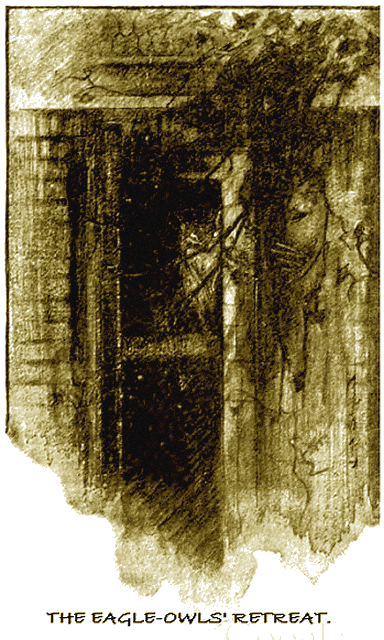
There is nothing much more grotesque than a row of small barn owls, just awakened from sleep and curious about the disturber. There is something about the odd gaze and twist of the neck that irresistibly reminds me of an illustration in an Old Saxon or Early English manuscript.
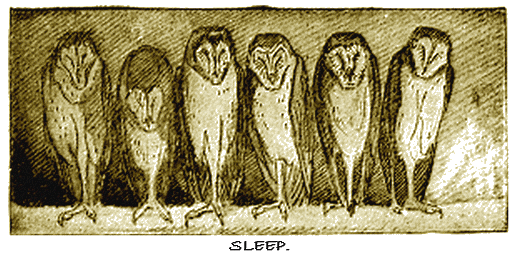
I am not particularly friendly with any of the vultures. Walk past their cages with the determination to ingratiate yourself with them. You will change your mind.
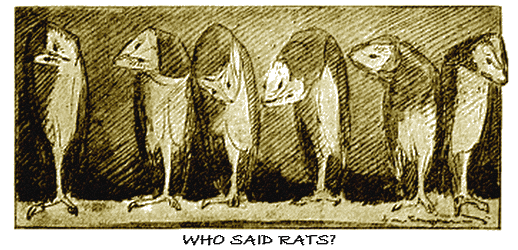
There are very few birds that I should not like to keep as pets if I had the room, but the vulture is the first of them. I don't know any kind of vulture whose personal appearance wouldn't hang him at a court of Judge Lynch.
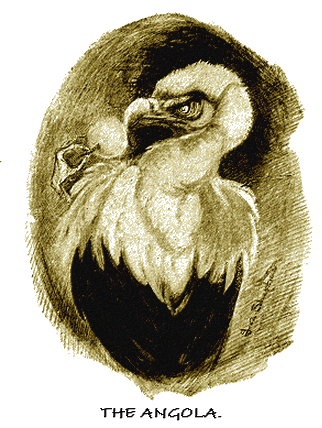
The least unpleasant-looking of the lot is the little Angola vulture, who is put among the kites; and she is bad enough: a horrible eighteenth-century painted and powdered old woman; a Pompadour of ninety. The large bearded vulture is not only an uncompanionable fellow to look at, but he doesn't behave respectably. It is not respectable to hurl yourself bodily against anybody looking over a precipice and unaware of your presence, so as to break him up on the rocks below, and dine off his prime cuts. I have no doubt that Self—(Self, by-the-bye, keeps eagles and vultures as well as camels)—has any amount of sympathy for his charges, but who could make a pet of a turkey-vulture, with its nasty, raw-looking red head, or of a cinereous vulture, with its unwholesome eyes and its unclean-looking blue wattle? No, I am not over-fond of a vulture. He is always a dissipated-looking ruffian, of boiled eye and blotchy complexion, and you know as you look at him that he would prefer to see you dead rather than alive, so that he might safely take your eyes by way of an appetizer, and forthwith proceed to lift away your softer pieces preparatory to strolling under your ribs like a jackdaw in a cage much too small. He sits there placid, unwinsome, and patient; waiting for you to die. But he has his little vanities. He is tremendously proud of his wings—and they certainly are wings to astonish. On a warm day he likes to open them for coolness, but often he makes this a mere excuse for showing off. He waits till some easily-impressed visitor comes along—not a regular frequenter. Then he stands up and spreads his great pinions abroad, and perhaps turns about, and the visitor is duly impressed.
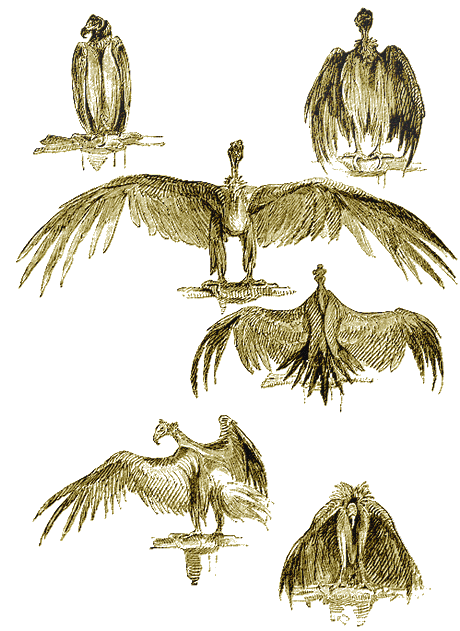
So the vulture stands and receives the admiration, hoping the while that the visitor has heart disease, and will drop dead where he stands. And when the visitor walks off without dying the old harpy lets his wings fall open, ready for somebody else.
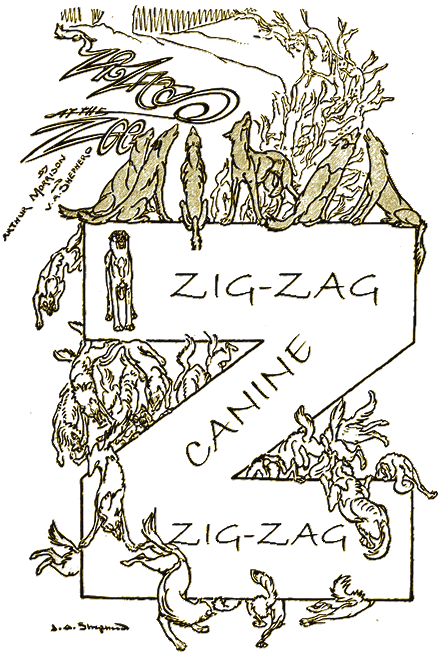
THE DOG is a strange and mysterious creature, and what he is, innately, is a problem of life. To consider him a mechanical organism on four legs intended to carry sticks and provide a benevolent Government with an annual seven-and-sixpence, is the mooning of the common fool; of the fool, moreover, who never knew a dog to speak to.
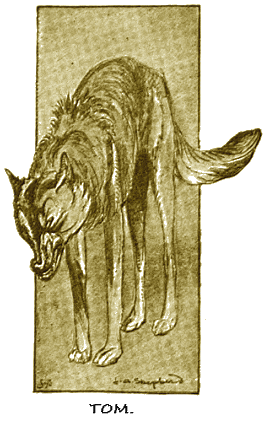
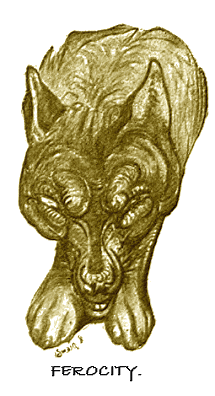
To talk of instinct is but to announce oneself the empty creature of a formula. The fact that he is derived (ages back) from the wolf increases, if possible, his mystery; for every bad quality which the domestic dog has not the wolf has, with no compensating virtue except that you needn't buy a license to keep him; notwithstanding which recommendation most people prefer to keep a dog for ordinary purposes. That the dog did not arrive at his present moral state at any extremely remote age is evident from the popular fables and proverbs relating to him, for therein he always appears a mean, wolfish beast, and a fool to boot. As witness the Dog in the Manger, the Dog with a Shadow, the Dog with an Ill Name, and the rest of them. So that the reformation of the dog has come about in comparatively recent times, and it is a testimony to his innate worth that constant association with man since his conversion has not corrupted him.
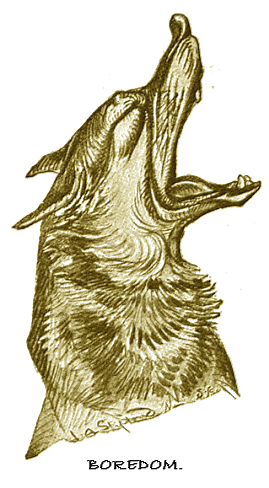
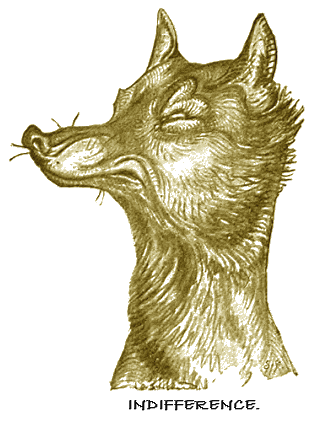
Tom, the large grey wolf here at the Zoo, is, I am almost convinced, somewhat in a way of reformation himself. If he feels hungry, you may see him approach the bars and wag his tail; this on the off-chance of your having a bit of raw beef about you. But he can't smile with anything like cordiality; no wolf can. His tail looks amiable enough, but he conducts business with the opposite end, which is not so reassuring to look at—which, in fact, contradicts the tail flatly. As he stands thus, end on, you would scarcely guess the number of pounds of solid meat that Tom has put away within a couple of days.
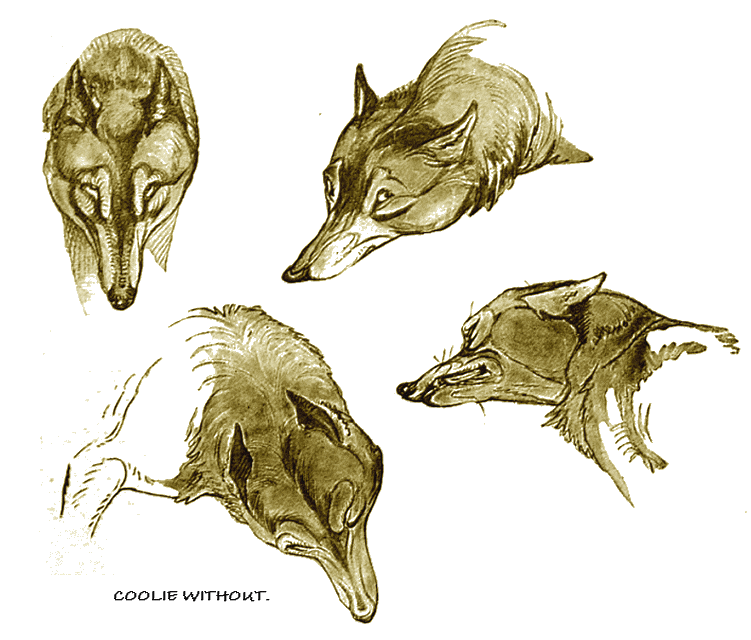
He has a lanky, thin, edge-forward sort of aspect, as though he were cut out of a deal board with a saw, and only intended to be looked at broadside on, like a piece of stage scenery.
Tom won't show his teeth quite so readily as Coolie, the Indian wolf, next door. You cannot make a captive wolf show his teeth by the ordinary means of waving a hat or an arm—he disregards this sort of thing entirely. You must catch him unawares, and startle him by a sudden rush towards the bars with your head down. This will give you an undesirable appearance of mental derangement; but, properly executed, it will startle the wolf. You will betray Tom into a temporary exhibition of ferocity but he will recover instantly, and pretend that he only opened his mouth to yawn. When he has finished his yawn he will glance casualty and serenely down the cages, with a contemptuous air of never having seen you at all, and of being quite unaware that such a person as yourself was ever born. This treatment is very galling, coming as it does from a wolf whom even its proprietors are fain to label "common"; but you shouldn't have laid yourself open to it, to begin with.
The gentleman who sent Tom here can handle him as much as he pleases, and treat him precisely as one would treat an ordinary house-dog, but Tom has a persuasive way of inducing other people not to try the game on their own account—not to try it more than once, at any rate. He will recognise his old master joyfully after a year or two's absence, but I have not yet entered upon patting terms with Tom myself; because I know that lathy appearance of limb to be a deception and a snare. But, at least, Tom is half reformed, and if he lives another few hundred years will probably develop the regular way into a dog.
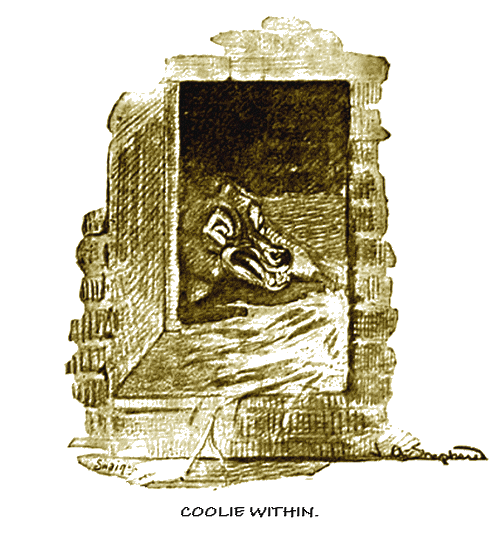
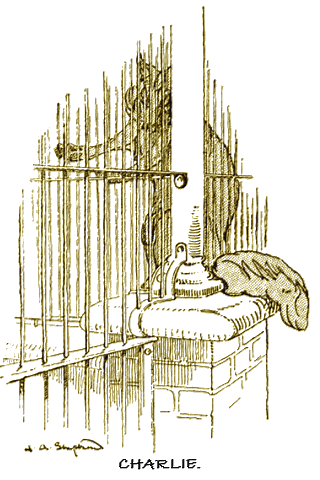
Coolie, next door, is a ruffian, and makes no shame of it. He would like a piece out of you, and doesn't care if you know it. If anything, he would prefer two pieces. Failing that, he would like a piece of Tom; or of North, the keeper; or of Bob, the Eskimo dog; or of his own grandmother, if he could get it. There's no weak sentiment about Coolie. The only thing that would dissuade him from eating a relation would be the event of the relation first eating him. I don't altogether like Coolie; he is not the sort of chap that anybody would fall in love with at first sight. He won't meet your eye so long as he is out in the cage. Try to fix him for a moment; try to annoy him, in fact. He will evade your eye in the shiftiest fashion, keeping you in sight, however, with the corner of his own, for fear of accidents. Presently, at the end of his patience, he will retreat into his lair and give you a straight look at last; one which will convince you at once of the multifarious advantages of conducting these little experiments from this side of the bars.
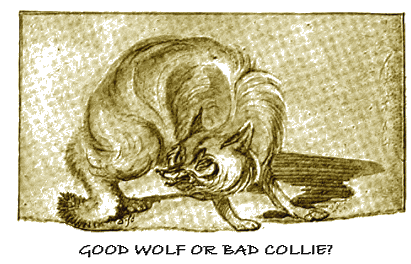
But even Coolie has his softer moments, when he will rub against the bars to be patted. I like to pat Coolie myself, and I consider any method of patting him to be in many respects the best. When I see Coolie against the bars and looking amiable (for Coolie), and I feel disposed to pat him, I call North, and authorize him to pat Coolie on my behalf. In this way I have become quite friendly with Coolie, who is as affable under my pats as if I were his keeper. I shall always pat Coolie like this; I am able to devote more attention to the general superintendence of the proceedings when I have an assistant to attend to the manual detail. Sometimes Sutton helps me pat the lions in the same way. It requires a little nerve, of course, but I am always perfectly cool.
Bob, the Eskimo dog, lives in the next cage to Coolie, and in the next cage still there are a pair of prairie wolves, whose improvement on the common wolf lies only in externals. To look at, they seem a kind of collie, but with a finer model of head than any collie-breeder can produce. Except in appearance, they are far back in the blackest ages of wolfdom. One of them—Charlie—has an offensive habit of sitting up on the coping-pier from which the cage division-bars spring, because that is regarded as a sort of feat of gymnastics, impossible to the other wolves, since they are too big. If you particularly want him to perform, for your amusement, he won't do this trick, small as it is; but when you are not looking he persists in it, by way of annoying the neighbours who can't perform it. Perhaps, after all, the Dog in the Manger wasn't a dog at all, but a prairie wolf. The man who called him a dog didn't examine him closely enough; few people stay long to examine a loose wolf. Like a dog as the prairie wolf is—and he tries his utmost to maintain this respectable appearance—his drooped tail, his snarling mouth, and his small eyes, expose the pretence. He is attempting his promotion in the wrong way—merely by imitating the uniform of the superior rank.
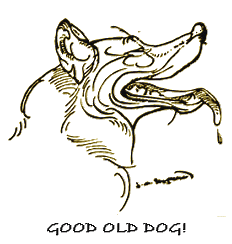
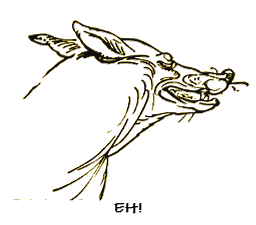
There can be no reasonable doubt that the wolf wants to be a dog if he can. He quite understands his rascally inferiority, but will never give up his social ambition, especially when so many visitors encourage his vanity, time after time, by mistaking him for a dog. There are times when such a mistake is natural—almost pardonable. On a hot day, for instance, a wolf, to cool his mouth, will muster up a most commodious smile—present an open countenance, in fact—strikingly like that of an amiable retriever out for a run.
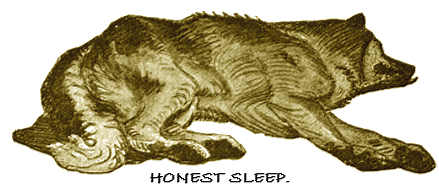
But the wolf is too sad a blackguard to redeem himself by an occasional smile; nothing but orderly centuries of evolution will be of much use to him, and his present parvenu attempts to assume a position in life to which he was not born make him look worse than ever. He betrays himself—like a parvenu—by small and unconscious habits.
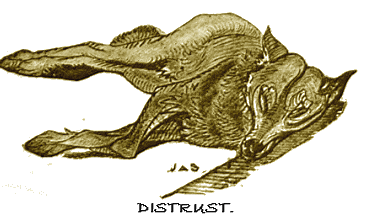
Give a well-bred dog a biscuit, and he will munch it with gentlemanly relish and keep a polite welcome ready for another. A wolf, being always hungry enough to eat anything, will take it, but in an indifferent, perfunctory, disdainful fashion, not vouchsafing the courtesy of concealing his contempt for your present; while animal food drives him to the opposite extreme. The wolf can't even sleep like a dog. Bob, the Eskimo (who is a gentleman among dogs, with low neighbours whose manners he despises), sleeps as an honest dog always does sleep; flung upon the ground with his legs, head, and tail spread about fearlessly, and his mind as conscious of rectitude as if he could tell you so in Latin.
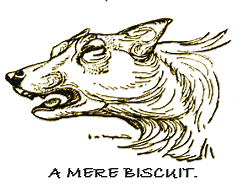
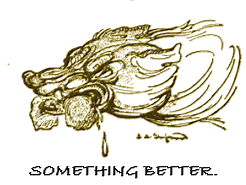
Tom or Coolie can't sleep like that. The wolf tries to hide under himself. He remembers his many crimes, even in sleep, and can't trust his legs or his tail or anything else in sight. He hides his tail between his legs, and resorts to the most complicated and twisty devices for arranging his legs to hide each other. He gets underneath himself, covers himself over him, and tucks in the corners; and even then his sleep is restless. I don't think Red Riding Hood's grandmother has ever been properly digested.
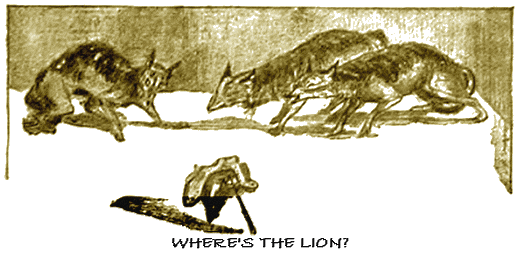
Bob, the Eskimo dog, is a fine fellow, as friendly as any dog you may name, except to wolves. He would be glad to visit the wolves next door, and take their machinery to pieces hastily with his teeth, and the wolves so heartily reciprocate the sentiment that a sheet-iron memorial of the fact has been erected between the cages. There is another dog called Bob a little further along—the Dingo dog. He is a cunning-looking fellow, of more civilized condition than the wolves, but sharing with them their chief characteristic of eternal hunger. The Dingo dog is the only animal that can beat the cat's collection of nine lives; he is calculated to possess twenty-seven. If you give a wild Dingo a single bang on the head he will lie down as if killed at once, shamming; lying doggoh, in fact. But you may beat him out flat and dissect him, and as soon as your back is turned he will gather together his outlying fragments, blow himself into shape, and walk home. He doesn't mind a little accident of that sort.
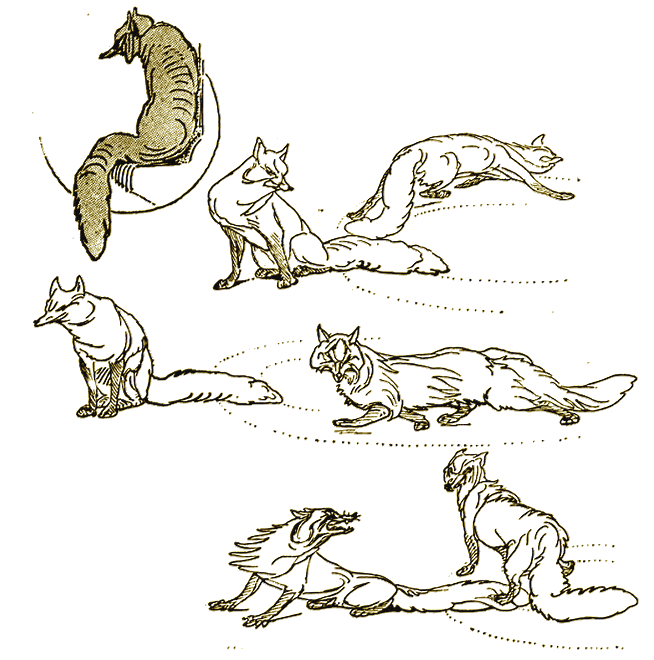
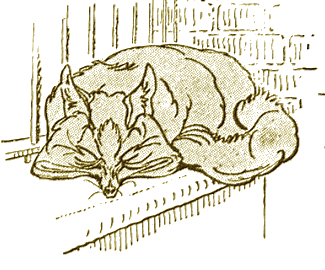
In this row of cages, too, are jackals—black-backed jackals, ordinary jackals, and extraordinary jackals, as well as foxes. A jackal is recognisable at once—a mean-looking fox of the wrong colour. The prettiest jackal is the black-backed, but still he is a jackal and nothing better; as unmistakable as though he went about singing, "My name it is Jackal," after the Coal Hole bard. It is odd to observe how, in a jackal the influence of ages of habit remains. Never hunting for himself; and always waiting for the broken leavings of some more powerful hunter, he cannot, even now in his cage, altogether believe that his dinner is intended, in the first place, entirely for himself. So, when North pokes it between the bars he hesitates for a moment, and looks round for the lion. It is sad life wherein one doubts ownership in one's own dinner.
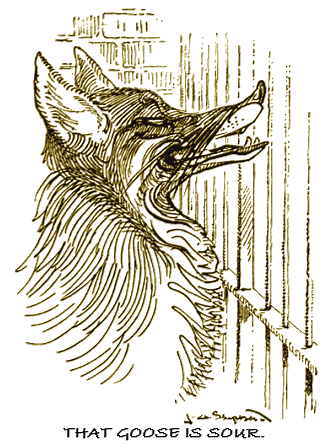

A fox must be an unpleasant sort of person to live with, for other reasons beside the smell. A fox's conversation consists chiefly of snarls. Put two foxes together, and they will at once begin to invent occasions for snarling at one another. They don't quarrel outright, probably from fear of the consequences. The favourite device of one of the Indian desert foxes here is of a Donnybrookian flavour. His mate has a way of amusing herself with a little circus—just trotting round the floor in a ring. He watches her at this amusement, and when a snarl seems desirable, he dismounts from his perch and lays his tail just across her track, and waits for her to trample on it; then he snarls and snaps at her face, and she snarls and snaps at his. This being accomplished, he returns, perfectly satisfied, to his roost, to rest and doze till his system requires refreshing with another snarl. A properly-executed mutual snarl, almost approaching a bite, will last him for ten minutes or a quarter of an hour.
These foxes—all of them—have a very irritating cause of bad temper to contend with in the existence of a fine pair of Chinese geese a few yards beyond the obstructive bars. The ordinary fox has arrived at a stoical attitude of indifference to the Chinese goose. He affects to believe that he is uneatable. The Chinese goose wears a black stripe behind his neck, rather suggestive of a pigtail; this the fox points out to his friends as evidence of uneatability, having learned the consolation from a relative who once had a fancy for grapes.
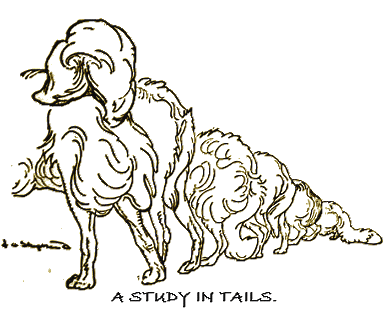
As for the wolf, the cause of man's hatred for him lies in the fact that a wolf nursed Romulus and Remus. If this malevolent creature had left them as they were, they would have been drowned in the Tiber. Thus Romulus would never have built Rome, and there would have been no Caesar, no Dr. Smith's Smaller Roman History, no Principia Latina, and untold misery would have been spared many generations of long-suffering schoolboys. No wonder that the wolf is held in horror and detestation by all nations, and is exterminated mercilessly wherever found.
Years of bitter tears, bitter Caesar, bitter Accidence, bitter Smith's Smaller, and bitterest swish have left their scar upon the human soul, and roused up an hereditary and traditional hatred of the beast, but for whose malignant interference All Gaul would never have been divided in Three Parts; a hatred only second in its wild intensity to that of the snake who beguiled Eve. Consequently the wolf for ever wears his tail between his legs, as does every member of the canine kind unbeloved by man, which, by-the-bye, is a noticeable thing in itself, but obvious to everybody who shall compare those in this row.
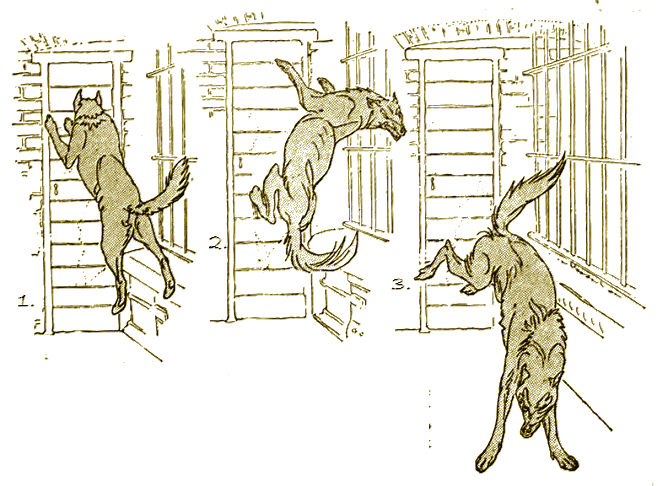
The most wonderful dog story on record, by the way, is that of Katmir, the dog who was shut up with the Seven Sleepers.
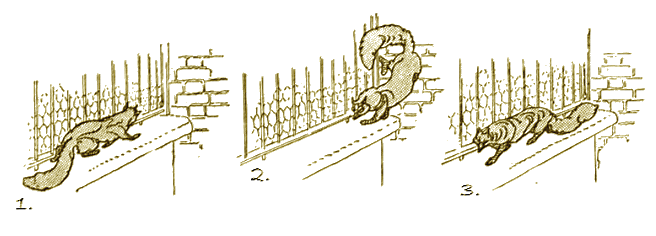
This faithful creature kept ceaseless watch over his masters without eating, drinking, or sleeping, for the trying period of 309 years. It is the most wonderful instance of a dog's fidelity I ever came across, and an excellent specimen of the dog story in several respects. Speaking of facts, it is not generally known that some day a great wolf is to arise in the North (according to Scandinavian prophecy) and swallow the sun and moon. One is usually a little inclined to distrust this statement until he has seen a wolf at work on an ordinary meal; never after. Indeed, one has only to see Coolie louping swiftly to and fro, and Tom bouncing against his back door when feeding-time approaches, to feel that it wouldn't be altogether safe to leave the moon loose hereabout with nobody to take care of it.
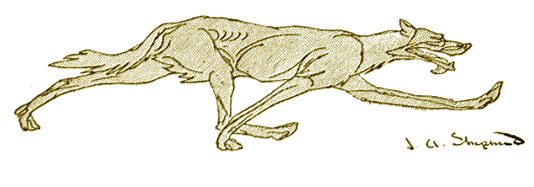
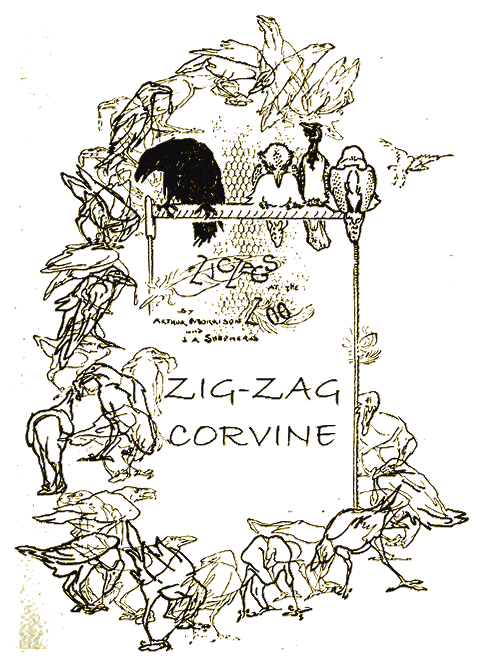
A SENSE of humour is a vastly saving grace. Long has it saved all the Corvidae from exterminaion at the hands of outraged man. The raven, the jackdaw, the magpie, the rook—what would their thievishness, their malignant mischief, earn were it not for their sense of humour Thieves all, they are still Artful Dodgers and Charley Bateses, and we smile though they snatch our very dinner. The snatching of the dinner from somebody else's jaws, friend's or enemy's, is the main plot of most of the raven's jokes, causing him also to secrete a spare morsel in the baggy part of his lower beak, when other ravens are about.
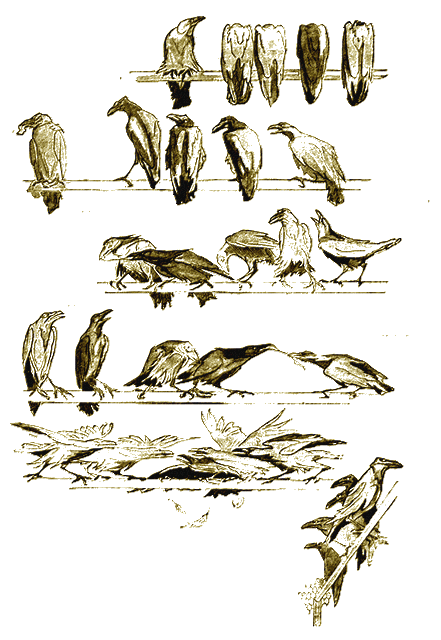
Extreme quickness lends additional quaintness to the pranks of the raven. The ravens at the Zoo, ever changing in personnel, remain true to a sort of mixed game of coddam and hunt the slipper. Let one of their number produce his stored morsel, and instantly it has been snatched, snatched, and snatched again, all along the line and back. With whom it at last rests only one mortal creature knows—the raven who has it. In him a natural exultation struggles with an attempt to look as though he had lost the tit-bit. In the others the chagrin of loss wars with a desire to look triumphant; so that the net result is a very level appearance of general stolidity.
Sardonic joker as he is, the raven has an immense sense of personal dignity. He is the greatest of the Corvidae, and he knows it. Not for him the scrambling hilarity of his small cousin, the jackdaw. Don't injure the raven's self-esteem, or he will be revenged, at some time or another. I have known a tame raven wait for months for an opportunity of plucking off, before a large company, the wig of a lady of doubtful age who had referred to him disrespectfully as "that thieving beast."
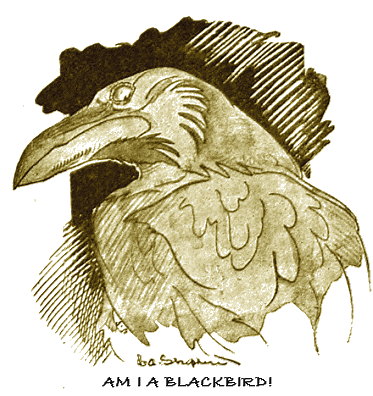
Also, when an innocent little boy at the Zoo has asked his mother if the raven were a blackbird, I have observed a look of indignation that carried with it a distinct threat to bite that little boy's little red legs. Never will a raven forget his dignity. Even a raven in love won't do it. He has, after all, considerable excuse for pride. A bird on such familiar terms with the great Odin as to sit on his shoulder every evening and retail to him the day's gossip is naturally proud. One Scandinavian legend mentions two such ravens, but I imagine that they are a sort of prophetic allegory, intended to typify successive editions of the evening paper. The belief in the raven as a bird of ill-omen probably arose from the fact that he was never known to turn up anywhere without stealing something, or doing mischief in some other way; just as one may consider a nitro-glycerine bomb an unlucky article to find on the cellar stairs.
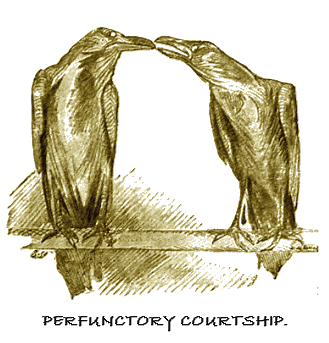
His fame as a prophet—and he was chief of the ancient augurs—may be due to many things. Perhaps he had a wrinkle or two from Elijah in recognition of the supply of provisions; or he may even have felt a motive for his generosity in a certain fellow-feeling; which would at least seem a plausible conjecture, since otherwise it is impossible to conceive of his refraining from stealing the supplies en route.
Travis is the keeper of the crows' cages, as also of the great Western Aviary. He is a most surprising authority on birds, and is no fledgeling himself; he is the oldest keeper in the service, as his "No. 1" testifies, and has been here since the year 1851.
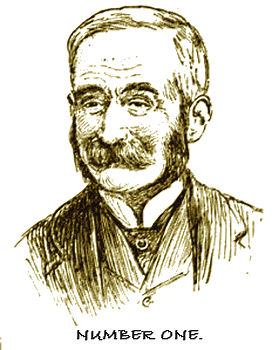
I have been lingering over the name "Travis" for some time, separating it thoughtfully into T. R. Avis, with an ultimate idea of a pun, or an acrostic, or a rebus, or a charade, or conundrum, or something of the kind, but have regretfully given up the notion. Still, considering his almost unique knowledge of birds—not to mention the ability of his brother as a bird-staffer—I think Travis might arrange, by deed-poll, for some such name as Terrae Rara Avis, if the equal mutilation of name and catch-phrase be tolerated.
Among the many curious birds in the domain of Travis is the laughing jackass. Now, there are several reasons why something should be said here of the laughing jackass.
In the first place, this is a Zig-zag, and since it is headed "Zig-zag Corvine," it is proper and in accordance with the correct spirit of Zig-zaggedness that something should he included that isn't corvine at all. Moreover, it is fitting that a bird which is called a jackass and is indeed a king- fisher, and being a kingfisher doesn't catch fish, should be classed with something that is neither jackass nor king-fisner nor fish, to carry out the original principle.

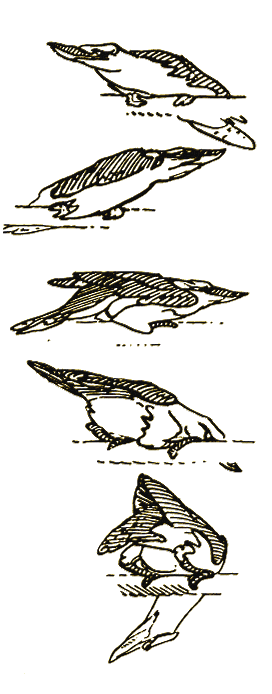
The laughing jackass is a broad low-comedy sort of bird, who usually makes your acquaintance in a little game of spoof of his own. He knows that you have come to the cage to hear him laugh, so he won't do it. But in order to keep you there in expectancy as long as possible, he pretends to have discovered an enemy, or something to eat, or the ghost of some other jackass, close by. He stares intently at nothing, and then turns round and inspects it on the other side. He crouches cautiously on his perch and looks at it cornerwise. He organizes an elaborate plan of strategy, and makes a beginning of approaching nothing on tip-toe. He finds that it has observed him, and forthwith ducks his head and looks out warily. It moves, and he follows it intently with his eyes; he seems about to spring at nothing, and you become excited; when he suddenly lets it go and grins at you, and you realize that you are sold.
The laughing jackass is not a distinguished joker, like the raven. He is a very frantic sort of buffoon; one who imagines he has a funny reputation to maintain, and who strains to maintain it at all hazards. Which is why he bursts into his demoniac laugh at certain regular times of the day—a habit which has earned him the unflattering name of the "Settlers' Clock." The fact is, he has been trying for hours, unsuccessfully, to think of a joke, and laughs to make the world believe that he has made one. It is noticeable that with these birds laughing is highly infectious, and that when one starts the rest join at once, each trying to outscream the others. Every individual is trying to claim the joke for himself.
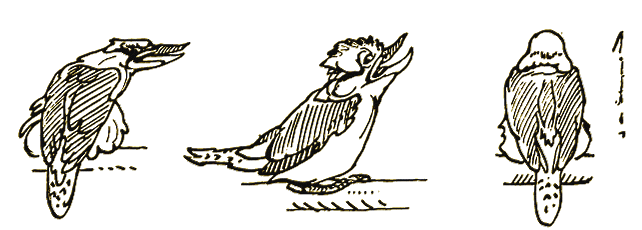
Personally, I incline to the belief that the laughing jackass, as a tribe, has only one joke. Mutual admiration societies are formed, and the members tell each other this joke in turn, and laugh unanimously.
You may see the system in operation here. One bird will burst upon a few friends with the air of a breathless discoverer and a vast number of chuckles. He tells the ancestral joke, in confidence, to jackass the second. Then the two scream and choke with delirious laughter, and the joke is passed on to jackass the third, and so forth—and fifth, and sixth—till every jackass is screaming for a minute together, till the regular amount of mutual admiration has been ex pended, and they stop suddenly and cock their beaks demurely for the approbation of visitors.
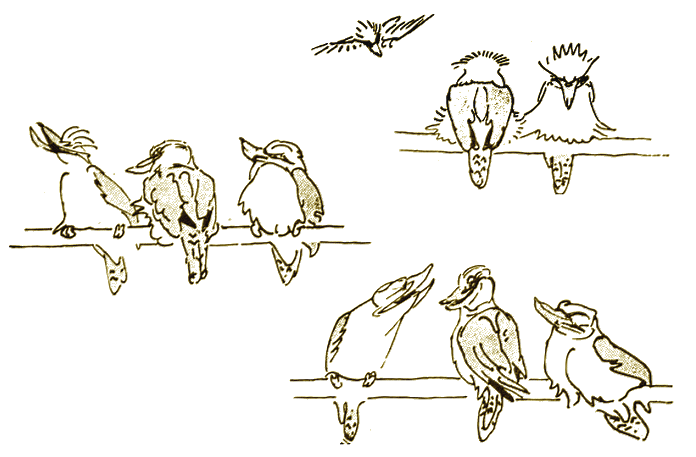
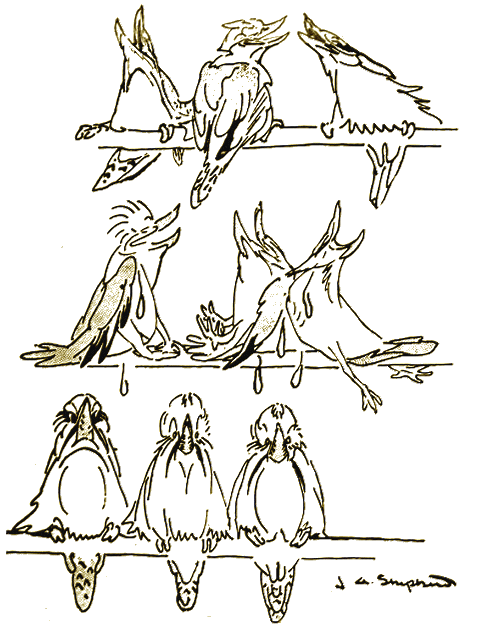
For the laughing jackass's own sake, I wouldn't introduce him to a raven because the jackass would be sure to repeat the joke to his new acquaintance, and the raven, a sardonic and superior joker, would be apt to deal savagely with him; and this more because of the badness of the joke than its age. I know a raven named Elijah (there would appear to have been some confusion of Scriptural history at his christening) who would be a bad subject for the laughing jackass's joke. He is not at the Zoo, but in private ownership, which is a great deal the worse in general devilment for the private owner, although he hasn't discovered it for himself yet.
Elijah's chief delight, by the way, is to run loose in a flower garden or a conservatory, where the surroundings may be reduced to a salad in about five minutes. "Do you know why they call me a laughing jackass?" Dacelo gigantea might ask Elijah; for this conundrum, I am convinced, is the ancestral wheeze. "Perhaps it's because you're a jackass to laugh so much," Elijah would say, severely. "No, you're wrong!" would scream that fatuous kingfisher. "It's because they think Jack—as good as any other name! Ha! ha! How's that? Isn't Jackass good as his master?" and he would guffaw deliriously while Elijah sharpened his big beak.
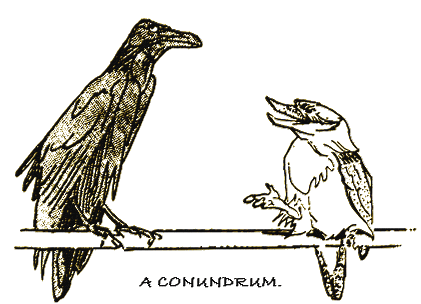
"H'm," Elijah would grunt, with savage calmness, when the laugh was over. "Just make another joke like that, will you?" And the unhappy jackass would have to save himself as best he might.
The laughing jackass is all very well as a chorus, but he can't sustain a separate low-comedy part. The raven can, the jackdaw and the magpie can, the jay can, and even the rook and the ordinary crow have their humoursome talents.
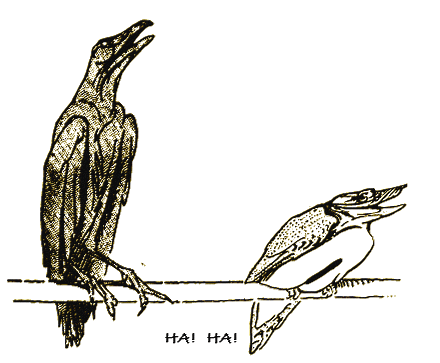
The chaplain crow becomes a very passable Stiggins, under the influence of the sun, which acts as his pineapple rum. Hot sunshine opens the mouth of the chaplain crow, and causes a rolling of the head and eyes, suggestive of a lachrymose sermon; and a spasmodic croak that is an overcharged rant by itself. You grow more serious at each step nearer the chaplain crow on these occasions, and you pull up with a start at the thought of a collection. I am not sure that much of his distress is not caused by the laughing jackasses, who have an impious practice of laughing at their conundrum on Sunday.
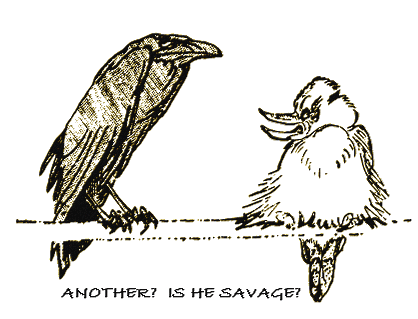
There is a temptation to call the three worst offenders among the jackasses Tom, and Bob, and Billy, and the chaplain crow Sir Macklin, by compliment or with apologies to the "Bab Ballads"; but, in good truth, there is no other name for the chaplain crow but Stiggins. His white choker is ragged and soiled and pulled askew on his neck. You look at him for long with an indefinite conviction that something is wanting in his equipment. A red beak would be an improvement, certainly and to secure it a cross with the chough might be tried; but what you really miss in Stiggins is a black bottle and bad umbrella.
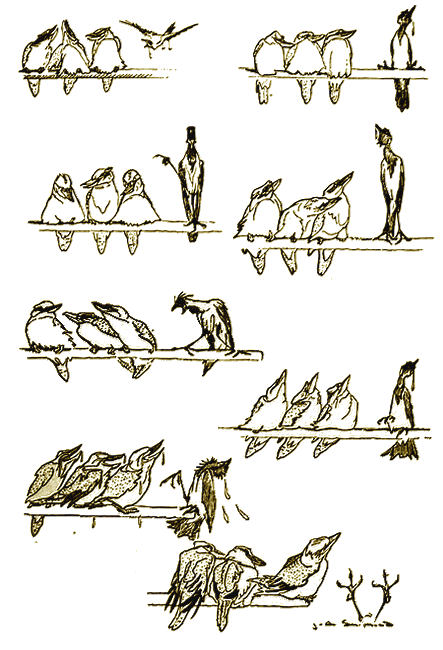
The raven was once white, Ovid tells us, but Apollo turned him black for tale-bearing. The rook and the crow must have told tales, too, unless Apollo condemned the lot at once, from uncertainty as to the actual culprit. The magpie and the chaplain crow are only partly black—offence not specified. Perhaps they told white lies. Here at the Zoo are two perfectly white jackdaws, and I have spent some time in an effort to discover for what conspicuously virtuous exploit they have been so distinguished. I can find nothing in their histories greatly to distinguish them from other jackdaws except the colour of their feathers.
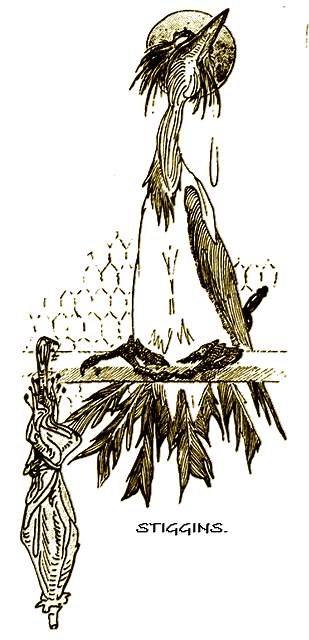
I have known many jackdaws and have possessed a few, but cannot, by any effort, imagine one of them doing anything particularly virtuous; jackdaws by nature are not intended to be pious. I have a jackdaw now who is a most interesting and pleasing thief, liar, and bully, but he neglects the more usual moral qualities. As a thief and a liar his performances are probably no more remarkable than those of other jackdaws, but as a bully he has ways of his own. He bullies every living thing with less brains than himself, irrespective of size, and eats such of them as are small enough. He hectors cats tremendously—merely by force of superior intellect.
When a cat perceives a bird—the size of some she is in the habit of trying to catch—pelting headlong toward her down a garden-path, with furious eyes and beak, shouting "Hullo, Jack! Shut up! Shut up! Come along, old girl! Hi! hi! hi!"—that cat has some excuse for hastily retiring over the wall to think things over; and Jack cocks his head and chuckles. He bullies dogs when they will allow it; when he meets one that won't, he finds a safe perch and abuses him violently. He will even bully a housemaid who is afraid of having her heels pecked. Once he went on a visit and tried to bully Elijah, but that was very nearly being another tale. Elijah is not the sort of bird anyone would bully for pastime, and Jack found speed as useful as intellect, for once in a way. But if he came to the Zoo to-morrow, he would probably begin by bullying Jung Perchad.
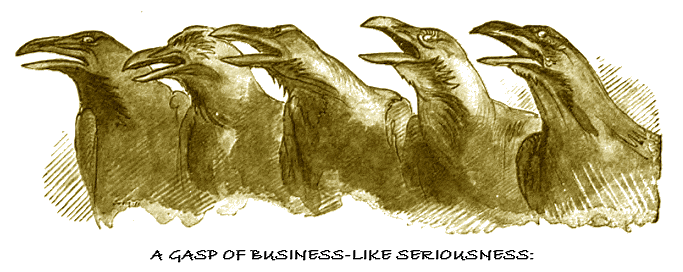
The raven was never meant to be bullied. He is a wag, certainly, but a wag of a satanic sort. His very chuckle is fierce; and when the heat makes him open his mouth to pant, it isn't with a lachrymation, as the chaplain crow, nor with a grin, as the magpie, but with a severe and business-like seriousness, that says plainly that somebody's heels must be bitten for this; preferebly, I imagine, Apollo's, as the gentleman that drives the sun; and who, also, first made the raven as black as he could possibly be painted. The full age of the raven is not known, and in the belief of many he shares with the donkey the reputation of immortality. Notwith standing which, Charles Dickens had a raven that died of too free indulgence in white paint.
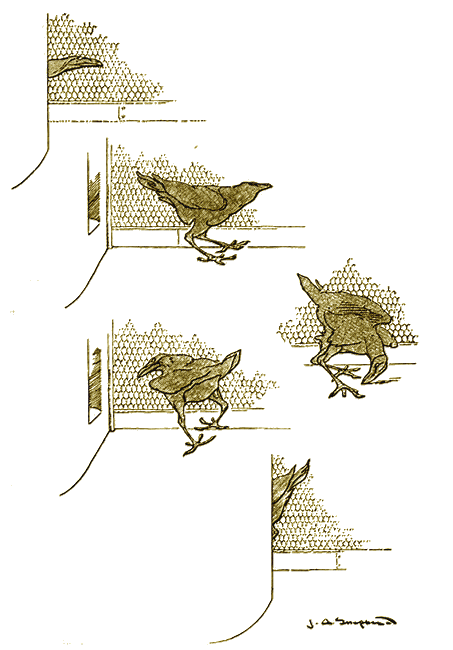
Like many another wag, the raven hates nothing so much as looking ridiculous; wherefore, in his private moments he practises dignity. It is the last thing one would expect of the raven, but he does it. Watch the occasion and you may observe him carefully practising a graceful and imposing emerging spring into his open cage, when he knows of nobody looking. And, in truth, the practised raven has a courtly bow, but it requires preparation and training. Betray your presence after he has substituted a downer with his nose for the stately bow and strut he had intended, and you will humiliate him as even plucking would not; and send him into retirement with a longing to snatch your watch.
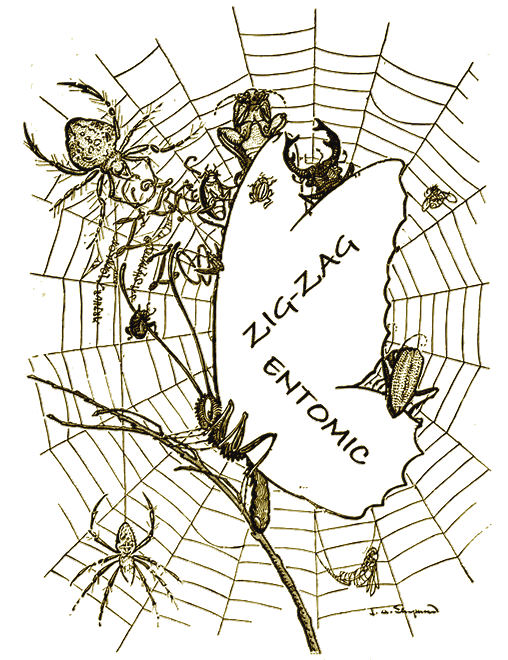
Entomology is a vast, a complicated, and a bewildering thing. Every entomologist has his own ideas as to classification, and each system of classification, considered separately, seems to consist of an aggravation of the confusions of all the other systems. Therefore let us have no system in our contemplation whatsoever it may please us unprofitably and frivolously to observe.
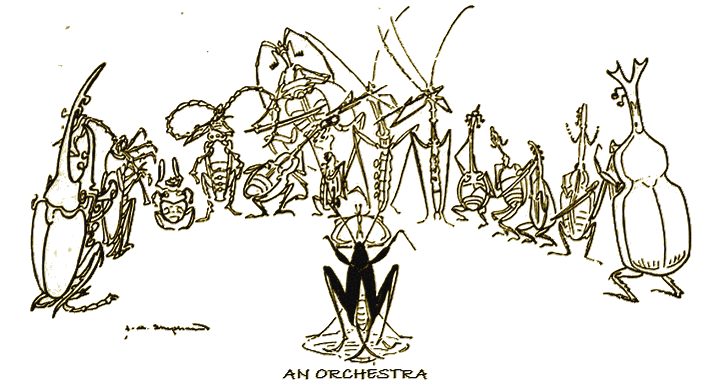
The illustrative moralist has a way of rushing to the insect world for his lessons, though a moment's reflection and a few inquiries would convince him that the insect world is the most immoral sphere of action existing. The pervading villainy of the whole insect kingdom is obvious in the very system of their existence; for if ever you inquire what is the earthly use of some particular insect, you always find that it is to eat some other insect, which, if allowed to increase, would do all sorts of frightful damage. You then find that the use of this second insect is to kill some other insect, an equal pest; the object in life of the third insect being to unite in large numbers and assassinate some entirely different and very large insect indeed, who spends his days and nights skirmishing about and devouring all the different sorts of insects we have just been speaking of.
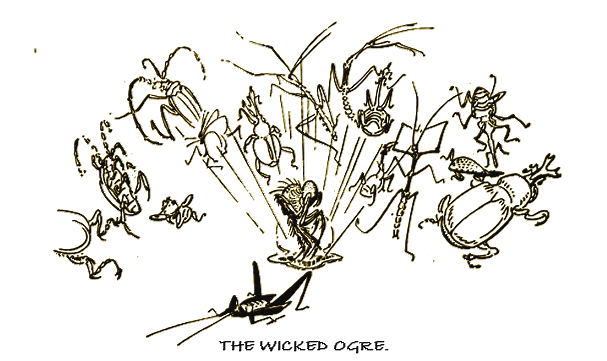
Therefore, since the mission of every insect is to kill some other, it is plain that murder is the chief occupation of the insect tribes, and even the illustrative moralist is reported to admit that murder is not a strictly moral amusement. Also, since it is proper that every insect should be kept in restraint by some other, it is plain that the sum of insect depravity, apart from murder, must be vast indeed; which disposes of the insect as a popular preacher. But the insect as an ogre, the insect as a pirate, as a flute, a flageolet, a torpedo, a Jew's harp, a walking-stick, a double bass, and a Jack-in-the-box—in such characters he shines, often literally. For the beetle Xylotrupes, with his glossy back, is a double bass, and nothing in the world else—unless it be a bloated violoncello. Just as the stick insect may be a flute, a flageolet, a walking-stick, or a mere twig, as fancy may persuade you; and as the trap-door spider may be a Jack-in-the-box or a wicked ogre rising through the stage in a pantomime.
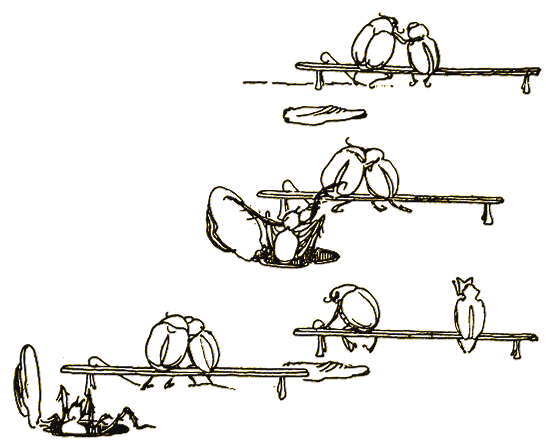
Here, in the Insect House, one may see the trap-door in all its neatly fitting and spring-hinged guile, and there is no reason why a moral fable should not be built round him, or round any other insect, so long as he is not elevated to an ethical pedestal whereon he has no right. For instance, one might tell the Fable of the Artful Spider and the Fascinating Beetle thus: "A certain Green Beetle, that was a great Belle, was much Beloved by a Brown Spider, owning an elegant and convenient Trap-door in a Fashionable Situation.
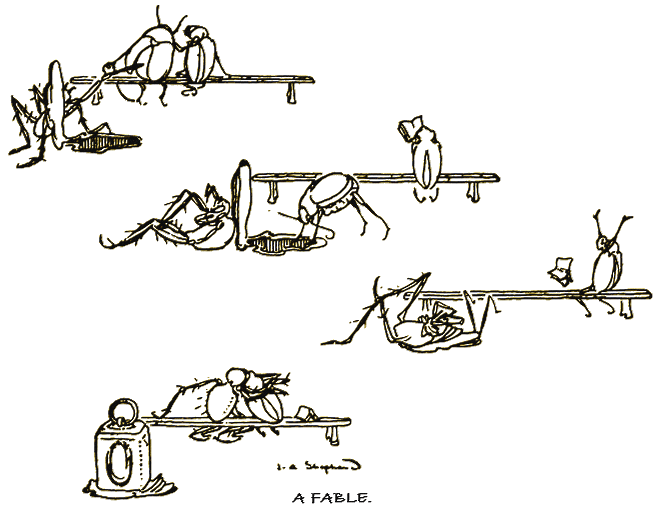
But his Suit had an unfavourable course owing to the intervention of a Prussian Blue Beetle, who was the more favoured Swain. Having thought on many Stratagems, the Spider at length placed a rustic seat near his Dwelling, and Advertised that that was the Place to Spend a Happy Day, knowing full well that he Green Beetle and the Prussian Blue Beetle would take Cheap Returns, and sit upon the rustic seat to Spoon. And when things fell out as he had intended, behold, he arose from his Den and Tickled the Prussian Blue Beetle in the Ribs, quietly Concealing himself. And having Repeated this, at length he left open the Trap-door, taking Ambush behind it; and when the Prussian Blue Beetle arose and investigated the Premises, with great Speed did the Spider hasten to shut down the Lid upon him, placing a Weight thereon, to reconcile him to his Incarceration. And straightway the Spider did make his Court unto the Green Beetle, and they lived as happy as usual ever afterward. Moral: We may learn from this History, that, as the Poet has already Taught, it is unwise to introduce your Dona to a Pal."
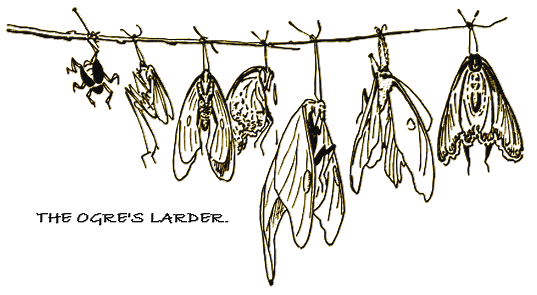
The big hairy Tarantula Spider, too, the ogre that will kill a bird or a mouse when large insects are scarce, is here with his venom and ugliness in complete order. He sheds his skin periodically, sometimes leaving it perfect throughout except in the one place through which he emerges, so that it would be possible to "have him stuffed" without killing him. Whereof one may tell the Fable of the Wicked Ogre, or the Tarantula Boom.
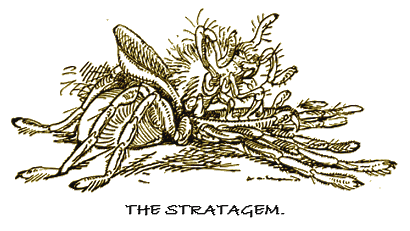
"A certain Ogre, that was a Tarantula Spider, and dwelt in a Dark Place by the hillside, grew so oppressive in his Demands upon the neighbouring insects, as to create a Scare or Tarantula Boom, whereof a Song was written. For you must know that this Ogre, not satisfied with an occasional Cockroach, did levy daily contributions upon the population, and kept, hanging in his Larder, a great Store of Prime Joints, much greater than his Requirement. And the Song of the Tarantula Boom was sung more than ever, and people grew Mad. Among many other Things, this Ogre demanded the Sacrifice every day of a White Lady. And still did all the Crawling Things, being bitten by the Tarantula, or as some said. Tara-ra Boom, fall to Dancing and Singing the aforesaid Song like Mad, because of the Boom; all the White Ladies and all the others; and there was much High Kicking and Flinging of the Heels: Until at last all the Insects, finding the Tara-ra Boom beyond endurance, resolved to Come in their Thousands and Slay the Ogre. Of which the Ogre having privy Information, he set about to devise some means to Terrify his Assailants. To that end he Cast his Skin, taking much care not to Damage the suit of clothes, and set it Empty but seeming Full beside him. And when the Posse of Insects, driven Desperate with much repetition of the Tara-ra Boom (or as some did now call it, the Tara-ra Boom D.A., because it was Deuced Annoying), came unto the Ogre, behold, he was Twins. And they marvelled much, saying one to another, Lo, the Job has doubled in size; verily it would seem a Bit Too Thick. Thus they went Home in their Thousands, each diligently slinging his respective Hook, by Reason of the game not being Good enough. And so it was that the Tara-ra Boom D.A. lasted for ever. Moral, very."
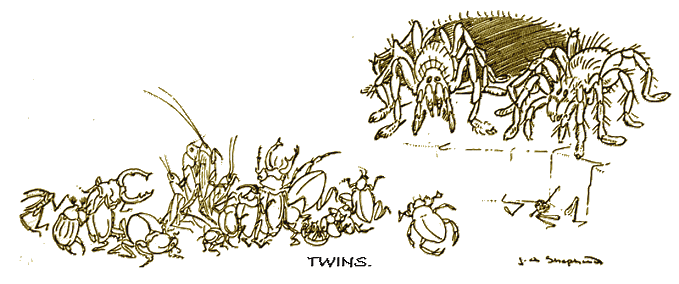
Speaking of booms, by the way, one remembers that, according to Tennyson, "At eve the beetle boometh." But the only beetle one remembers as effecting much in the way of a boom is the Colorado Beetle. The beetle, as a general thing, is not given to publicity of any sort, preferring a retired and quiet life. He never interferes in public affairs—having too many legs to look after. The Bombardier Beetle, however, can boom. Touch him, and you will hear.
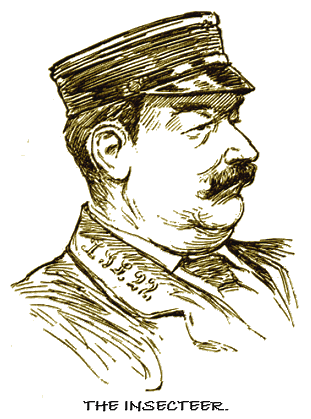
Quantrill, here, is very kind to the Tarantula Spiders, often giving them a steam bath to assist them in getting rid of their old suits of clothes. Quantrill keeps in order the moths, butterflies caterpillars, and spiders in the Insect House. He is a man who has arrived at a state of being when nothing feels crawly—not even a centipede. To be on terms of daily intimacy with lions, tigers, elephants, and pelicans is a great thing, but I feel a more peculiar awe for a man who is the confidential friend of several scorpions, and who keeps two spider-ogres on show in glass cases; consequently, I am always respectful to Quantrill, and inspect his person carefully for stray scorpions before coming very near.
A certain amount of entomology is forced on everybody, whether of a scientific turn or not. There are very many seaside lodging-houses where the whole of the inmates, without distinction of scientific tastes, sleeplessly adopt the study from their first night of residence.
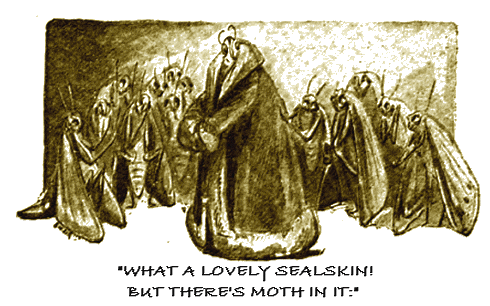
The sea air invariably stimulates interest in natural history. Nobody, therefore, however humble, need despair of acquiring entomological knowledge from want of material. The earnest student need do no more than buy an expensive sealskin cloak to gather together an instructive swarm of moths, sufficient to engage his attention for a long time. The Japanese, by-the-bye, have a pretty story to account for the rushing of moths at a flame. The moths, they say, in love with the night-flies, were bidden to fetch fire for their adornment.
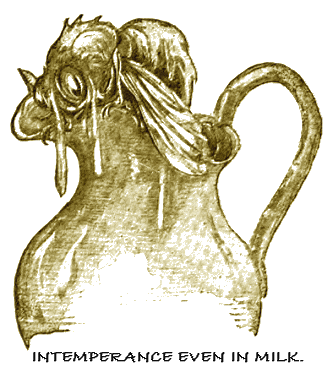
The moths, being naturally fools from the circumstance of being in love, rushed at the first flame available, and were damaged. This is a very pretty excuse for the moth, and perhaps more flattering than the belief prevalent in this country, which is that the moth is fool enough to burn himself without being in love. Because a moth never learns wisdom. Once having got away with the loss of half a wing, he might reasonably be expected, in future, on observing the light that caused the damage, to remark, knowingly, "Oh, that's an old flame of mine," and pass by on the other side. But he doesn't. He flies into it again and burns his other wing, or, more probably, roasts himself completely. Thousands of generations of scorched and roasted moths have passed away without developing the least knowledge of the properties of fire in their descendants. The moth remains consistent, and a fool.
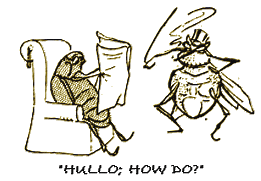
There are few things of its size more annoying than a bluebottle. He is always bursting with offensive, bouncing, robust animal spirits. He snorts and trumpets about your room in an absurdly important manner, when you are anxious not to be disturbed. To personal acquaintances of his own size he must be an intolerable nuisance. He is like those awful stout persons who wear very shiny hats very much on one side, who hum loud choruses, slap you boisterously on the back, take you forcibly by the arm and drag you out for promenades when you are anxious to be left alone.
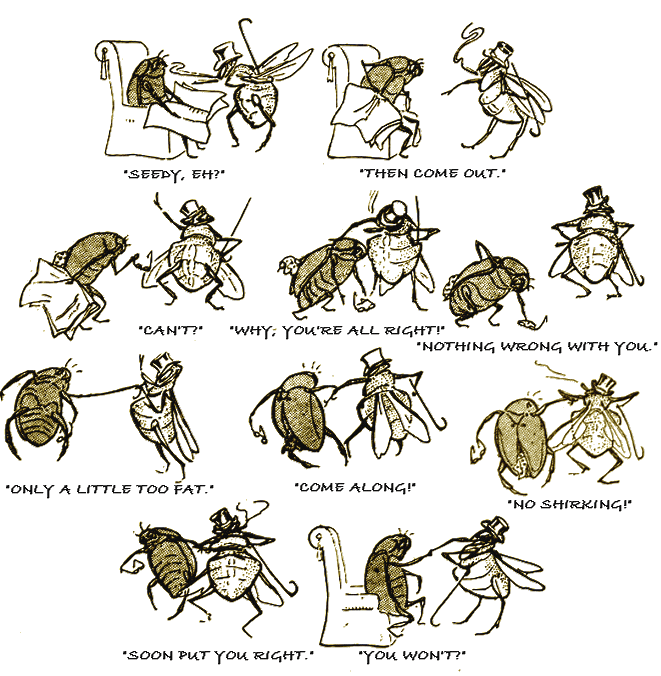
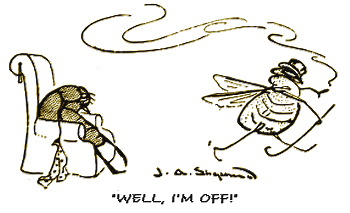
He is preferable to these persons, inasmuch as with some expenditure of time and temper and the shattering of various small pieces of furniture you may smash the bluebottle, whereas the law protects the other creature. The bluebottle, however, adds to his other objectionablenesses by plunging among and rolling in your meals before your very eyes.
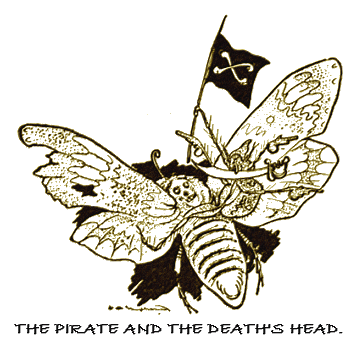
The Death Watch is another domestic insect never very cordially received. He only taps by way of telegraphic signal to his friends, but after all the terror he has caused he might have had the consideration to invent some other system. The Death-Watch, the Death's-Head-Moth, and the Pirate Spider are the banditti among insects—who are all cut-throats themselves to begin with.
One of the most remarkable characteristics of insects as a class is their contempt for legs. No insect minds the loss of a leg or two, having so many others. A spider sometimes will get along very well with one. Indeed, every insect would seem to be made of parts which are complete strangers to each other. I have seen a wasp "divided," like Clonglocketty Angus McClan, "close by the waist," but not in the least inconvenienced by the solution of continuity. The front half, having the best of the bargain by reason of retaining the wings and legs, strolled away in the most unconcerned fashion, leaving the unfortunate abdomen, legless and wingless, to get home as best it might. Whereon one might construct yet another fable, relating the meeting of the front end of that wasp with an enemy, and its inability to use its sting at a critical moment, with the moral, Never Despise even a Deserted Abdomen. Wasps, by the way, are not social favourites. I have seen an ordinarily companionable man, not otherwise given to physical exercise, climb fatiguingly, and grovel painfully by way of excusing himself from making a wasp's closer acquaintance. And when a wasp succeeds in making a visit, alighting on a man's hand or neck, that man never asks him to sit down, because it is when a wasp sits down that one best understands the uselessness of his acquaintance. The only satisfactory way of averting a wasp-sting is to stand on the animal's back for five minutes before he commences.
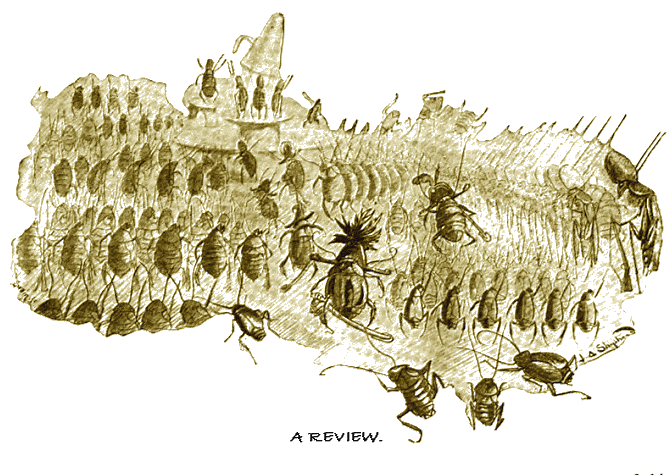
The domestic black-beetle is so called in celebration of its being brown in colour and not a beetle. Beetles are aristocrats who keep their wings in sheaths. The more proper name for Blatta Orientalis is the cockroach, because it is equally unlike a cock and a roach. Its use in the economy of Nature is to supply a consolation for big feet. It is well known as a kitchen ornament, although its natural diffidence of disposition induces it to reserve its decorative effects for the evening, when it organizes reviews and parades on every available spot. Few domestic pets are regarded more affectionately by their proprietors. Lettuce leaves and wafers are distributed for its comfort nightly, and I have known even respectable teetotalers to pander to its depraved tastes, and provide it with the means of shocking intoxication in an old pie-dish provided with convenient ladders.
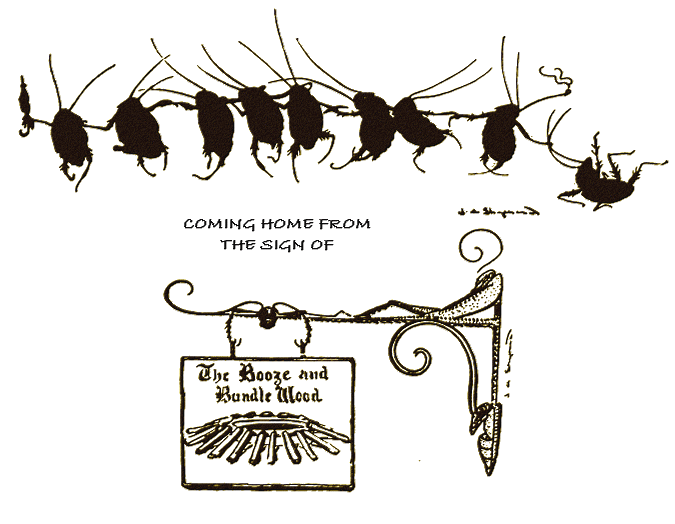
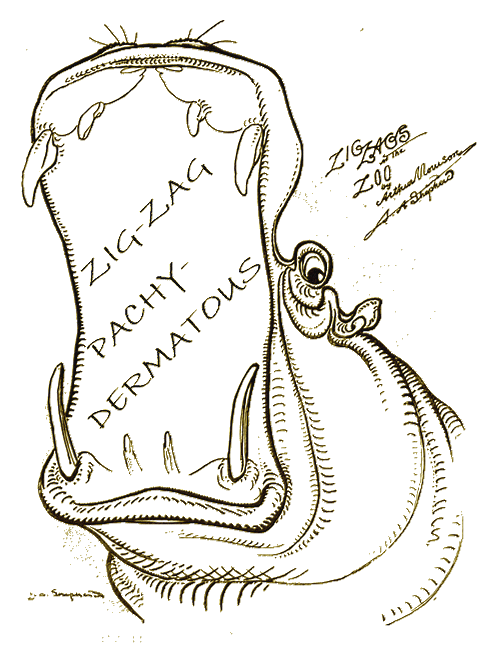
THE ELEPHANT, the various sorts of swine, the rhinoceros, and the hippopotamus—these are the pachydermata. Now, the elephant has had a Zig-zag to itself, and the pig shall have none of this Zig-zag; excellent reasons why now I speak only of the hippopotamus and rhinoceros. It is not easy to catch the hippopotamus at a moment of extravagant agility. To obtain lively sketches of the hippopotamus for the embellishment of these page, has been a task of long waiting, weary sitting, tiresome standing, much hanging about, hope deferred, heart-sickness, and final disappointment. Other animals baffle the artist by restless movement.
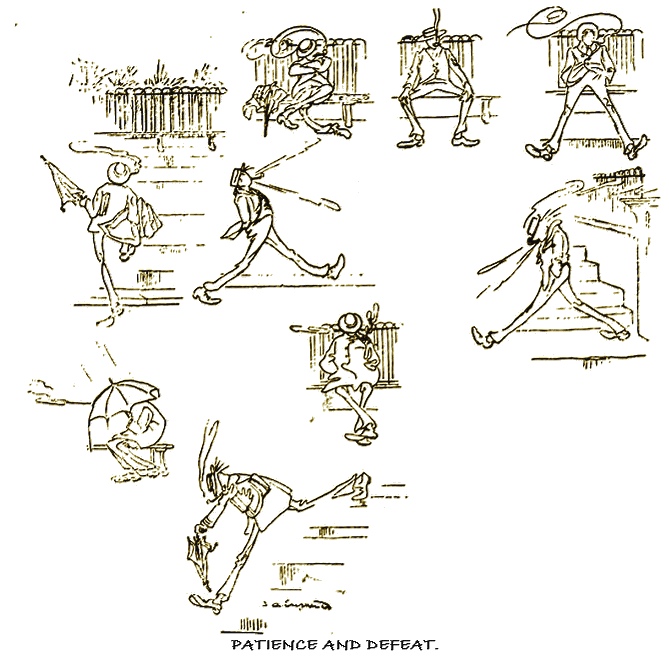
Guy Fawkes, the big hippopotamus here, has an easier trick; she (this Guy is a she) lies perseveringly still. Iles was kind enough to suggest a shower of rain, because Guy has a way of getting up and strolling into the pond to get out of the wet. We had no influence with the rain, so had to wait for it. The rain came, and the wetting, but Guy Fawkes braved out the shower rather than serve the will of an artist. So that it is not possible in this place to gratify the public with authentic portraits of Guy Fawkes turning a somersault, or dancing a hornpipe, or walking on a tight-rope, or even riding on a bicycle.
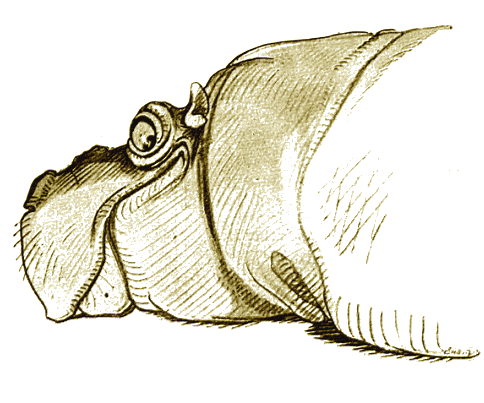
Still, the views which are possible have the undeniable merit of accuracy and architectural actuality. In the first place, standing on the path behind the paddock, we enjoy a view of the south elevation. Here the whole length of the edifice is visible in its simple grandeur. The architecture is of the manner of Vanbrugh on whom, it will be remembered the poet exhorted the earth to lie heavy, in retaliation for the heaviness of his buildings. Nothing of Vanbrugh's ever lay heavier per cubic foot on the groaning earth than Guy Fawkes lies here. I defy even a ghost to rise from the earth under Guy Fawkes.
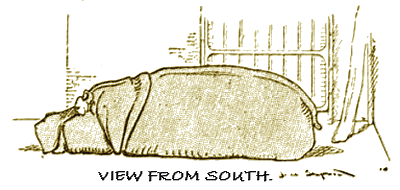
Let her but lie on it and she would extinguish a volcano and drive an earthquake discomfited away to some part where the earth's crust was less immovably suppressed. It is a humiliating thing in most cases to be sat upon, but when Guy Fawkes is the sitter, little room is left in the sittee for humility or any of the other virtues.
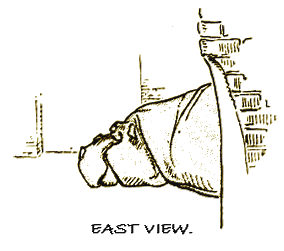
The east view of the structure is obtained from near the gazelle sheds, and the view from the north (only a partial one, but still picturesque) you get from inside the house. If you can get into the ostrich paddock (you can't) you will have an opportunity of surveying the venerable pile from somewhere about west by south.
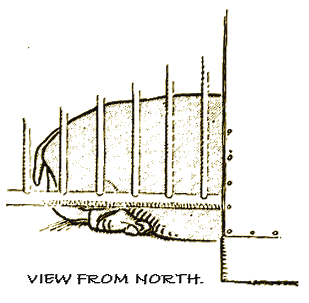
This is a sort of end elevation, with a conspicuous display of the west wing, if anything about a hippopotamus can be called a wing. Then you will bave seen and admired Guy Fawkes pretty well all round.
The hippopotamus in general is admired for several causes. His (or her) mouth is indisputably the biggest extant, and has long been acknowledged to exceed even that of the Philanthropic Reformer, while his hide is almost as thick. His legs, although serviceable, are not altogether up to ballet form, but his chest measurement anybody might be proud of. Perhaps we love him most, though, as an old Londoner, although he has not been a familiar wanderer in the London streets since the tertiary epoch, which was some time ago. Again, in old time the hippopotamus was installed the symbol of impiety and ingratitude, which may account for a vast deal of popularity.
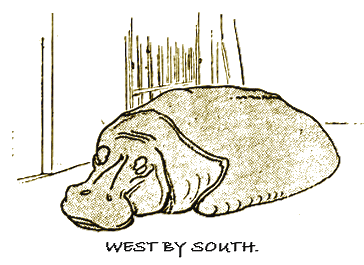
His name, of course, is derived from the Greek hippo a horse, and potamos river; but he cannot be regarded as a very successful horse. Few people who admire a handsome Cleveland, with good knee-action, would, as a habit, harness him with a hippopotamus to a landau. The hippopotamus has no points; no more points, and no sharper ones, than a German sausage.
Still, it cannot be too widely known that the hippopotamus does move sometimes. Even Guy Fawkes does, and some insignificant proportion of the visitors (about ¼ in 10,000, I believe) witness the feat. But even then she rarely does more than change her elevations—just brings her north elevation round south, for a change of air.
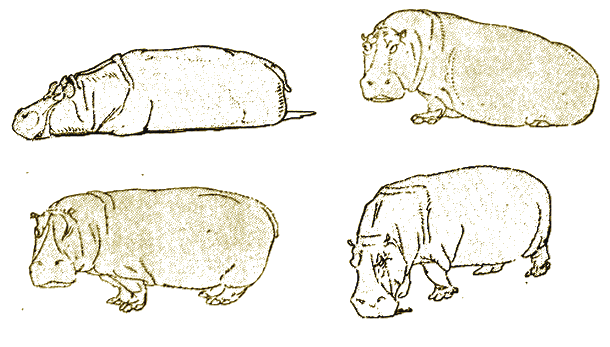
It is a grave and solemn rite, this turning about, and it proceeds with properly impressive deliberation. She rises by a mysterious process, in which legs seem to take no part; she anchors her face against the ground, as regarding her head in the light of a great weight (which it is) dumped down to prevent the rest of her being blown away by an unexpected zephyr. Then, with her weighty muzzle as pivot and centre, she executes a semi-circular manoeuvre suggestive of an attempt to kill time—rather, one might say, procrastinates herself round—until the north elevation faces south, when immediately she becomes a sausage again, turned about.
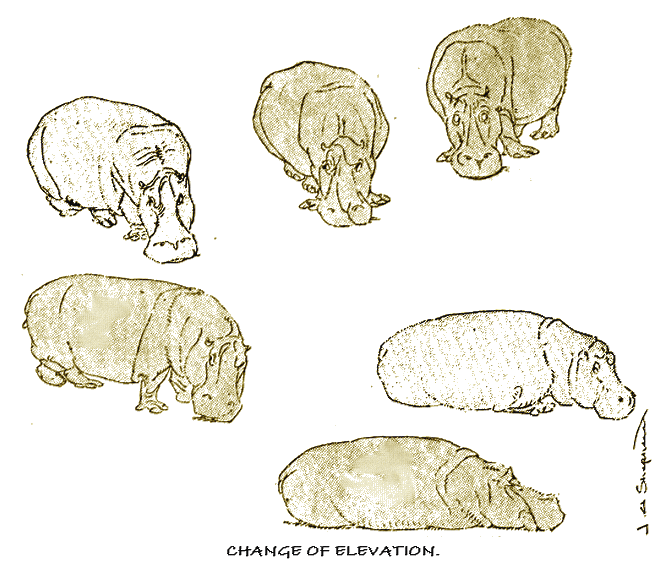
All this is done with such perfect modesty that you immediately forget whether you saw her legs or not—indeed, whether she had any. As a matter of fact, I may here inform a doubtful public that Guy Fawkes has feet: her legs—if she has them—she, with propriety, veils in certain lashings of fat.
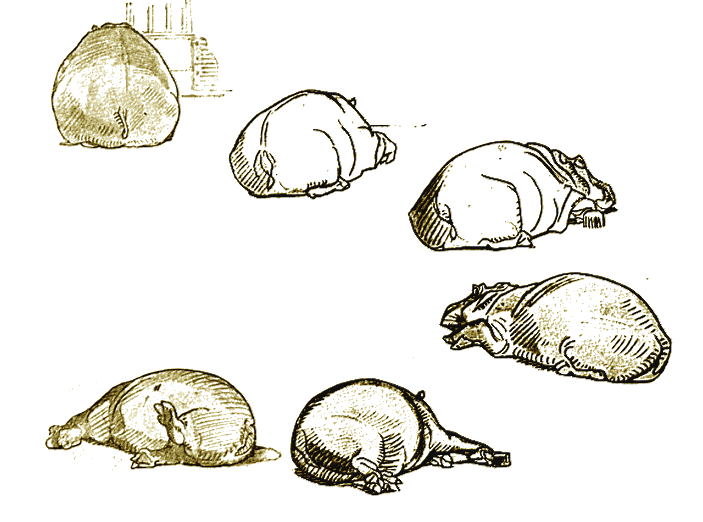
Guy Fawkes was so called in defiance of her sex because she was born (here in the menagerie) on November 5th, 1872. Next door to Guy Fawkes lives Jupiter, who is only a small hippopotamus, some way from being fully grown. Jupiter, however, has ambitions. She admires and envies, beyond all things, the placid repose of Guy Fawkes. He does his best to imitate her. But as yet he is little more than a beginner—a mere amateur in inertia.
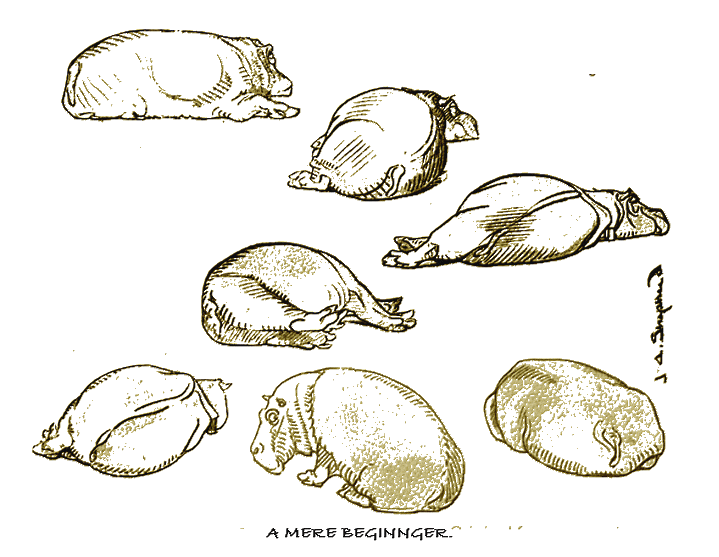
He is so inordinately proud of lying perfectly still for twenty minutes or so that he must look round for admiration, and spoil the effect at once. His mental attitude toward Guy Fawkes is that of the boy to Sidi Lakdar in Daudet's La Figue et le Paresseux—but Jupiter is far, very far, from being the equal of the boy in the noble craft of the paresseux. The fact is that Jupiter, in his ambition to become a creditable hippopotamus, an immobile vastness, a venerable pile, tries a little too much at once. Guy Fawkes, he considers, can smash anything earthly by lying on it, and herein he is right. Aspiring to the crushing power of Guy Fawkes, he is continually troubled by one or two hard iron knobby projections from the ground, which serve to keep the door of his den in place. Try as he will, these pieces of iron won't be suppressed; on the contrary, they discompose his surrounding atmosphere of fat—must reach, in fact, to within a very few feet of his ribs—and this is uncomfortable.
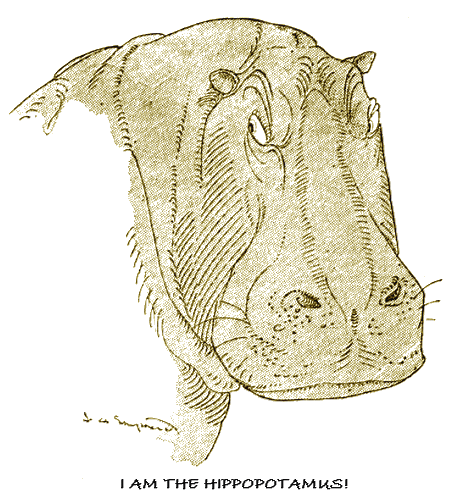
Still he pegs away, combining his attempt at the placidity of Guy Fawkes with that upon the obstinacy of the iron knobs. So that on the whole he does not succeed, comes as near perpetual motion as a hippopotamus may (about three moves an hour), and frequently betrays his possession of legs. He is never mistaken for a sausage, but presents the general appearance of a succession of cartloads of mud of varying shapes and designs. Jupiter, however, from his very perseverance, will get on, and some day, when full grown, he will take sausage rank and suppress earthquakes as well as Guy Fawkes. Then he will have north, south, east and west elevations, and, leaving behind the ignominy of resemblance to cartload of mud, became a Venerable Pile, and shroud his legs.
There are times when neither Guy Fawkes nor Jupiter will condescend so far as to exhibit themselves architecturally; on careful scrutiny a broad nose-tip is observable, apparently floating on the surface of the pond. This is Guy Fawkes or Jupiter, as the case may be. Inexperienced sparrows, strangers to the place, have been known to alight on the small island thus presented, and to go away again immediately, doubtless to carry the report that the island was of an actively volcanic character.
The hippopotamus has now been a familiar object in the Zoo for forty-three years, and the rhinoceros for longer; but still one hears occasionally the remarks (usually for the instruction of toddling youth) of worthy old ladies, who confuse the one with the other. It might conduce to the spread of more exact knowledge if an announcement of identity were painted in large white letters across the south elevation of Guy Fawkes. As it is, that most eligible advertising space is wasted completely.
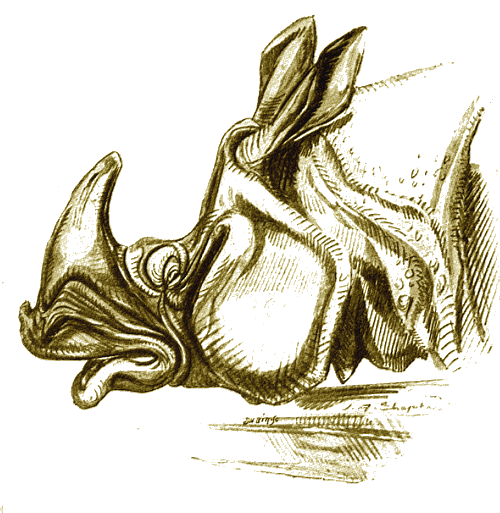
The derivation of the name of the rhinoceros was once most intelligently explained by a showman exhibiting one. "This, ladies an' gents, is the cellerbrated rhinoserious—called rhino 'cos of is immense pecoonary value; called serious consekins o' bein' mentioned in 'Oly Writ." His points of difference from the hippopotamus are fairly obvious. Both have a good thick overcoat, certainly, but the hippopotamus, anxious for a good fit, fills all baggy spaces with fat, while the rhinoceros, preferring the free and easy appearance of a caped ulster, lets the garment hang in folds; not that the rhinoceros starves or wastes. Jim here, the older of the two Indian rhinoceroses (the other is Tom) measures more than twelve feet in girth, and, if eating will do anything, is certainly not decreasing. The feeding of the rhinoceros is a surprisingly thorough process. A few trusses of hay, a few of straw, a few of tares, a few biscuits and so on lie along one side of his sanctum. The biscuits go first, and then, beginning at one end of the hay, he eats his way through till he arrives at the straw, and through that to the tares.
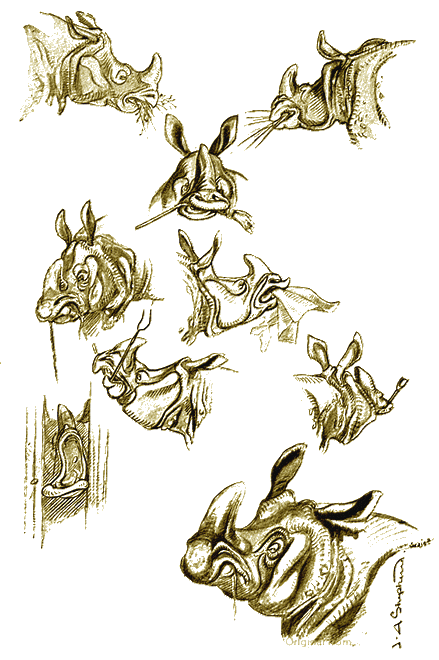
When these have all disappeared, he will proceed steadily to devour any broom, shovel, or bucket which may have been left in the place, and so eat his way through the furniture till his residence is absolutely bare. Then, after a careful inspection to assure himself of the surrounding emptiness, he will roll up to the bars and there stand with open mouth to receive whatsoever the visitors may choose to cast therein. Much investigation and many hours of careful thought I have devoted to an attempt to ascertain why he doesn't proceed to consume the house itself; but it remains a curious mystery. Possibly it may be because of a tacit understanding with Iles, the keeper, that in consideration of the reversion of all old brooms and stable utensils, the building shall remain uneaten. Tom, in particular, regards as an especial joy the privilege of browsing on a discarded broom.
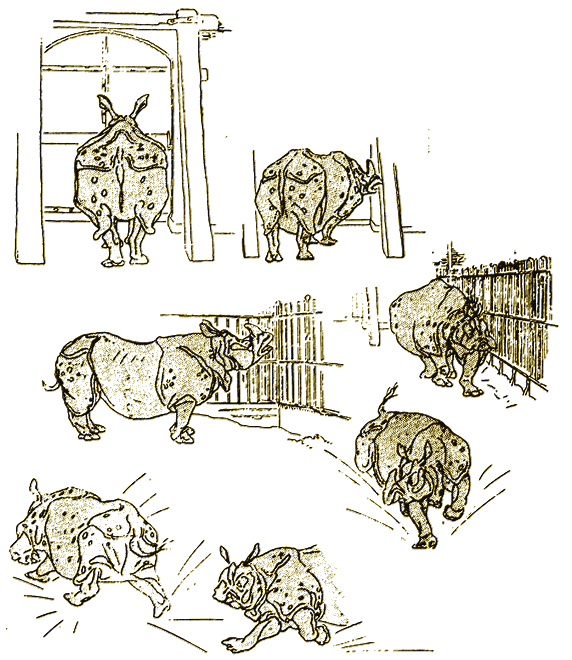
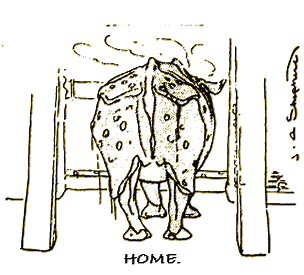
Jim, who has been here twenty-nine years, is a taciturn rhinoceros, who nevertheless likes company. Jack and Begum, the pair of smaller, hairy-eared rhinoceroses, are Jim's next-door neighbours. When Jim and his neighbours are out in their respective paddocks, Jim takes no notice of the others. But if only he be left in his paddock while Jack and Begum are within, he immediately yearns for company; goes, in fact, to the dividing railing and shouts for it aloud. This shout seems to be part of a game of "I-spy-I," which Jim is trying to persuade Jack and Begum to indulge in. He may be standing perfectly quiet near his door when the impulse comes upon him. Then he trots out, shouts at the railing, runs furiously all round his paddock (with a noise as of a trotting troop of cavalry with loose accoutrements), and finally bounces "home" in triumph, and waits there for Jack and Begum to appear—defeated. If they do not come—usually they do not because the door is shut—he repeats his shout and run; if they happen to be let out, Jim promptly loses all interest in them. He yearns but for the absent.

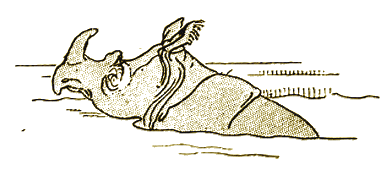
Jack and Begum are an extremely affable pair, most excellent and intimate friends of mine. You may go fearlessly and pat Begum—although she would prefer being fed. You may also pat Jack if he be near enough to the bars. If not, you may shut your eyes and pat a brick wall—it is just the same thing, if only you select a sufficiently rough wall.
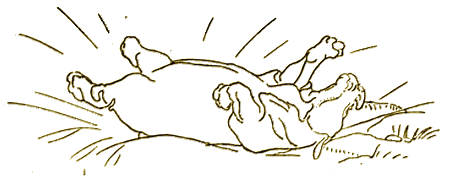
I am sorry to have to report, as a result of careful observation, my conviction that Begum tyrannizes over her husband. They run a sort of circus, wherein Jack does the whole performance, while Begum personally surrounds the entire receipts. For some cause of which I am ignorant, Jack always walks with a quaintly high-stepping action of the hind legs.
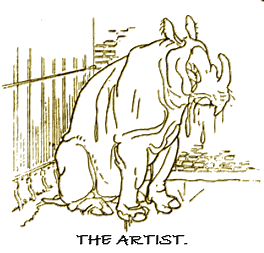
It was this, I am certain, that first suggested the circus to the financial genius of Begum. Jack solemnly goes through his high-stepping march round, by way of opening procession. He presents himself to various points of view, so as to give the spectators full measure for their contributions. Then he flounders into the water and gloomily clowns for the amusement of the vulgar. He goes through a series of rhinoceros trick-wading feats, finishing up by splashing over on his back, and spilling most of the pond.
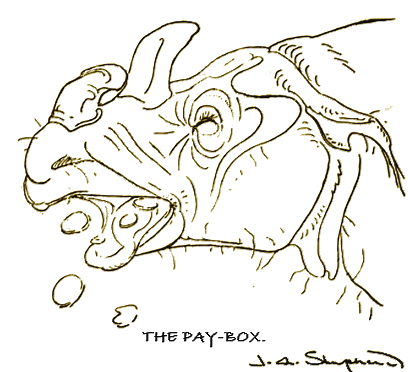
That is the performance. It isn't a very great one, but it draws contributions of biscuits and buns, which Begum eats as fast as they accrue. As soon as the business is over, Jack rolls lugubriously into a corner and sits down to weep drips from the pond, with an expression of dismal recognition of the hollowness and mockery of all this glittering theatricality and sham gaiety. But Begun still goes round with the mouth. Jack never come to the rails for a share, feeling too deeply the vanity of mere earthly buns; also having long ago been convinced that it is his business to earn while the missis eats them.
Jack and Begum have opposite opinions in the matter of Monday.
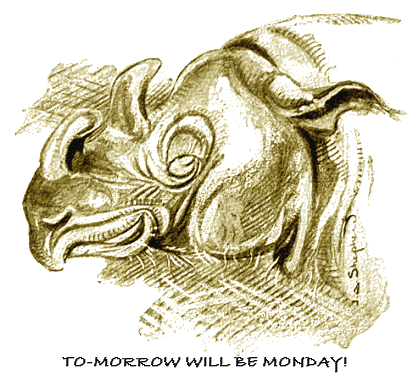
Monday is the sixpenny day, and Jack has to clown his hardest; while Begun collects a vast toll. Sometimes a bun has been thrown directly under Jack's muzzle, while Begum has been busy at the farther end of the paddock. Then Jack has gazed for a moment reproachfully at the thrower, as who would say: "My friend, you should know better than thus to cast temptation before a weak and erring rhinoceros"; then at the bun, as who would add: "Ah, a bun—a worldly bun. All buns is vanities. Nevertheless, lest peradventure some weaker vessel be tempted—perhaps even the missus—if I leave it there, I will proceed to surround it with what grace I may "; which he does.
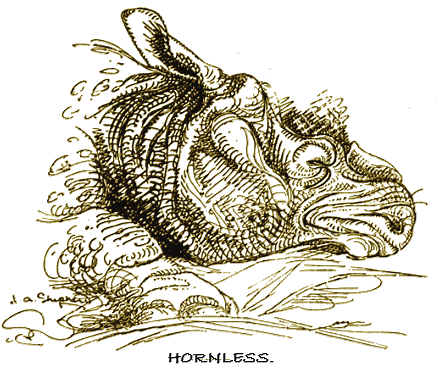
Tom, at the further end, is an excitable sort of rhinoceros. His fidgetiness has resulted in the almost complete rubbing away of his horn. This circumstance lays Tom open to a deal of slighting criticism from unzoological visitors. "'E ain't a rhinoceros!" they say; "Where's his horn?" And then, when convinced by the label—"Well, 'e ain't got a fine 'orn like the other"—alluding to Jim. This annoys Tom, and, as trampling his enemies out flat is an impossibility, he turns about and sulks. He is no bad fellow though, on the whole, and it is just possible that he has rubbed down his horn to see ahead better. Tom is very fond of his pond—too fond. He gets excited and dashes his corners off against the sides, so that his allowance of bath has to be limited; otherwise he would kill more bluebottles. Tom has to take to the water to kill bluebottles.
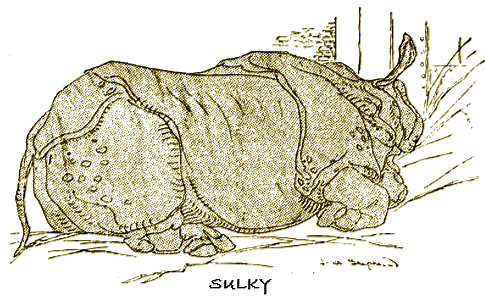
It costs a rhinoceros a great deal of valuable time to kill bluebottles by charging at them with his horns, and if he doesn't kill them they creep under the folds of his ulster and annoy him. Immersion in water crowds the bluebottles into a small space—about the ears. And with his ears Tom drowns bluebottles at an amazing rate.
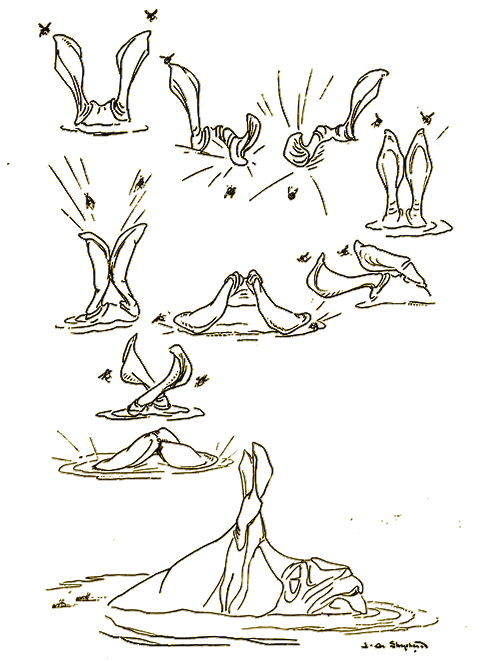
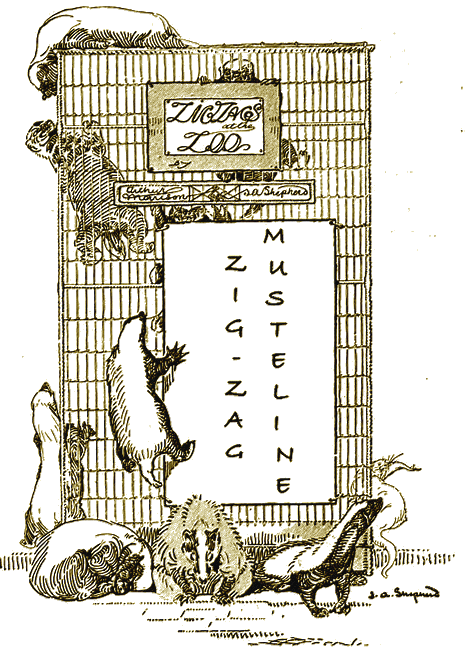
NOW, the mustelidae are the weasels; and the badger is a weasel, improbable as it may seem, as also is the otter, the stoat, the polecat, the skunk, the glutton, the ratel, and many others. And since so many things are weasels—and to speak of many things at once is beyond my compass herein—those weasels only will I speak of that chiefly take the eye in the outer parts of house number twenty-seven; saying nothing of the glutton (though all weasels are gluttons, each in his way), nor of the polecat, nor the stoat, nor the skunk, nor the weasel that went pop.
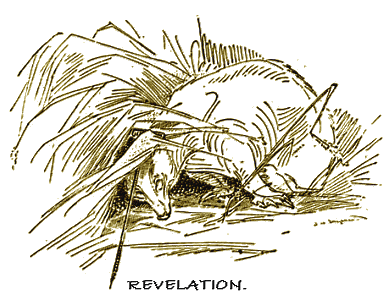
Every admirer of modesty should love the badger. So little he obtrudes himself that we are often assured that the badger (or the brock, as it is still called locally) is within a specimen or two of obliteration. But it is the brock's modesty that conceals his existence, for well he knows that, in his case, brock's display may not contribute much to brock's benefit; which words are an advertisement.
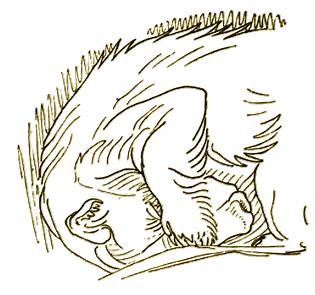
Badger-drawing is a thing of the past, and rightly. But upon this page the drawing of a badger may now be seen without danger of interference from the police. He is the white badger, and is never easy to draw. His native objection to daylight overcomes his sense of duty to the public, and nothing will make him show himself, short of taking away all his straw. Raking away his coverlet only exposes him for a moment; he burrows again and vanishes. He has left his card on the wire, he argues, and that ought to satisfy any reasonable visitor.

Although, labelled as he is, "Common Badger," he may feel rather ashamed of that card. That is a notion that I can never get rid of. All over the Gardens various animals are insulted by the epithet "common." Then there are the "Stump-tail Lizard," the "Dusty Ichneumon," and the "Hairy-nosed Wombat," not to mention the "Bottle-nosed Whale," that isn't here at all. Is man justified in so insulting his more virtuous fellow-creatures? Why should we show vulgar discourtesy even to a whale?
The ratels, too, although not insulted in name, are grievously oppressed after the manner of David Copperffeld at Creakle's.
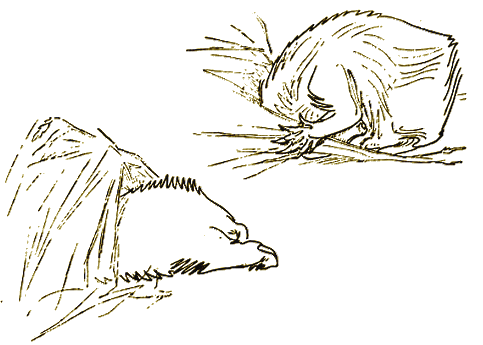
"These animals bite" is the notice for ever fixed upon their cage. It gives rise to sad unpopularity, which the ratels can never mitigate, in the manner of David, with jam tarts and redcurrant wine. But more of this presently.
Jack, the otter, in his big round cage, has his own particular affront to endure, none the less an affront because it is in Latin. Lutra vulgaris is the scientific name of Jack, but it is just as offensive to call an otter vulgar in Latin as in English.
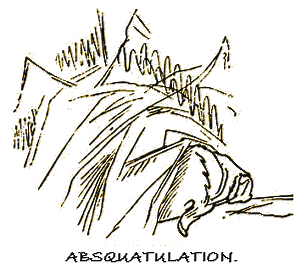
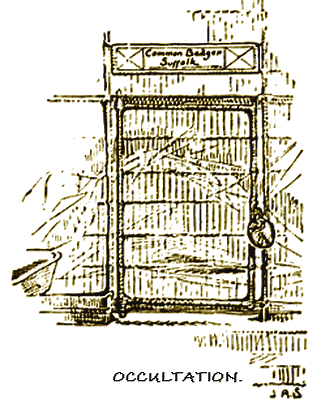
I can quite believe that it was this painted stigma of vulgarity that caused Jack to run away, some few years ago, and set up in the fish business on the Regent's Canal. It took some few days to persuade him to return, and the task of the persuaders was, I take it, none too easy. An otter is a rare good fighter, and there is trouble involved in bringing him home dead; but alive, he is a whirling tangle of teeth and claws, bad to handle. In any case, Jack is never vulgar. He is an epicure in the matter of fish, and an unerring connoisseur. Observe further the patrician disdain with which he regards the ignorant people who think to feed him with biscuits. It may be thought a vulgar taste that led him to start life afresh in the Regent's Canal, but where else could he go?
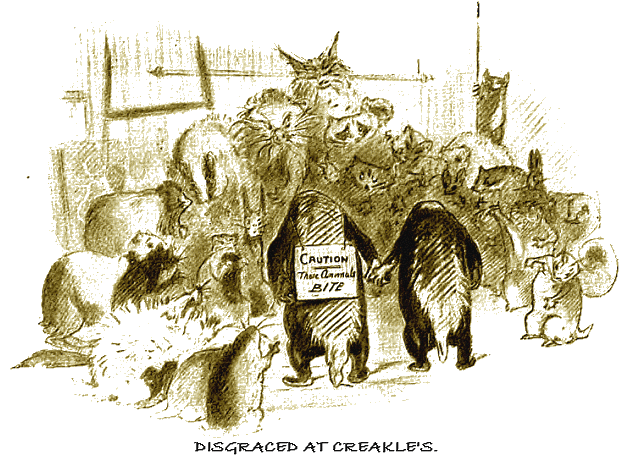
But in all the house numbered twenty-seven there are no such favourites as the ratels. Why these have never been properly, officially, and individually given personal names I cannot understand.
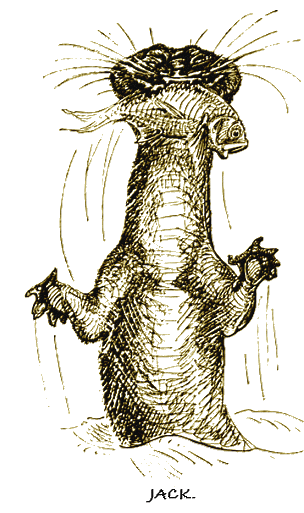
I prefer to call them Edwin and Angelina, because they are always turning and turning; although to imagine Edwin a gentle hermit of the dale, or a gentle anything, is not easy. For Edwin bites, and hard, and so does Angelina. But then it is only their fun. I admire Edwin and Angelina because they keep up their spirits in most annoying circumstances.
Those labels (there are two of them) informing everybody in capital letters that "These animals bite," have a most remarkable effect on human visitors. They touch, in some occult way, a hidden and mysterious spring of human impulse. For no human creature (able to read) can see that label without at once repeating aloud, "These animals bite." It is a most astounding phenomenon. Watch by the wires, and you shall see. A family arrives, and immediately mother points to the label and says, "These animals bite." "Ugh!" says the eldest little girl, also looking at the label, "they bite!" "Look here," says the boy from school, "these fellows bite!" Nurse stoops and informs Toddles that these animals bite. Toddles looks up and replies "Dey bite!" with an air of imparting exclusive knowledge; and then the whole family subsides into a murmuring chorus, whereof the only distinct words are "They bite." And so they move off.
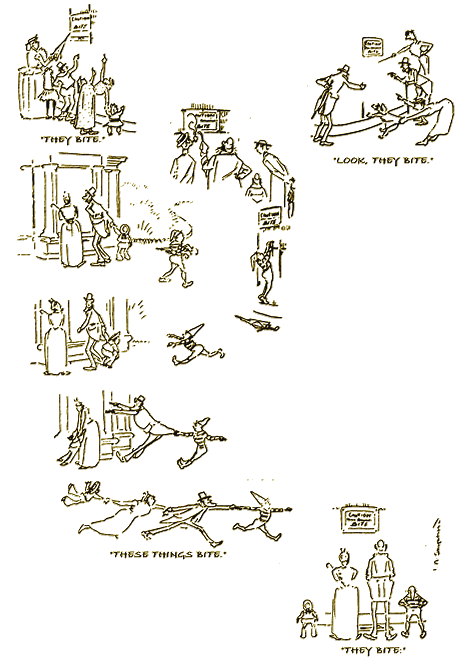
Then come old men, old women, young men, and young women, boys and girls, tinkers, tailors, soldiers, sailors, and the others. Each separately reads the label, and then assures all the others that these animals bite. Little Bobby strays from a family party, and reads that fatal label. He rushes back, breathless, to report that "these animals bite," and the whole family come pell-mell.
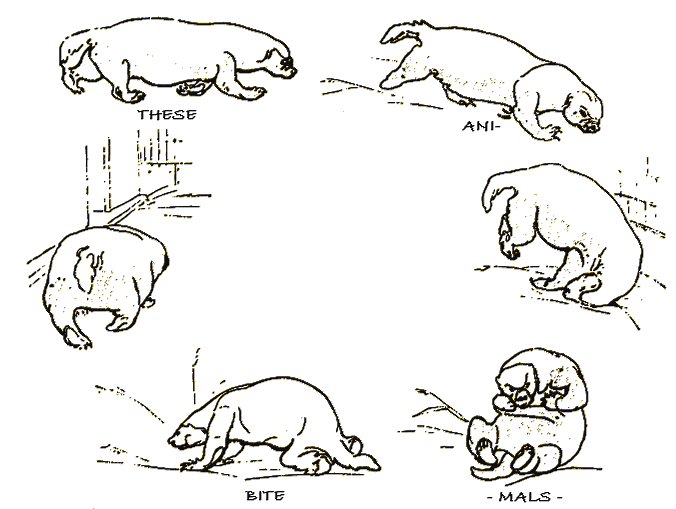
They stand before the label and repeat the mystic formula to one another, and then move off, making way for others, who do the same thing. It is positively maddening. No wonder the ratels bite; the Archbishop of Canterbury would bite if you tortured him with that exasperating reiteration.
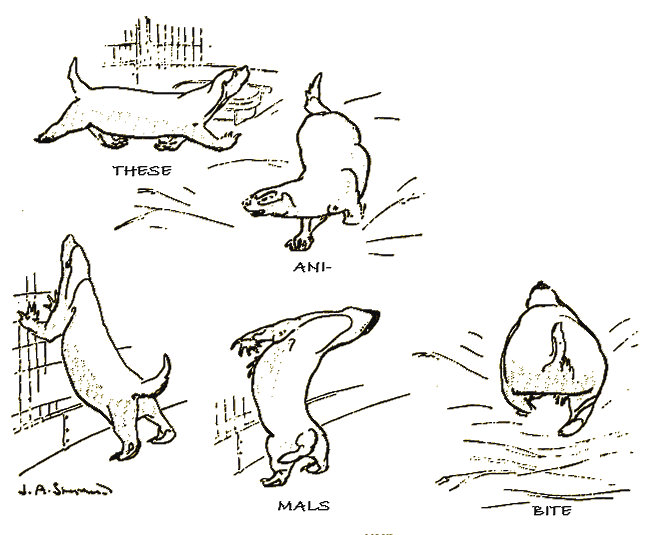
As it is, the phrase must eat into the very being of Edwin and Angelina, and they seem to take their regular trot round to the eternal refrain, "These—animals—bite—these—animals—bite," always and for ever; Edwin introducing a small variation by a somersault each time as he reaches the narrow part of the cage, and Angelina by a jump against the wires. These perambulations are executed with a steady thoughtfulness that plainly indicates profound cogitation of some kind. If it is not the rhythmical repetition of the notice on the label, it is probably the conjugation of the verb: "I bite, thou bitest, he bites. We bite, you bite, they bite, I have bitten, thou hast bitten—" and so on, and so on.
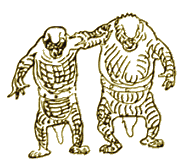
Edwin and Angelina are really most deserving and persevering entertainers of the knock-about or Two Macs order, with a strong dash of the Brothers Griffiths. Angelina is best on the horizontal bar, and it is here that she retreats when at feeding time she has a tit-bit to which Edwin may take an independent fancy. The whole cage is well adapted for the performances of the ratels, and, substantially made as it is, anybody is perfectly justified in calling it a ratel-trap affair.
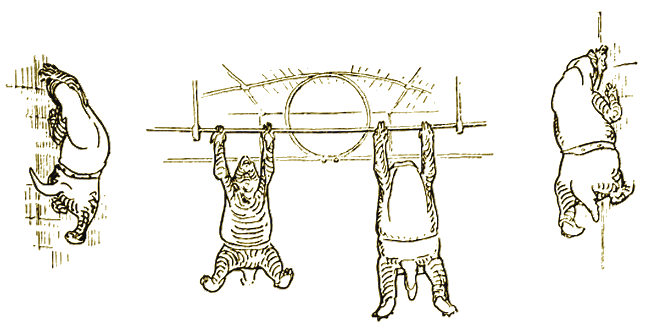
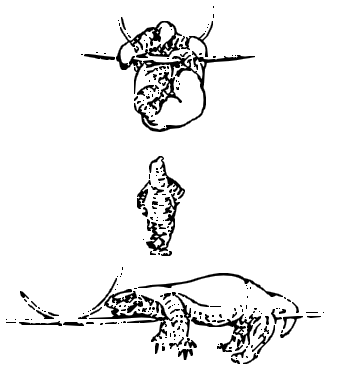
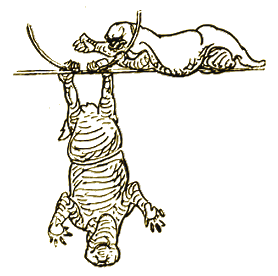
Edwin and Angelina much prefer their cage to liberty; at closed hours, when the keeper takes them out for a walk, they are inclined to crawl back behind the label that tells of their bites. They have a cement floor, so that they can no longer burrow underneath with a wild notion of coming out in some other part of the world, as they once did; and the drain is carefully covered in now, so that games of follow-my-leader therein, once their chief sport, are no longer practicable. But chiefly Edwin and Angelina live to revel in the pure delights of mutual assault and battery.

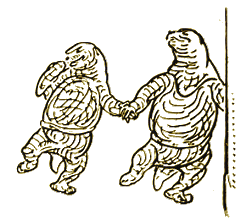
Never is Angelina so happy as when she is joyously gnawing her Edwin's head, while his attention is concentrated on a gleeful attempt to drag the hide off her back.
It is only from the inside of a skin as tough and elastic as the ratel's that tooth-and-nail combat can be properly enjoyed as a pastime. A ratel is just as fond of being bitten as of biting. It stimulates the healthy action of the skin, and doesn't hurt in the least. But a good hammering is also enjoyable. If Edwin and Angelina have been particularly good, no more acceptable reward can be offered them than the accidental leaving inside the cage of a pail. Then the devoted couple may fondle one another vigorously with that pail until it becomes a battered wisp of metal, and they feel bright and refreshed all over. Edwin and Angelina between them consume in a week sufficient personal violence to supply Cork political meetings for six months. With a little more hardening they might even come whole out of a football match.
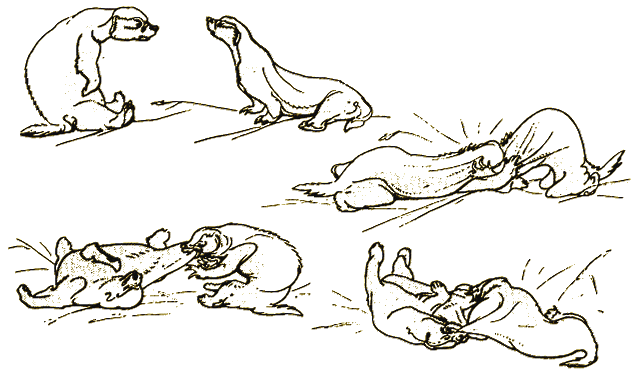
But even ratels have never ventured as far as football. A little infuriate devastation by way of amusement is all very well, but the ratel avoids extremes. Still, it is not easy to understand the necessity for that notice—"These animals bite." Nobody would think of disputing the fact.
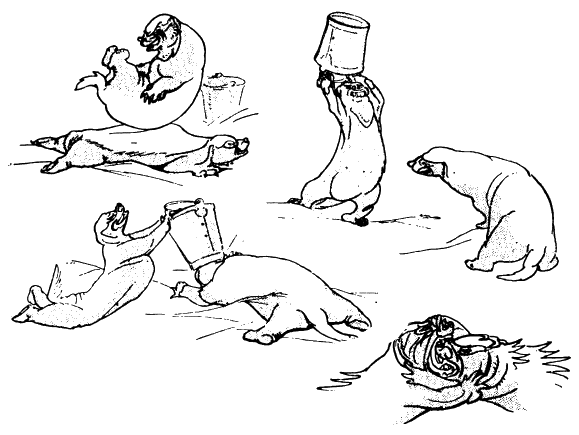

They are biting all the time, more legibly than you can paint it on a label. If only they ate all they bit, Edwin would have become Angelina by gradual absorption and Angelina Edwin, long ago; then they would have become absorbed back again, and which would be which by this time nobody but an analytical chemist could calculate.
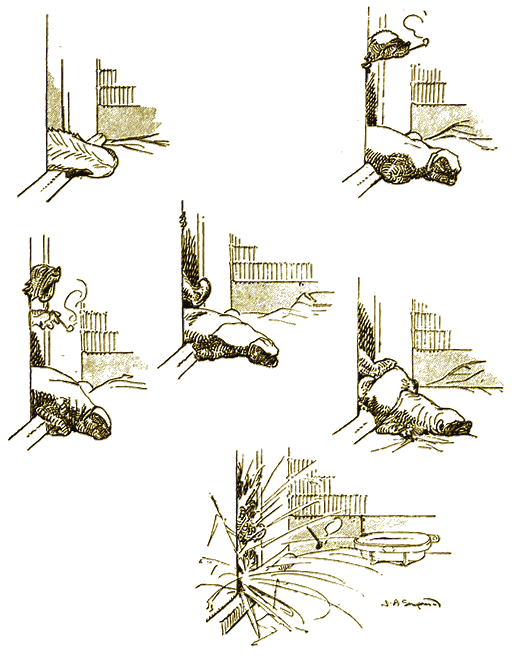
Indeed, I have a theory that the breed of ratels has been evolved out of certain quarrelsome seals, monkeys, and Malayan bears, who all ate each other up entirely, and then attacked a shopful of ladies' muffs subsequently blossoming out in the guise of a medley of all the various antagonistic elements, to perform gymnastics and Two-Mac riots for the amusement of visitors to the Zoo; enacting also at times the instructive little sketch of "Bill Slogins and the Missis; or the Door on the Jar and the Family Jar on the Doorstep."
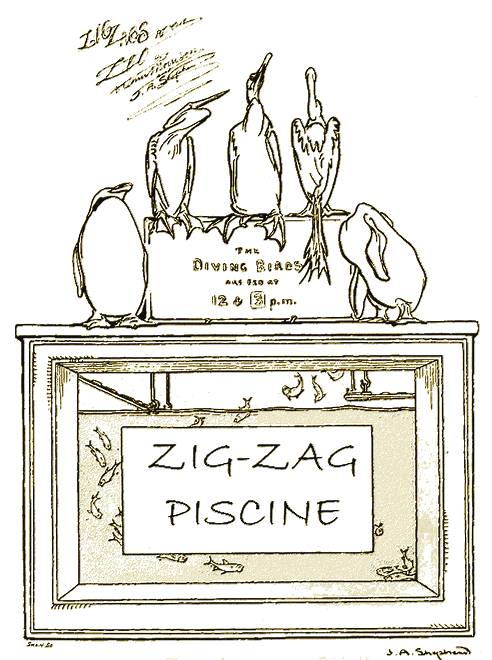
This is a Zig-Zag performed by Alice, one of the darters that live at the end of the fish-house—for it is in accordance with the general zig-zaggedness of things that the most popular residents in the fish-house are the birds. The diving birds are penguins, shags, and darters, and the darters are Jack and Alice. Many may remember the famous ballad beginning—
"Keeper may I go in to fish?"
"Oh, yes, my own fair darter!"
although probably they won't. The darter therein referred to is popularly supposed to have been Alice. It is probably because of her name that Alice had this remarkable dream, although Waterman (which is the name of the keeper—a man evidently born for the fish-house) thinks it was because of swallowing Jack's dinner as well as her own. Alice certainly had done very well—she always does—and was well disposed for sleep. Jack went quietly and respectably home to his cage, but Alice stayed on the diving-board, dozing. Waterman reached for her with the net, and for a moment aroused her senses by the display of a roach, but Alice remembered that she was loaded to the sinking-line already, and forbore. Waterman was called away, and Alice slept.
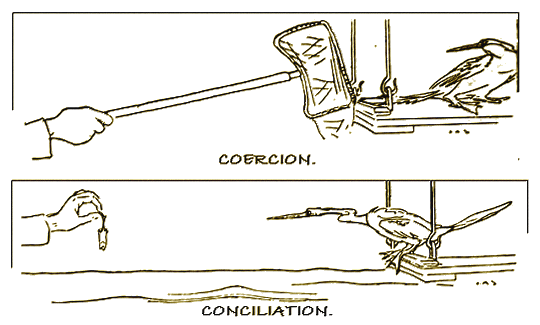
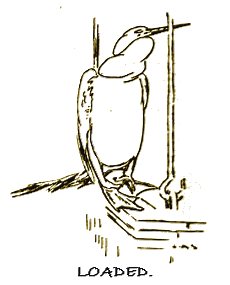
Now as Alice slept she dreamed. And it was this. In the water below her (where she knew she had left nothing living larger than the natural animalcula) there appeared, moving towards her, a double row of great phosphorescent fishy eyes. Then between each pair of steadily upturned eyes she saw, as is usual, a nose. Then below the nose a pale, ghastly, half-open mouth. It was shuddersome. Alice had never before seen any fish that she did not welcome gladly and take inside with promptitude. But these fish, all with their noses pointing upward and their unnaturally large eyes fixed upon her—these she knew at once, by instinct, were not to be eaten. There is no record, even in the transactions of the Psychical Research Society, of an edible ghost. These awful-eyed fish passed beneath the diving-board on which she stood, and, strangely enough, Alice could see their eyes as plainly after they had passed out of sight as before.
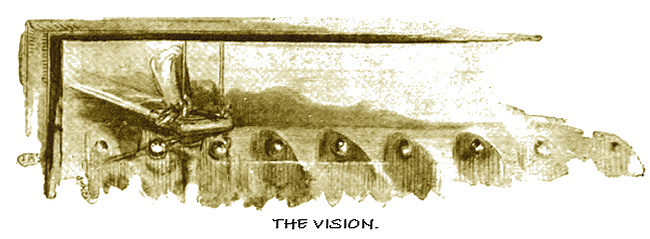
Then a weird, mysterious sound gathered about her, intensifying into a loud wail—the wail of many hundreds of fishy spirits repeating the words of the mystic inscription over the tank: "The diving birds are fed at twelve and three p.m."
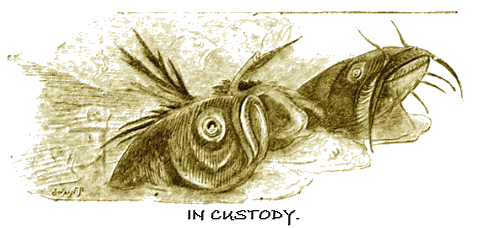
Thus was the case made plain to Alice. These were the avenging spirits—the phantoms of hundreds of fish eaten and forgotten; reproachful roach and minatory minnows. Alice could not speak—it would have been impossible to deny the charge if she could, for the words were painted on a board in such large letters that nobody could doubt their truth. Suddenly each wing was taken in a clammy but firm grasp, and a pair of greater eyes than ever appeared at each side of her. "You're wanted, young person," said a gruff voice at one side, and "Better come quietly!" said another, on the opposite side. "Never you mind wot for," pursued the first voice, as though Alice had asked, which she hadn't; "you'll find that out soon enough at the station." And "It's our dooty to warn you," added the second voice, "that anything you say 'll be took down as evidence ag'in you." "All right," Alice replied, with a conciliatory flutter, "I won't say anything." "Says she won't say anything," remarked the second voice, "take that down; it's important."
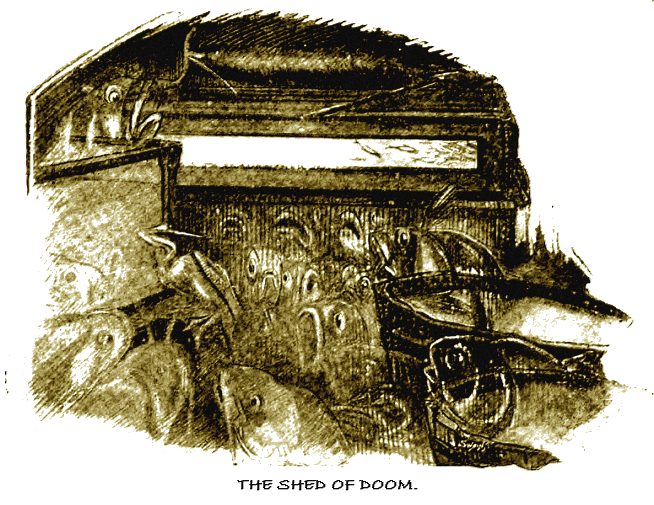
All this time they were moving serenely along through the glass, the frames of the cases and the walls of the house, into the black shed of doom at the back where none but keepers go and the fated fish that feed the diving birds. "You're remanded here," Alice's left-hand captor informed her, "till the sessions." "But I haven't been charged yet," protested Alice. "Charged? O' course not," returned the policeman—he was barbel—"we don't charge you nothing for this; but it's dry work here swimming through deal doors, and a drop o' something short now—" "Look here," said Alice, as an idea struck her, "can't this be squared?" "No," answered the barbel, gloomily, "you can't square a ghost, you know; everything drops through his pockets. That's the worst of being a ghost. Take down that she tried to square us," he added to his mate; "it's scandalous." Nothing was taken down, however, and Alice wondered whether either had been to one of the school of fish she had heard of. "Look here," said the barbel, "I know what you're thinking about—schools; board schools, because you used to board on them. Ah, you've been a bad darter. But you mustn't think. It isn't allowed."
Alice sat on the corner of the bench near the largest tank of fish and shuddered; for now there were more ghosts than ever, and one came close to her ear and made an awful pun about this being her last perch.
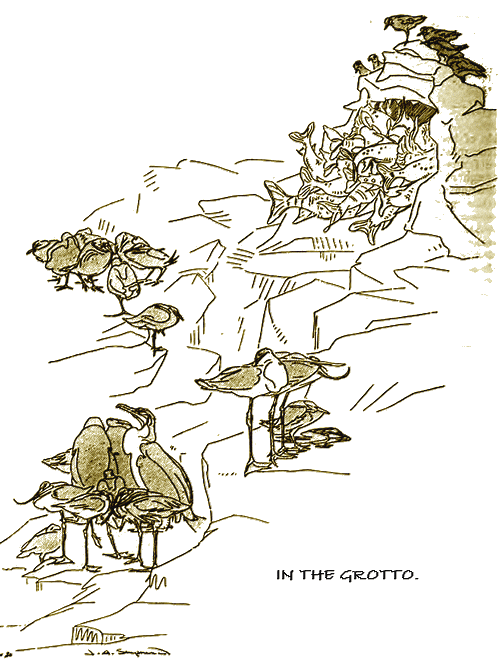
She had often wondered what was really the worst thing a ghost could do to anyone, and now she knew and trembled. Presently she was whisked up and rushed bodily through the walls again to the godwit's cage, where a public meeting of fish was taking place in a hole in the grotto. A good many birds were waiting about outside to hear the result of the meeting, which, it seemed, was all over except the election of the chairman, which had been forgotten at the beginning, and was now being settled by a raffle. Presently a fine trout came swimming down through the air. Alice recognised him at once as the largest trout in the tank near the door. "Halloa," said the trout, "you're the prisoner, aren't you? I'm the scene-shifter—always looking after the flies, you know. Never hear of trout-flies? See this scene shift." Immediately Alice felt her wings grasped again, and something pulled her feet backward from under her. She was blinded for a few seconds, during which she felt herself hurriedly dragged the length of the fish-house. When she was set upon her feet and looked about she found that the place was fitted as a court of justice. "Ah!" said the trout in her ear, "that's something like a system of scene-shifting; a little invention of my own. You shift the spectator—saves lots of trouble. System extensively adopted by the police."
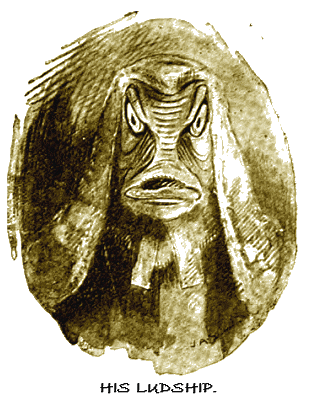
Alice was standing in the dock. One of the piker was judge—the big pike from the end tank. The jury were packed—very tightly—in a box on the left. Alice wondered whether it might put the Court in a good humour to refer to it casually as the sardine-box, but decided to save the idea for an emergency. The judge looked severely about him, and from time to time snapped his jaws sharply, at which all the jury jumped nervously. Presently the judge snapped very loudly and asked, "What's the charge?" At this the bullhead appeared dragging a board, which he displayed. It was the board from above the tank. On it were inscribed the words—"The Diving Birds are fed at twelve and three p.m." "Oh, that's the charge, is it?" said the judge in a loud voice. "And pray, sir, who are you?" "I'm the bullhead, me lud," replied that unfortunate, very frightened. "I am for the prosecution." "Then what do you mean, sir, by coming into court with no horns?" "Beg your pardon, me lud," quavered the bullhead, "but I've got none—none of us have." "What, no horns?" said the judge. "I humbly apologize," replied the bullhead, trembling all over. "Don't argue, sir," roared the judge, savagely "come to lunch with me!" At which invitation the unlucky bullhead fainted away, and all the other fish tried to look as if they thought it served him right.
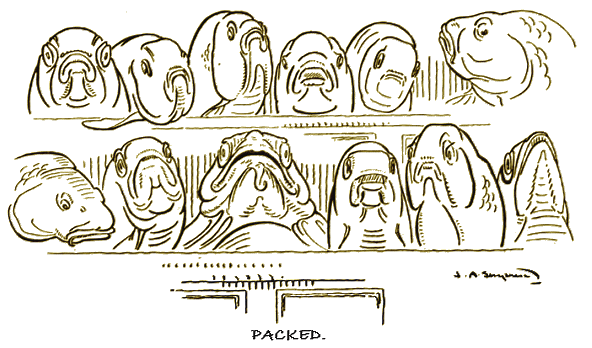
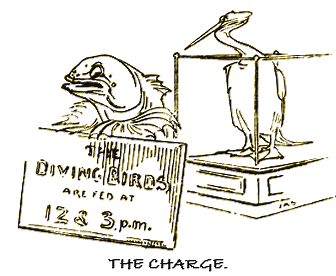
"Now there'll be no speech for the prosecution," said the judge, "and that'll save time. And there'll be nobody to call witnesses for the prosecution, and that'll save time too. There's too much of this dilatory legal formality, delaying meals. Where's the evidence of arrest?" At this a carp stepped into the witness-box. "Well, constable," asked the judge, "did you arrest the prisoner?" "No, yer ludship," said the carp. "Is that what you've come to prove?" "Yus, yer ludship," responded the carp. "Oh, I see," said the pike, "the plan will be to call everybody who didn't arrest her, so as to make quite sure of that first?" His lordship seemed amused.
"Jest so, yer ludship," answered the carp.
"That'll be rather slow," said the judge, "and I want my lunch soon. Would you like to come to lunch with me?" His lordship looked more amused than ever, but the carp turned pale and gasped. "Because, you know," the judge pursued, "if you wouldn't, you'd better say who did arrest the prisoner, and save time."
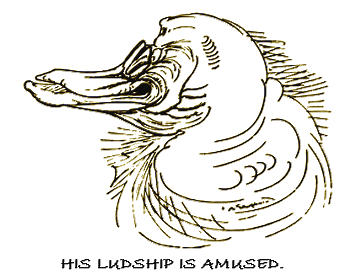
"Ghosts, me lud, ghosts!" ejaculated the carp; "we can't call 'em—they're ghosts. We can't call ghosts from the nasty deep, me lud." "No, no, of course not, my poor fellow," replied the judge, soothingly; "of course not. You're a most intelligent carp, and I'm delighted to have met you. Just come to lunch with me to-day, will you?"
At this the carp gave a despairing cry and fell out of the witness-box. "I wonder why they don't like lunching with the judge!" Alice thought. "Somebody's thinking in court," shouted the pike, excitedly. "I won't have it. The next person who thinks, I'll commit to my lunch for contempt of Court."
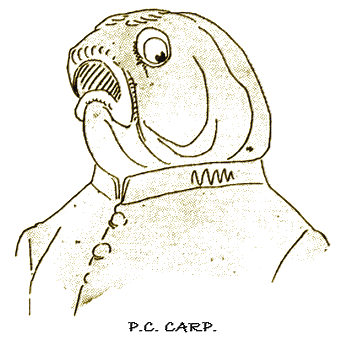
Then Alice thought she knew why nobody liked to be present at the judge's lunch. At this moment Mike, the penguin, came waddling into Court as fast as he could in a wig and gown and wiping his beak on his sleeve. "Hope I haven't kept the Court waiting, me lud," said Mike, "but I've only just been called to the bar. The barmaid said—" "Stop!" said the judge, "is the barmaid here?" "No, me lud, in the next pond—Spiers and Pond." The judge looked disappointed. "Ah! hum!" he said, "um—not here; well, who said she was? Proceed." "I appear in this case, me lud." "Well, who for?" asked the pike. "I don't care, me lud," said the penguin, "suppose we say the prisoner?" "All right," replied the pike, "be quick."
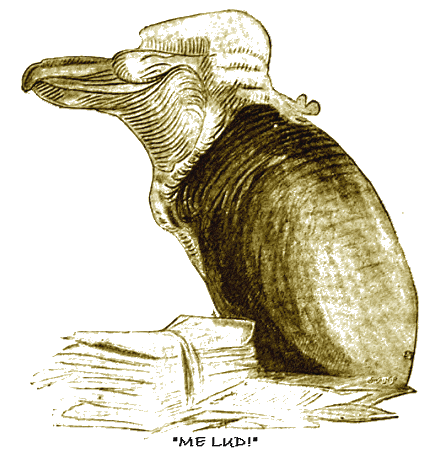
"Me lud," began Mike, with a bow, "and gentlemen of the jury," (with another) "in the whole course of my professional experience I have never approached any case whatever, having, unfortunately, been too frequently called to the bar. The barmaid always—but that is another story. Unaccustomed as I am to public-hou—I beg pardon—public speaking, I feel, me lud, that on this occasion if I failed to plead the cause of my unfortunate client with all my force and all my strength and all my power, that I—in fact, that I should not succeed in bringing these various qualities into requisition in this particular case. Me lud, my client is charged with being fed at twelve and three. I fail, me lud, to see the gravity of this charge. I am authorized to say that my client will gladly consent to be fed on as many more occasions as the Court may consider proper. As to the few trifling murders involved, that, my lud, I contend is a matter too small for the consideration of this Court. Murder, as we all know, is a small failing practised by the most honourable birds and fish every day. Even your ludship yourself has lunch. The same hand that ministers unto my unfortunate client at twelve and three provides lunch, me lud and gentlemen of the jury, for all of us. What! did you never see the keeper? Did you never hear of a jolly young Waterman? Me lud and gentlemen, you with darters—'erring darters, I may say—of your own, I—I throw myself upon—upon the nearest chair, and implore you to remember the temptation to which my client has been subjected, and how pleasant you would be fried yourselves."
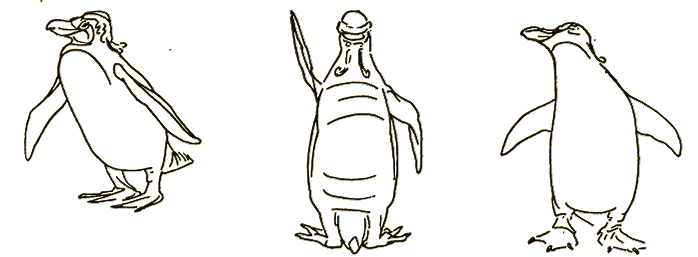


The penguin, pulling out an immense handkerchief, flung himself on a chair where the grey mullet had placed a bent pin. Rising again immediately, and dropping his handkerchief, the penguin put the grey mullet into his pocket and said: "Call the godwit."
The godwit hopped into the witness-box and stood on one leg. "Be careful, sir," said the pike, sternly. "Hold u your head, and don't stand on one leg. It's insolent!" The godwit immediately put down his other foot and straightened up. "I have heard," said the penguin, "of people coming into court without a leg to stand on." At this a gudgeon laughed, and was immediately taken into custody for the judge's lunch. "Now then, sir," said the judge to the godwit, "tell us what you know." "I don't know anything," said the godwit; "it saves so much trouble." "Did you ever see the prisoner committing murders at twelve and three?" asked the penguin. "No, never!" "Why was that?" "Because the centre tanks were in the way," answered the godwit, "and I couldn't see her at all." "There, me lud," cried the penguin, triumphantly; "here is an irreproachable witness who didn't see the crime; what do you ask more than that? Further, there is proof that he couldn't have seen it. I have any number of witnesses to testify the same thing. Call the avocet."
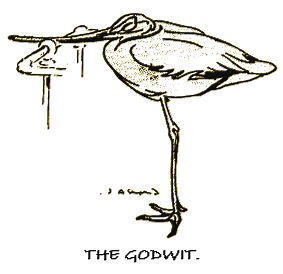
"Call the what?" said the usher, very loudly. He was deaf, and a flounder. "Call the what?"
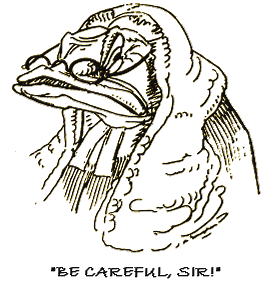
"Never mind," said the penguin. "That ain't what you said before," roared the usher; "don't you go playin' jokes on me." The avocet was already in the witness-box behind the usher, and while the penguin and the flounder shouted at one another the judge suddenly leaned over and snapped the witness up. He sank back in his chair placidly munching the avocet, while the jury, who had been attempting to unlock their box and sneak away before the pike's lunch-time, all stared with such hushed astonishment that the cod-sounds (the foreman was a cod) could be heard distinctly all over the court.
When at last the avocet's legs had finally vanished, the judge, leaning back complacently, said, "I don't think we'll wait for that witness; he seems to have disappeared. Hope nothing's happened to him."
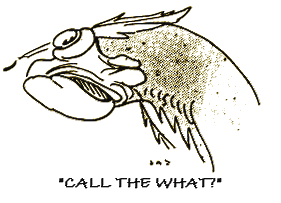
"Call the thunder-fish," said the penguin. Everybody drew aside and prepared to make way for something tremendous. "Here I am," said a very small voice in court, and a fish about four inches long wriggled shyly into the box. "Tell the jury what you know of the case," said the penguin.
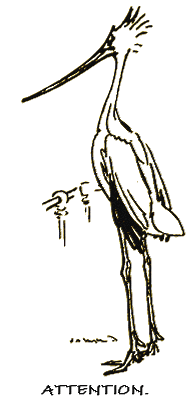
"The case? Oh, yes—the case," the thunder-fish replied, nervously; "it's a very good case, I'm sure. Glass sides and an iron frame; I've nothing to complain of in the case, except that sometimes one runs his nose against the glass without thinking. I have heard it called an aquarium. But, then—"
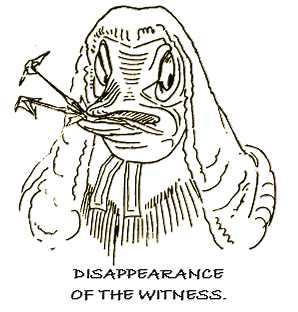
"What do they call you a thunder-fish for, you wretched tittlebat?" demanded the judge. "I don't know, I'm sure," answered the thunder-fish, meekly, "unless it's because it's easy to spell on the label; some ain't." "Oh!" said the pike, and swallowed the thunder-fish. "I was going to invite that witness to lunch with me," he went on, after a pause, "but I shan't now."
Bill, the shag, was called, and examined by the penguin. "How are you?" "Pretty bobbish." Here a voice from the gallery cried "Bobbish! why, you ain't got a bob in the world; you're only threepence an ounce."
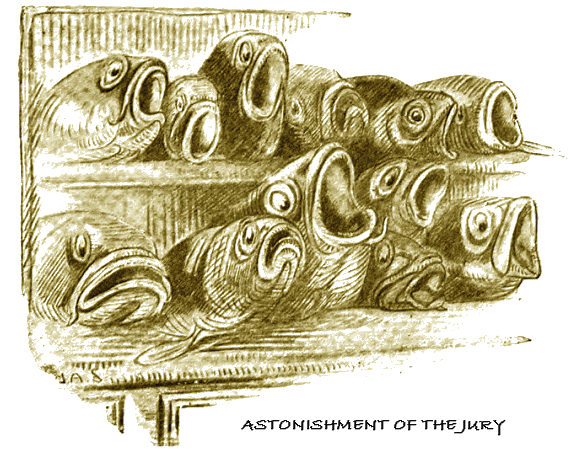
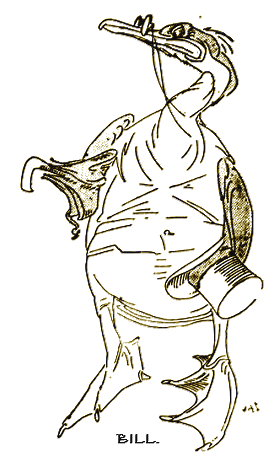
"Who is that person?" asked the judge, angrily. "That's the tittlebat," said the usher; "if I hadn't got both eyes on one side of my head, I shouldn't have seen him." "Here, come," protested the tittlebat, "you're not a whale, you know. I may be a tittlebat now, but I have been whitebait—shall be again soon." "Ah!" mumbled the flounder to himself, "sometimes I'm a sole!" "If it hadn't been the tittlebat," said the pike, "I'd invite him to lunch for his disrespect. But it's no use asking tittlebats to lunch—you're as hungry as ever afterwards. That's why he's impudent."
The penguin resumed the examination. "You are a diving bird of some experience yourself," he said. "Now tell me how often are you fed?" "Often?" replied the shag, with contempt; "it ain't often; it's only twice a day. Call that often?"
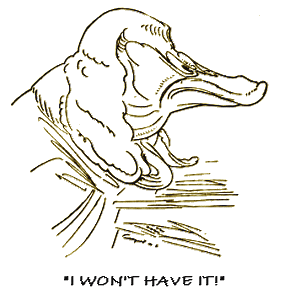
Here the judge interposed. "Let's have the verdict now," he said, "and then there will be more time for lunch. If this is a good witness you can call him some other time, you know—in another case." Then, turning to the jury, he snapped, "What's your verdict?"
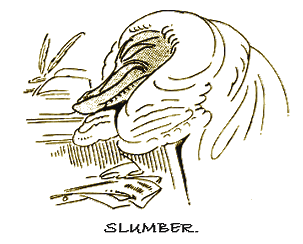
The jury trembled and tried to hide behind each other. "We—we'll think about it, me lud," said the foreman. "What!" cried the judge, excitedly; "think in this court? I won't have it—it's disrespectful. Anybody caught thinking will be committed to my lunch for contempt of Court. I won't have it." Whereupon he immediately fell asleep.
"Well, your ludship," said the foreman, "as we mustn't think, and there's only two notice-boards in the house, and one was used for the charge, we shall have to use the other for the verdict. 'Beware of Pickpockets,' me lud." But the pike snored on, and so did Alice.
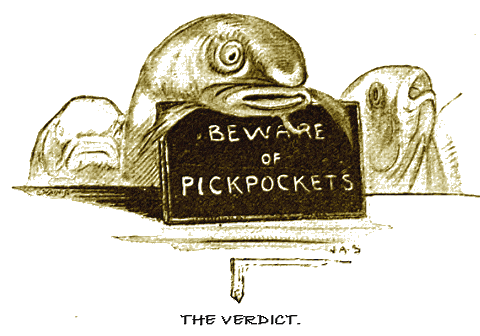
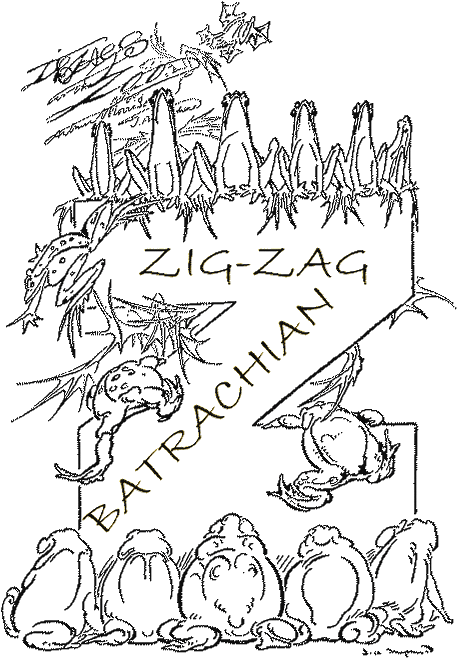
THE frog and the toad suffer, in this world of injustice, from a deprival of the respect and esteem that is certainly their due. In the case of the frog this may be due largely to the animal's headlong and harlequin-like character, but the toad is a steady personage, whose solemnity of deportment, not to speak of his stoutness, entitles him to high consideration in a world where grave dulness and personal circumference always attract reverence.
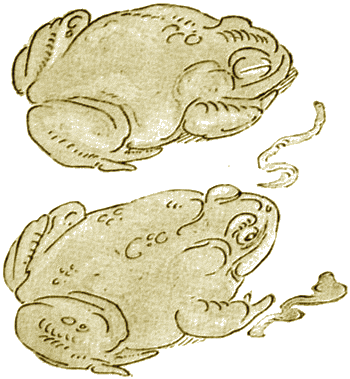
The opening lines of a certain famous poem have without a doubt done much to damage the dignity of the frog. "The frog he would a-wooing go" is not, perhaps, disrespectful, although flippant; but "whether his mother would let him or no" is a gross insult. Of course, it is a matter upon which no self-respecting frog ever consults his mother; but the absurd jingle is immortal, and the frog's dignity suffers by it. Then there is a certain pot-bellied smugness of appearance about the frog that provokes a smile in the irreverent. Still, the frog has received some consideration in his time. The great Homer himself did not disdain to sing the mighty battle of the frogs and mice; and Aristophanes gave the frogs a most important chorus in one of his comedies; moreover, calling the whole comedy "The Frogs," although he had his choice of title-names among many very notable characters—Aeschylus, Euripides, Bacchus, Pluto, Proserpine, and other leaders of society.
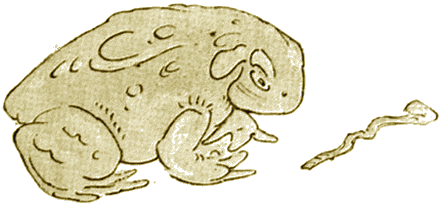
Still, in every way the frog and the toad are underesteemed—as though such a thing as a worthy family frog or an honourable toad of business were in Nature impossible. It is not as though they were useless. The frog's hind legs make an excellent dish for those who like it, as well as a joke for those who don't. Powdered toad held in the palm is a fine thing to stop the nose bleeding—or, at any rate, it was a couple of hundred years ago, according to a dear old almanac I have.
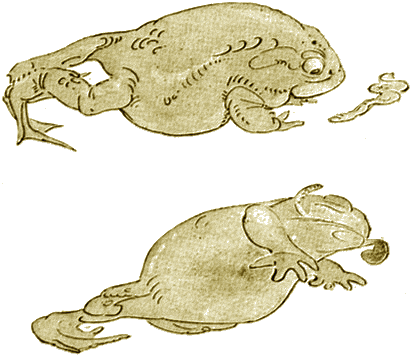
On the same unimpeachable authority I may fearlessly affirm a smashed frog—smashed on the proper saint's day—in conjunction with hair taken from a ram's forehead and a nail stolen from a piebald mare's shoe, to be a certain remedy for ague, worn in a little leather bag. If it fails it will be because the moon was in the wrong quarter, or the mare was not sufficiently piebald, or the nail was not stolen with sufficient dishonesty, or some mistake of that sort.
Personally, I am rather fond of frogs and toads. This, of course, in a strictly platonic sense, and entirely apart from dinner.
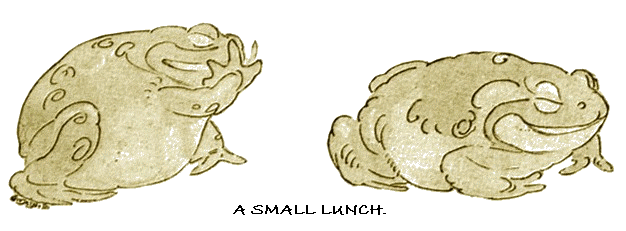
A toad I admire even more than a frog, because of his gentlemanly calm. He never rushes at his food ravenously, as do so many other creatures. Place a worm near him and you will see. He inspects the worm casually, first with one eye and then with the other, as who would say: "Luncheon? Certainly. Delighted, I'm sure." Then he sits placidly awhile, as though thinking of something else altogether. Presently he rises slightly on his feet and looks a little—very little—more attentively at the worm. "Oh, yes," he is saying—"luncheon, of course. Whenever you like, you know." And he becomes placid again, as though interested in the general conversation.
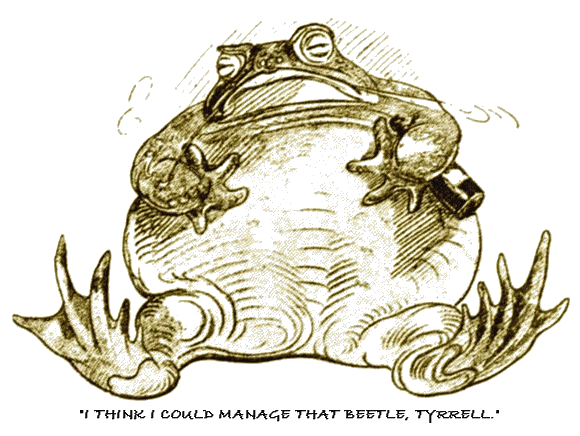
After a little he suddenly straightens his hind legs and bends down over the worm, like a man saying, "Ah, and what have we got here now? Oh, worm—ver au naturel—capital, capital!" After this there is nothing to do but to eat, and this the toad does without the smallest delay. For leisurely indifference, followed by a business-like grab, nothing can beat a toad. Almost before the cover is lifted, figuratively speaking, the worm's head and tail are wriggling, like a lively moustache, out of the sides of the toad's mouth.
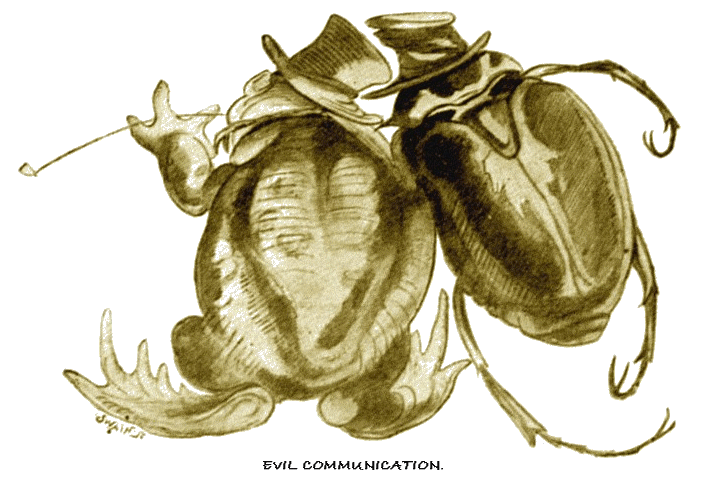
The head and tail he gently pats in with his hands, and there is no longer any worm; after which the toad smiles affably and comfortably, possibly meditating a liqueur. I have an especial regard for the giant toad in one of the cases against the inner wall of the reptile-house lobby. There is a pimpliness of countenance and a comfortable capaciousness of waistcoat about him that always make me wonder what he has done with his churchwarden and pewter. He has a serene, confidential, well-old-pal-how-are-you way of regarding Tyrrell, his keeper. Of late (for some few months, that is) the giant toad has been turning something over in his mind, as one may perceive from his cogitative demeanour. He is thinking, I am convinced, of the new Goliath Beetle. The Goliath Beetle, he is thinking, would make rather a fit supper for the Giant Toad. This because he has never seen the beetle. His mind might be set at rest by an introduction to Goliath, but the acquaintanceship would do no good to the beetle's morals. At present Goliath is a most exemplary vegetarian and tea-drinker, but evil communications with that pimply, dissipated toad would wreck his principles.
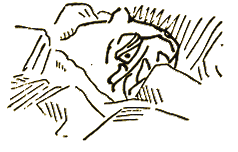
Why one should speak of the Adorned Ceratophrys when the thing might just as well be called the Barking Frog, I don't know.
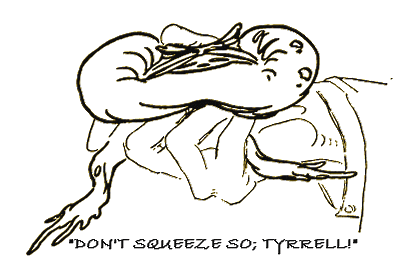
Let us compromise and call him the Adorned C., in the manner of Mr. Wemmick. I respect the Adorned C. almost as much as if he were a toad instead of a frog, but chiefly I admire his mouth. A crocodile has a very respectable mouth—when it separates its jaws it opens its head. But when the Adorned C. smiles he opens out his entire anatomical bag of tricks— comes as near bisecting himself indeed as may be; opens, in short, like a Gladstone bag.
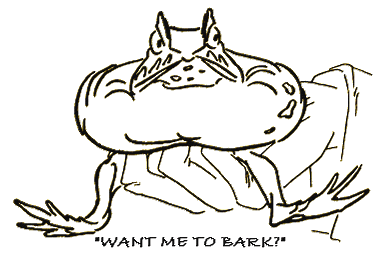
From a fat person, of course, you expect a broad, genial smile; but you are doubly gratified when you find it extending all round him. That, you feel, is indeed no end of a smile—and that is the smile of the Adorned C.
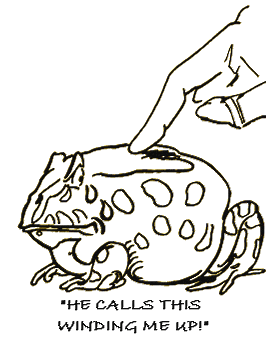
But, notwithstanding this smile, the Adorned C. is short of temper. Indeed, you may only make him bark by practising upon this fact. Tyrrell's private performance with the Adorned C. is one that irresistibly reminds the spectator of Lieutenant Cole's with his figures, and would scarcely be improved by ventriloquism itself.
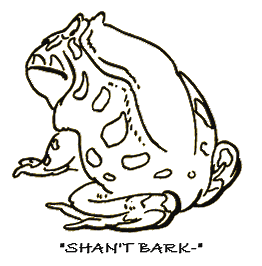
The Adorned C. prefers biting to barking, and his bite is worse than his bark—bites always are, except in the proverb. This is why Tyrrell holds the Adorned C. pretty tight whenever he touches him. The one aspiration of the Adorned C. is for a quiet life, and he defends his aspiration with bites and barks. Tyrrell touches him gently, cautiously, and repeatedly on the back until the annoyance is no longer to be tolerated, and then the Adorned C. duly barks like a terrier. Now, the most interesting thing about the Adorned C., after his mouth, is his bark, and why he should be reluctant to exhibit it except under pressure of irritation—why he should hide his light under a bushel of ill-temper—I can't conceive.
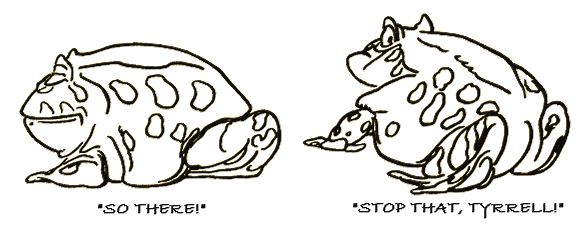
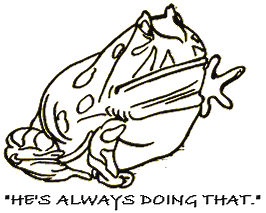
It is as though Patti wouldn't sing till her manager threw an egg at her, or as though Sir Frederick Leighton would only paint a picture after Mr. Whistler had broken his studio windows with a brick. Even the whistling oyster of London tradition would perform without requiring a preliminary insult or personal assault.
But let us account everything good if possible; perhaps the Adorned C. only suffers from a modest dislike for vain display; although this is scarcely consistent with the internal exhibition afforded by his smile.
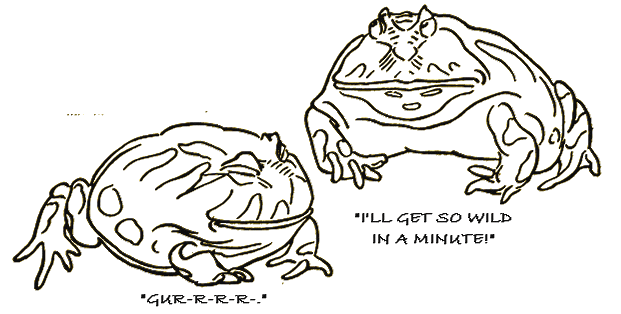
With the distinction of residence in the main court of the reptile-house itself, as also with the knowledge of its rarity, the Smooth-clawed Frog sets no small value on himself.
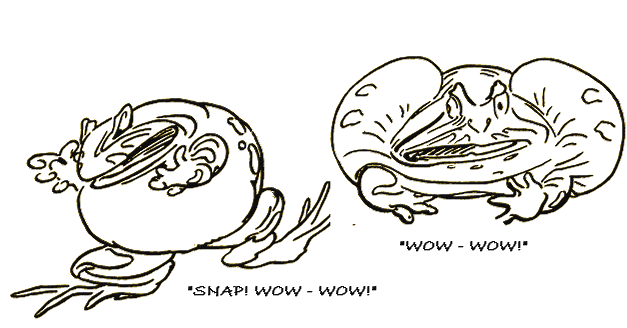
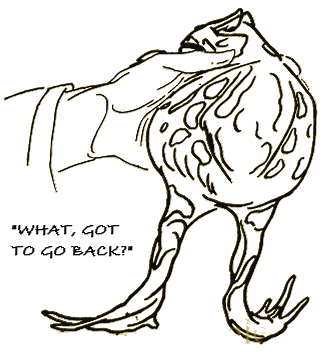
He lives in water perpetually, and is always bobbing mysteriously about in it with his four-fingered hands spread out before him. This seems to me to be nothing but a vulgar manifestation of the Smooth-clawed Frog's self-appreciation. He is like a coster conducting a Dutch auction, except that it is himself that he puts up for the bids of admiring visitors.
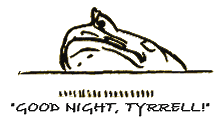
With his double bunch of four fingers held eagerly before him he says—or means to say—"'Ere—eight! Ain't that cheap enough? Eight! Going at eight. Who says eight? Now then—eight; for a noble frog like me!" Presently, he wriggles a little in the water, as though vexed at the slackness of offers; then he drops one of the hands and leaves the other outstretched. "'Ere—four! Anythink to do business. Four! Nobody say four? Oh, blow this!" and with a jerk of one long paddle he dives among the weeds. "Them shiny-lookin' swells ain't got no money!" is what I am convinced he reports to his friends.
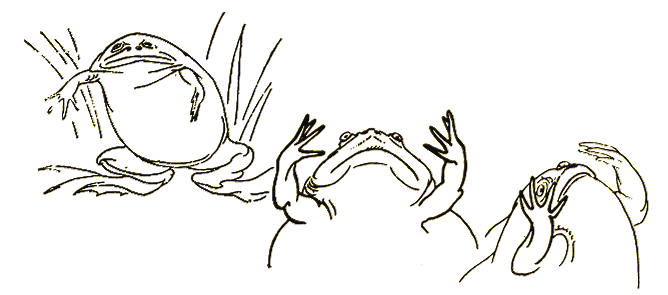
The Smooth-clawed Frog has lately begun to breed here, a thing before unknown; so that his rarity and value are in danger of depreciation.
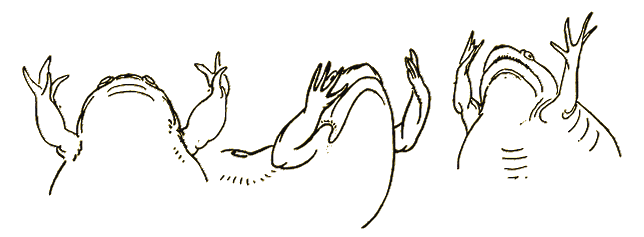
But such is his inordinate conceit of himself that I am convinced he will always begin the bidding with eight.
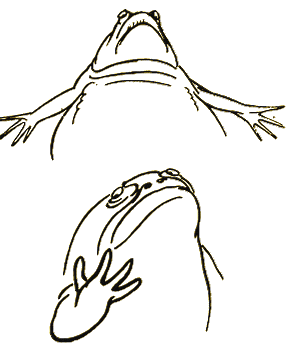
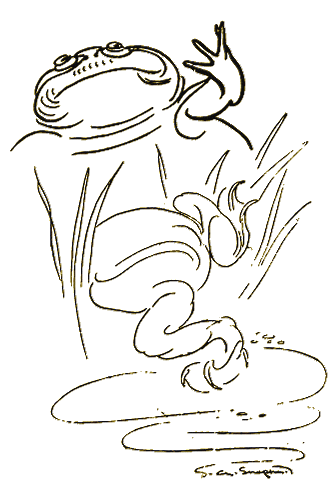
If you rejoice in the sight of a really happy, contented frog, you should stand long before White's Green Frog, and study his smile. No other frog has a smile like this; some are wider, perhaps, but that is nothing. A frog is ordained by Nature to smile much, but the smile seems commonly one of hunger merely, though often one of stomach-ache. White's Green Frog smiles broad content and placid felicity. Maintained in comfort, with no necessity to earn his living, this is probably natural; still, the bison enjoys the same advantages, although nobody ever saw him smile; but, then, an animal soon to become extinct can scarcely be expected to smile.
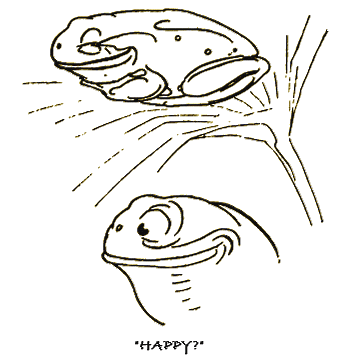
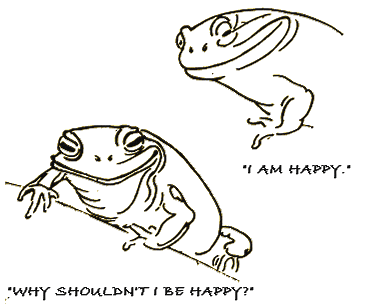
In the smile of White's Green Frog, however, I fear, a certain smug, Pecksniffian quality is visible. "I am a Numble individual, my Christian friends," he seems to say, "and my wants, which are few and simple, are providentially supplied. Therefore, I am Truly Happy.
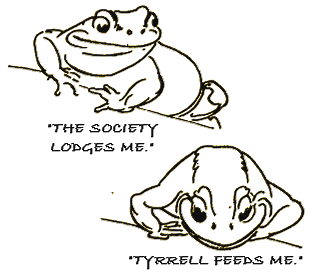
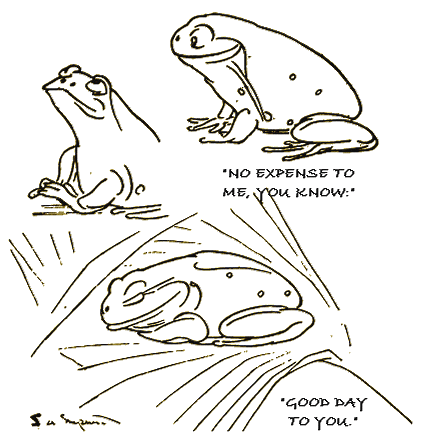
It is no great merit in my merely batrachian nature that I am Truly Happy; a cheerful countenance, my friends, is a duty imposed on me by an indulgent Providence." White's Green Frog may, however, be in reality a frog of excellent moral worth: and I trust that Green's White Frog, if ever he is discovered, will be a moral frog too.
By-the-bye, some green frogs are blue. That is to say, individuals of the green species have been found of the skyey colour and sold at a good price as rarities. When it was not easy to find one already blue, the prudent tradesman kept a green frog in a blue glass vase for a few weeks, and brought it out as blue as you might wish.

The colour stayed long enough, as a rule, to admit of sale at a decent price, but was liable to fade after.
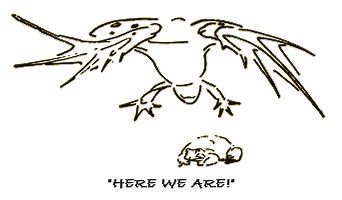
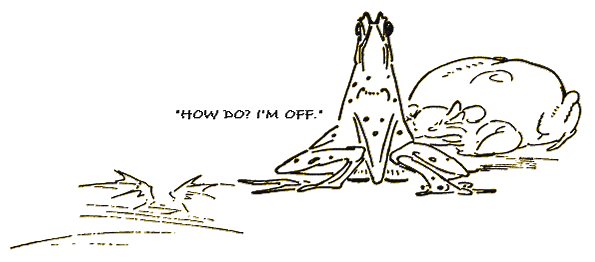
As I think I have said, the toad is distinguished by a placid calm denied to the frog; therefore it is singular that the ordinary toad's Latin name should be Bufo vulgaris—a name suggestive of nothing so much as a low—disgracefully low—comedian. Bufo vulgaris should be the name of a very inferior, rowdy clown. The frog is a much nearer approximation to this character than the toad. The frog comes headlong with a bound, a bunch of legs and arms, with his "Here we are again! Fine day to-morrow, wasn't it?" and goes off with another bound, before the toad, who is gravely analyzing the metaphysical aspect of nothing in particular, can open his eyes to look up.
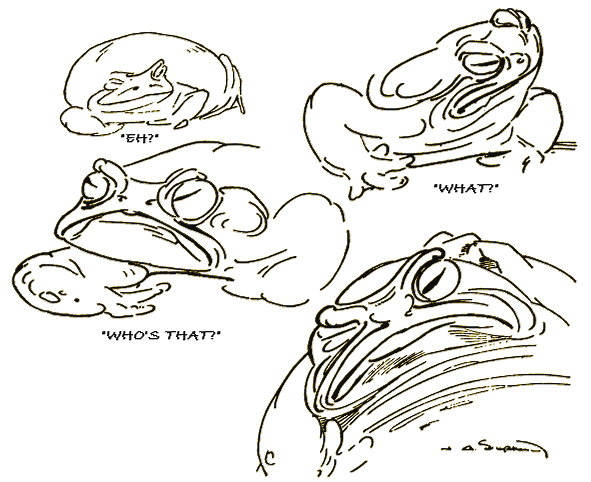
The toad has one comic act, however, of infinitely greater humour than the bouncing buffooneries of the frog. When the toad casts his skin he quietly rolls it up over his back and head, just as a man skins off a close-fitting jersey. Once having drawn it well over his nose, however, he immediately proceeds to cram it down his throat with both hands, and so it finally disappears. Now, this is a performance of genuine and grotesque humour, which it is worth keeping a toad to see.
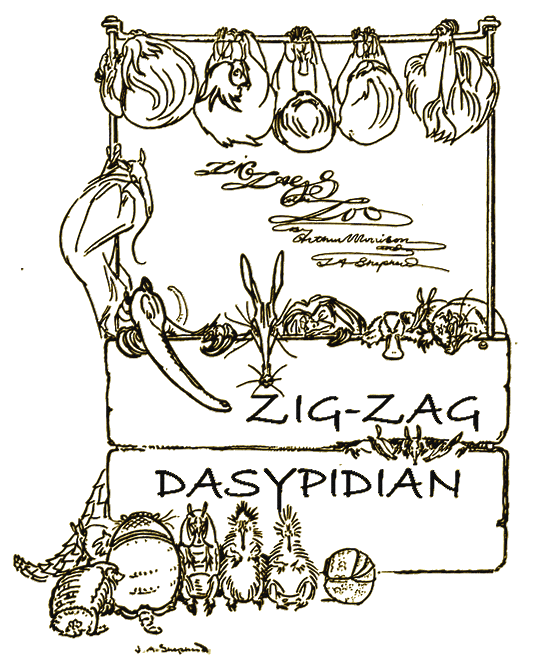
THE DASYPIDAE are not such fearful wild-fowl as their name may seem to indicate; for the name Dasypus is nothing but the scientific naturalist's innocent little Greek way of saying "hairy-foot." The Sloth, the Scaly Manis, the Armadillo, the Platypus, the Aard-Vark, the Anteater, and one or two more comprise the family, presenting the appearance of a job-lot of odds and ends at the tail of an auctioneer's catalogue. Not only is the family of a job-lot nature, but each individual seems a sort of haphazard assemblage of odd parts made up together to save wasting the pieces; for some have tremendous tails, and some have almost none; some have armour and some have hair; one has an odd beak, apparently discarded by a duck as awkwardly shaped; some have two toes only on a foot, some three, some four, and some five—just as luck might have it in the scramble, so to speak; they only agree in being all very hard up for teeth.
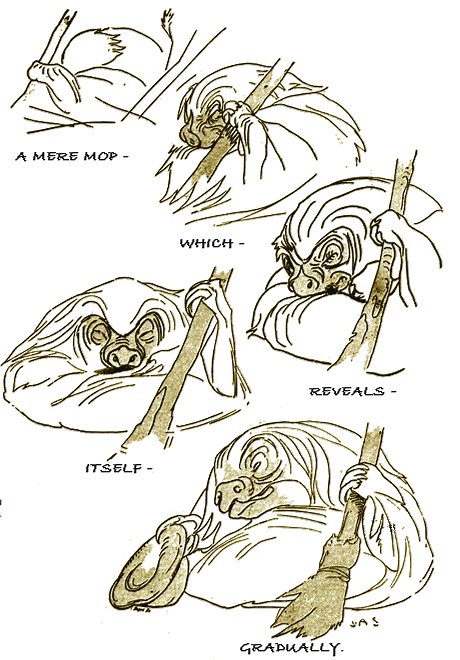
The sloth is an admirable creature in many respects. Chiefly, he has a glorious gift of inaction—a thing too little esteemed and insufficiently cultivated in these times. If it is sweet to do nothing, as we have it on the unimpeachable authority of a proverb, therefore it must be actually noble to do nothing on scientific principles, as does the sloth.
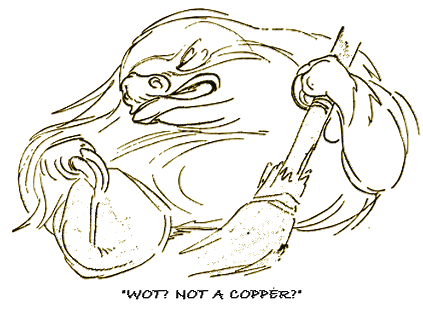
The objectionably moral and energetic class of philosopher is always ready to enlist the ant, the bee, and similarly absurdly busy creatures as practical sermons on his side; and that the indolent Philosopher has never retaliated with the sloth is due merely to the fact that he is indolent, practically as well as theoretically. Yet the sloth has well-esteemed relations. Consider other proverbs. "Sloth," says one, "is the mother of necessity." Then another. "Necessity," says this second, "is the mother of invention." Whence it plainly follows that sloth is invention's grandmother—although nobody would think it to look at the sloth here, in house number forty-seven.
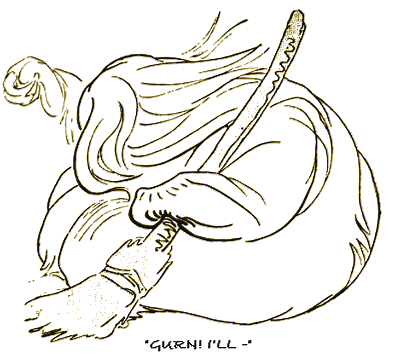
Now there are persons who attempt to deprive the sloth of the credit due to his laziness by explaining that his limbs are not adapted for use on the ground. This is a fact, although it is mean to use it to discredit so fine a reputation. The sloth is indeed a deal more active when he is hanging upside down by his toes—but then that is all a part of his system, since it is plain that his greatest state of activity is merely one of suspended animation. It is only when he is in a state of suspense that the sloth is really happy, and this is only one aspect of the topsy-turviness of his entire nature. Hanging horizontally, head and tail downward, is his normal position in society, and this is apt to lead to a belief among the unthinking that he must have lived long in Australia and there become thoroughly used to holding on to the world in his usual attitude; but his actual home is Central and South America—not altogether "down under," but merely on the slope.
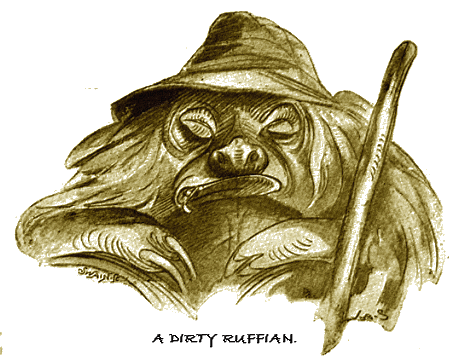
The sloth in this place is, in the eyes of most visitors, a mere mop in a heap of straw. Let but the keeper stir him up and he reveals himself gradually, the picture of a ragged, rascally mendicant—a dirty ruffian whose vocation can be nothing more laborious than extorting coppers on pretence of sweeping a crossing. A little more stirring, and he will reach for his perch and invert himself, to think things over. To him the floor is inconvenient, for it is his ceiling; anybody's ceiling is inconvenient to crawl about on.
When one knows that the sloth never drinks, one is prepared to believe that he persistently refuses to stand; but then nobody can stand anything, even drinks, on a ceiling.
If by any chance he finds himself on the ceiling (which, as I have said, is his word for floor), he can only hook his claws wherever he sees a hole, and drag himself. He is the poorest of all the Dasypidae in the matter of tail, and was also unfortunate in the allotment of toes, only wearing two on each fore-foot. Which disposes of the sloth.
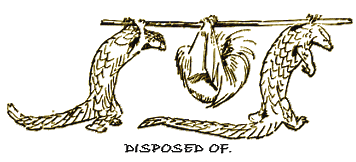
Of the Dasypidae there are only, beside the sloth, various armadillos and an ant-eater in this place. The armadillo is a placid creature, with none of the warlike disposition that its armour might lead some to expect. Mild and placable, as well as rather bashful, it has somewhat the character of a beplated and armed theatrical super, who play the flute and teaches in a Sunday-school when off duty. It is susceptible to cold, too, and regardless of any heroism of appearance in face of a chill in the air. Withal the armadillo is indifferent alike to flattery and abuse: you can no more hurt his feelings than his back.
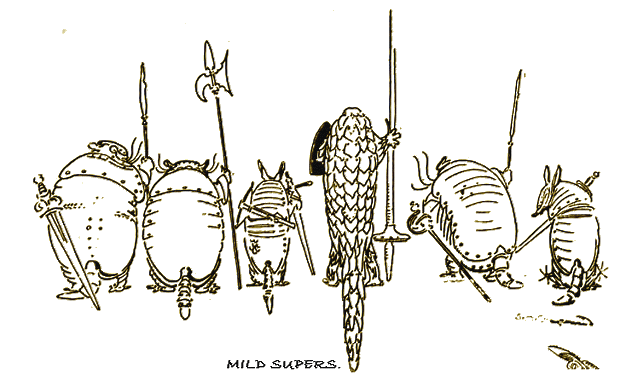
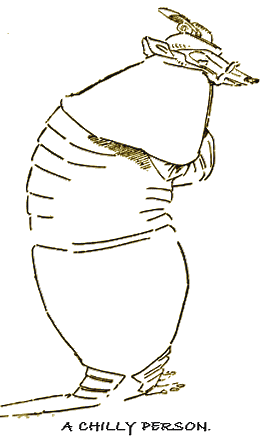
There are several sorts of armadillo here, but all are equally indifferent to criticism. Nothing is more impervious to criticism (or anything else, if you come to that) than an armadillo. He should have been born a minor poet. An oyster appears to care very little for what is said of him, but a good deal of his indifference is assumed; you often catch him opening his shell to listen. The armadillo won't open his shell for anything—figuratively as well as literally speaking.
If a raging mad jaguar prances up to an armadillo, the armadillo curls up quietly with an expression that says: "Really, you excite yourself overmuch; I suppose you want to gnaw me. If you expect to eat me, after your length of experience, you must be—well, rather a fool, if I may say so. I shall go to sleep," which he does, while the jaguar ruins his teeth.
Naturalists have marvelled at the fact that native Paraguayans find whether an armadillo is at home by poking a stick into his burrow, when (if he is) out comes a swarm of mosquitoes. "What," they ask, wonderingly, "can mosquitoes want with an armadillo, when other things not quite so hopeless are near at hand for biting?" But it is probably a mosquito championship meeting.
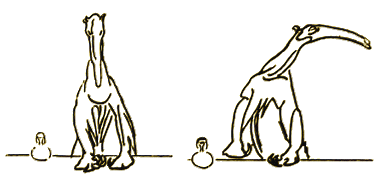
The sloth, sluggard as he is, has not gone to the ant, but to the ant-eater; that is to ay, his cage is not far from Sukey's here. Sukey is not a wise person. Nobody anxious to be an orator with so little talent for it can be wise. When first you enter the room you observe that Sukey is anxious to address a large meeting.
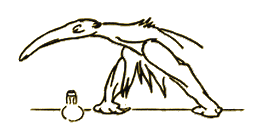
She has a ledge before her, on which she rests her fore-knuckles in a manner so extremely suggestive of a lecture that you instinctively look for the customary carafe and glass, and feel perplexed at their absence. Regardless of this disadvantage, Sukey will turn this way and that, and thump alternately with one fist and the other, and even, in the excitement of her eloquence, bounce bodily upon the ledge before her, as one has heard of a gymnastic American divine doing in his pulpit.

This will the voiceless Sukey do till public indifference disgusts her, and she flops heavily back on her knuckles into hinder retirement. But no failure can stifle her ambition, whether it be actually for oratorical distinction, as appearances indicate, or only for such cockroaches as you may choose to offer her, as the keeper believes.
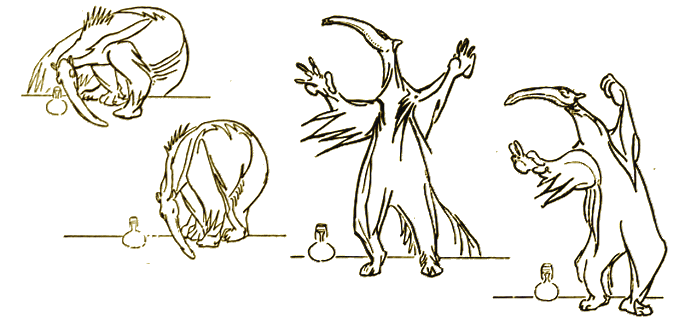
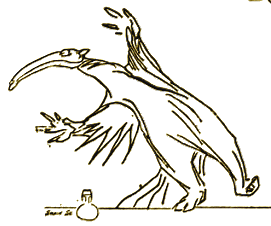
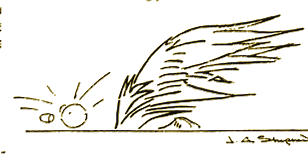
Sukey is not an impressive person—her features are against it. She is not equal to assuming a presence. With all her wealth of nose, she can't turn it up at anybody. Her sneer is a wretched failure. Any attempt at an imposing attitude is worse; a large nose of a sort is often a noble feature of itself; but a nose like this!...Sukey's extravagance in nose is paid for by a scarcity of mouth. Her small mouth may be a loveliness in itself, but it will never allow Sukey a sneer or a smile—let alone a laugh; it condemns her to perpetual prunes and prism, so that Sukey may neither impress you by a haughty presence, nor sneer at you, nor laugh at you; one thing only remains—and it is a low expedient—she can put out her tongue at you—by the yard.
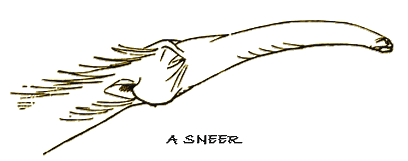
I have often speculated as to how much of this tongue Sukey really has stowed away inside her, and what would happen if she let it all out at once. It would probably get entangled with everything and with itself, like a ball of string cast loose, and Mansbridge (who is Sukey's keeper) would spend an afternoon unfastening all the knots.
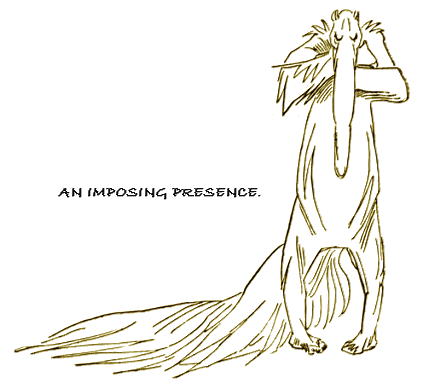
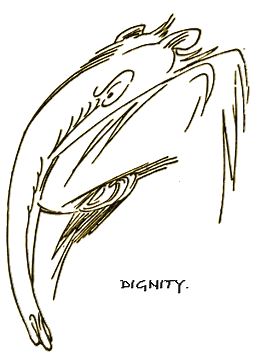
One has to see Sukey many times before the lineal possibilities of her tongue begin to dawn on one. See her once or twice only, and she may only exhibit a mere foot or so of it—possibly only eight or ten inches. Another time she will let out a foot or eighteen inches more, and you are rather surprised; still your belief is unshaken that there is another end to that tongue somewhere. But when, some time later, she casually releases another yard or two, beyond the few feet wherewith you are familiar, with an aspect of keeping miles more in reserve, you abandon the doctrine of the finiteness of things earthly as mere scientific superstition.
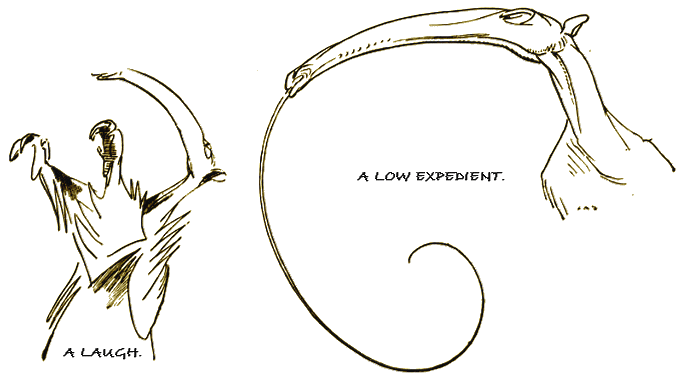
Plainly, I don't believe there is any other end to Sukey's tongue. It has the redeeming feature, however, of possessing one end, which anybody may see; and as there is an end to Sukey's tongue we won't be too hard on her, remembering that there have been Sukeys—well, differently provided for.
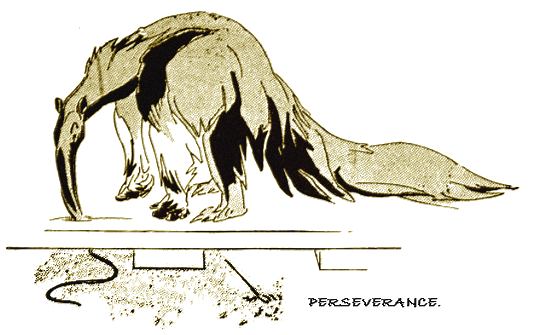
Sukey's tongue is a sticky thing, and she waves it about with a view of eating any unfortunate insect that may adhere to it, on the catch-'em-alive-oh principle. Her chiefest tit-bit is a cockroach, and, as you will perceive from her manner as you make her acquaintance, it is a firm article of Sukey's belief that visitors carry these interesting insects about with them, in large quantities.
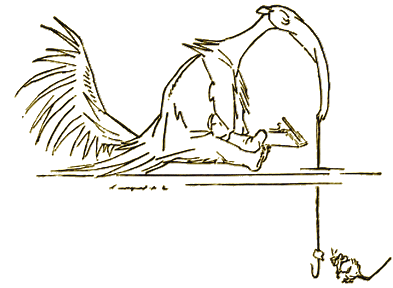
When one remembers how comparatively unfashionable this practice is, one can understand that Sukey largely lives the life of a disappointed creature. By way of a great feast, she will sometimes be given a mouse; and she fishes perseveringly through such odd cracks and holes as she may find, in hopes of providing such a feast for herself. I respectfully suggest baiting the end of her tongue with a piece of cheese. As it is, I fear her catch of mice is scarcely sufficient to warrant the importation of the ant-eater as a substitute for the harmless necessary (but usually more harmful than necessary) Tom-cat of the garden-wall.

The ant-eater is not a prepossessing being, Anybody who had never before seen or heard of him would readily believe him to be an inhabitant of the moon. He looks the sort of animal one would invent in a nightmare; his comparatively sober colours and his bushy tail save him from being an absolute unearthly horror. Conceive, if you can, a pink ant-eater with blue spots and a forked tail!
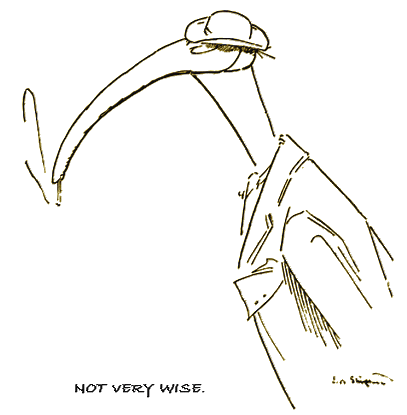
Neither is the ant-eater very wise; nothing with so much tongue is very wise; and the ant-eater uses up so much of its head-stuff on its nose that nothing is left for the brain. The ant-eater never cuts his wisdom teeth, because he never has any teeth at all. Really the ant-eater scarcely seems a respectable character, considered altogether. An animal with more than a foot of slender nose, expressly used for poking into other people's concerns (the ants'), an immeasurable tongue, no use for a tooth-brush, and an irregular longing for cockroaches for lunch—well, is such an animal quite respectable? Would you, for instance, tolerate him in your club?
The only fairly respectable member of the Dasypidae is the armadillo—unless you count the sloth's scientific indolence a claim to respectability; I rather think it is. But none of the Dasypidae are clever—not one. They are all in the lowest form of the mammalian school, and whenever one is not at the bottom of the form it is because another already occupies the place. You will commonly find them placed last of the mammalia in the first book of natural history you look at.
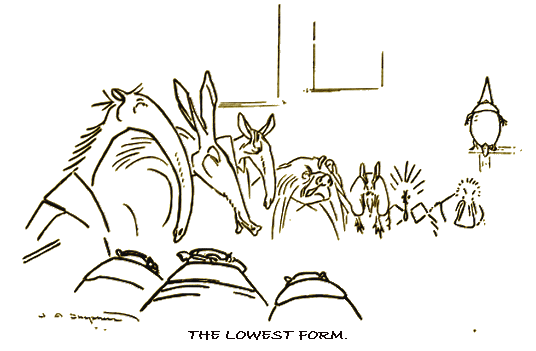
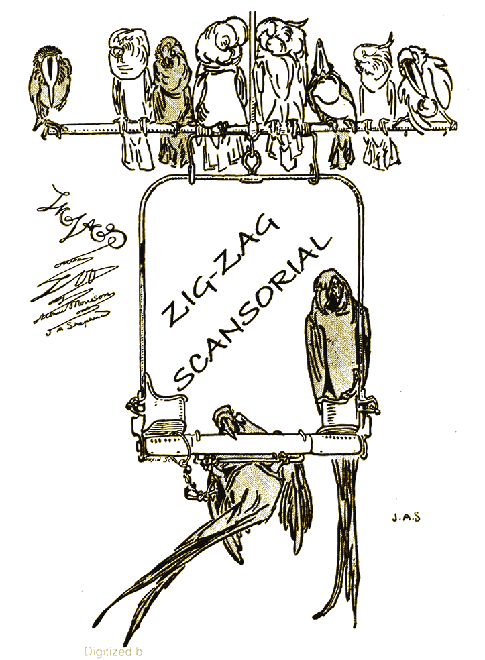
NOW, a "scansorial zigzag" may be interpreted to mean a graded path up a cliff—does mean it, in fact, if you like to use the phrase in that sense. I don't. Scansores are climbing birds—toucans, parrots, parrakeets, cockatoos, macaws, lories, and woodpeckers. In the house numbered 54 and 55 on the plan of the Gardens (having two numbers for no particular reason except that one would be quite enough), all these birds are represented except the woodpecker. The wood-pecker is also excluded from this zigzag for similar reasons, which I can't remember at this moment. One may be the fact of the woodpecker tapping, whereas all taps is vanities.

A toucan is a beak, fitted with an inadequate bird at the hinder end. It is over against the wall, opposite the front door of 54 and 55, that one recognises the fine Roman nose of the toucan. A green nose, a red nose, a yellow nose, a black nose, all these colours you may see, but all nobly Roman as to shape. The toucan will not talk in the manner of the parrot, but he (or she) is an admirable listener. I have told the green-billed toucan many stories of bird-scandal without interruption, and, on the whole, the conversation has been most improving. "Dear, dear!"—"Really, now"—"Who'd have thought it?"—"No—o—o—o! You don't really say so? Well, you do surprise me!" These are the only contributions offered to the talk by the green-billed toucan, and even these are only in pantomime. An ideal listener, the toucan. I have a horrible temptation to say that toucan play at that game, and that if you are anxious not to be toucandid, you toucan say nothing, and the bird will listen just as respectfully; but a pious bringing-up enables me to cast the temptation from me—toucancel the inclination, in fact. Howbeit, the truth remains that the toucan will listen with perfect attention whether you proffer information aloud or get no further than inventing it.
The toucan will chatter horribly in native freedom, but that is only when many hundreds of other toucans are present to keep it in countenance; for the toucan's voice is not pretty, and he knows it. Still, when hundreds assemble, every one with a discordant voice, nothing is more natural than that they should all shout at once, and unite in the belief that the performance is admirable. If there were any ugly women (there are not, of course—it is a mere hypothesis), and they were all collected together to the number of many hundreds on a solitary island, the first thing they would do would be to hold a beauty show with a prize for everybody, and next they would fight over the distribution of those prizes. The toucans do something very much like this—minus the fighting, because the prize is mutual admiration. They chatter and scream in their hundreds—taking care to leave a sentinel on guard, because other animals won't stand anything, even in South America—and at intervals they all join in a simultaneous yell of approbation, audible half a league off.
The whole performance is a sad piece of humbug, which makes one marvel greatly that because of it the South American natives call the toucan the Preacher-bird. Here, with so many gorgeous parrots and macaws about, the toucan behaves with becoming modesty, but in the presence of any duller-clad bird than itself its arrogance is frightful. A great crowd of toucans will mob any such unfortunate creature with much chatter, till, surrounded by long and threatening bills, like a despairing debtor, he "hops the twig"—if he can.
Perhaps the most dissipated-looking creature in the animal kingdom is a toucan during a bad moult. You long to give him a gallon of soda-water and a temperance tract. He sleeps much (a toucan always sleeps with his beak over his shoulder and covered by his wing—he doesn't mean to have that nose stolen)—he sleeps as much as possible, and wakes as seedy as one can imagine.

He can scarcely drag his beak off his back without banging it on his perch, and considers the question of breakfast with a shudder. With many blinks he strives desperately to pull himself together—to pull together a handful of loose quills and a beak.
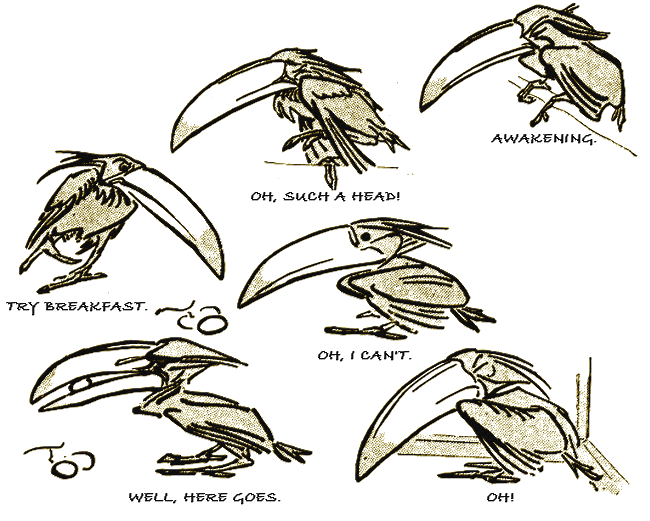
They give him grapes; it is a mockery. Who can eat grapes with such a head? He may struggle with a grape perhaps for a few seconds, but breakfast beats him in the end, and he retires to a repentant corner. What a night it must have been.
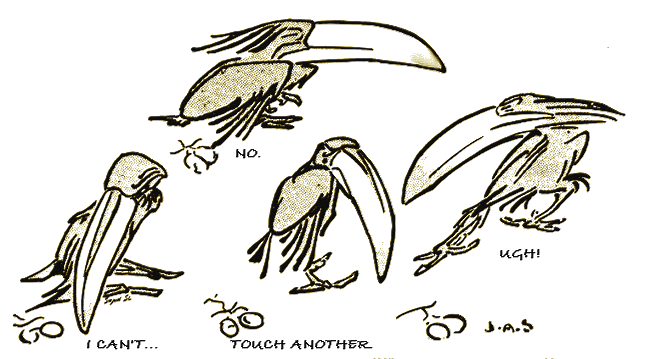
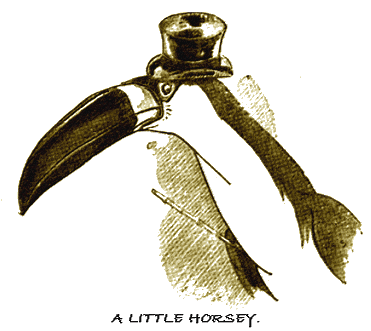
Out of his moult, however, and in good feather, the toucan is rather a fine bird, so long as you forget his nose. The Ariel toucan here—with the black beak—is a little horsey in aspect—a very little—but quite neat and gentlemanly. Not such a real old crusted Tory-club-window gentleman as the Triton cockatoo, but still a gentleman. As for the green-billed toucan, she can never be anything but a good-natured Jewess in her most gorgeous Shobbos clothes.
The comparative quietness of the toucans in house number 54-55 is, probably, due to a worse thing—the noise of the parrots and cockatoos; the house can hold no more noise, and the toucans altogether despair of ever making themselves heard.
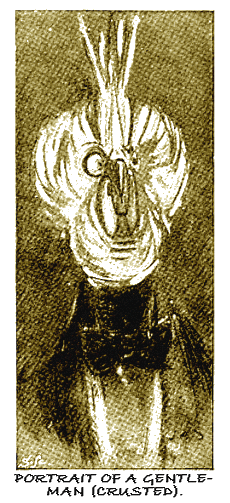
Why the windows are so rarely broken I can scarcely understand, except on the hypothesis of a suspension of natural laws for the benefit of natural science and its institutions. The keeper says he doesn't mind the noise—to such torture may human nature be accommodated by long habit. Saint Cecilia would have become accustomed to boiling if she had had forty years of it. The other saint (male, but I forget which) who was grilled could never have done without his hot gridiron if he had been able to keep on it for forty years, the time this keeper has been among these parrots. Personally, I should expect to become reconciled to boiling, grilling, or any other class of plain cookery, in about half the time that would elapse before a few hundred competitive parrot-yells began to feel soothing to the nerves.
There is no other house in these Gardens where the unobtrusive visitor is so made to feel his utter smallness and insignificance—and that by mere brazen clamour—as in this. The elephants look large—they are large—but the elephants behave with gentlemanly quietness and self-respect. The parrots rise up and curse you (and everything else) with sudden and painful unanimity. You are appalled, dwarfed, made insignificant and ashamed by the overpowering vastness of—the mere row.
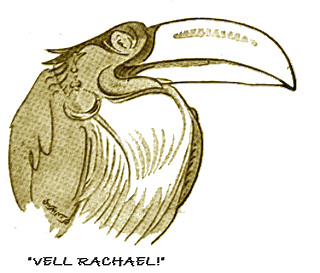
The fact is that each single individual of this crowd of parrots, cockatoos, macaws, and parrakeets holds his own importance above every other created thing as a prime article of belief, and is naturally and most virtuously indignant when he finds that you don't go directly to him and load him with presents. Therefore, he blares and screams at you, till the air swims in your ears and eyes and the outer world is but a chaos of great beaks, angry combs, and streaks of red, green, and white. If you venture so far as to make an invidious selection, and tender a peace-offering to a particular bird, you draw down upon your devoted head the double rage and united jealousy of all the other parrots, cockatoos, parrakeets, and macaws, each convinced that you couldn't possibly have seen him or you would never have slighted so superlative a creature; and again the air and the colours swim to your senses.
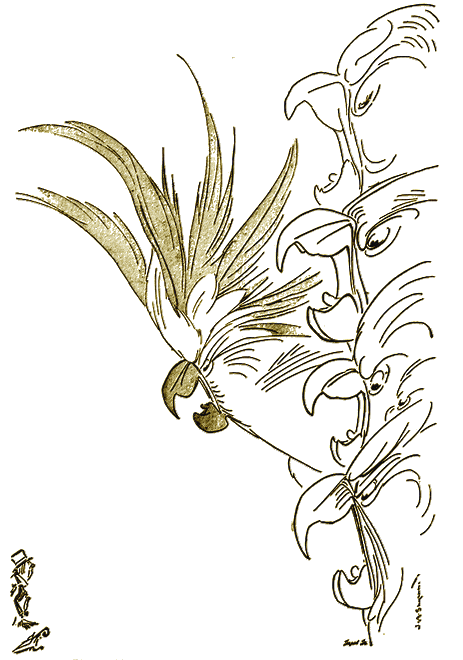
The whole sensation is not unlike that produced by a long inspection of immense thundering and shrieking engineering works. You feel bewildered and you feel small: and everything about you is metallic and mechanical. Every movement of a parrot, if you will but notice it, is suggestive of metal joints and mechanical action; and the voice—but there is no metal metallic enough to emit such a voice as that at its worst.
There is a married couple here—Triton cockatoos—near the keeper's room.
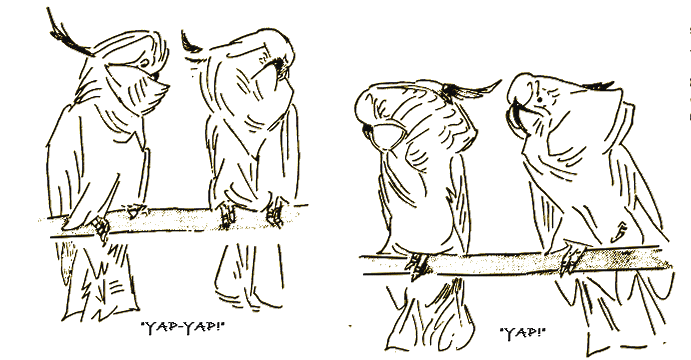
They nag and quarrel and snarl at one another, and all on strictly mechanical principles. Their only gibe is an inarticulate snarl delivered when repartee seems unlikely.
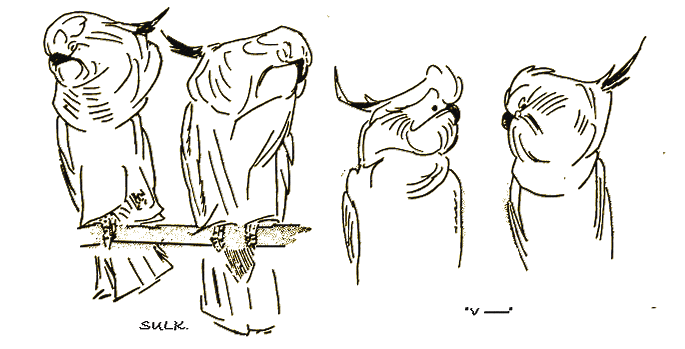
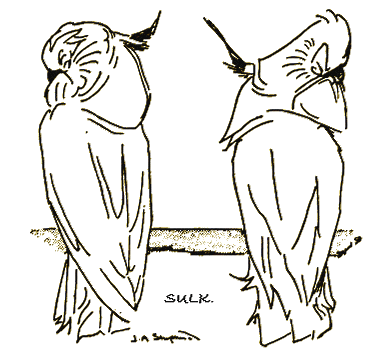
Thus, Mr. C. observing Mrs. C. apparently asleep will snarl ferociously, and compose himself to rest. In a little while Mrs. C. will rouse herself, and perceiving the placid quiescence of Mr. C., will snarl at him and go to sleep again; all this with a mechanic jerk of the head and neck suggestive of Punch or an automaton. After a while, perhaps, the inclination for a snarl will take both at once, and, finding themselves face to face, with nothing original to say, they will subside and sulk for the rest of the day, each trying hard to think of some particularly unkind remark to hurl at the other.
Cocky, the big Triton, has been moved here from the insect-house, and shows signs of forgetting his English. That is what will occur in a congregation of this sort.
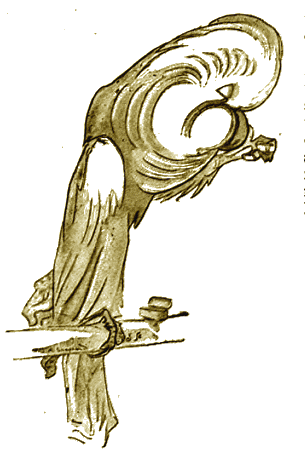
The marvel is that many of the birds will still talk at all. An old, rose-crested cockatoo will dance gracefully, with his head on one side (and his eye on the reward), at the offer of a nut. He is called Cocky, in common with all of his kind, just as the parrot is always Polly; but I prefer to call him Richardson, because his is, practically speaking, the only show in the fair.
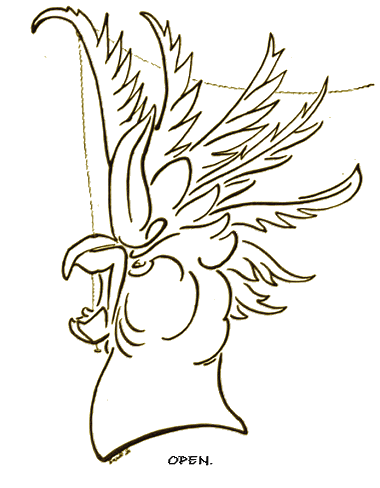
There is a slender-billed cockatoo, who offers me a warlike challenge to "come on" whenever I approach him, and a few more who have a word or two, but Richardson is the only bird capable of a decent show. He will stand at his cage wires and bawl out "What ho! what ho! what ho!" in a way that confirms his classification as a showman and gives a hint of aspirations to tragedy. Richardson is the least mechanical of the birds here, and is a most respectable and old-fashioned veteran, who would look quite in character taking snuff, arid whose polite accomplishments have not been ruined by his residence among unmannered crowds of other birds.
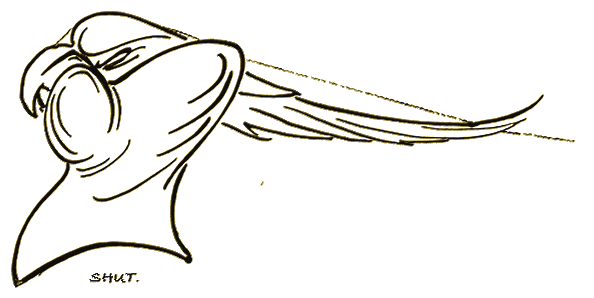
But, mannered or not, here is nothing but a crowd of screaming, unfeeling, snapping painted machines. I have never seen a plucked parrot, but I know without seeing, that you have only to pluck one to lay bare nuts and bolts cams, hinges, springs, cranks, and metallic joints. See a cockatoo spread and shut his crest; clearly it is just the motion that could be actuated by a string on the wooden harlequin principle; probably, as there is no string, there is a long spiral spring under the feathers of the head (just lying along where some people part their hair) set going by a catch on the principle of the air-gun trigger.
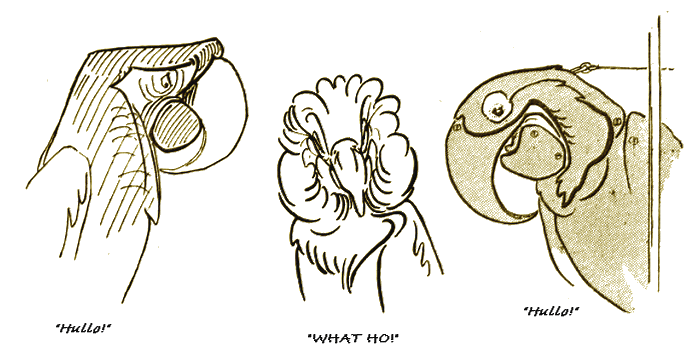
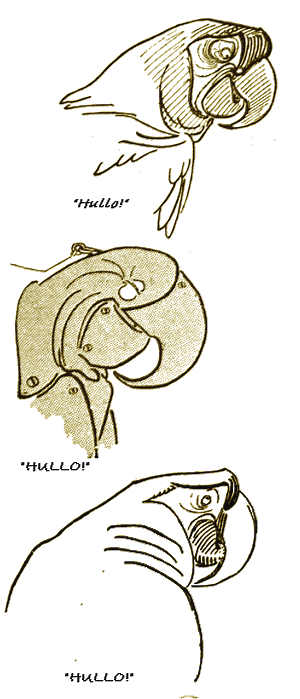
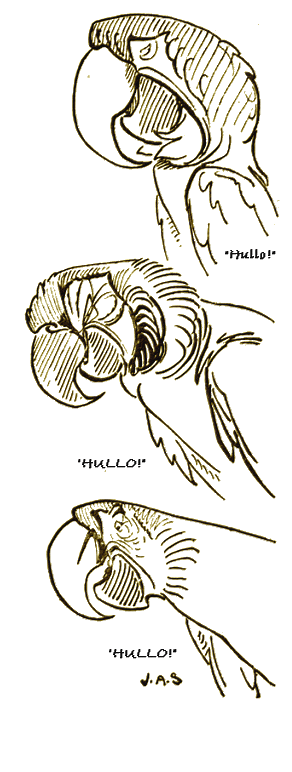
As to the gorgeous mechanisms on perches that hang in a line down the main aisle, every joint, sound, and motion spells "clockwork" aloud. Such of these as speak have one word, which is "Hullo!"
This, in varying degrees of urgency and gruffness, will greet you as you pass along the line—if you show any indication of nuts; otherwise you are insignificant, and unworthy of notice.
One fine blue and yellow machine will not say "Hullo" without receiving a nut in advance; probably being constructed on the familiar automatic principle. But it is all an expressionless outcome of clockwork. We seldom see among the lists of "patents sealed" and "provisional protections" granted, any reference to an invention for improvements in the mechanism of parrot and cockatoos.
It is a remarkable thing that so obvious a field for invention and improvement should have been so much neglected. Plainly, an easy and obvious improvement would be the provision of a simple shut-off valve, by which the suffering proprietor could stop the parrot's steam whistle when desired.
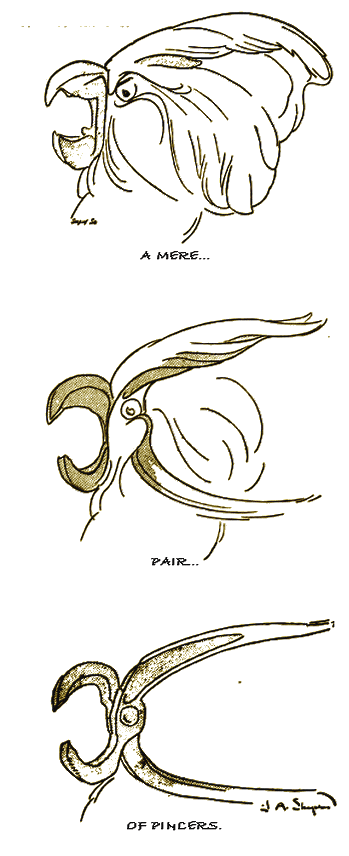
The desirability of some such improvement need not be enlarged upon, and, once the appliance were in the market, every parrot-owner would hasten to have it fitted to his machine.
Another contrivance, having the same object, would consist of a self-acting escape valve, by which the familiar scream of the mechanism would be diverted, and escape noiselessly through a small grating at the back of the neck after a certain degree of pressure had been attained. Moreover, what more easy than to have the outer side of the jaw-hinge fitted with a convenient butterfly-nut, by tightening which, after the periodical stoking with maize and so forth, the engine would be prevented from nipping carelessly-offered fingers?
As it is at present, the jaw-hinge is a mere ordinary pair of sharp pincers barbarically ornamented with feathers and colours. Improvements suggest themselves at every point. Many of these otherwise amusing instruments cause trouble by occasionally breaking out into startling and exceedingly forcible language. It would seem that a pressure valve might be profitably employed in this case also, by means of which, as soon as the expressions reached to the degree of "blow it," or "shut up," the power would be immediately diverted, and either allowed to escape harmlessly through a small chimney at the top of the head, or else conducted by a power-transmitting mechanism to an adjacent musical-box, which would play "Pop Goes the Weasel," or something else of a similarly moral tendency.
The whole subject is full of profitable suggestions, which are offered, free of any expense beyond a small royalty to myself, to the notice of persons of mechanical genius.
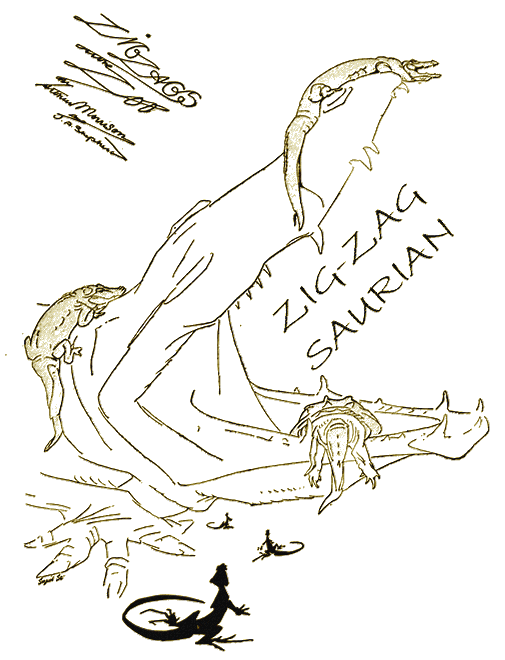
PEOPLE, as a rule, are not fond of lizards, and the larger the lizards the less people like them; until the crocodile and the alligator, largest of all, are received with positive antipathy, and rarely treated as pets. People make many excuses for such an attitude toward lizards; calling them ugly, crawly, slimy, scaly, and so forth.
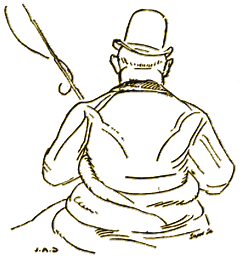
I have an hypothesis that envy is a large element in this human antipathy. For after all, if we will but confess it, the alligator's is rather an enviable lot. To lie all day in a bed of warm, soft mud—really, it is a pleasant thing. To be able, without inconvenience, to postpone dinner for a fortnight—that is attractively economical. To enjoy the advantages of six eyelids and the resulting capability in winks—there is something even in this.
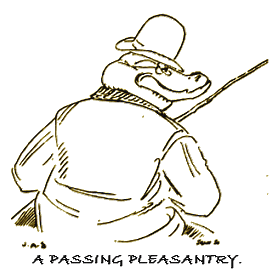
But chiefly, envy for the crocodile has got into the grain of humanity by heredity from those ancients who believed everything that Plutarch told them in his book, De Iside et Osiride. The crocodile, he informs us therein, can render itself invisible at will, everything else being perfectly visible to it the while. This is a noble privilege, and worthy of the most respectful envy. Jack the Giant Killer performed the trick by means of a cloak; but Plutarch's crocodile does it "merely by the power of the heye," as the street-corner mesmerist has it—does it "like winking," in fact. The mechanism is very simple, and quite easy to understand. It consists only of a membrane to draw over the eye; and as the eye it is drawn over is the crocodile's, it is obvious that he becomes invisible at once. His ability to see others is provided for by the ingenious expedient of having the membrane transparent—and there you are. What could be simpler? Anybody who can run to a transparent membrane fitting for his eyes may dodge his creditors at will, thanks to the tip of the benevolent and ingenious Plutarch.
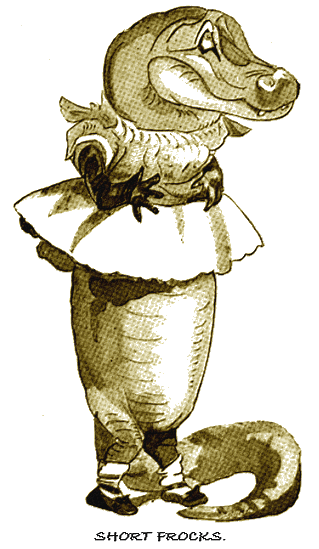
In the reptile-house at these Gardens, the largest saurian bears the apt name of Little-'un. He is a youthful alligator, although, being rather more than 10ft. 6in. long, he has quite grown out of short frocks. Nothing infantile remains about his appearance, and he has in full development that curious cravat of fleshy folds and creases noticeable in no animals but alligators and 'bus-drivers, and among the latter species only in the stout and red-faced variety.
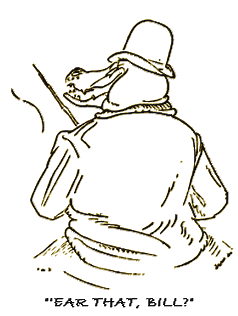
Little-'un's name was not given him by way of a joke, but because, nine years ago, he was only a foot long—which is little for an alligator. Little-'un has always been a good business alligator, however, and by strict industry and invincible perseverance in the pursuit of whatever might be eatable, has risen to an honoured and considerable eminence in the higher Zoo circles.
To observe the open countenance of Little-'un bearing down on a piece of meat that ought property to belong to some other alligator, is to get a sight of a truly original edition of "Smiles's Self Help." Little-'un's one moral principle is—the greatest good of the greatest alligator. His business maxim is—get something to eat; honestly, if there is no other way, but, anyhow, get it as large as possible, and as often as you can.
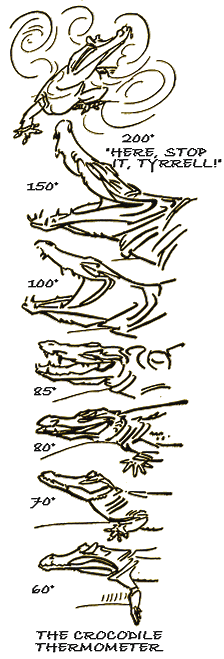
He would, without the least bashfulness, proceed to eat his friends in the same tank if Tyrrell (the keeper, whom you know already) neglected the commissariat. Indeed, he once began on one fellow-lodger, with no other excuse than opportunity. Feeding was in progress, and, in the scramble and confusion, a smallish crocodile, lunging his nose in the direction of the desired morsel, without particularly noticing where that direction led, found himself up to the eyes in Little-'un's dental establishment. Little-'un's prudent habits rendered it unlikely that he would deliberately fling away anything that Providence had actually thrust into his mouth, even if it were his own grandfather; and only a vigorous application of Tyrrell's pole saved the crocodile from making a meal in a sense he didn't originally intend.
Eighty-five degrees is the temperature prescribed for the water here, and every crocodile is a thermometer unto himself, soon showing signs, notwithstanding his thick hide, of any variation in the rate of his gentle stewing—Little-'un being as sensitive as any, in spite of his assiduous attention to business.
With Tyrrell, by the way, Little-'un is comparatively affable, for an alligator. Tyrrell climbs calmly into the basin, among its inmates, to swill and mop it out at the weekly cleaning, herding crocodiles and alligators into a corner by the flourish of a mop, in a manner more than disrespectful—almost insulting. There is some mysterious influence about that mop. Why should alligators shut their heads and stand meekly aside at its potent waggle? I would never venture up the Nile without Tyrrell's mop. With one wave of that mystic sceptre I would assume immediate sovereignty over all the crocodiles in Africa, and drive them into corners. There is no withstanding that mop. If it will intimidate crocodiles, plainly it would be successful with leopards, cobras, lions, and tigers. If I could borrow it I would even try it on the beadle at the Bank of England, and if I could wave him aside with it, I should know that thenceforth the world was at my feet; and I'm afraid Tyrrell wouldn't get his mop back.
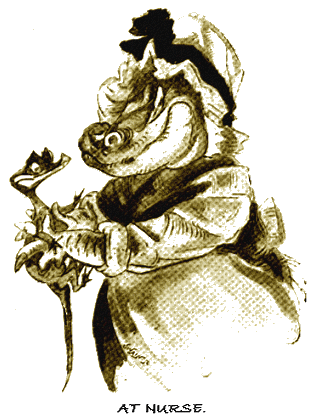
But I was speaking of Little-'un: his affability; and of Tyrrell: his irreverent familiarity. When Tyrrell mops out the basin, he finds it convenient to leave somewhat under a foot of water in the bottom for cleaning purposes, and as this would be damp (as is water's nature) to tread in, he calmly stands on Little-'un's back and proceeds placidly with his mopping. To wave an alligator aside with a mop is an insult altogether, but to stand on his back for the sake of dry shoes is an outrage unutterable. Little-'un seems a very appropriate name as it stands, but if ever a time should arrive when it must he changed, I think, with every respect and honour to the departed statesman, I should suggest John Bright. "Mr. Speaker," said an honourable member, who spoke before he thought, but whose name I have forgotten, "Mr. Speaker, the right honourable gentleman" (Mr. Bright) "accuses me of making allegations. Why, sir, the right honourable gentleman is the greatest alligator in this House!" Which is precisely what Little-'un is now.
Round at the back, in his private domains, Tyrrell keeps a crocodile and alligator nursery. It is a metal box fixed against a wall and holding about a gallon. Here are all the infants, eight inches to a foot long, squirming, wriggling, and struggling, with a lively activity foreign to the nature of the full-grown alligator. Tyrrell will plunge his hand into the struggling mass and produce a handful for your inspection. They are charming little pets and as ready to bite as if they were twenty feet long. An alligator may be pardoned some impatience in growing; if he is to be ten feet and a half long at nine years of age, there is a deal of lee-way to make up. Most creatures would be discouraged at being born only to a measurement in inches, and refuse to grow at all.
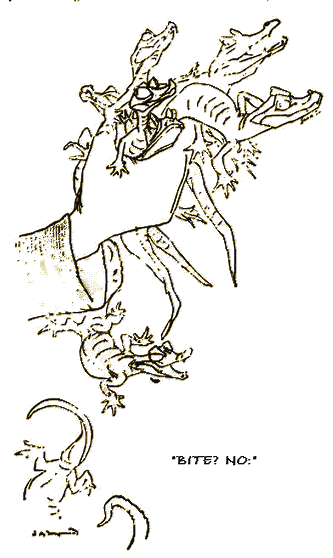
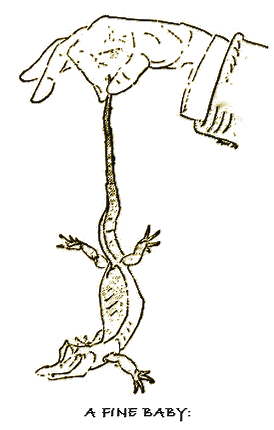
There would appear to be a sort of general reluctance to make a domestic pet of the crocodile; it is not fashionable now, and nobody seems anxious to set the mode. To encourage anybody who is disposed to distinguish himself, I may observe that a crocodile is cheapest when young. This is doubly fortunate, because for a less sum you have a longer run for your money—the last expression not being intended in any uncomfortable sense. I believe the usual price of young crocodiles and alligators, up to a certain size, is a guinea a linear foot; at any rate, I know you could buy them at that rate of my old friend Mr. Jamrach, and I have no doubt that the Zoological Society may be able, from time to time, to spare a foot or two of alligator at the price. If you buy a foot—or a yard, as the case may be (the case, of course, will be a little longer, but that is unworthy trifling)—you must be careful to keep it in a warm place, in water at the right temperature, at night as well as day. Then when it grows to the size of Little-'un, it will make an imposing embellishment for your entrance-hall, and useful to receive subscription-collectors. And to take them inside.
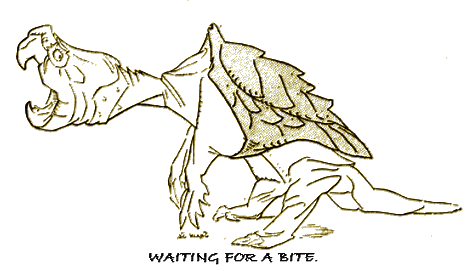
It is a bad thing to generalize in a world containing China. China upsets everything. If you venture to put a date to the invention of gunpowder, somebody is sure to remind you to except China; the same with printing and everything else. There is nothing China hasn't got or hasn't had. So that naturally, after America has many years flaunted and gloried in the exclusive possession of the broad-nosed alligator as distinguished from the sharp-snouted crocodile, China, in the old familiar aggravating way, bobs up serenely with her alligators—perfectly authentic and genuine, and here some of them are, in the small basin. There's no getting ahead of China.
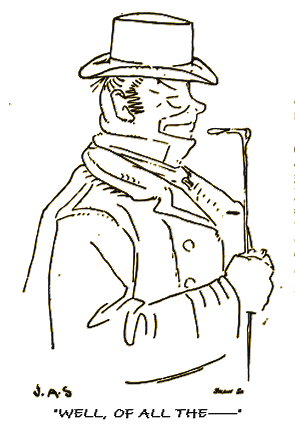
But Temminck's Snapper is the wonder and gaping-stock of this house. Bring the most impassive country cousin, let him sneer at the snakes, lounge past the lizards, turn up his nose at the tigers, elevate it more at the elephants, ridicule the rhinoceros, and disparage the donkeys. Let him do all this, and then confront him with the Snapper. He will be beaten. "Well, of all the—" He will probably refuse to believe the thing alive, and it certainly looks more like a fine old Paleozoic Fossil than anything else imaginable. This is due to the operation of Misdirected Patience—a virtue so noticeable as to demand capital letters. For the Snapper has been in this not very large tank for ten years, and has not yet become convinced that there are no fish in it. Wherefore he laboriously and patiently fishes without a moment's cessation. Fishing, with him, means waiting immovably with open mouth for a fish to come and be gobbled. He has waited ten years for a bite, but that is nothing unusual, as you may try for yourself, if you buy a rod and line. It is calculated, I believe, that a hundred years more in his present attitude will be sufficient to fossilize him, when, no doubt, he will be passed on to the Geological Society.
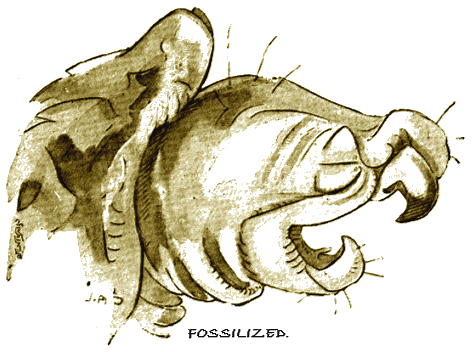
He has never yet found the need for an individual name; but I am thinking of suggesting a suitable combination—I think it should be Job Walton.
Job is not an emotional person. He never exhibits enthusiasm, even for fishing. I shouldn't myself, after ten years' waiting for a bite. There he floats, with all the mental activity of an ordinary brick, while visitors come and go, nations are convulsed, elections, boat-races are decided, and green weed grows all over his back, but he doesn't care. "A rolling stone gathers no moss" is a capital proverb for the guidance of people who care for moss as a personal adornment. Job avoids all rolling, in common with other forms of movement, and is lavishly rewarded with moss of the greenest, on back, legs, toes, and tail.
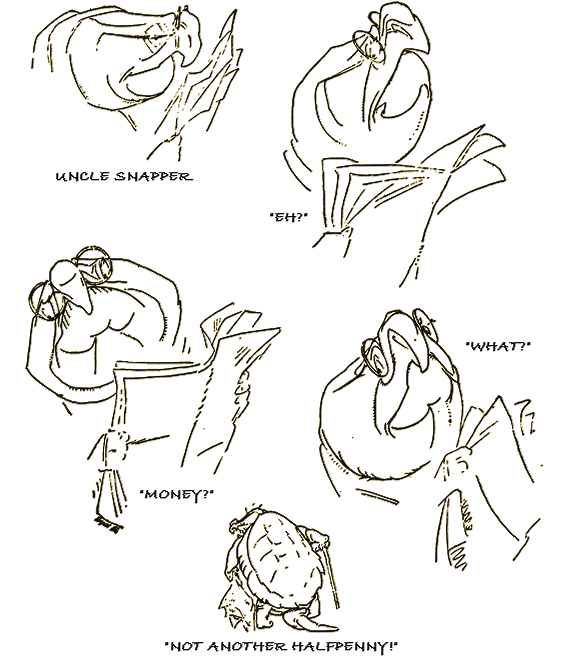
Beyond his patience (a negative sort of virtue, after all), Job Walton has no particular personal characteristic that I can discover, except extreme niggardliness plain and patent in his face. He has nothing in the world to be niggardly with, except his moss, but if he had, he would make a very unindulgent uncle. I have a theory that Job is not an animal at all, but a fossilized concretion of the twin virtues (or what you like to call them), patience and stinginess; a sort of petrified fungus, produced by the chemical action consequent on the mingling of the two qualities. Probably some very shocking old miser (perhaps it was Scrooge himself) lost all his stinginess at once, just at the identical moment when some long-suffering person lost his patience (this was, probably, an angler).
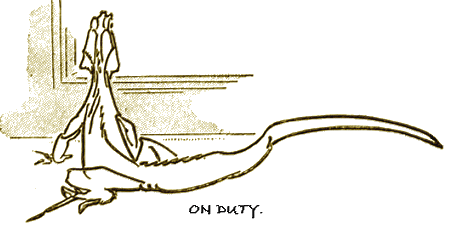
The subtle essences comprising these qualities met and mingled—result, a fungus growth, Job Walton. The same sort of thing occurs a thousand times a day in the case of toadstools.
I am really friendly with only one of the smaller lizards here—and he is a large one; the big monitor at the corner. But I have never been able to learn from him, even in his most confidential moments, how many feet of tongue he really has. It is a round, whip-lash sort of tongue, like the ant-eater's, and I have a private superstition in both cases that there actually is no other end to that tongue.
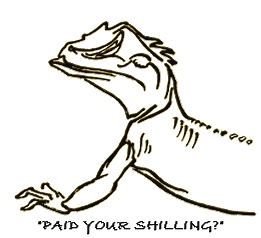
The monitor is fond of rats, but the rats are not at all partial to his society. Lesueur's Water lizard is a curious specimen. He has not been here long, but has already assumed, on his own nomination, a position of great responsibility and importance. He is Inspector of Visitors. He won't have questionable characters in the reptile-house.
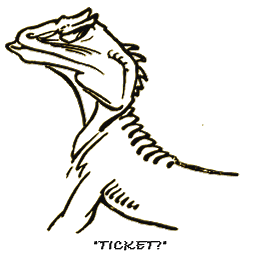
When not actively inspecting, he is watching for his victims. He observes a visitor approaching. He is on guard at once, by the front glass of the case. His aspect is official and stern, his manner abrupt and peremptory; he is not a lizard to be trifled with. "Paid your shilling?" he demands, as plainly as a silent lizard may. "Got your railway ticket? Show it."
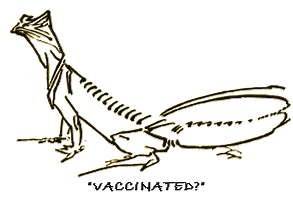
Any respectable visitor with the fear of the law before his eyes will comply at once. "Where do you live? Produce your last water-rate receipt." He looks you up and down suspiciously. "Been vaccinated lately? Date? All right. Pass along." And he swings abruptly round to watch for somebody else.
The Australian Bearded Lizard (most quaint lizards are Australian) is supposed to derive his colloquial name—the Jew Lizard—from his beard. But he has an Israelitish acquisitiveness of his own, too.
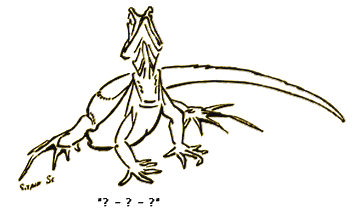
He goes about his shop—everything he does makes it seem a shop—and brings his paw down on one pebble and one twig after another with an unmistakable air of assertive proprietorship.
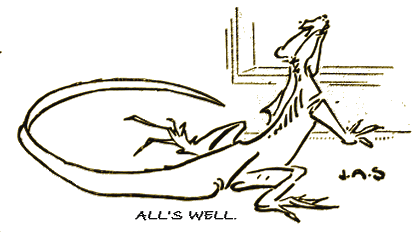
"Mine," he intimates, "mine, every one of them: and you keep your hands off them, unless you're ready to do business." He would pronounce it "pishnesh" if mere gesture-talk admitted of it. A little irritation goes a long way with the Jew lizard. His beard stands out tremendously, he swells to a rib-threatening degree, and stands at bay with open mouth, ready to smite the Philistines hip and thigh and spoil the Egyptians of their finger-tips—let them but come near enough. But he is a very respectable lizard, not so lazy as most, and pleasant to the touch.
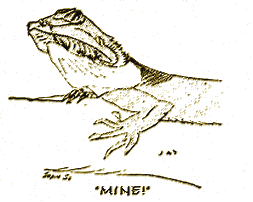
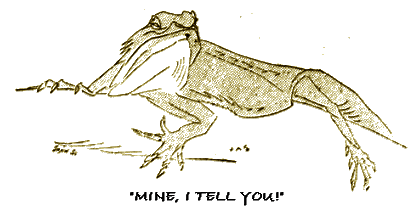
He is not so lazy, for instance, as the chameleon. The chameleon is the slowest creature alive. If there were a race between a chameleon and a pump, it would be safest to back the pump.
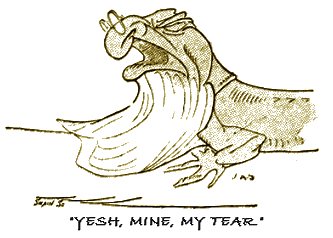
An active little Gallot's lizard was placed here lately, with a pair of chameleons, but the contrast was so disgraceful to the chameleons that he was removed, and made to chum with a Gecko, a few cases off. He absorbed all the rations, too, which was an addition of injury to insult, although chameleons can always put off dinner for a month or two without inconvenience.
A chameleon is a sort of twin. Like other things, he has two halves; but these halves are only acquainted with one another—not really intimate.
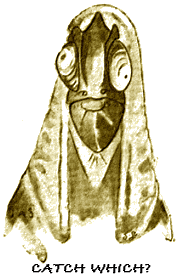
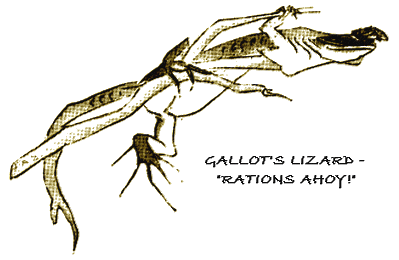
His left-hand side is often asleep while the right is as wide awake as a chameleon's side can he. His eyes, also, are quite independent of one another, and roll in opposite directions as often as not, so that he would he inconvenient as a Speaker. Everybody would catch his eye at once and there would be quarrels—possibly even fights—a thing impossible in the House of Commons as it is. A chameleon never walks, he proceeds in this way.
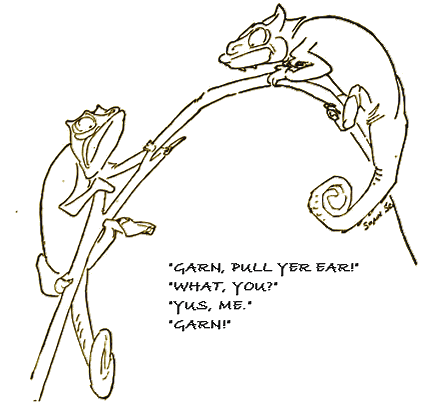
After a long and careful deliberation, extending over half an hour or so, he proceeds to lift one foot. You may not be able to see it moving, but it is moving all the same, like the hand of a watch. Take a look round the Gardens and come back, when, if you have not been too hurried in your inspection, you may see the lifted foot in mid-air, and the chameleon probably asleep. He usually takes a nap after any unusual exertion. In an hour or two he will wake up, and proceed to plant that foot, with proper deliberation, before him. Then there will be another nap and a good think, after which the tail will begin to unwind from the branch it clings to. This process, persistently persevered in for many days, will carry the intrepid gymnast quite a number of inches.
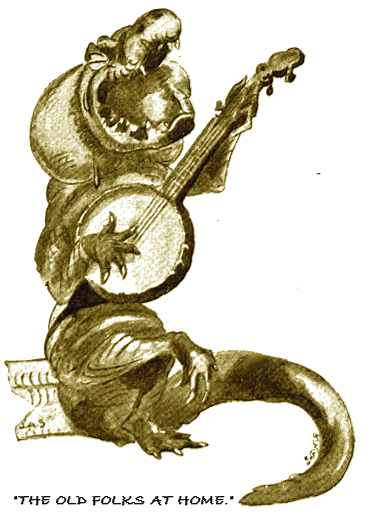
But a journey of this sort is an enterprise rarely ventured on. Chameleons prefer the less exciting sport of sitting face to face and daring each other to mortal combat, secure in the assurance that neither will think of moving toward the other.
They have been known to Fight. A chameleon fight is an amusement whereunto neither the Peace Society nor the Society for the Prevention of Cruelty to Animals need have any objection. No evangelistic clergyman need incur scandal by being present, an interested spectator, at a chameleon fight. The savage combatants never attempt to bite. They gaze gravely and seriously at the surroundings, and at proper pre-arranged intervals solemnly dab their tails together—not hard, nor with any particular feeling beyond a desire to conduct the rite with proper formality and decorum. It is the most harmless and dignified scuffle in the animal creation.
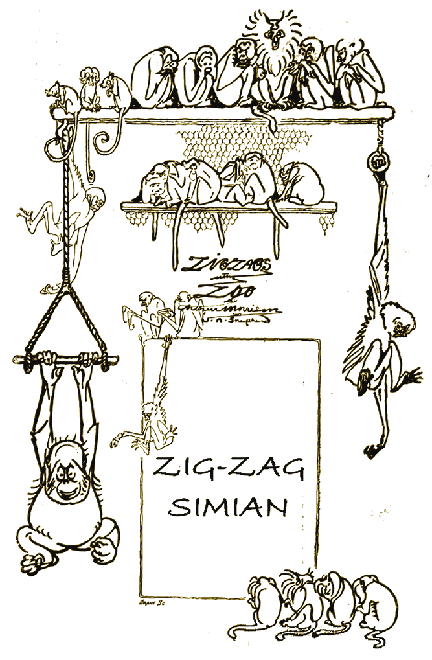
WHENCE has arisen the notion that monkeys are happy creatures? Probably from the inadequate fact that they pull one another's tails and run away. But a being may be mischievous without being happy. Many mischievous boys are never happy possibly because the laws of Nature won't permit of half the mischief they are anxious to accomplish. Still, the monkey, at any rate in a state of freedom, is looked upon as a typically happy creature. "And watch the gay monkey on high," says Bret Harte; and Mr. Kipling addresses the monkey as "a gleesome, fleasome thou," which latter looks like an attempt to make an admissible adjective pass in an unwarranted brother.
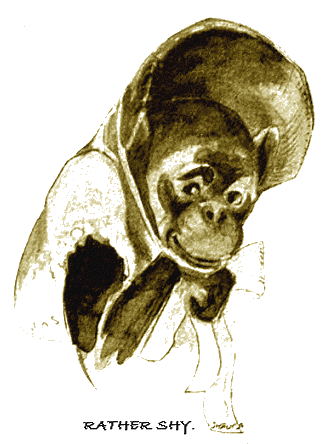
I have seen monkeys fleasome, treesome, freesome, keysome (opposite adjectives these, you will perceive on reflection), and disagreesome, but cannot call to mind one that looked in the least gleesome. Everything that runs up a fence or swings on a rope is not necessarily jolly, much as the action would appear to justify the belief. Many a human creature has stormed a fence with a lively desire to attain the dogless side, but no noticeable amount of jollity; and a man escaping from fire by, a rope wastes no time in unseasonable hilarity, dangle he never so quaintly. Look at their faces; look also at the monkey's face. If a monkey grin, it is with rage; his more ordinary expression of countenance is one of melancholy reflection—of sad anxiety. His most waggish tricks are performed with an air of hopeless dejection. Now, this may be due to any one of three causes, or even to a mixture of them. It may be that, like the boy, he dolorously reflects that, after all, mischief has its limits; that you cannot, so to speak, snatch the wig of the man in the moon, upset the Milky Way, or pull the tail of the Great Bear. Or it may be that a constant life of practical jokes, and of watchfulness to avert them, is a wearying and a saddening thing after all. Or it may be that every ape, meditating on his latest iniquity, tries for ever to look as though it were the other monkey.
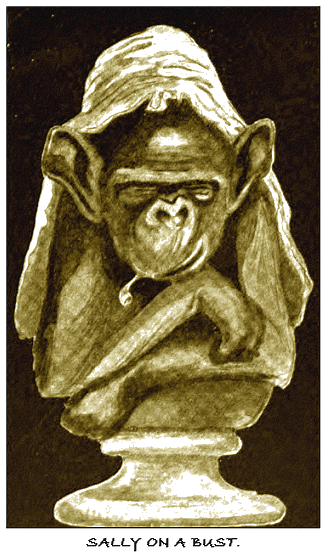
With many people, to speak of the Zoo monkeys is to speak of Sally. Poor Sally! Who would not weep for Sally? For Sally is dead and hath not left her peer. A perversion of Milton is excusable in the circumstances. Why is there no memorial of Sally? "Is the spot marked with no colossal bust?" as they say on invitations to bachelor small-hour revels. There should, at least, be a memorial inscription to Sally.
Sally, when first she came here in 1883, was a modest and, indeed, rather a shy chimpanzee. A few years of elementary education, however, quite changed Sally's character, for she learnt to count up to five, and to be rather impudent. Wonderfully uniform are the results of elementary education. The chimpanzees, orang-outangs, and such near relatives of humanity are kept, when they are alive to keep, in the sloths' house. Such as are there chiefly occupy their time in dying. It seems to be the only really serious pursuit they ever take to. Sudden death is so popular among them, that it is quite impossible to know how many are there at any particular time without having them all under the eye at the moment. A favourite "sell" among them is for a chimpanzee or orang to become a little educated and interesting, then wait till some regular visitor invites all his friends to inspect the phenomenon, and die just before they arrive at the door. This appears to be considered a most amusing practical joke by the dead monkey, and is much persevered in.
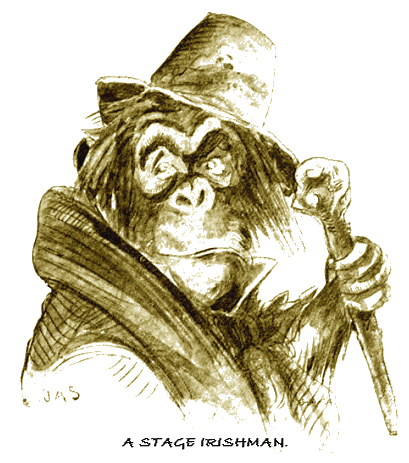
Sally was a black-faced chimpanzee. The white-faced kind is more common, and in the days of its extreme youth much more like a stage Irishman, except that his black hair gives him the appearance of wearing dress trousers very much frayed at the ankles.
The orang-outang is less intellectual as a rule than the chimpanzee; but he has a deceptive appearance of brain-pan—an illusory height of forehead—-that earns undeserved respect.
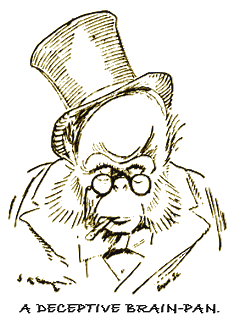
Many a man has conducted a successful business with credit on the strength of a reputation as easily earned. With the orang as with the chimpanzee, it is in infancy that he presents the most decently human appearance. But even then he is a low, blackguard sort of baby—worse than the precocious baby of the Bab Ballad could possibly have been. He should have a pipe for a feeding-bottle and a betting-book to learn his letters from. These anthropoid apes come with such suddenness and die with such uncertainty that I cannot say whether there are any in the Zoo now or not—-I haven't been there since yesterday.
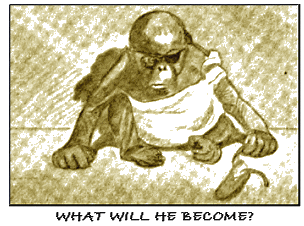
But wanderoos there are, I feel safe in saying, and Gibbons. The wanderoo is a pretty monkey, and usually gentle. He has a grave, learned, and reverend aspect as viewed from the front, and this is doubtless why, in India, his is supposed to be a higher caste, respected and feared by other monkeys. That same wig, however, that looks so venerable in the forefront view, is but a slatternly tangle in profile, like unto the chevelure of a dowdy kitchenmaid. But a wanderoo, well taught, and of good-temper, is as clean and quaint a pet as you may desire, and as delicate as the poet's gazelle, with its incurable habit of dying. The same may be said of the Gibbon. In this climate he Declines and Falls on the smallest excuse, although, perhaps, not quite so readily as the chimpanzee, who may almost be said to Decline and Fall professionally, like Mr. Wegg.
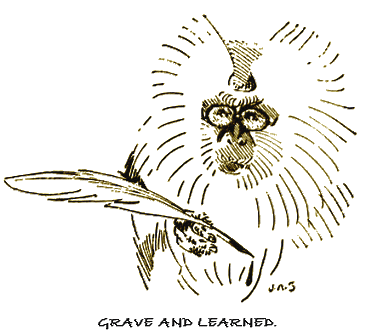
The Diana monkey, too, makes a pleasant pet, and is not so confirmed a dier as some. The Diana monkey here is over in the large monkey-house, in the middle of the Gardens. Her name is Jessie, and her beard is most venerable and patriarchal.
But just outside the eastern door of the big house, John, the Tcheli monkey, occupies his separate mansion. John is a noticeable and choleric character. He dislikes being made the object of vulgar curiosity, and is apt to repel an inspection of his premises with a handful of sawdust. Any unflattering remark on his personal appearance will provoke a wild dance about his cage and a threatening spar through the wires. But once threaten him with a policeman—do as much as mention the word, in fact—and John becomes a furious Bedlamite, with the activity of a cracker and the intentions of dynamite. Against floor, walls, ceiling, and wires he bounces incontinent, flinging sawdust and language that Professor Garner would probably translate with hyphens and asterisks.
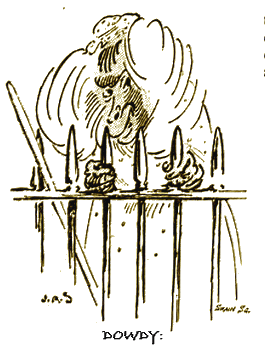
John is the most easily provoked monkey I know, and the quaintest in his rage. He is also the hardiest monkey in the world, being capable o enjoying a temperature of ten degrees below zero; but there is a suitable penalty provided in the by-laws for any person so lost to decency as to suggest that this Tcheli monkey is a very Tcheli monkey indeed. For John's benefit I would suggest an extra heap of sawdust on Bank Holidays. On an occasion of that sort it is little less than cruelty to keep him short of ammunition.
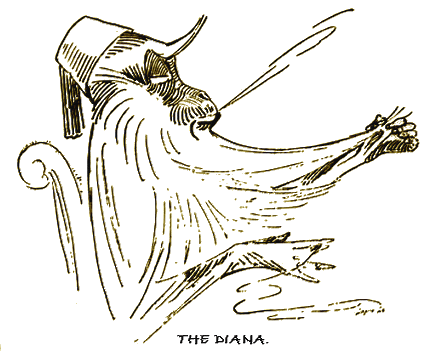
Of the big monkey-house, who remembers more than a nightmare of tails, paws, and chatterings? Here are monkeys with beards, monkeys with none, big monkeys, little monkeys, monkeys with blue faces, monkeys who would appear to have escaped into the grounds at some time and to have sat on freshly painted seats; all thieving from visitors and each other, pulling tails, swinging, turning somersaults, with faces expressive of unutterable dolor and weariness of the world. The wizen, careworn face of the average monkey appeals to me as does that of the elderly and rheumatic circus-clown, when his paint has washed off.
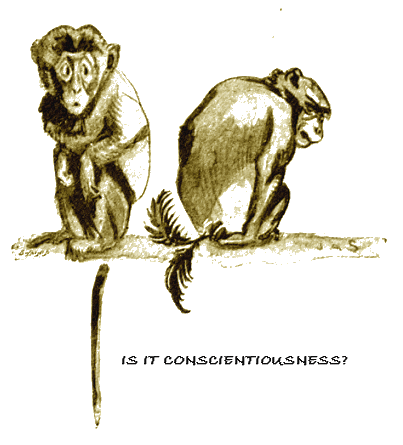
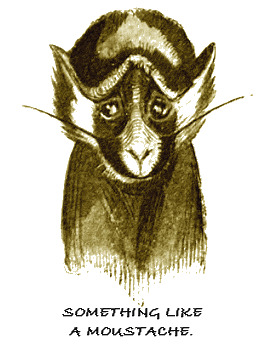
The monkey, I am convinced, is as sick of his regulation jokes as is the clown of his. But he has a comic reputation to keep up, and he does it, though every mechanical joke is a weariness and a sorrow to the flesh. "There is somebody's tail hanging from a perch," reflects the monkey, looking lugubriously across the cage. "I am a joker, and several human creatures are looking at me, and preparing to laugh; consequently, I must pull that tail, though I would prefer to stay where I am, especially as it belongs to a big monkey, who will do something unpleasant if he catches me." And with an inward groan he executes the time-honoured joke and bolts for his life.
It is a sad affliction to be born a wag by virtue of species. There is one monkey here who for some weeks displayed a most astonishing reluctance to snatch things through the wires, and a total disinclination to assist or share in the thefts of his friends by "passing on" or dividing. For some time I supposed him to be a moral monkey strayed from a Sunday-school book, and afflicted with an uncomfortable virtue. But afterwards I found that his conscientiousness was wholly due to his having recently grabbed a cigar by the hot end, and imbibed thereby a suspicion of the temperature of everything.
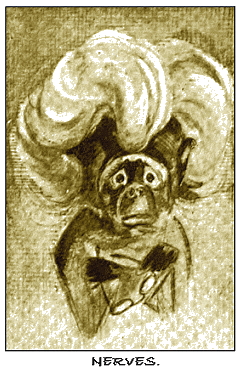
Beware especially, in this house, of the paws of Marie, the Barbary ape. She has a long reach, and quickness enough to catch a bullet shot Poole-fashion—softly. Only Jungbluth, her keeper, can venture on familiarities, and him she takes by the eyebrows, gently stroking and smoothing them. Behind the large room Jungbluth keeps sick monkeys, delicate monkeys, tiny monkeys, and curious monkeys, who have no room outside.
Here is a beautiful moustache monkey, segregated because of a slight cold, and at liberty to train his moustache without interference, if only it would grow sufficiently long. Watch the light fur under the chin of a moustache monkey; it is tinted with a delicate cobalt blue, a colour that would seem impossib except in feathers.
But the little marmosets and the Pinche monkey, all in a cage together, are chiefly interesting here. The Pinche monkey is badly afflicted with nerves, and, as he is undisputed chief of the community, the marmosets have to be careful how they sneeze, or cough, or blink, or his indignation may be aroused. So that the whole performance in this cage is a sort of eccentric knockabout act, by the celebrated Marmosetti Eccentric Quartette.
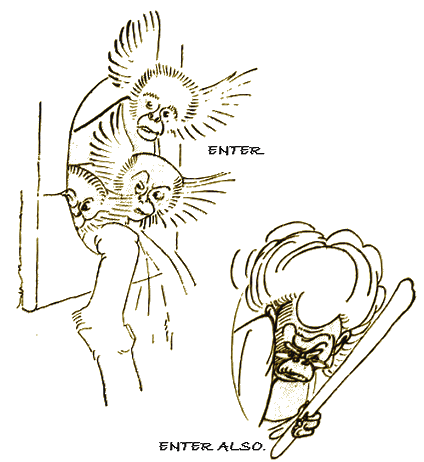
Marmoset No. 1 ventures on a gentle twitter, and the rest join in the song. Promptly the irritated Pinch bounds from his inmost lair, and the songsters are scattered. Everybody doesn't know, by-the-bye, that the marmoset is consumed with an eternal ambition to be a singing bird, and practises his notes with hopeless perseverance. Another thing that many seem to be ignorant of, even some who keep marmosets as pets, is that a marmoset's chief food should consist of insects. In a state of freedom he also eats small birds; but for a pet, cockroaches and bluebottles will probably be found, as a dietary, preferable in some respects to humming-birds and canaries.
Among the sick in this place is a spider monkey. Mind, I say he is there. To-morrow, or in five minutes, he will probably be somewhere else, for that is the nature of a monkey. Sickening, recovering, dying, snatching, jumping, tail-pulling, bonnet-despoiling, everything a monkey does is done in a hurry.
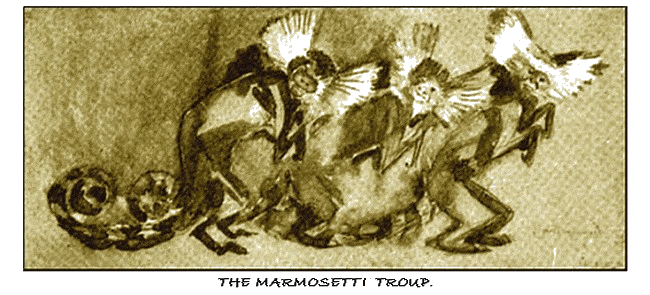
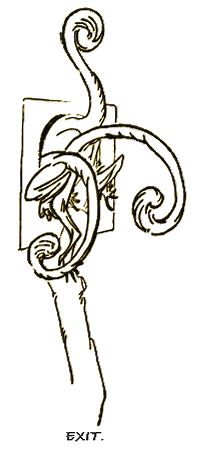
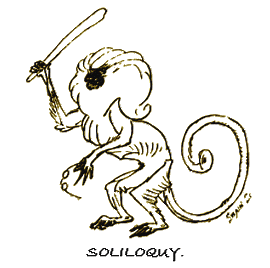
This particular spider monkey has two or three names, as Jerry, Tops and Billy, whereunto he answers indifferently; but I prefer to call him Coincidence, because of his long arms, and he answers as well to that name as to another. He came in here because of a severe attack of horizontal bar in the stomach. I have never seen a monkey fall, and, for that reason, wish I had seen the attack, as a curiosity. For, by some accident, unparalleled in monkey history, Coincidence managed to miss his hold, and fell on his digestive department across a perch. He is a long, thread-papery sort of monkey, and it too a little time to convince him that he wasn't broken in half. When at last he understood that there was still only one of him, he set himself to such a doleful groaning and rubbing and turning up of the eyes, that Jungbluth put him on the sick list at once. But it took a very few hours to make him forget his troubles; and, indeed, I have some suspicion that the whole thing was a dodge to secure a comfortable holiday in hospital.
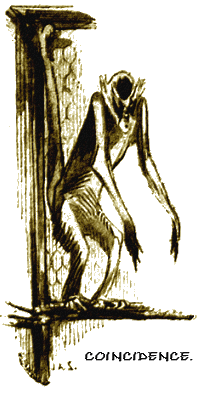
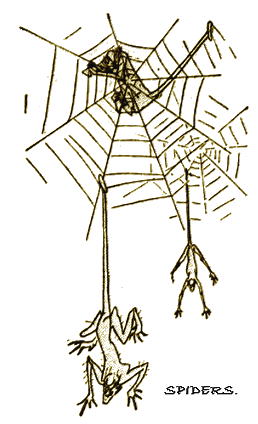
That certainly is the opinion of Coincidence's friend, the Negro monkey, as his face will tell you, if you but ask him the question. It may interest those who already know that Coincidence has a long arm, to know also that he has but four fingers to each hand and no thumb; it is a part of his system. His tail is another part of his system, and you mustn't touch it.
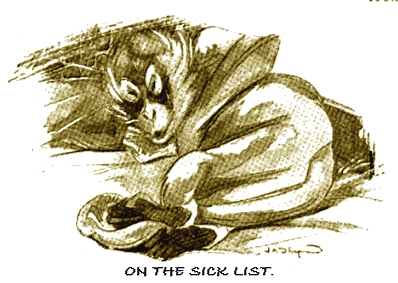
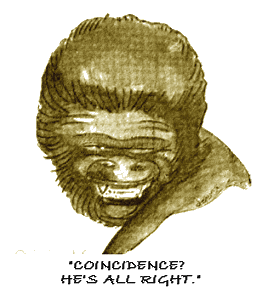
There is no more affable and friendly monkey alive than Coincidence, although he is a little timid; but once touch his tail (it is long, like everything else belonging to Coincidence), and you lose his friendship for ever. He instantly complains to Jungbluth, and points you out unmistakably for expulsion. It is this house that witnesses most excitement on Bank Holidays.
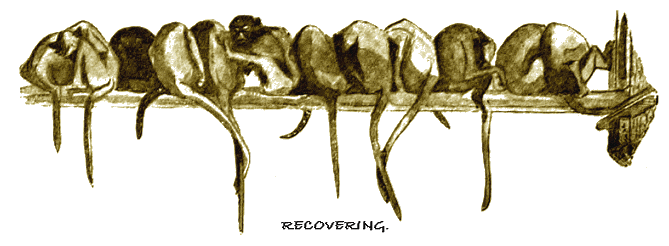
Who would be a monkey in a cage set in the midst of a Bank Holiday crowd? I wouldn't, certainly, if there were a respectable situation available as a slug in some distant flower-pot, or a lobster at the bottom of the sea. Is a monkey morally responsible for anything he may do under the provocation of a Bank Holiday crowd? Is he not rather justified in the possession of all the bonnets and ostrich feathers he can grab by way of solatium?
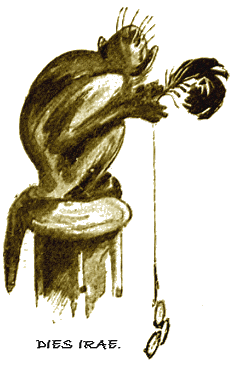
Bank Holiday is the dies irae of these monkeys, and then is Professor Garner avenged. The Professor shut himself in an aluminium cage, and the cage littered about Africa for some time, an object of interest to independent monkeys—a sort of free freak show.
Here the monkeys, secure in their cage, study the exterior freaks, collecting specimens of their plumage, whiskers, spectacles, and back hair. But it is hard work—and savage. It takes even a capful of monkeys a few days to recover from a Bank Holiday, and for those few days trade is slack indeed. At such times it is possible to observe the singular natural phenomenon of a monkey in a state of comparative rest. But he is more doleful than ever.
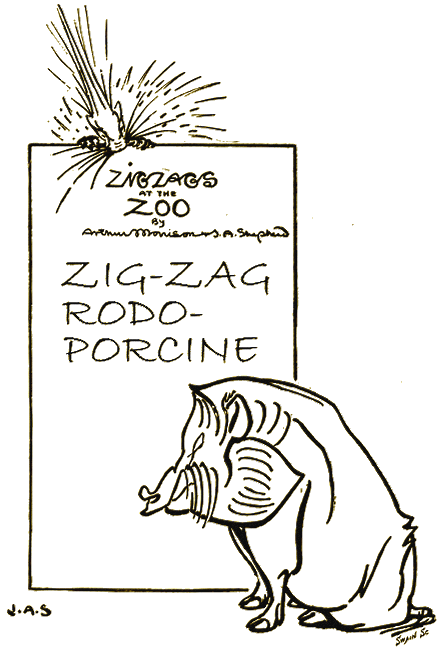
"RODOPORCINE" is a portmanteau-word. It is not a regular scientific term, although, as I may claim with modest pride (being its inventor), it is almost ugly enough to be one. I have invented it largely for the benefit of the building (it is only one building) which the Zoological Society numbers six and seven, and divides arbitrarily into "The Swine House" and "The Rodents' House"; but chiefly I have invented it because I wanted a title for this Zigzag. Rodo I gnaw, porcus a pig.
The Society have old authority for any amount of confusion between the swine and the rodents. The guinea-pig has long ago established its right to its name, on the indisputable grounds of being entirely unconnected with Guinea, and not a pig, but a rodent.
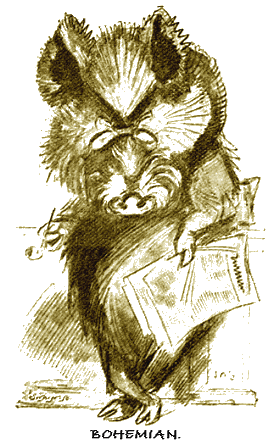
The capybara is also called a water-pig (even in its Greek name) in virtue, doubtless, of being a rodent. "Porcupine" means a thorny pig; the name being again found convenient for a rodent, and enunciated with peculiar emphasis by the wag who wrote:—
Each hair will stand on end upon thy wig,
Like quills upon the frightful porcupig.
Then, by way of pleasant variation, the hedgehog derives its title from the fact of being neither a hog nor a rodent, but only a prickly kind of mole. So that confusion among pigs and rodents is an ancient, time-honoured, and respectable state of affairs, only feebly deferred to by the Zoological Society in placing the two side by side. Let us consider them, therefore, in a proper derangement and with a due regard to confusion.
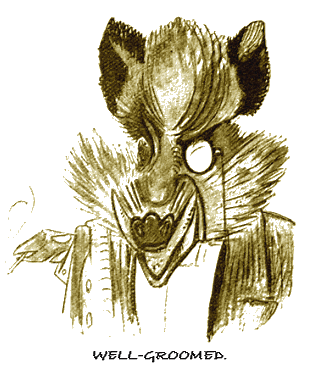
The thoughtless world is disrespectful to the pig. It even uses its name as a term of reproach. Nobody likes to be called a pig, and yet if some were to accept the epithet with a good grace, and conscientiously act up to the character, there would be a deal of improvement in their manners. Proverbs abuse and slight the pig. "Pigs may whistle, but they have an ill mouth for it," says one; "Drunk as David's sow," says another; "What can you expect from a pig but a grunt?" asks a third, totally ignoring the existence of such products as bacon, lard, bristles, and saddle-leather. But then proverbs are always perpetrating injustices somewhere, until abuse from a proverb has become a sort of testimonial to the worth of anything—animal, vegetable, or mineral.
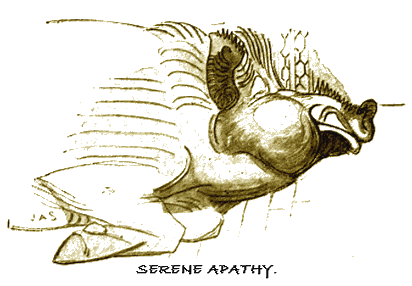
The pig eats all it can get, certainly, but that is only a manifestation of what we are apt to call, in ourselves, prudence and business acumen. Once thoroughly fed it regards the world with serene apathy, but that is merely broad-mindedness and toleration.
The nearest relatives here to the familiar porker of our native agricultural show are the wild swine—European and Asiatic—well set-up creatures, of form and manner not to be considered with disrespect, and carrying with them no more of traditional piggishness than a certain easy Bohemianism of manner and irregularity of bristle.
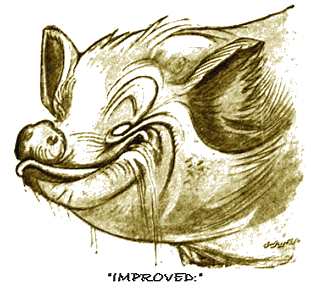
It is plain to see that whatever may be found of ill account in the pig is due to the contaminating influence of man. A wiry, well-groomed wild pig is a decent citizen of the animal community, unpleasantly ready with his tusks, of course, but clearly dignified and with intelligence. To me the wart-hog always seems the precise militarist among pigs. His neat, well-fitting feet, his closely-clad legs, and his high carriage of head are alone enough, to say nothing of his warlike tusks, and his mutton-chop side-whiskers, which indeed are only a sort of warts, but look as much like the real thing as they can manage. But, for all the other qualities of the grizzled old soldier, it cannot be concealed that he has a drunken eye.
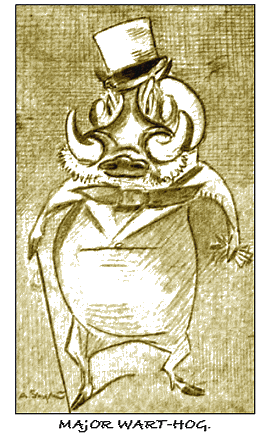
From the comparatively noble wild swine (who cannot open his mouth without an invariable appearance of being about to sneeze) man has, by long selection and careful breeding, evolved a preposterous cylinder of locomotive pork. This he calls an "improved" pig—as who should speak of improving the heavens by casting advertisements thereon from a magic-lantern. It is a quaint paradox in the pig-fancier's system that the pig with the greatest number of excellent points is, as a matter of fact, the pig whose rotundity presents no point anywhere, nor anything like a point.
There is a deal of catholicity of taste in a pig. He is quite prepared to devour the whole animal and vegetable kingdom, and very little hunger would persuade him to admit the mineral kingdom, too. Almost anything will "please the pigs"—which may be the origin of the proverb, although origin-mongers say differently; and yet the pig's senses of taste and smell are particularly acute; witness his use as a beast of chase—for the truffle. He has also an acute weather-wisdom, if countrymen's weather-lore be accepted; for if pigs carry straw in their mouths it will inevitably rain. Wherefore picnic parties will do well to remove all straw from the reach of pigs.
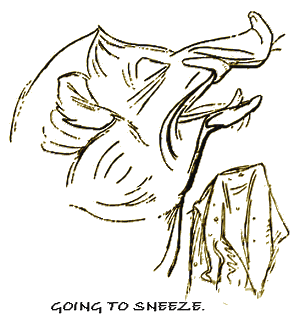
The capybara—the water-pig which is no pig—is a rudimentary sort of structure. He presents a kind of rough outline or experimental draft of a quadruped in its preliminary stages of invention. All the materials are there—more than enough, in fact and the rough plan of their arrangement is sketched out, but there is no detail—nor, indeed, any other kind of tail—and no finish. The body (and a very liberal body, too), the hair (also liberal, and thick), the head and legs, have been put together tentatively with a shovel, and all the fine work has been omitted; indeed, the operations have never even arrived at the stage at which the tail is stuck on. The capybara's ideals, notions of life, wants and aspirations are of the rudimentary character appropriate to his figure. He has no particular objection to being tame and docile so long as he is fed—nor any particular repugnance to being otherwise.
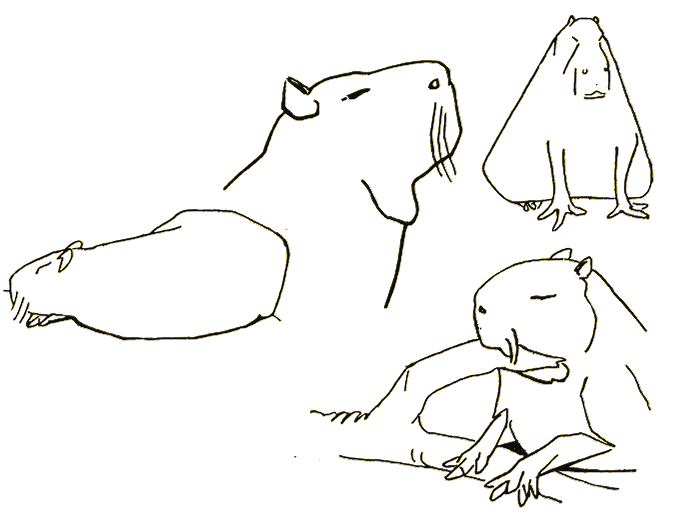
He will eat a piece of cabbage if it is there; otherwise he gets on very well with a lump of firewood. He has a drink when the idea occurs to him, and takes it in the ordinary way as a rule, but, sometimes, under the unwonted stimulus of a brilliantly new conception, he sits in his drink as he takes it.
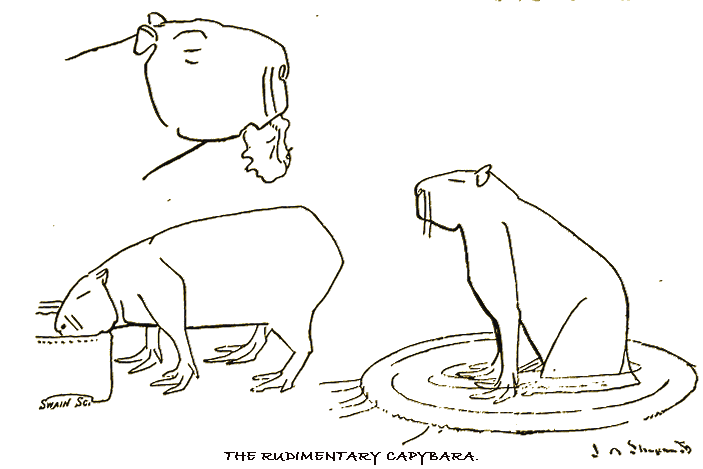
This would appear to be his notion of humour; it is the capybara's only joke, and he never varies it in form or spirit. He is not a communicative beast, and never offers a remark to any human creature but Church, his keeper, and then it is by way of extracting something to eat. The remark is a sort of purring rattle—the rudimentary speech of an animal whose vocal organs have not been tuned. The redeeming feature in the capybara, in these days of hysteric fad, is his utter absence of "views" on any subject in the world. And he has no enthusiasms.
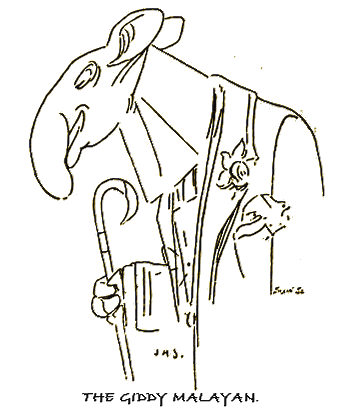
The tapir is nothing but an ambitious pig—a pig trying to be an elephant. But the most careful cultivation has not succeeded in elongating his trunk beyond a few inches, and the biggest of the tapirs can get no nearer the stature of the elephant than a small donkey. It is probably this that makes the tapir a melancholy animal, silent and despondent. There is no gaiety in the composition of the tapir. In a fatefully unlucky moment he began to try to be an elephant, and thenceforward happiness forsook him. Like the king in the history-book, he never smiled again. His life is one cheerless, hopeless, dreary struggle to be what he can never become. Being a pig, he is obstinate, or he would have given up the attempt long ago. Elephantine ambition in particular is not born in the tapir, though ambition of a vague sort is. The young tapir always begins by trying to be a tiger or a zebra; breaking out in brilliant stripes and spots; but in due time he regularly settles down, after the manner of his kind, to achieve rank as an elephant. He is a melancholy example of discontent in humble circumstances. Still, there is a deal of human nature in the tapir. Plainly it is largely Hebrew human nature, notwithstanding his porcine connections.
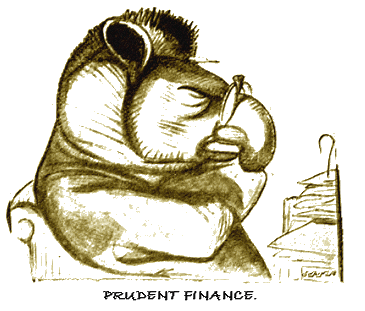
The ordinary tapir is a grave, respectable, and judicious Israelitish financier, prudent and careful; but the Malayan tapir here is a giddy young person who makes the money fly. See his short white covert coat, with the little black bobtail visible below it, and note his vacant eye. How badly he wants a crook-handled stick and a high collar! But you may despise the tapir, his restless ambition, and his immature trunk as you please—all your contempt will be reciprocated, and with interest. He is almost the only animal here who knows that sightseers don't usually carry about with them his particular sort of food, and he is, therefore, loftily indifferent to the tenderest blandishments.
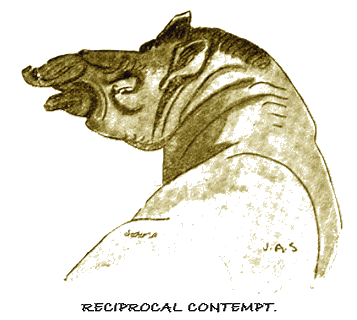
He despises you for having neither trunk nor tusks; in his matured philosophy, only an elephant is admirable; as a baby, he admires the zebra and tries to be one of them. And so he lives here, in house number sixty, equidistant between the zebras and the elephants, and as likely to become one as the other. Though he could ensure his juvenile stripes being fast colours (which he cannot), the tapir would fail as a zebra in the hinder end. The docility of the zebra's head he might easily attain to—indeed, he has it now—but the inconsistent friskiness of his heels would be beyond him.
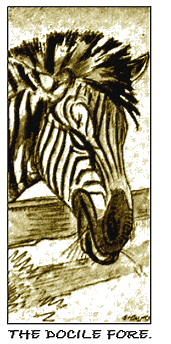
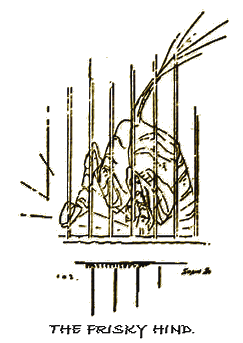
There are a good many fine points about the porcupine. Church, the keeper, once got half a-dozen of them in his calf, and went to bed for a week to celebrate the occasion. The porcupine is one of those animals that look pleasantest from the front. There his bristles all lie back smoothly from his forehead, giving him an aspect as aesthetically and Wildely tame as may be. But behind—well, you get a view of all his fine points. A little irritation—a very little—brings up his fine points in spiky array, as though he were caught from behind in a gale of wind.
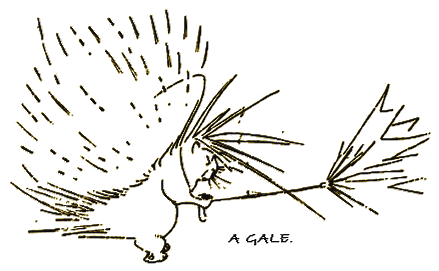
There are no Irish porcupines, which is remarkable when you consider that, in a fight, the porcupine invariably advances backward, most valorously retreating to the front in pursuit of the enemy to which he turns his back, and pressing forward courageously to the rear. That is to say, in a manner less mixed, that the porcupine always attacks an enemy by springing backward at him, with spines extended.
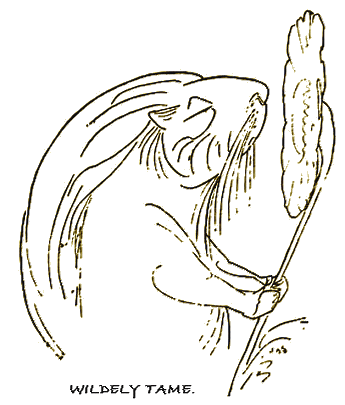
He has a tremendous set of teeth, like chisels, but these he never uses except to chew up timber with. He will never fight with his teeth, being apprehensive of a punch on the nose, where he is tender. But in his advance to the rear he is formidable, and wonderfully quick. I have already mentioned Church's experience. The night is the time of the porcupines' greatest activity, and then they are apt to fight, springing backward at one another, losing quills and tearing out specimen lumps of anatomy at a terrific rate. In the daytime the porcupine is not an active creature. He drags himself clumsily along with his armament rattling behind him, taking no more trouble than to glance at Church on the chance of a donation of the adamantine biscuits and similarly inflexible food that most delights him, and receiving disappointment or the refreshment with equal equanimity.
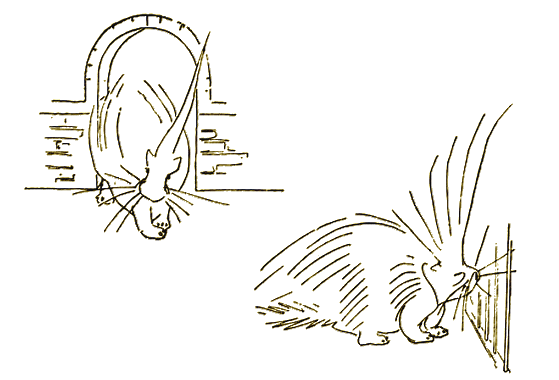
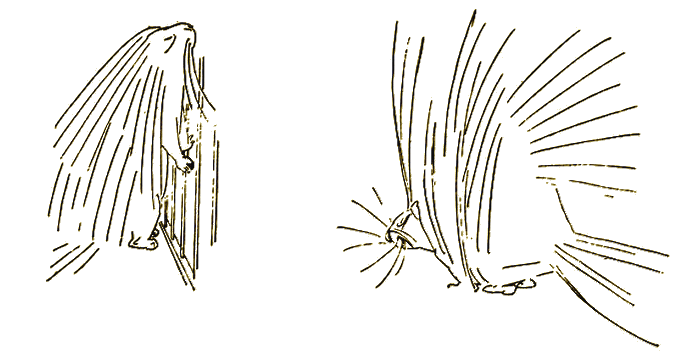
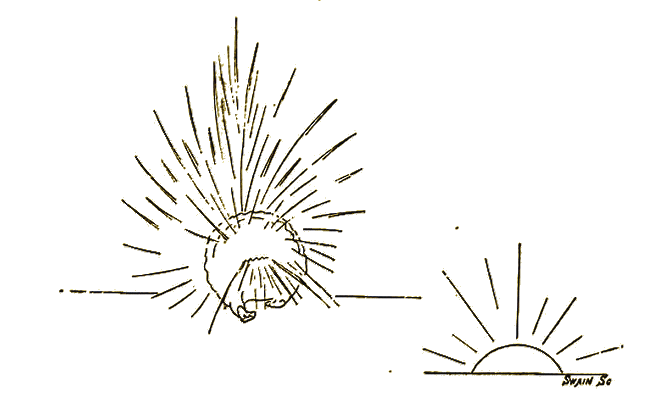
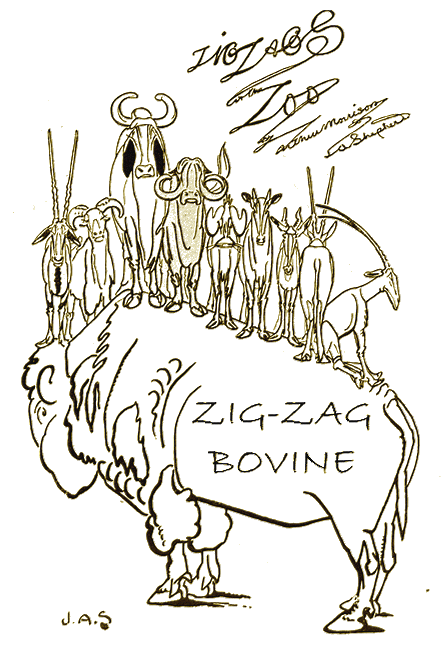
THE ANTELOPE is bovine—in its own scientific way. It belongs to one sub-tribe of the bovina, while the respectable cow of our native dairy belongs to another; therefore, herein the antelope and the relations of the ox are spoken of together. The greatest of all the bovina in these Gardens—the Bos, in fact, if one may make a Yankee-Latin pun—is Jack, the American bison.
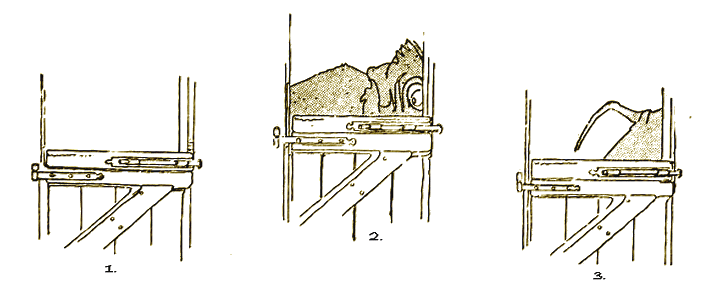
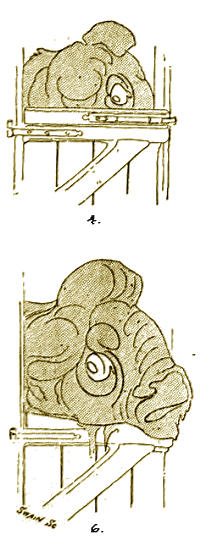
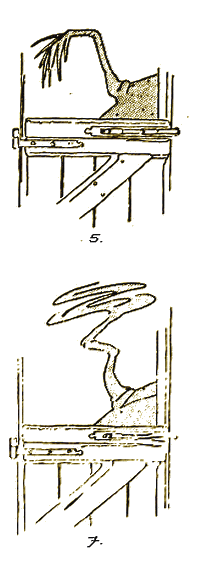
There is a deal of beef behind Jack's skin, and dear beef, for here will never again be seen such another bison as Jack, and he is worth a deal of money. The bison which once paved the prairies with many miles of beef is now all but extinct—soon will be.
Jack is not as friendly as he might be. I cannot claim to have slapped jack on the back, as I have slapped many creatures that may seem wilder than any mere cattle. As a matter of sober truth, Jack is about the most dangerous brute in the place.
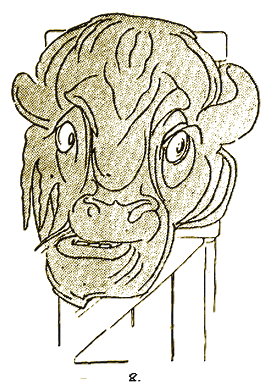
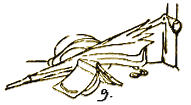
In the course of the preparation of this paper he has been found a disconcerting animal to sketch—if the attempt be made from the door of his residence, while he takes his walks abroad in his front garden. For he has strong opinions in the matter of trespass, and turns them over in his mind as he stalks past, afterwards communicating them to the trespasser by sundry glares of the eye, brandishings of the tail, sudden approaches of the spacious countenance, and threatening snorings; so that often the trespasser is fain to fall in with Jack's opinions suddenly, and get out without wasting time on ceremony or picking things up.
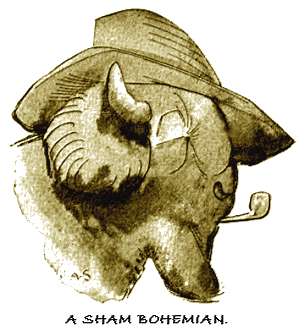
Jack is not amiable, even to relations. It is all a matter of space. Among his other strong opinions Jack has one, especially strong, on the question of adequate breathing and exercise area for a healthy bull. Anything smaller than the space here at his disposal he regards as unhealthy for more than one animal, and is apt to maintain his opinion by indisputable demonstration. Place him with another animal in a restricted space, and you will at once perceive that the arrangement is extremely unhealthy—for the other animal. Jack puts down his head, and in a very little while his companion will probably be found dead from overcrowding. The most fatal sort of overcrowding I know of is Jack's.
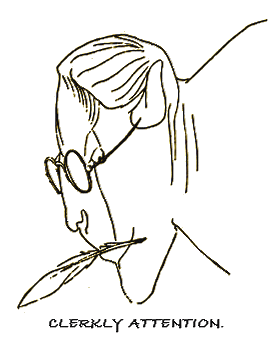
His front garden is of a size that satisfies his notions, and he willingly allows the presence of Nell, his spouse, and a calf; but if either of these ventured into his private sanctum behind, she would be overcrowded to a pulp in five minutes.
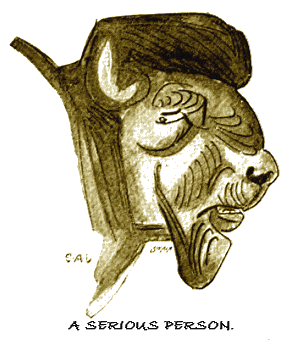
Jack's outline—if you forget the tail—is grand, but his constant attitude of readiness to deal with a question of overcrowding gives him an air of clerkly and impartial attention, ignominiously suggestive of the Civil Service. His shaggy head, though, inclines him more to the aspect of the sham Bohemian. Still, however his appearance may strike the individual fancy, there is no doubt possible of the fact that he is for ever absorbed in profound meditation. Mere questions of air-space and overcrowding, I am convinced, affect him with only a passing interest.
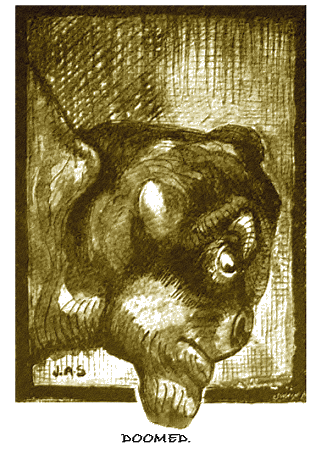
In general he is pathetically brooding, with bowed head, over his nearly approaching extinction. Not that extinction is an unpleasant fate—for is it not a rare and envied dignity? But he laments that he will drag into nothingness with him the last fragments of the old joke about the Indian resolved on skinning the bison to make his wigwam, and the bison making the Indian's wig warm without waiting to be skinned. Jack's fore-end is by far more imposing to look at than the rest of him. He has neat, well-bred legs, and his steely muscles fill his skin well; but that skin is a threadbare piece of upholstery, and the nap only adheres in scanty patches.
I would respectfully suggest to the authorities that a new skin for Jack (of good quality and permanent nap) be included in the next estimate for repairs.
If, at the same time, the question of a new tail were considered, something would have been paid of the large debt of gratitude owing to the ox tribe for the many things—shoe-leather, horn coat-buttons, some part of what we buy for milk, ox-tail soup, beef-tea, and bull's-eyes—that it gives to suffering humanity.
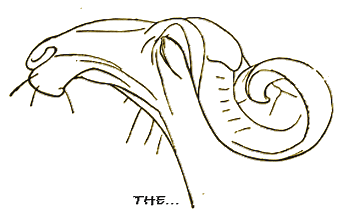
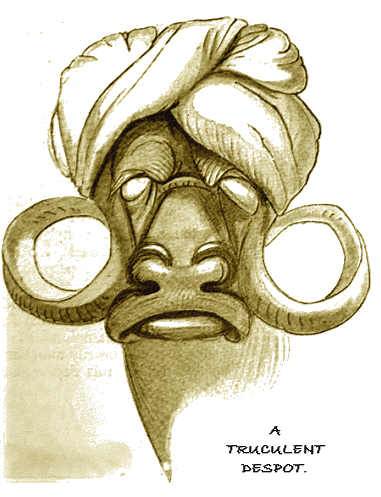
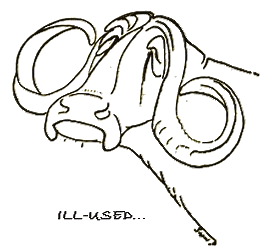
Jack really does want a new tail. He grew out of the present small fitting long ago, and now it presents a ludicrous want of balance with the opposite end. The commonest pump is better off.
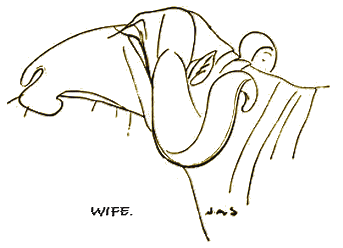
The Indian buffalo, close by, is such a long-suffering and melancholy-looking cow that one immediately infers bad matrimonial experiences. She looks as though she had not yet recovered from the last connubial thrashing. Fortunately her husband is somewhere far away in Asia—and a truculent despot he probably is.
For tearfully and mournfully as his ill-used spouse regards you, it would he inadvisable to tempt her too far in the matter of overcrowding.
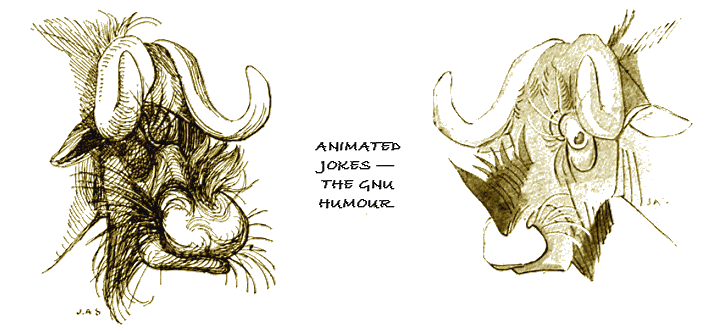

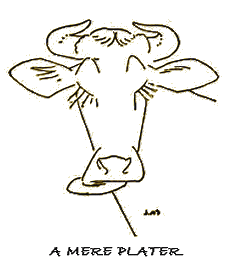
It is a sad and a pathetic face, but I shouldn't like it to hit me full-butt in the stomach with all the weight of that wealth of Bengalee cow-beef behind it.
Over in the antelope-house there is a diversity of opinion in the matter of horns. The straight, the curved, the long, the short, the regular, the barley-sugar, and the fork-lightning pattern—all have their wearers And every antelope is very serious—no antelope ever saw a joke.
They meditate and take life with the melancholy characteristic of the solitary waiter who is left here at the refreshment-rooms all the winter, to make strange visitors wonder what he is being punished for.
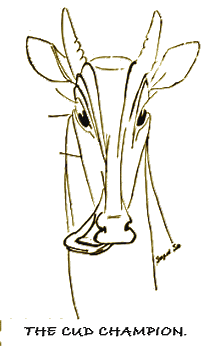
All but the gnus. The gnu is an animated joke in himself, and is apt to be struck by a sudden remembrance of his own absurdity, and to go tearing round his paddock enjoying the fun.
The gnu seems to have been built by way of using up odd scraps of material after the completion of the bull, the horse, and the donkey; and his fore-end and hind-end have an eternal air of never having been properly introduced to each other, and of each loudly asserting that the other is an entire stranger, like two hatters in adjoining shops with "no connection with the shop next door."
Still, the gnu is not a creature of even temper, in this respect resembling the nylghai, whose repartee to any ill-considered joke is apt to take the form of an awkward drive in the ribs.
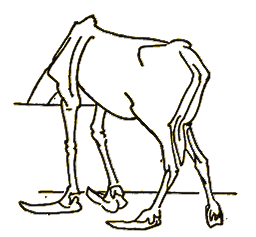
The nylghai is a well-groomed looking fellow, who perpetually chews the cud at double express speed, as though engaged in a perpetual match for the ruminating championship.
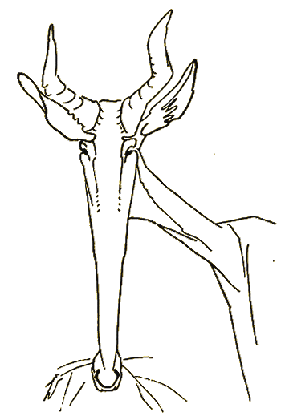
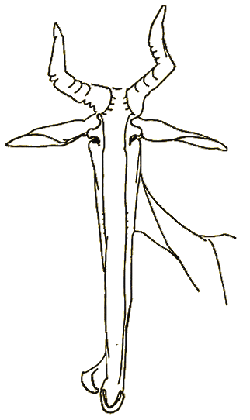
But the low-comedy merchant par excellence of this department is the bubaline antelope. His hoofs spread out before his shins like the long boots of the dancing nigger, his horns are of the loudest thunder-and-lightning pattern, his ears are of the wildest donkey-design, his head is that of a cheap tack-hammer, and his nose—but, there; there is no describing that nose—it puts the ant-eater to shame.
His bodily framework asserts itself through the inadequate skin in ostentatious lumps and corners; as though about half of the bones had been sent home too large, with the skin originally intended for something two-thirds the bubaline's size.
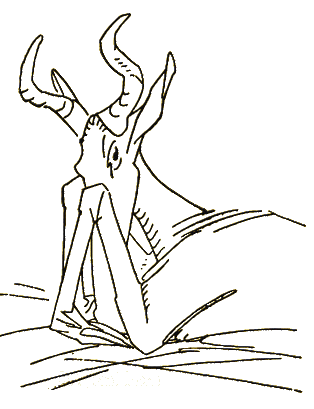
The bubaline antelope is the quadruped embodiment of the Misfit as an institution. And he is hopelessly, lamentably innocent and unconscious of his eccentricities! Small boys stand before his den and scream with laughter; the bubaline looks at them with a mild and grieved surprise.
He has heard hundreds of visitors laugh like that, and could never understand why it was done. What can it be? Any animal with a sense of humour would at least cover up that nose.
Over in the house where once the giraffes lived, solemnly ruminate the stately zebus. The zebu is a grand piece of scenery, and looks as though it might carry with it some excellent cuts of beef. But it is not active, and only its ears betray the fact that the whole thing is not stuffed. And those ears bob and flap solemnly as though worked by some concealed official behind with a long string.
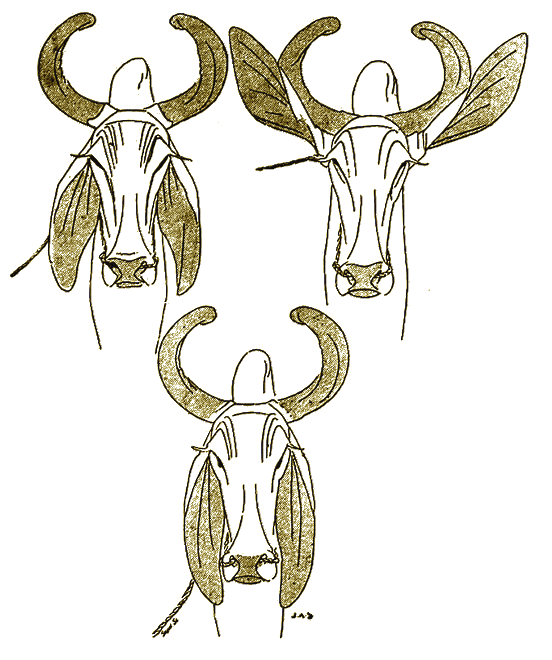
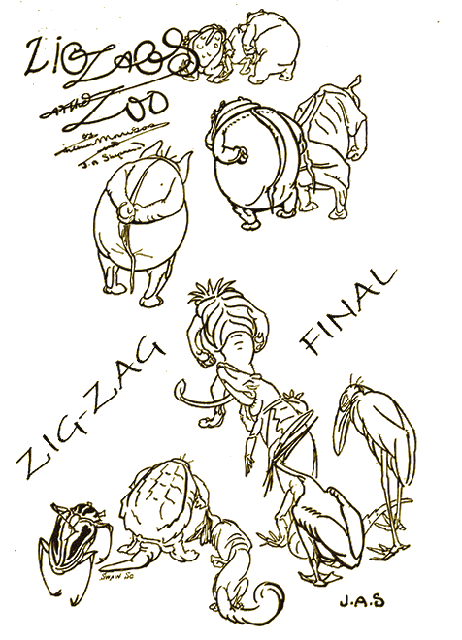
NOW, after I have classified and displayed many things in a system of confusion proper to my want of design, at the end there remain many old friends, from the woolly llama that lives by Tom, the white camel, to the vagrant mouse that steals pinches of the porcupine's dinner. Some are in the catalogue, many are not.
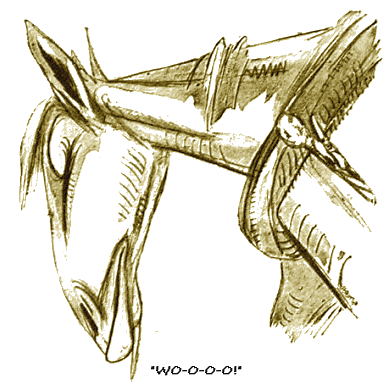
There is an old horse that drags a refuse cart, and, having been here for years, is past all surprising. He would plod past a two-headed dragon, or a unicorn with a fiery tail, in the same state of calmness in which he plods past Jim the rhinoceros or Jack the bison. Far different is it with the venerable canal horses that tramp resignedly by the Regent's Canal, where it cuts the Gardens in two. They see nothing, for that costs a shilling, and the Society spend many shillings in fences; but they hear, and most of all they hear the parrots when they hang out for an airing on a warm day.
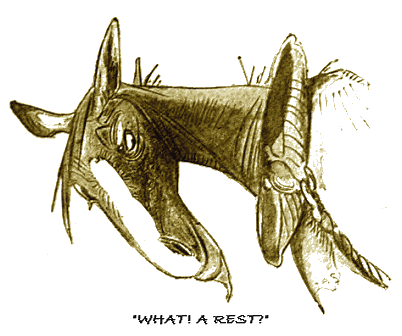
There is a wicked old blue macaw—a fine, big fellow, whose name should be Blue Peter—who tricks the unhappy canal horses all day; shouting "Wo—o—o—o!" at the top of his voice, and chuckling with unholy delight when the angular victim welcomes the opportunity for a rest.
Some creatures there are that are uncatalogued because they hold official positions. Such are Nell, Church's terrier, divers cats, and the matronly old hens that hatch out eggs for rarer birds. The fat importance of one old Cochin hen and the tremendous number and thickness of her garments make out a complete claim on her behalf to be called Mrs. Gamp. Mrs. Gamp's must be a life of surprises.
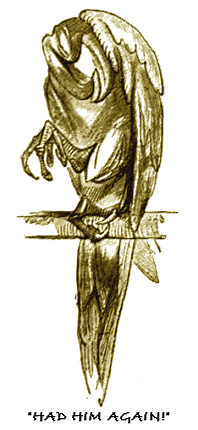
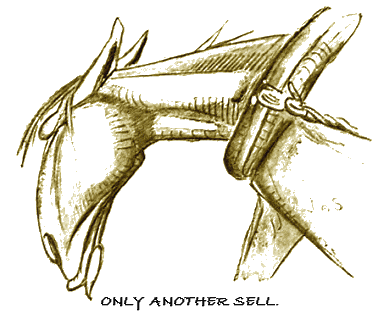
For a respectable suburban hen of the strictest propriety and the most regular and orderly habits is naturally surprised when a long and conscientious sitting results in a brood of spindly cranes or an ear-splitting choir of laughing jackasses. It shocks her sense of the proper and respectable, and confuses her orderly intellect. For in her suburban intelligence what is eccentric is disreputable, and so she trots about distracted, half afraid of her family and half of the gallinaceous Mrs. Grundy. The life is undermining her nervous system. No hen's nervous system will stand an eternal uncertainty as to whether a particular egg will turn to a thing all beak, or a thing all legs, or a thing to swim, a thing to run, or a thing to fly; with a reserve possibility that it may turn to a snake or a lizard. There is dignity in Mrs. Gamp's official position, I grant; but it is a wearing work, hatching out a perpetual succession of nightmares.
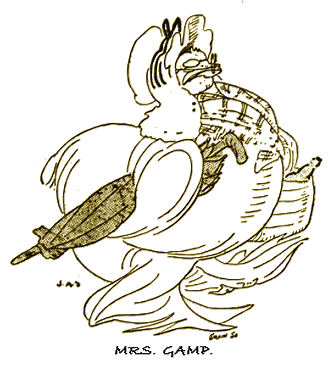
In the Zoo you may find curiosities on both sides of the bars. On the human side there are, at least, as many as on the other. Maybe a company of sailors, who go to a show for a laugh, and guffaw conscientiously at everything, to the intense scandal of the serious creatures, like Bob the Bactrian and most of the owls: or a worthy group of country cousins, each brimming over with perfect ignorance of any animal more recondite than a cow, and imparting their misinformation to each other with great freedom and confidence. The intelligent foreigner comes here, too, in those peculiar felt and straw hats that only he knows how to get; hats often with little cockades of feathers stuck in the sides of the bands. He begins at house number one, and solemnly and diligently broods over each animal in succession, to the very last in house sixty-four.
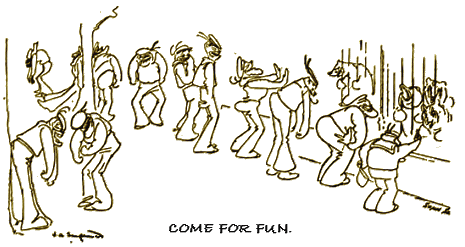
He is fat of face, and usually wears spectacles. Also there is the unhappy elementary school, sternly marshalled in a trotting column and dragged neck and crop through the grounds for the enlargement of their information and the improvement of their beraddled minds; whom the unbending schoolmaster impels over the gravel paths at the pace calculated to get them out of the gate within the time allowed for their free visit; and whose precise acquisitions in zoology on the run, and impressions of the whole business in general, one would rather like to analyze.
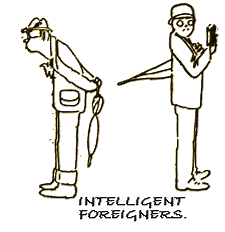
But pre-eminent, perkiest, cheekiest of all things not in the catalogue, is the sparrow. He flies casually to and fro among wolves, tigers, and leopards, with an airy confidence and self-sufficiency that nothing bigger than a sparrow can imitate.
He drops in casually on Tom, the big tiger, as he takes his afternoon nap in his back-yard, and bounces to and fro under Tom's nose, discussing zoological politics on a footing of perfect equality, and disturbing Tom's nap.

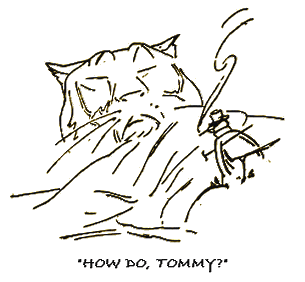
Feeling his vast importance, and quite recognising the principle that his exalted position carries with it certain social duties which he must not neglect, he makes a flying call on Duke, the Nubian lion, and patronizes him with the proper grace, suggesting various impossible alterations in regimen by way of improving Duke's digestion and mending his temper.
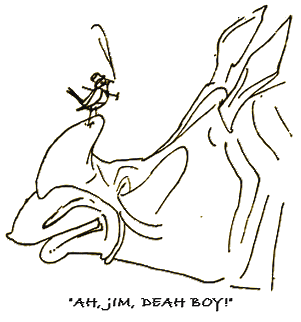
He hops across the Gardens and discusses the prospects of the hay-crop with Jim the rhinoceros, who is dietetically interested in the matter; then, having swaggered past the retiring mice who assume a residuary interest in Jim's dinner, he hangs about a little at a bar—partly because it is the nobby thing, and partly because of the crumbs—and so across Regent's Park and off to a cricket match at Lord's.
But there are creatures that have not been spoken of in these pages, yet still have respectable positions in the catalogue.
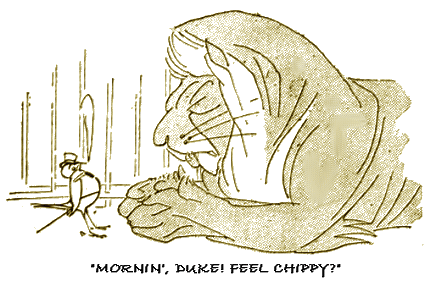
Instance the llamas and guanacos. I am not fond of the guanaco. He spits—and with an accurate aim. Take care how you rouse the ire of the guanaco, for he spits suddenly and without warning. You may rouse his ire in many hundreds of thousands of ways. By wearing a peculiar hat or an ordinary hat; walking quietly or with a swagger, or running or sitting or standing still; by speaking, shouting, or remaining silent, or by existing in the same world; and, his ire roused, he promptly spits, while Tom, the wicked old white camel next door, looks on with delighted approval. He would spit himself if he could, but prefers biting.
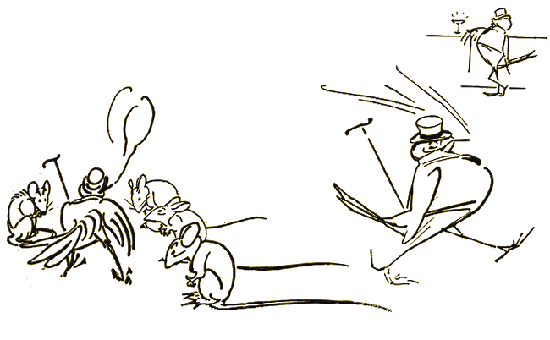
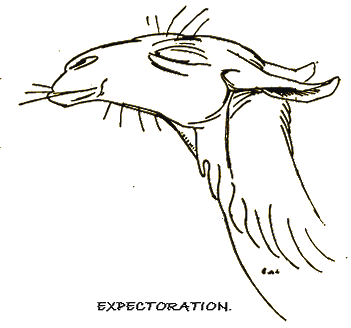
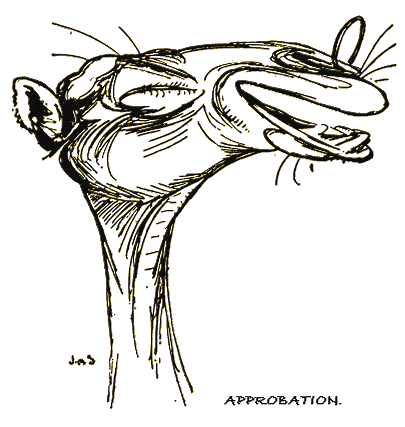
Then there is the secretary bird, with his many quills and his smart, War Office air. He has caused many a pitched zoological battle over the question whether he is a stork or a hawk; and his own battles with snakes cover him with glory and fill him with snake. He struts smartly about, plainly a secretary who knows his business and will stand no nonsense. There are all the stags, finest and largest and most disdainful of all being the wapiti. But a stag is always in a preliminary and incipient state of weeping, in spite of his assumption of "side," and until he becomes venison is really an uninteresting creature. Some day, perhaps, he wil properly make up his mind and have a good cry and get it over.
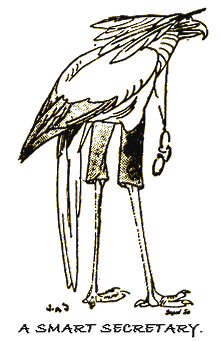
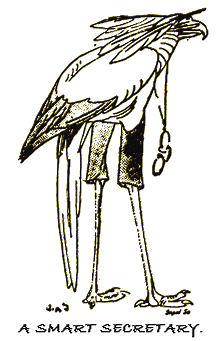
Then he may turn his mind to something else and take a worthy position in society. As it is, the stag at best, if he has any definite character at all, is a hypocrite. He poses as the beautiful, mild, benignant, timid, loving and oppressed creature, and is at heart a savage. Worthy and well-meaning people, with soft hearts and heads of blubber, sob and squeal because he is hunted. He is such a darling, timid, trustful creature, say they, and to hunt him is the act of cowardly brutality.
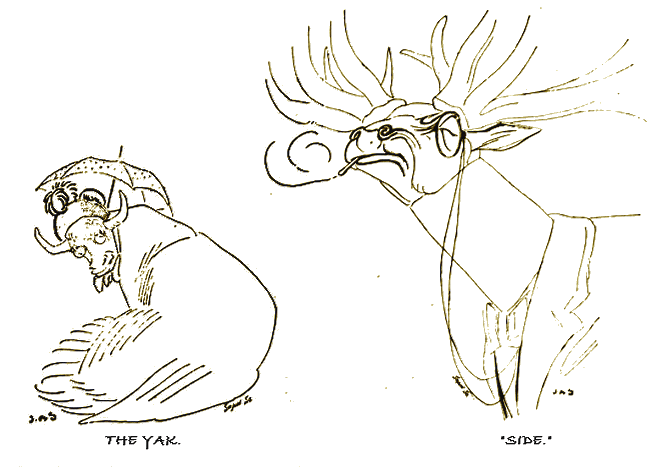
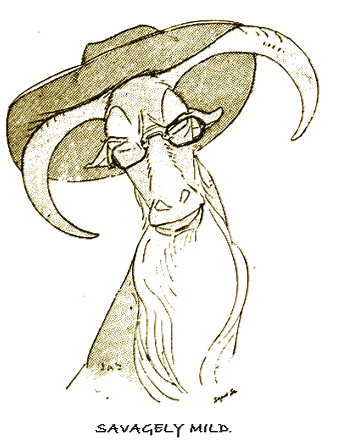
Now, I challenge any of these kind people to approach a group of the mildest park deer, any day late in August, select a quiet-looking buck, and attempt, in the most friendly way, to pat or stroke him. I am not particular as to the sort of deer—big red deer or little roebuck—but I hope the challenge won't be accepted, because the worthy adventurer will probably experience a dig in the ribs that will cause him a ride home on a hurdle. I say nothing of wilder deer. Verb. sat sap. Still, the stag is a characterless creature. There is even more character in the yak, just opposite, mild creature as it is, with its old womanish air of coddling in its black silk shawl, and its pathetic grunt.
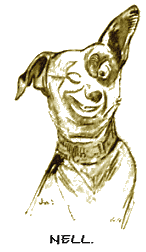
Also there are the Barbary wild sheep, who turn up in all sorts of unexpected corners of the place. There is something truculently timid, savagely mild, about the name of the Barbary wild sheep. It begins like thunder and dies away like a zephyr. It reminds one of Sidney Smith's lethally-preaching Wild Curates.
But behold, I have forgotten some of the most noble of the uncatalogued; chief among them Nell, Church's fox-terrier, who (herself and her numerous descendants) makes deadly war on the uncatalogued, unhoused, uninvited undesired rats, themselves a large part of the population of this place, and as destructive. An excellent official is Nell, honest, diligent, and with quick jaws.
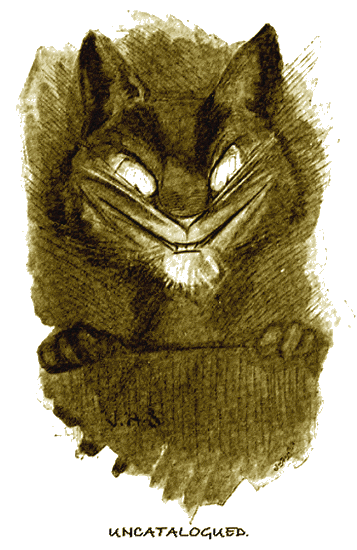
But no less worthy in their way are the regiment of battle-scarred cats, terrors among mice and rats both. Chief among these is Mr. Toots, of the camel-house, the intimate friend of Bob the Bactrian; and the elephant-house cat and the ostrich-house cat occupy high positions. But many a stout heart beats quicker at the smell of mouse beneath the fur of the more obscure rank and file of the uncatalogued cats.
